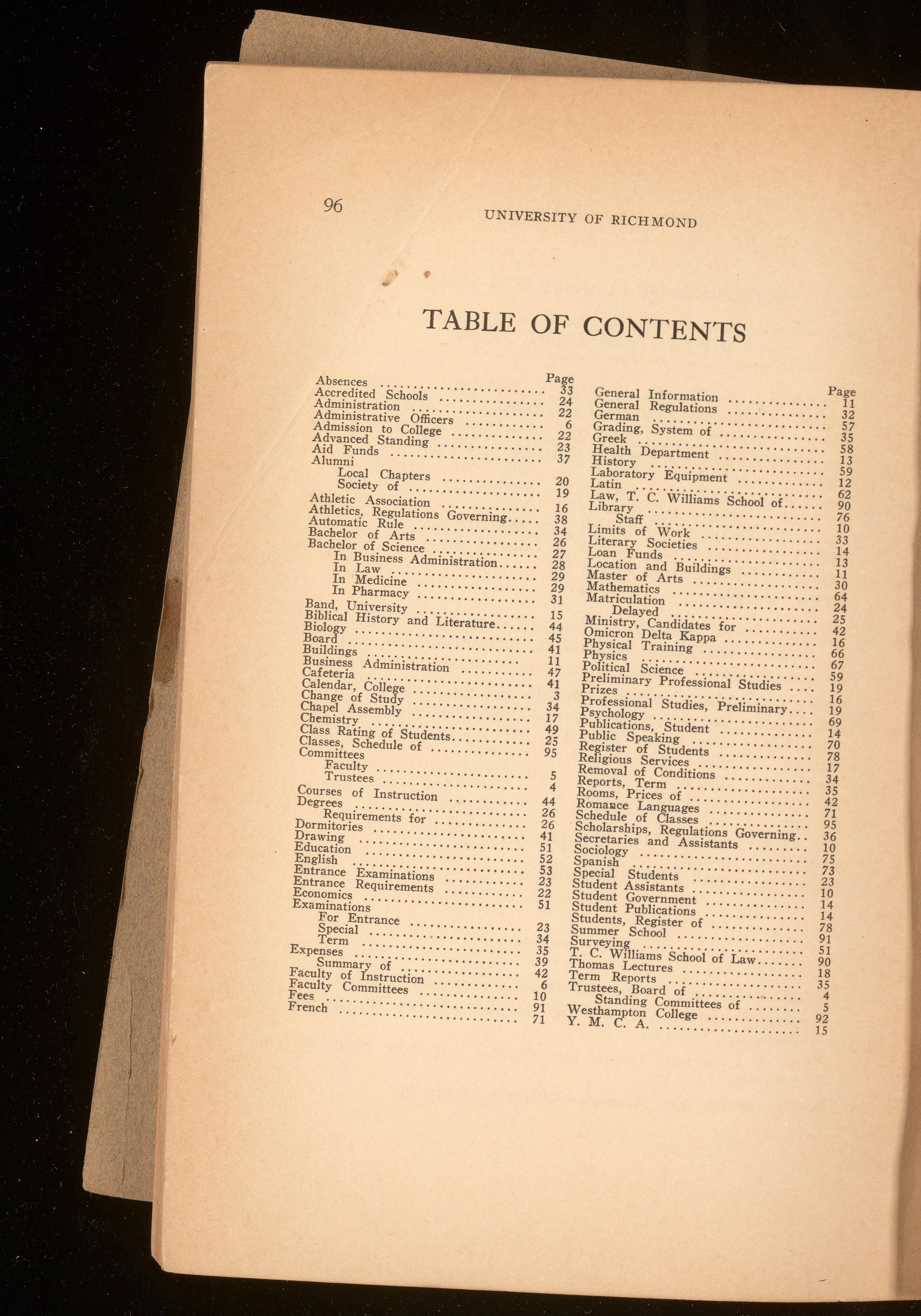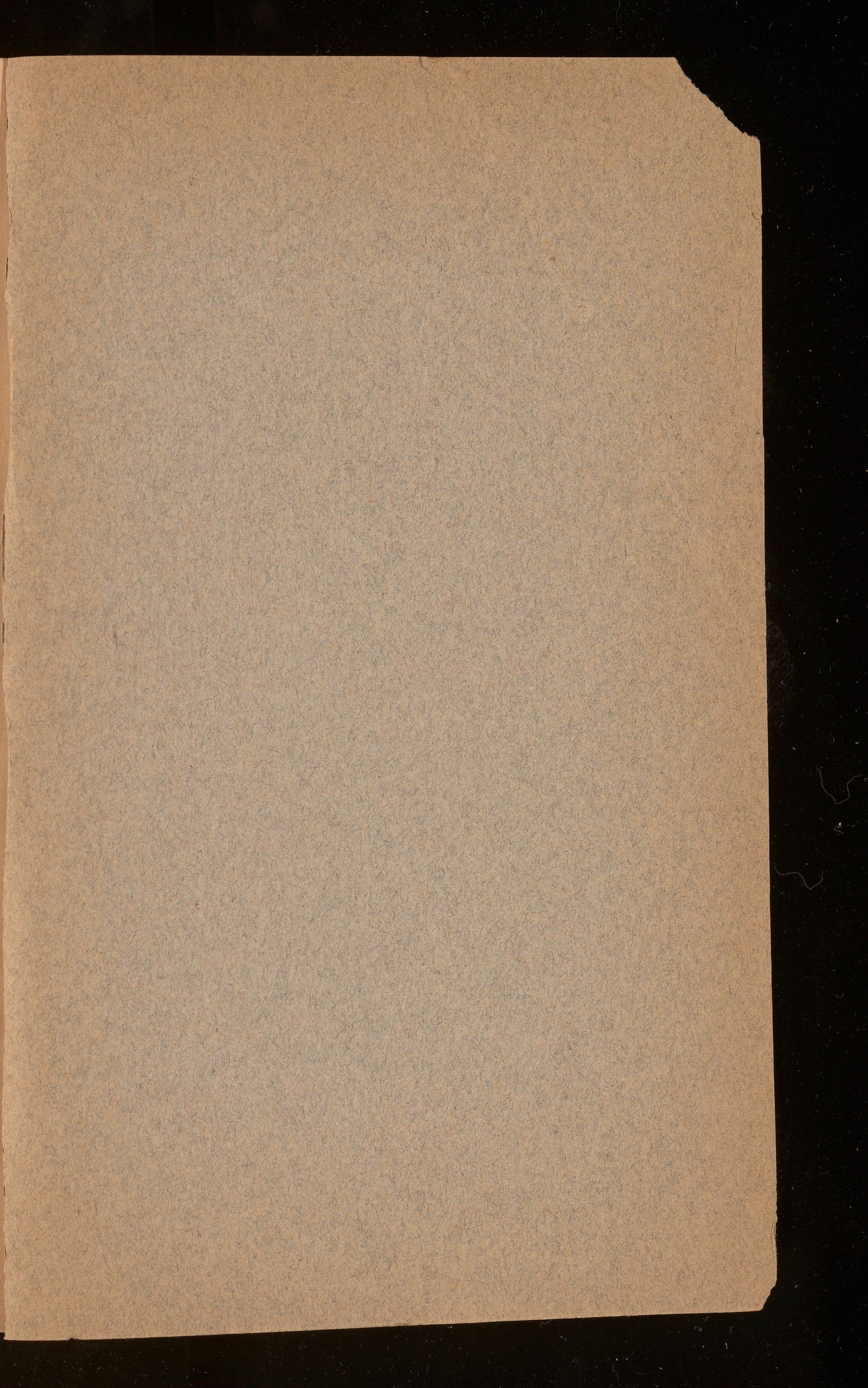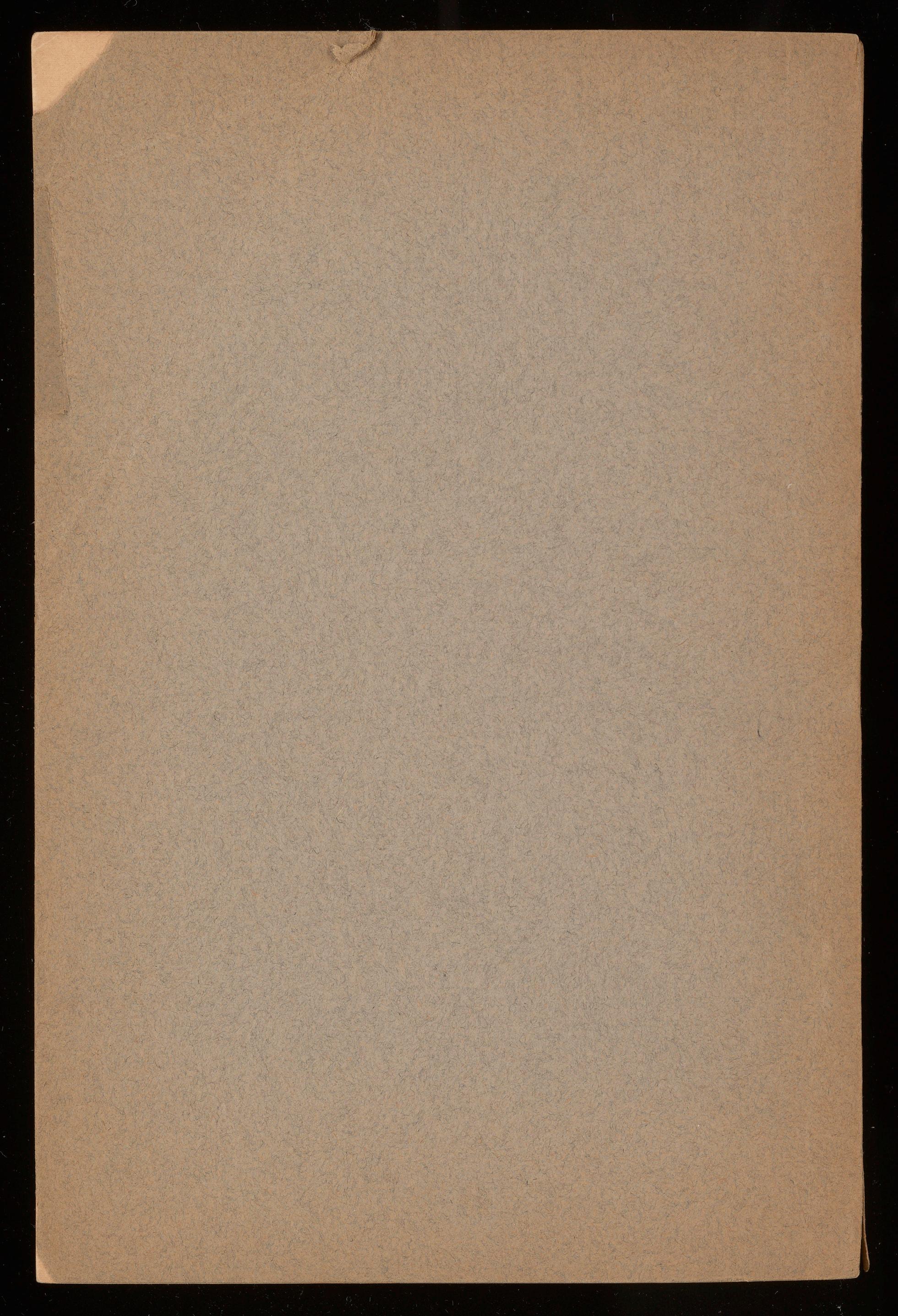Universityof Richmond Bulletin
Vol. XXVI MARCH, 1924
CATALOGUE of Richmond College
Published Quarterly No. 2
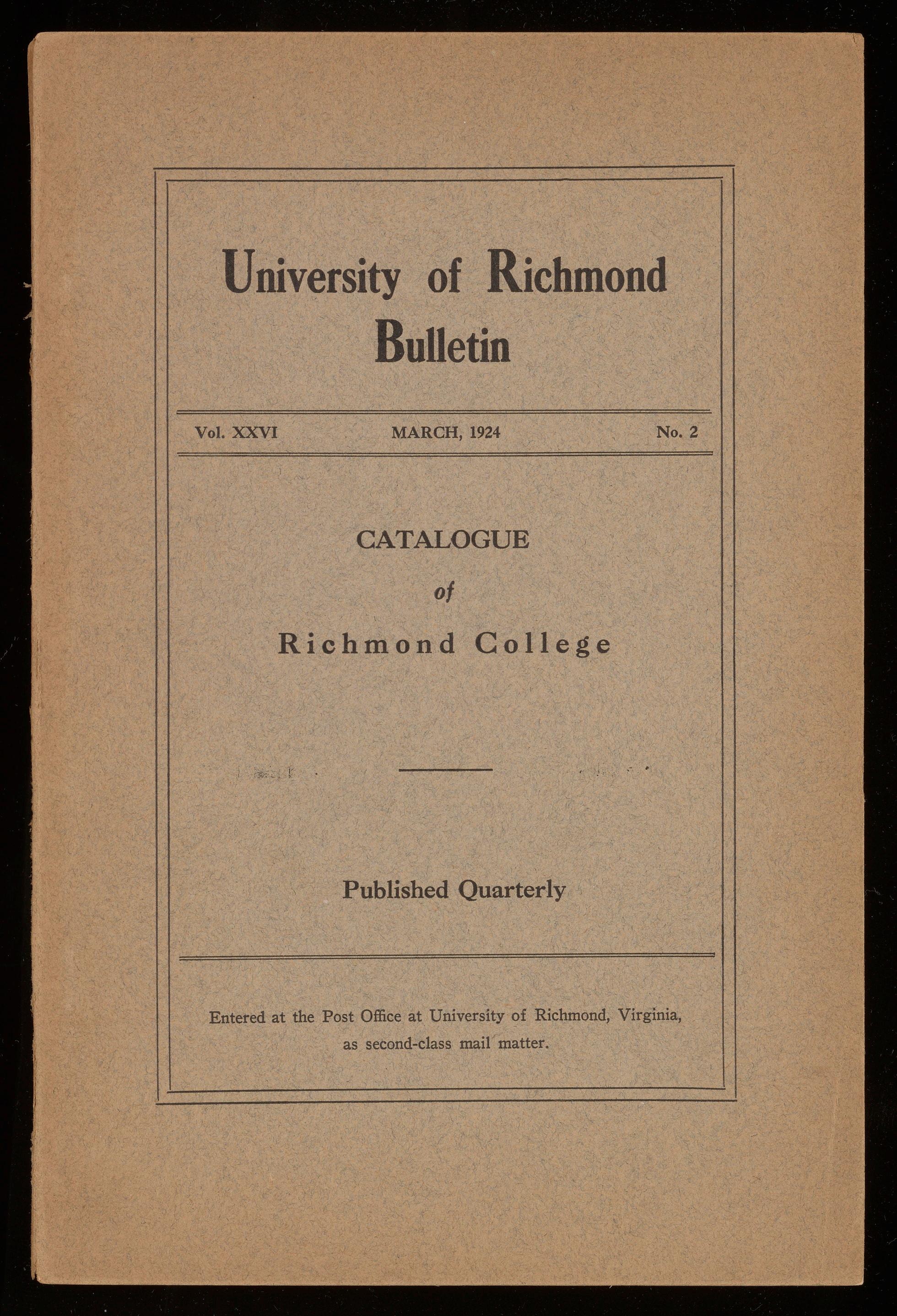
Entered at the Post Office at University of Richmond, Virginia, as second-class mail matter.
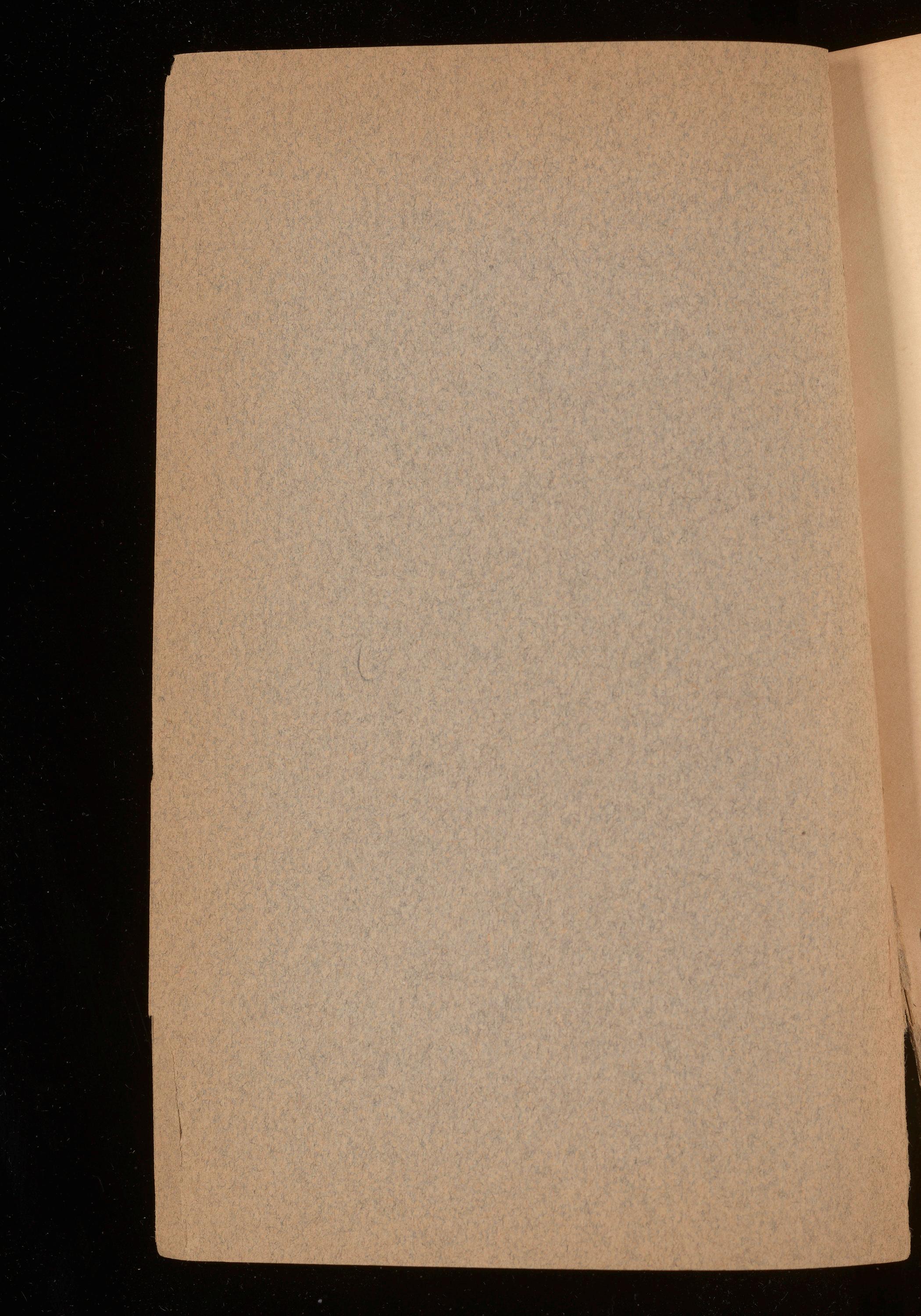

Vol. XXVI MARCH, 1924
Published Quarterly No. 2

Entered at the Post Office at University of Richmond, Virginia, as second-class mail matter.

UNIVERSITY of RICHMOND, VA.
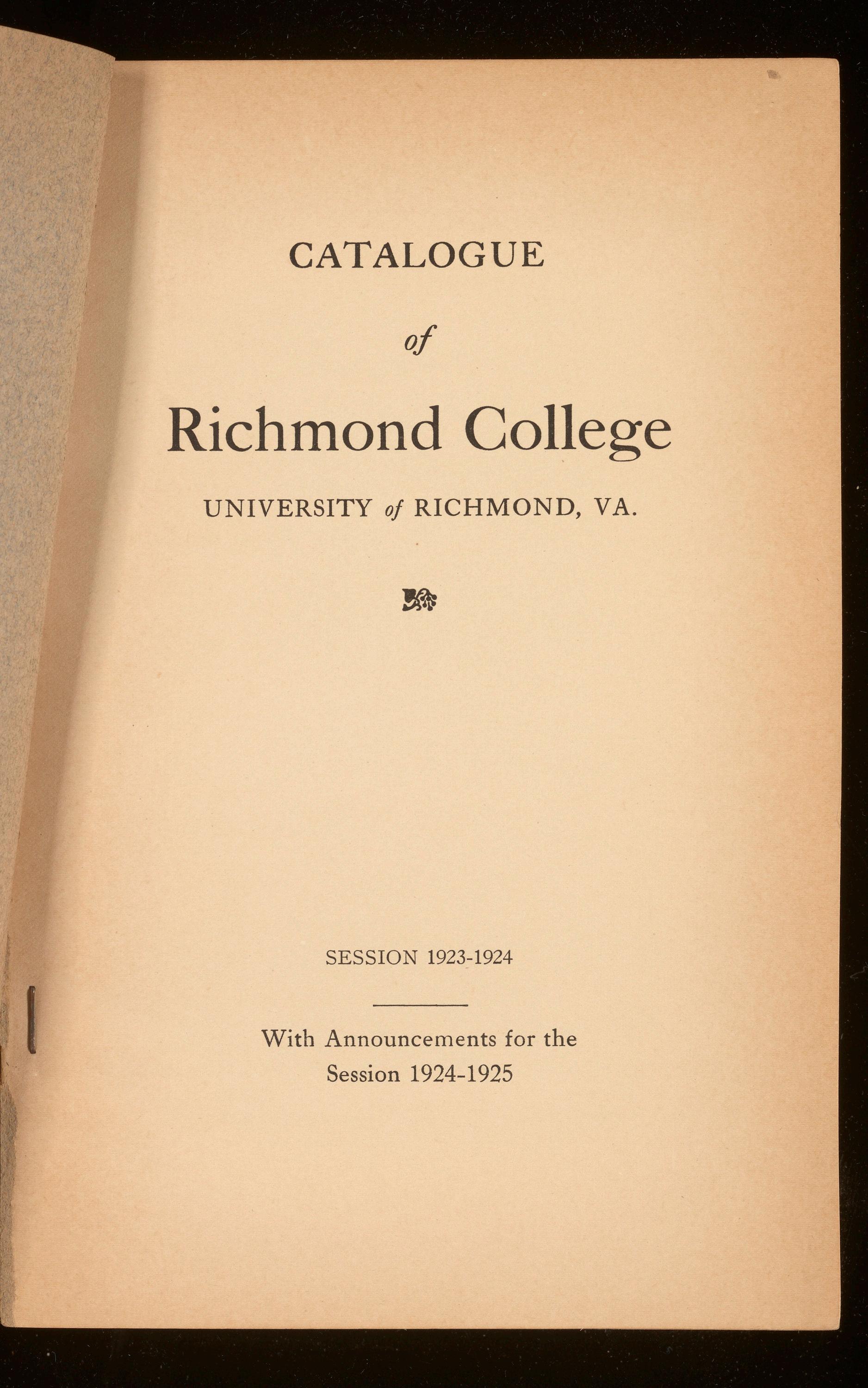
SESSION 1923-1924
IWith Announcements for the Session 1924-1925
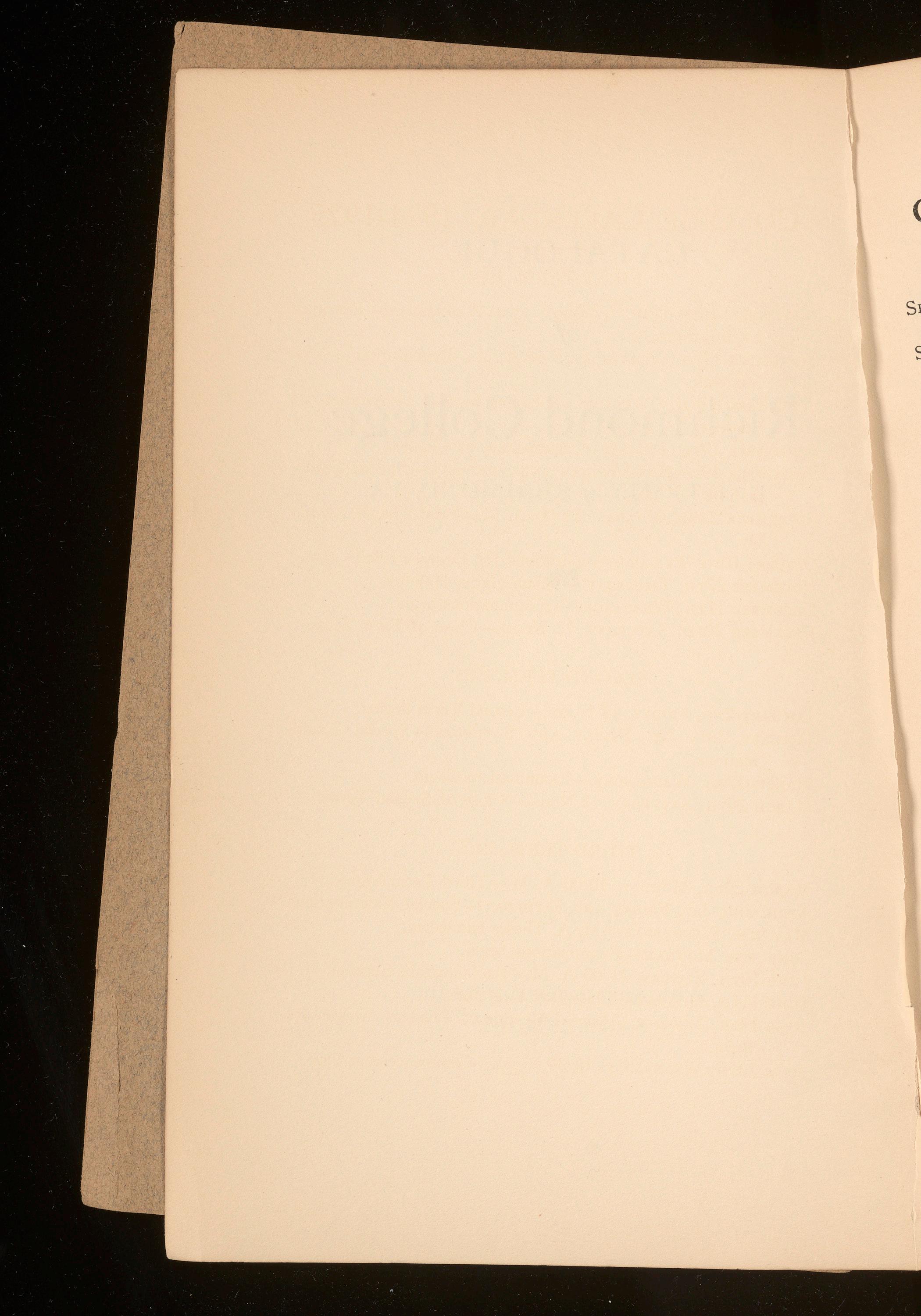
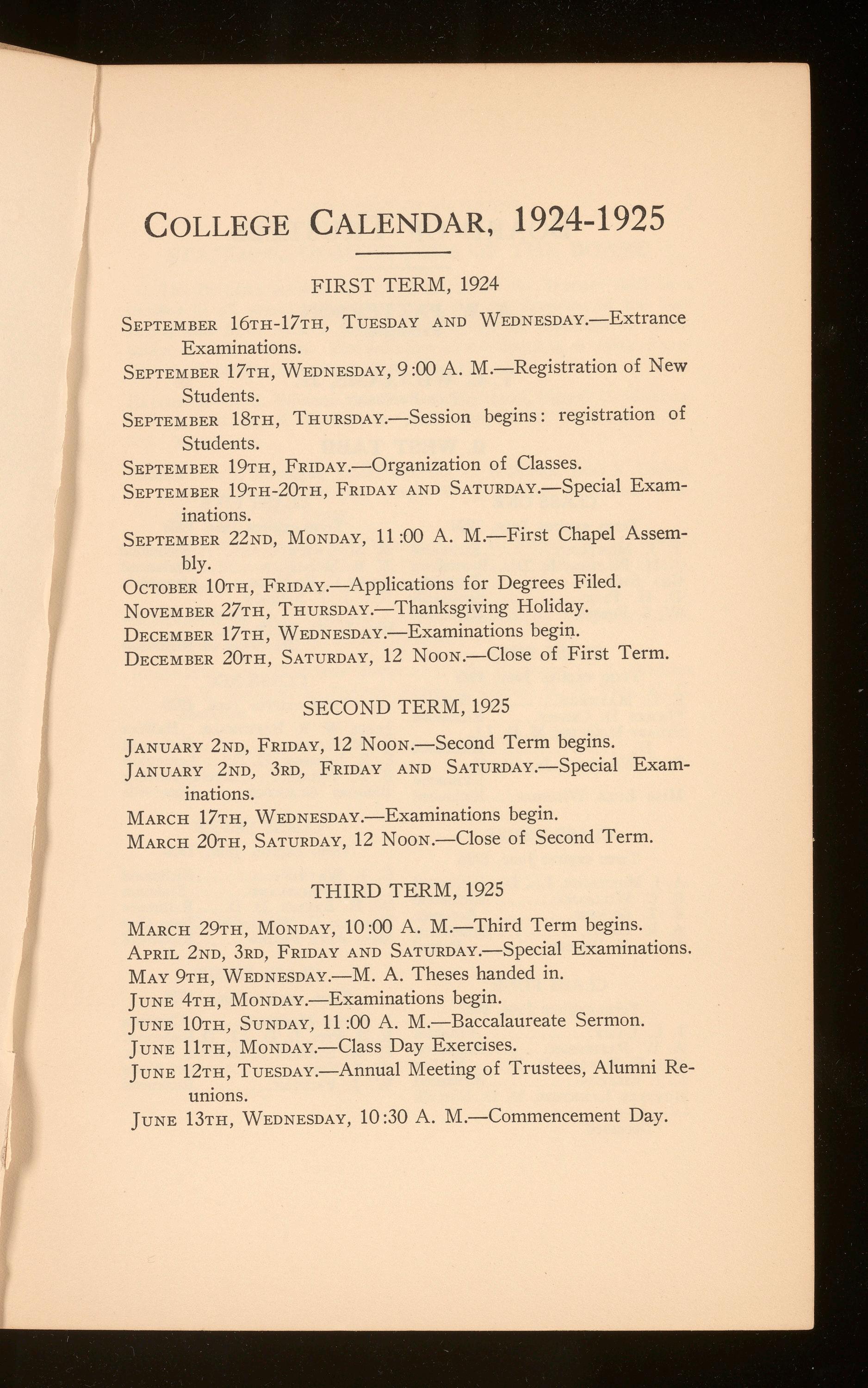
FIRST TERM, 1924
SEPTEMBER 16TH-17TH, TUESDAY AND WEDNESDAY.-Extrance Examinations.
SEPTEMBER17TH, WEDNESDAY,9 :00 A. M.-Registration of New Students.
SEPTEMBER 18TH, THURSDAY.-Session begins: registration of Students.
SEPTEMBER19TH, FRIDAY.-Organization of Classes.
SEPTEMBER19TH-20TH, FRIDAY AND SATURDAY.-Special Examinations.
SEPTEMBER22ND, MoNDAY, 11 :00 A. M.-First Chapel Assembly.
OCTOBER10TH, FRIDAY.-Applications for Degrees Filed.
NOVEMBER27TH, THURSDAY.-Thanksgiving Holiday.
DECEMBER17TH, WEDNESDAY.-Examinations begin.
DECEMBER20TH, SATURDAY,12 NooN.-Close of First Term.
SECOND TERM, 1925
JANUARY2ND, FRIDAY, 12 NooN.-Second Term begins.
JANUARY 2ND, 3RD, FRIDAY AND SATURDAY.-Special Examinations.
MARCH 17TH, WEDNESDAY.-Examinations begin.
MARCH 20TH, SATURDAY,12 NooN.-Close of Second Term.
THIRD TERM, 1925
MARCH 29TH, MONDAY,10:00 A. M.-Third Term begins.
APRIL 2ND, 3RD, FRIDAYAND SATURDAY.-Special Examinations.
MAY 9TH, WEDNESDAY.-M. A. Theses handed in.
JuNE 4TH, MoNDAY.-Examinations begin.
JUNE 10TH, SUNDAY, 11 :00 A. M.-Baccalaureate Sermon.
JuNE 11TH, MoNDAY.-Class Day Exercises.
JuNE 12TH, TuESDAY.-Annual Meeting of Trustees, Alumni Reunions.
JUNE 13TH, WEDNESDAY,10 :30 A. M.-Commencement Day.
A. W. PATTERSON PRESIDENT
T. C. WILLIAMS, Jr. VICE-PRESIDENT
B. WEST TABB SECRETARY
CLASS ONE
Term expires June, 1924
J J. MONTAGUE . ...... . Richmond
J. M. PILCHER , D. D . . Petersburg
GEO SWANN.. .. . .. Trenholm
D. H. PITTS. ... ...... . Scottsville
W. S FORBES . ...... . .. Richmond
CLASS TWO
Term expires June , 1925
E . C MATHEWS... ..... .. Norfolk
*JAMES D . CRUMP . . . Richmond
STUART McG u 1RE , M . D., LL. D ., ......... . .. .. Richmond
T. C. WILLIAMS , JR., LL D.,Richmond
Miss LuLA WINSTON . Richmond
CLASS THREE
Term expires June, 1926
A. J Mo NTAGUE, LL. D .. Richmond
R. C. WILLIAMS .... .. . Richmond
B. T. GUNTER . . . Accomac
A. R. Lo NG. ... .. Lynchburg
*J OHN R. DICKEY . . .. . Bristol
CLASS FOUR
Term expires June, 1927
J L. CAMP .. . .. Franklin
CLASS FIVE
Term expires June, 1928
R. M SMITH .. .... .. Richm ond
T B. McADAMS . . Richmon d JUDGE C. E. N1coL .. .•. Alexandria
REv. J. T. STINSON , Bluefield, W. Va.
MRs. G. W. McDANIEL, University of Richmond
CLASS SIX
Term expires June, 1929
J UDGEw. R. BARKSDALE... Halifax
E . M LoNG .. .. . Richmond
E. B. JACKSON, D. D ..... Lexington
B. P. WILLIS ... .. Fredericksburg BEDFORDGLASCOCK...... Upperville
CLASS SEVEN
Term expires June, 1930
C. T. WATKINS ..... . .... Richmond
L. L. SUTHERLAND .... Staunton
W. H. BAYLOR,D. D ..... Baltimore
NORMAN H. WILLIAMS.. Chase City
Miss ALTA FosTER ....... Richmond
CLASS EIGHT
Term expires June, 1931
J. H UNT HARGRAVE .. . . Chatham
R. H. PITT, D . D., LL. D ..Richmond
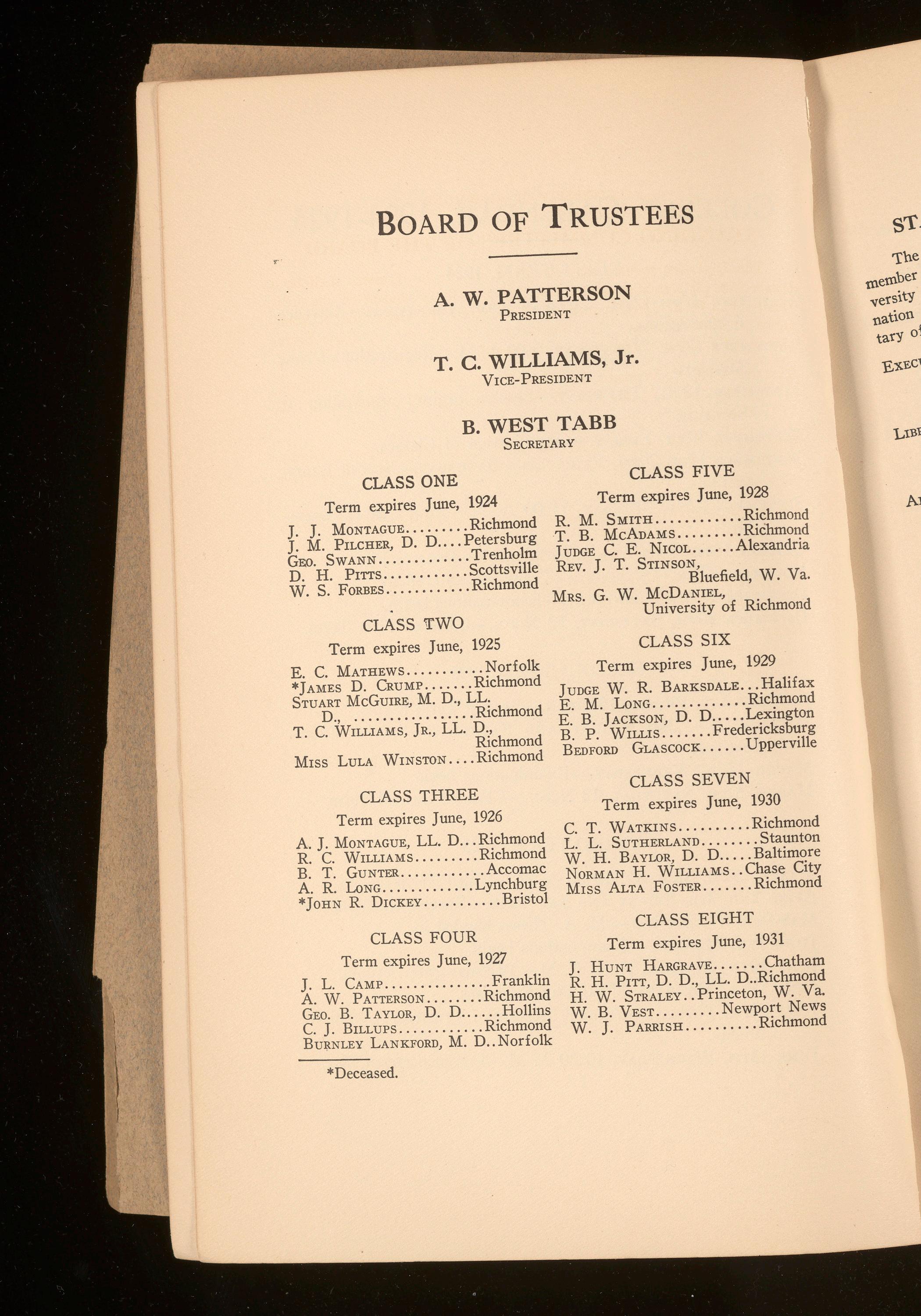
A. W PATTERSON . .. . Richmond
GEO. B T AYLOR, D. D . .. Hollins
C. J BILLUPS .. Richmond
B URNLEY L ANKFORD,M. D .. Norfolk
*Dec eased.
H. W. STRALEY . . Princeton, W. Va. W . B VEST ........ Newport News
W. J. PARRISH........ Richmond
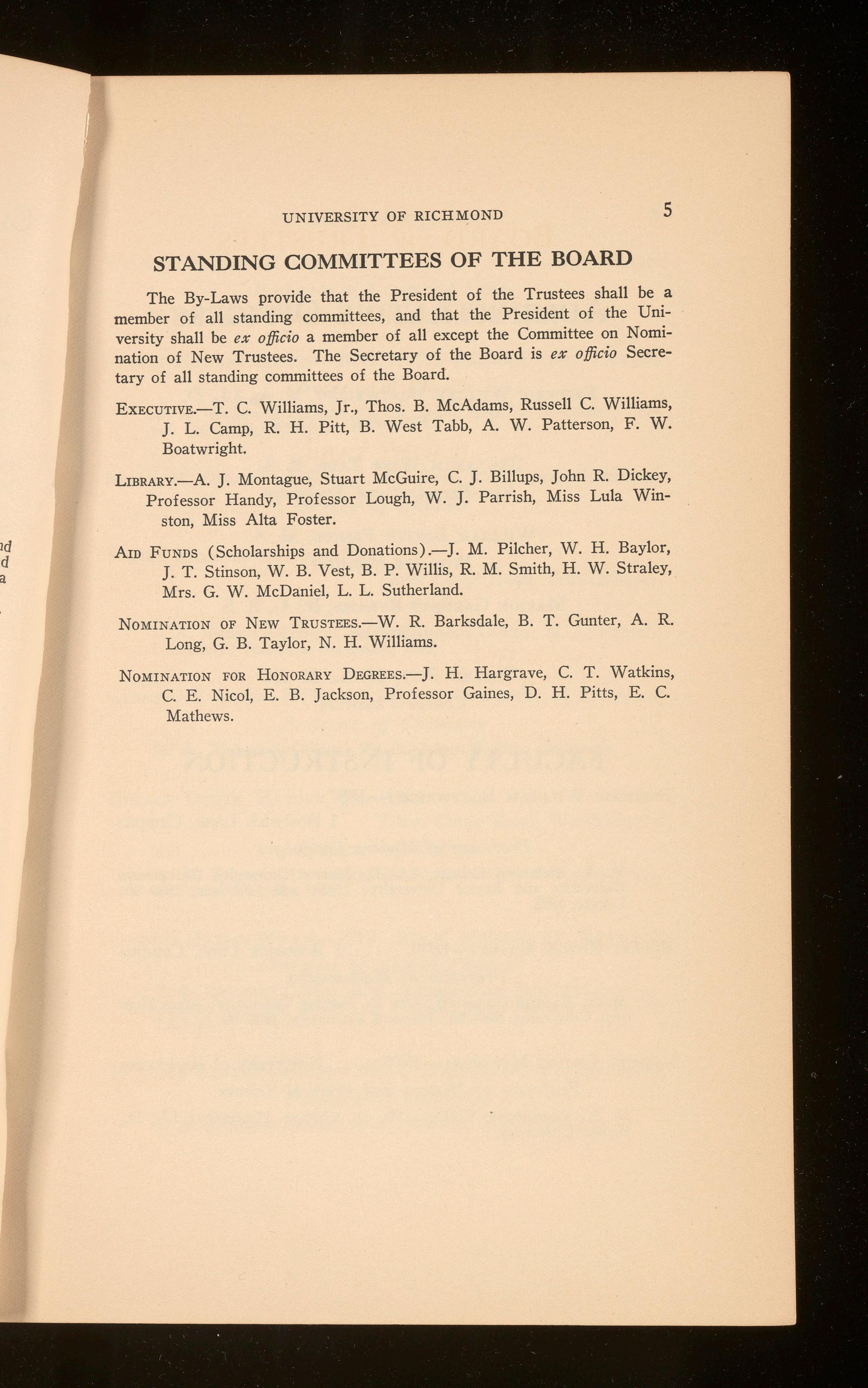
The By-Laws provide that the President of the Trustees shall be a member of all standing committees, and that the President of the University shall be ex officio a member of all except the Committee on Nomination of New Trustees. The Secretary of the Board is ex officio Secretary of all standing committees of the Board.
ExECUTIVE.-T. C. Williams, Jr., Thos. B. McAdams, Russell C. Williams, J . L. Camp, R. H. Pitt, B. West Tabb, A. W. Patterson, F. W. Boatwright.
LIBRARY.-A. J. Montague, Stuart McGuire, C. J. Billups, John R. Dickey, Professor Handy, Professor Lough, W. J. Parrish, Miss Lula Winston, Miss Alta Foster.
Arn FUNDS (Scholarships and Donations).-}. M. Pilcher, W. H. Baylor, J. T Stinson, W. B. Vest, B. P. Willis, R. M. Smith, H. W . Straley, Mrs. G. W. McDaniel, L. L. Sutherland.
NOMINATIONOF NEW TRUSTEES.-W. R. Barksdale, B. T Gunter, A. R. Long, G. B. Taylor, N. H. Williams.
NOMINATIONFOR HONORARYDEGREES -} . H. Hargrave, C. T. Watkins, C. E. Nicol , E. B. Jackson, Professor Gaines, D. H Pitts, E. C. Math ews.

FREDERICWILLIAM BOATWRIGHT,M. A., LL. D. President
BENJAMIN WEST TABB, B. A. Vice-President and Treasurer
WILLIAM LOFTIN PRINCE, M.A. Dean and Registrar
MARION GARNETT RYLAND, B. A., B. s. Librarian
CULLEN PITT, M. A., M. D. College Physician
FREDERICWILLIAM BOATWRIGHT-18871 Bostwick Lane, Campus
Professor of Modern Languages
M. A , Richmond College; LL. D., Mercer University, Georgetown University and Baylor University; Halle and Sorbonne, 1889-'90; Leipsic, 1892.
ROBERTEDWIN GAINEs-1890 ....... 3 Bostwick Lane, Campus Professor of Mathematics
~- A ., Furman University; Litt. D., Furman University; Johns Hopkins University, 1887-'88; Harvard University, 1899-'00.
SAMUELCHILES MITCHELL-1895 ...... University of Richmond
Prof essor of History and Political Science
M. A. , Georgetown College; Ph D., Chicago University; LL. D., Brown University
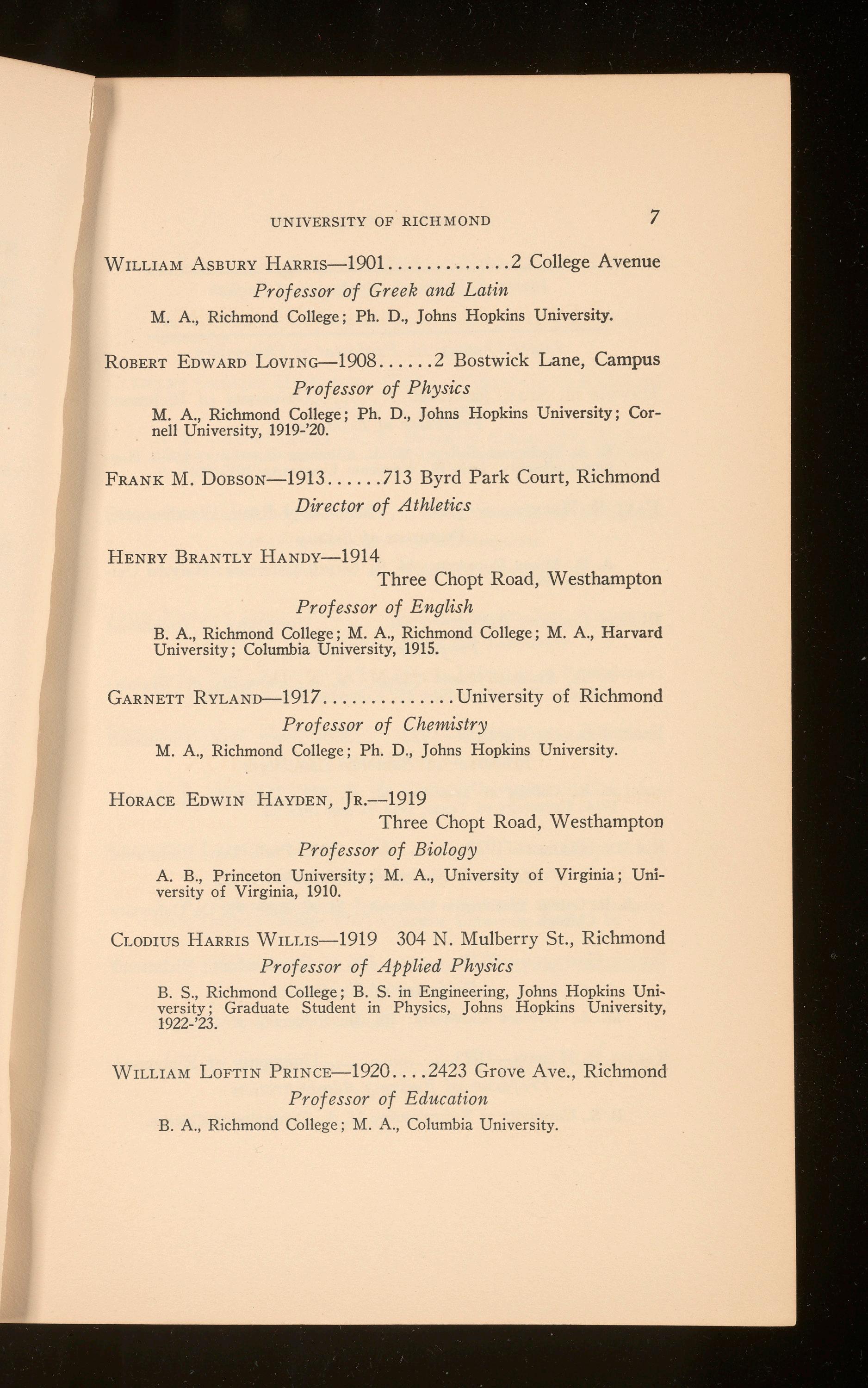
WILLIAM AsBURY HARRis-1901 ............. 2 College Avenue Professor of Greek and Latin
M. A., Richmond College; Ph. D., Johns Hopkins University.
ROBERTEDWARDLovrnG-1908 ...... 2 Bostwick Lane, Campus Professor of Physics
M. A., Richmond College; Ph. D., Johns Hopkins University; Cornell University, 1919-'20.
FRANK M. DoBSON-1913 ...... 713 Byrd Park Court, Richmond Director of Athletics
HENRY BRANTLYHANDY-1914
Three Chopt Road, Westhampton Professor of English
B. A., Richmond College; M. A., Richmond College; M. A., Harvard University; Columbia University, 1915.
GARNETTRYLAND-1917 .............. University of Richmond Professor of Chemistry
M. A., Richmond College; Ph. D., Johns Hopkins University.
HORACE EDWIN HAYDEN, JR.--1919
Three Chopt Road, Westhampton Professor of Biology
A. B., Princeton University; M. A., University of Virginia; University of Virginia, 1910.
Cwmus HARRIS WILLis-1919 304 N. Mulberry St., Richmond Professor of Applied Physics
B. S., Richmond College; B. S. in Engineering, Johns Hopkins University; Graduate Student in Physics, Johns Hopkins University, 1922-'23.
WILLIAM LOFTIN PRINCE-1920 .... 2423 Grove Ave., Richmond Professor of Education
B. A., Richmond College; M. A., Columbia University.
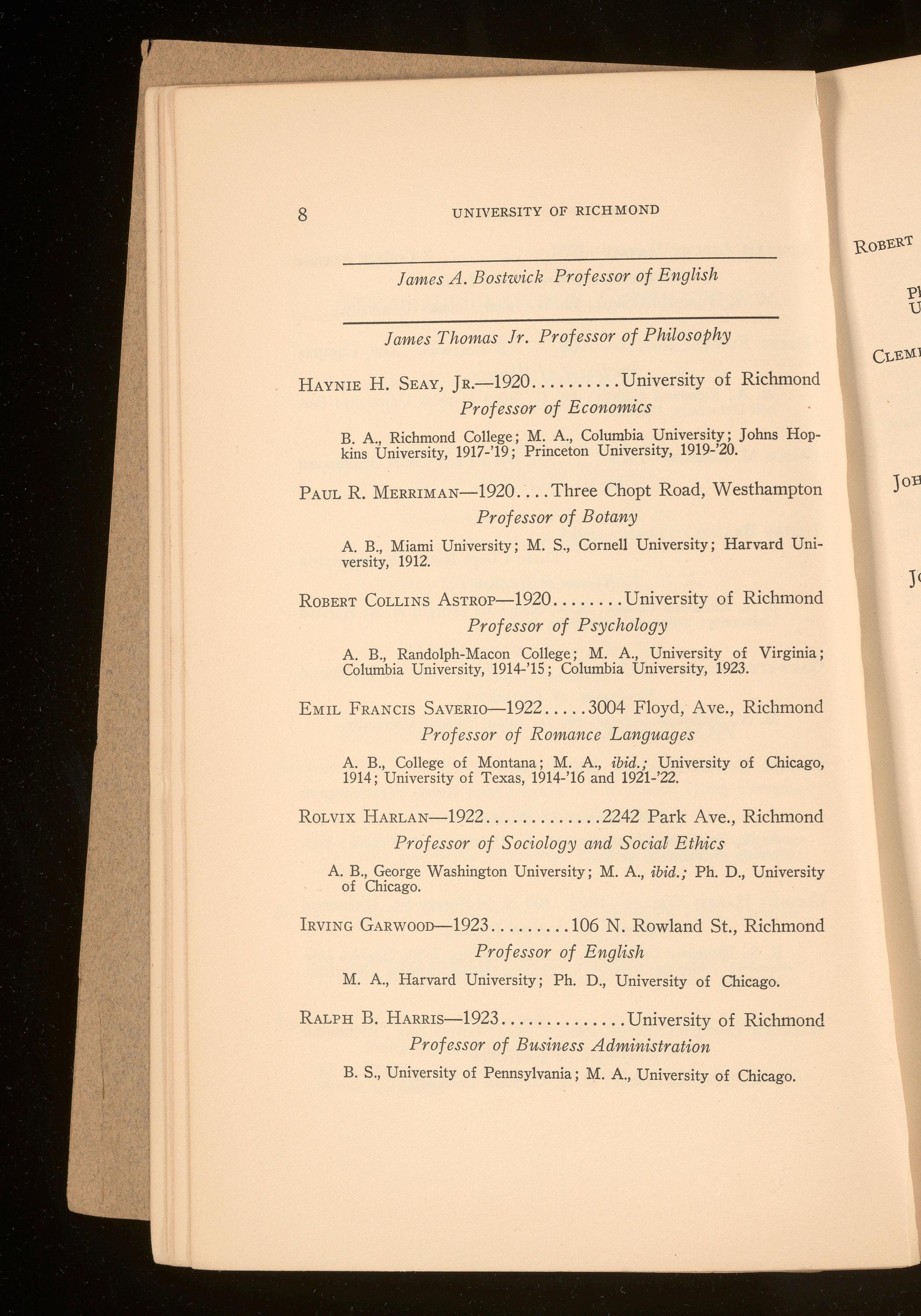
James A. Bostwick Professor of English
James Thomas Jr. Professor of Philosophy
HAYNIE H. SEAY, JR.-1920 .......... University of Richmond Professor of Economics
B. A. Richmond College; M. A., Columbia University; Johns Hopkins University, 1917-'19; Princeton University, 1919-'20.
PAUL R. MERRIMAN-1920 .... Three Chopt Road, Westhampton Professor of Botany
A. B., Miami University; M. S ., Cornell University; Harvard University, 1912
ROBERTCOLLINSAsTROP-1920 ........ University of Richmond Professor of Psychology
A. B., Randolph-Macon College; M A., University of Virginia; Columbia University, 1914-'15; Columbia University, 1923.
EMIL FRANCIS SAVERio-1922 ... . 3004 Floyd, Ave., Richmond Professor of Romance Languages
A. B., College of Montana; M. A., ibid.; University of Chicago, 1914; University of Texas, 1914-'16 and 1921-'22.
RoLVIX HARLAN-1922 . ........... . 2242 Park Ave., Richmond Professor of Sociology and Social Ethics
A. B., George Washington University; M. A., ibid.; Ph. D., University of Chicago.
IRVINGGARwooo-1923
106 N. Rowland St., Richmond Professor of English
M. A., Harvard University; Ph. D , University of Chicago.
RALPH B. HARRis-1923 .. ..... University of Richmond Professor of Business Administration
B. S., University of Pennsylvania; M. A., University of Chicago.
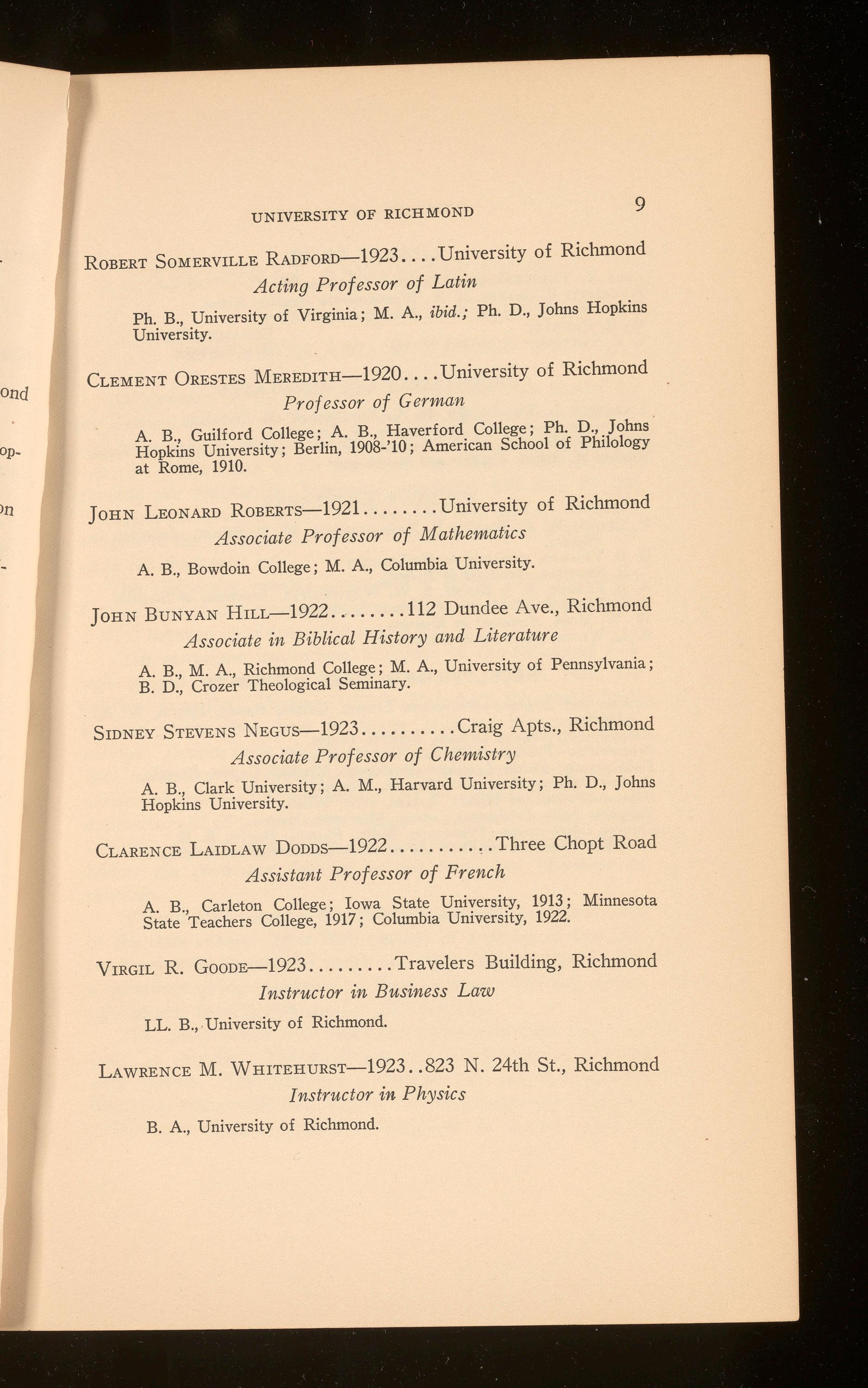
ROBERTSOMERVILLERADFORD-1923 .... University of Richmond Acting Professor of Latin
Ph. B., University of Virginia; M. A., ibid.; Ph. D., Johns Hopkins University.
CLEMENT ORESTES MEREDITH-1920 .... University of Richmond Professor of German
A. B., Guilford College; A. B., Haverford College; Ph. D., Johns Hopkins University; Berlin, 1908-'10; American School of Philology at Rome, 1910.
JoHN LEONARDRoBERTs-1921. ....... University of Richmond Associate Professor of Mathematics
A. B., Bowdoin College; M. A., Columbia University.
JOHN BUNYAN HILL-1922 ........ 112 Dundee Ave., Richmond Associate in Biblical History and Literature
A. B., M. A., Richmond College; M. A., University of Pennsylvania; B . D., Crozer Theological Seminary.
SIDNEY STEVENS NEGus-1923 .......... Craig Apts., Richmond Associate Professor of Chemistry
A. B., Clark University; A. M., Harvard University; Ph. D., Johns Hopkins University.
CLARENCELAIDLAW DoDDs-1922 ......... ,. Three Chopt Road Assistant Professor of French
A. B., Carleton College; Iowa State University, 1913; Minnesota State Teachers College, 1917; Columbia University, 1922.
VIRGIL R. GooDE-1923 ......... Travelers Building, Richmond Instructor in Business Law
LL. B., University of Richmond.
LAWRENCEM. WHITEHURST-1923 .. 823 N. 24th St., Richmond Instructor in Physics
B. A., University of Richmond.
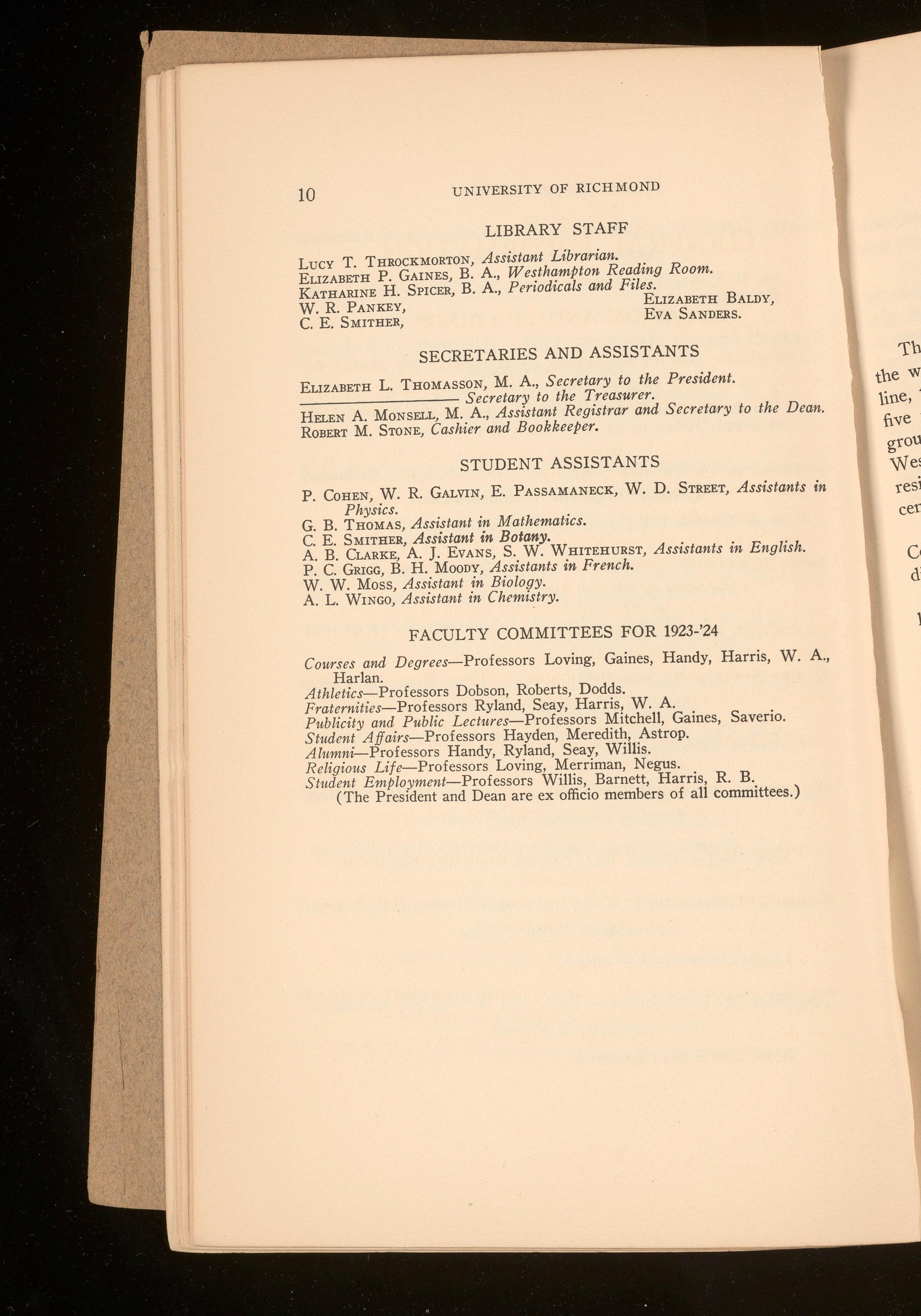
UNIVERSITY OF RICHMOND
LIBRARY STAFF
LucY T. THROCKMORTON,Assistant Librarian. ELIZABETHP. GAINES,B. A., Westhampton Reading Room.
KATHARINEH. SPICER,B. A., Periodicals and Files. W.R. PANKEY, ELIZABETHBALDY, C. E SMITHER, EVA SANDERS.
ELIZABETHL. THOMASSON,M. A., Secretary to the President. --------- Secretary to the Treasurer.
HELENA. MoNSELL,M. A., Assistant Registrar and Secretary to the Dean. ROBERTM. STONE,Cashier and Bookkeeper.
P. COHEN,W. R. GALVIN,E. PASSAMANECK,W. D. STREET,Assistants in Physics.
G B. THOMAS,Assistant in Mathematics.
C. E. SMITHER,Assistant in Botany.
A. B. CLARKE,A . J. EVANS , S W. WHITEHURST,Assistants in English.
P. C. GRIGG,B. H. MooDY,Assistants in French. W. W. Moss, Assistant in Biology.
A. L. WINGO , Assistant in Chemistry .
COMMITTEES FOR 1923-'24
Courses and Degrees-Professors Loving, Gaines, Handy, Harris, W. A., Harlan . Athl etics-Professors Dobson, Roberts, Dodds. Fraterni ties-Professors Ryland, Seay, Harris, W. A. Publicity and P1tblic Lect1ires-Professors Mitchell, Gaines, Saverio. Student Affairs-Professors Hayden, Meredith, Astrop. Al1mmi-Professors Handy, Ryland, Seay, Willis. R eligious Lif e-Professors Loving, Merriman, Negus. Stud ent Employment-Professors Willis, Barnett, Harris, R. B. (The President and Dean are ex officio members of all committees.)
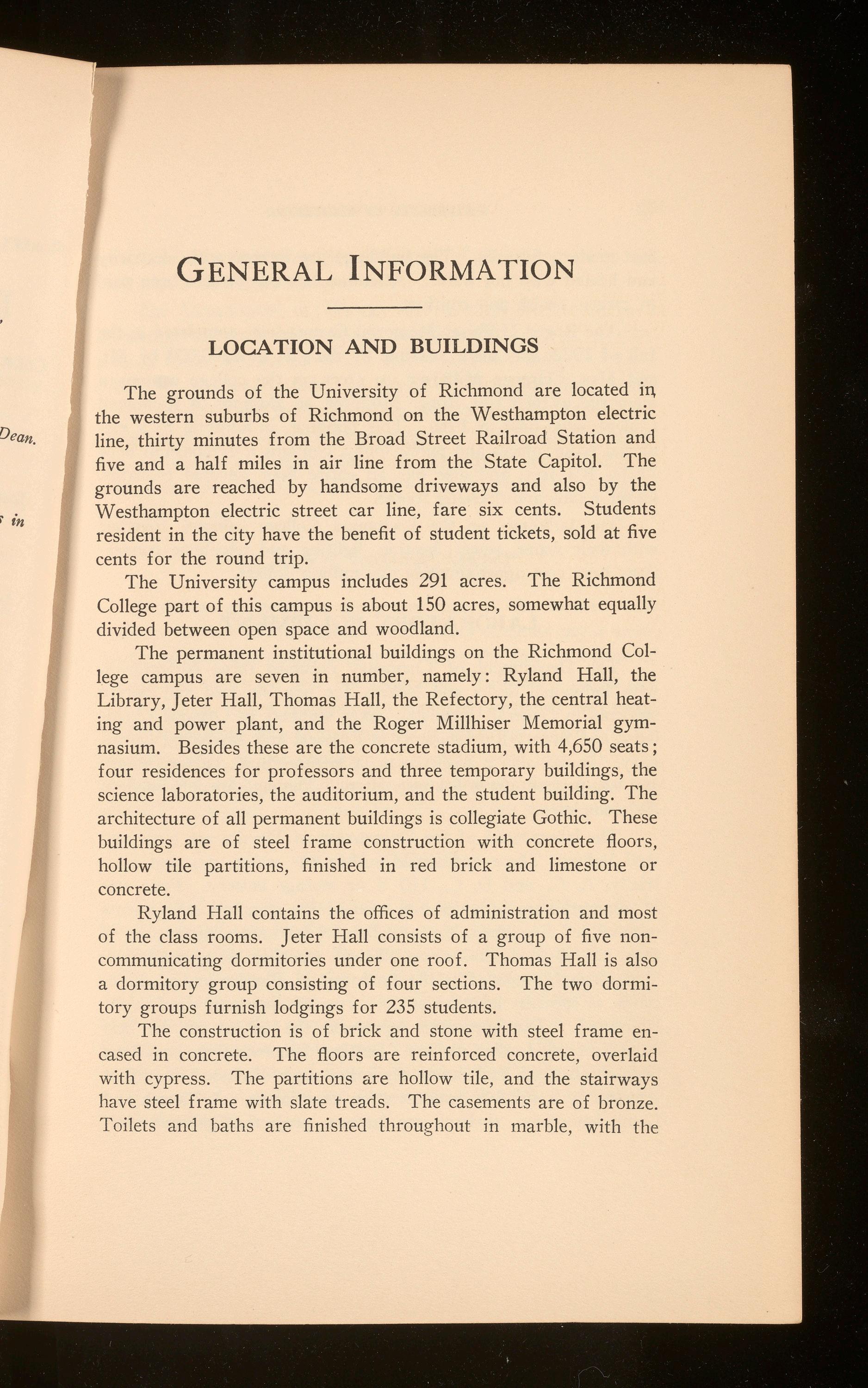
The grounds of the University of Richmond are located in, the western suburbs of Richmond on the Westhampton electric line, thirty minutes from the Broad Street Railroad Station and five and a half miles in air line from the State Capitol. The grounds are reached by handsome driveways and also by the Westhampton electric street car line, fare six cents. Students resident in the city have the benefit of student tickets, sold at five cents for the round trip.
The University campus includes 291 acres. The Richmond College part of this campus is about 150 acres, somewhat equally divided between open space and woodland.
The permanent institutional buildings on the Richmond College campus are seven in number, namely: Ryland Hall, the Library, Jeter Hall, Thomas Hall, the Refectory, the central heating and power plant, and the Roger Millhiser Memorial gymnasium. Besides these are the concrete stadium, with 4,650 seats; four residences for professors and three temporary buildings, the science laboratories, the auditorium, and the student building. The architecture of all permanent buildings is collegiate Gothic. These buildings are of steel frame construction with concrete floors, hollow tile partitions, finished in red brick and limestone or concrete.
Ryland Hall contains the offices of administration and most of the class rooms. Jeter Hall consists of a group of five noncommunicating dormitories under one roof. Thomas Hall is also a dormitory group consisting of four sections. The two dormitory groups furnish lodgings for 235 students.
The construction is of brick and stone with steel frame encased in concrete. The floors are reinforced concrete, overlaid with cypress. The partitions are hollow tile, and the stairways have steel frame with slate treads. The casements are of bronze. Toilets and baths are finished throughout in marble, with the
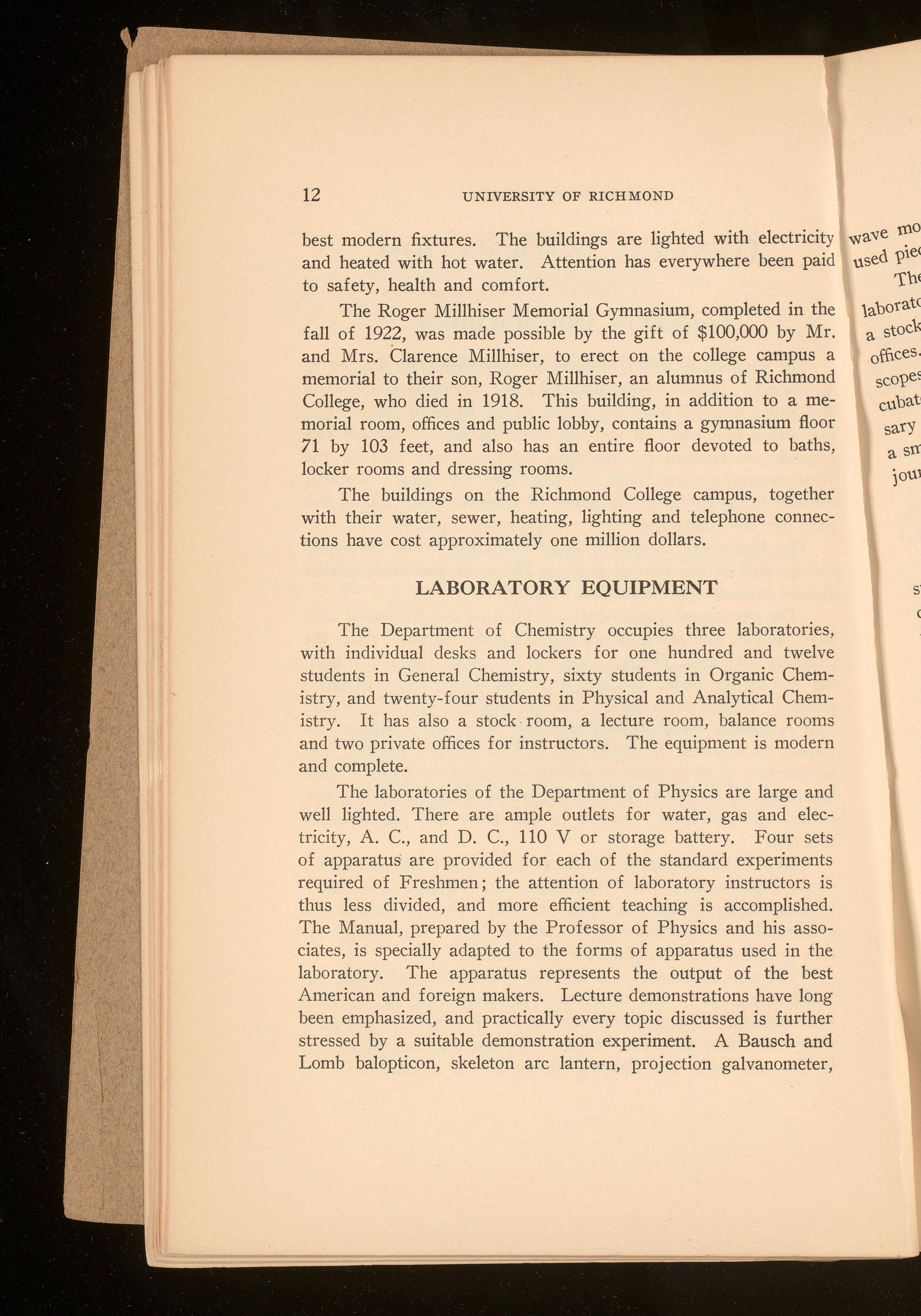
best modern fixtures. The buildings are lighted with electricit y and heated with hot water. Attention has everywhere been paid to safety, health and comfort.
The Roger Millhiser Memorial Gymnasium, completed in the fall of 1922, was made possible by the gift of $100,000 by Mr. and Mrs. Clarence Millhiser, to erect on the college campus a memorial to their son, Roger Millhiser, an alumnus of Richmond College, who died in 1918. This building, in addition to a memorial room, offices and public lobby, contains a gymnasium floor 71 by 103 feet, and also has an entire floor devoted to baths, locker rooms and dressing rooms.
The buildings on the Richmond College campus, together with their water, sewer, heating, lighting and telephone connections have cost approximately one million dollars.
The Department of Chemistry occupies three laboratories, with individual desks and lockers for one hundred and twelve students in General Chemistry, sixty students in Organic Chemistry, and twenty-four students in Physical and Analytical Chemistry. It has also a stock room, a lecture room, balance ro oms and two private offices for instructors. The equipment is modern and complete.
The laboratories of the Department of Physics are large and well lighted. There are ample outlets for water, gas and electricity, A. C., and D C., 110 V or st orage battery. Four sets of apparatus are provided for each of the standard experiments required of Freshmen; the attention of laboratory instructors is thus less divided, and more efficient teaching is accomplished. The Manual, prepared by the Professor of Physics and his associates, is specially adapted to the forms of apparatus used in the laboratory. The apparatus represents the output of the best American and foreign makers. Lecture demonstrations have long been emphasized, and practically every topic discussed is further stressed by a suitable demonstration experiment. A Bausch and Lomb balopticon, skeleton arc lantern, projection galvanometer,
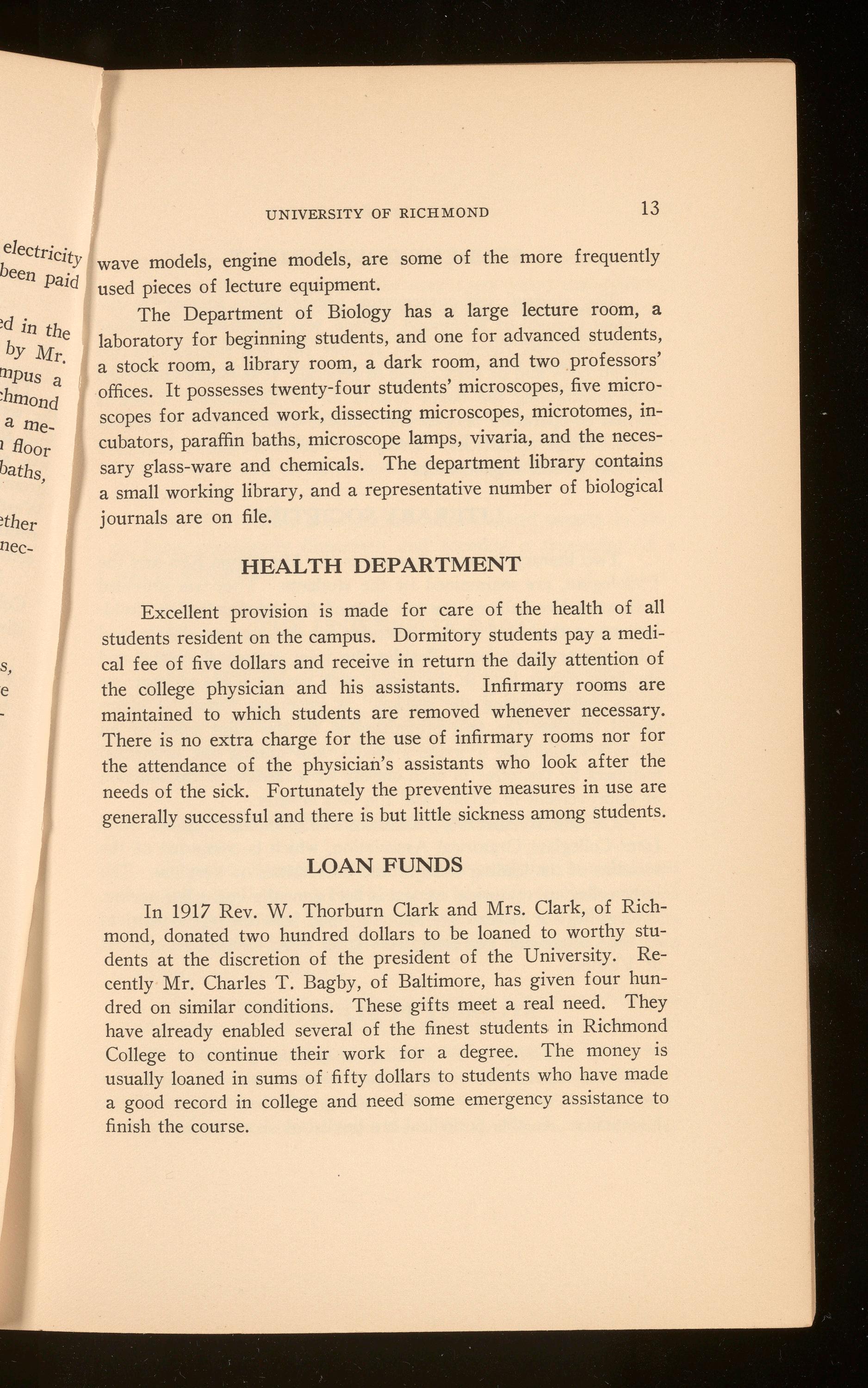
wave models, engine models, are some of the more frequently used pieces of lecture equipment.
The Department of Biology has a large lecture room, a laboratory for beginning students, and one for advanced students, a stock room, a library room, a dark room, and two professors' offices. It possesses twenty-four students' microscopes, five microscopes for advanced work, dissecting microscopes, microtomes, incubators, paraffin baths, microscope lamps, vivaria, and the necessary glass-ware and chemicals. The department library contains a small working library, and a representative number of biological journals are on file.
Excellent provision is made for care of the health of all students resident on the campus. Dormitory students pay a medical fee of five dollars and receive in return the daily attention of the college physician and his assistants. Infirmary rooms are maintained to which students are removed whenever necessary. There is no extra charge for the use of infirmary rooms nor for the attendance of the physician's assistants who look after the needs of the sick. Fortunately the preventive measures in use are generally successful and there is but little sickness among students.
In 1917 Rev. W. Thorburn Clark and Mrs. Clark, of Richmond, donated two hundred dollars to be loaned to worthy students at the discretion of the president of the University. Recently Mr. Charles T. Bagby, of Baltimore, has given four hundred on similar conditions. These gifts meet a real need. They have already enabled several of the finest students in Richmond College to continue their work for a degree. The money is usually loaned in sums of fifty dollars to students who have made a good record in college and need some emergency assistance to finish the course.
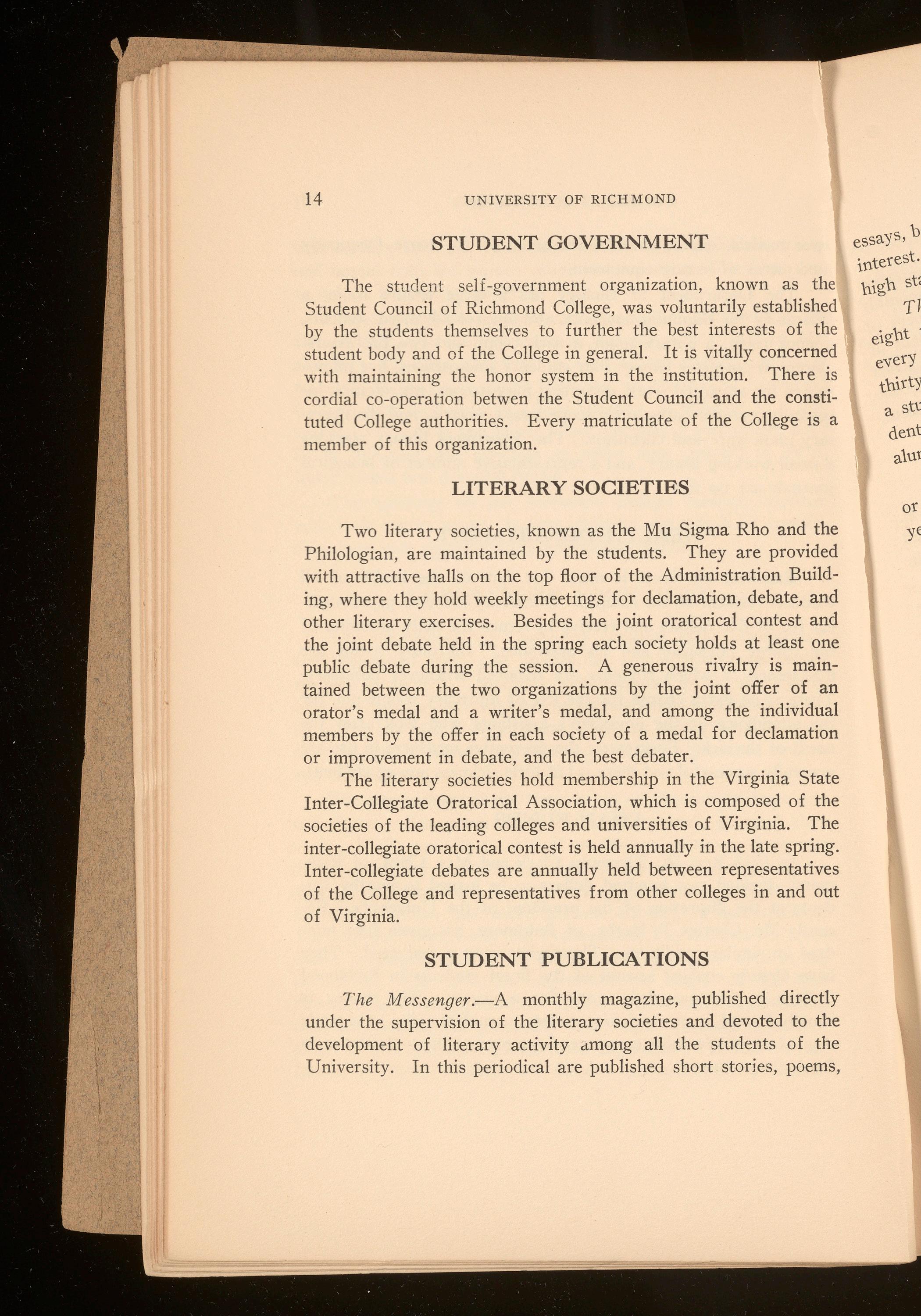
The student self-government organization, known as the Student Council of Richmond College, was voluntarily established by the students themselves to further the best interests of the student body and of the College in general. It is vitally concerned with maintaining the honor system in the institution. There is cordial co-operation betwen the Student Council and the constituted College authorities. Every matriculate of the College is a member of this organization.
Two literary societies, known as the Mu Sigma Rho and the Philologian, are maintained by the students. They are provided with attractive halls on the top floor of the Administration Building, where they hold weekly meetings for declamation, debate, and other literary exercises. Besides the joint oratorical contest and the joint debate held in the spring each society holds at least one public debate during the session. A generous rivalry is maintained between the two organizations by the joint offer of an orator's medal and a writer's medal, and among the individual members by the offer in each society of a medal for declamation or improvement in debate, and the best debater.
The literary societies hold membership in the Virginia State Inter-Collegiate Oratorical Association, which is composed of the societies of the leading colleges and universities of Virginia. The inter-collegiate oratorical contest is held annually in the late spring. Inter-collegiate debates are annually held between representatives of the College and representatives from other colleges in and out of Virginia.
The M essenger.-A monthly magazine, published directly under the supervision of the literary societies and devoted to the development of literary activity among all the students of the University. In this periodical are published short stories, poems,
n as the Y of the · lS the · lS the
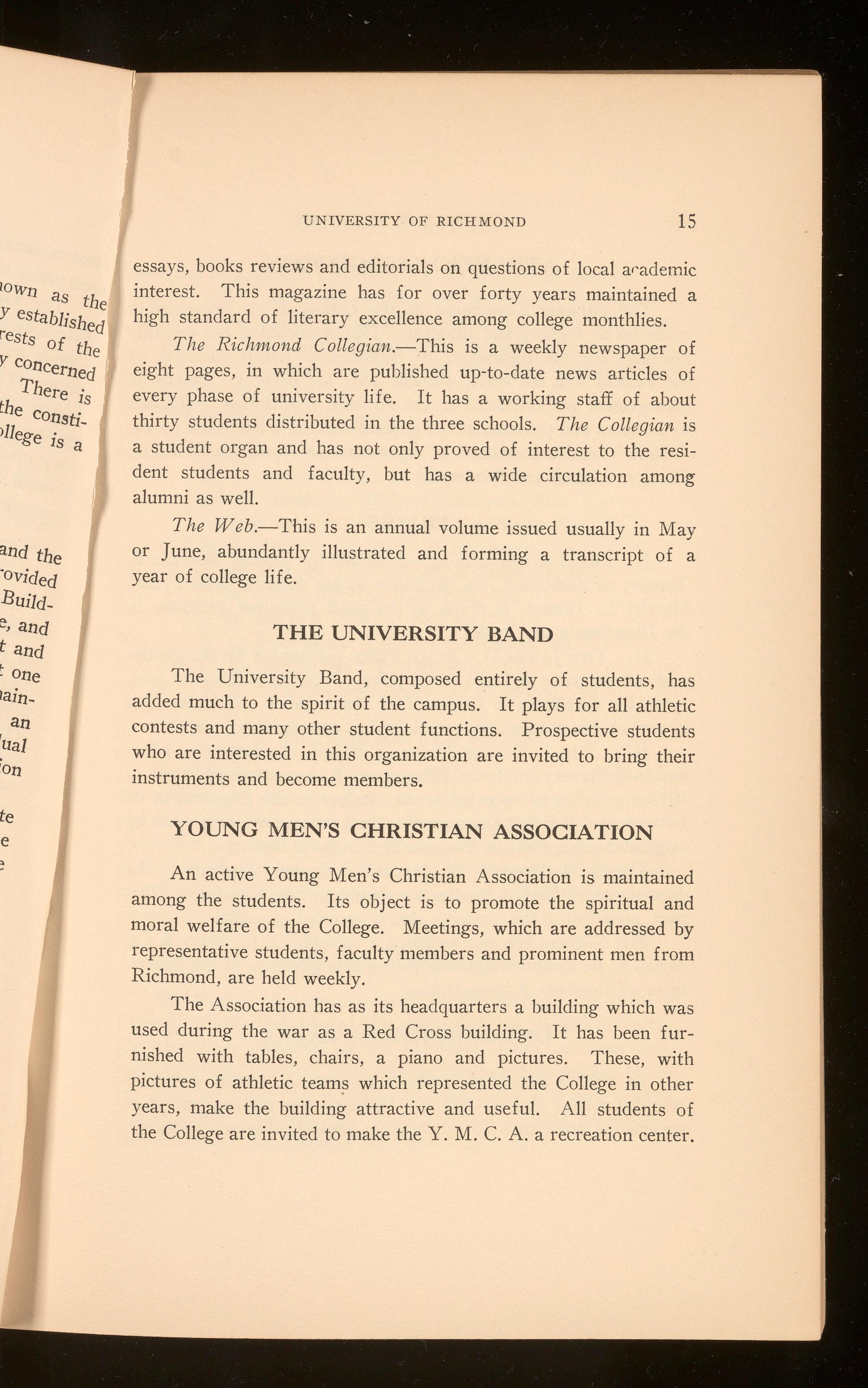
essays, books reviews and editorials on questions of local academic interest. This magazine has for over forty years maintained a high standard of literary excellence among college monthlies.
The Richmond Collegian -This is a weekly newspaper of eight pages, in which are published up-to-date news articles of every phase of university life. It has a working staff of about thirty students distributed in the three schools. The Collegian is a student organ and has not only proved of interest to the resident students and faculty, but has a wide circulation among alumni as well.
The W eb.-This is an annual volume issued usually in May or June, abundantly illustrated and forming a transcript of a year of college life.
The University Band, composed entirely of students, has added much to the spirit of the campus. It plays for all athletic contests and many other student functions. Prospective students who are interested in this organization are invited to bring their instruments and become members.
An active Young Men's Christian Association is maintained among the students. Its object is to promote the spiritual and moral welfare of the College. Meetings, which are addressed by representative students, faculty members and prominent men from Richmond, are held weekly.
The Association has as its headquarters a building which was used during the war as a Red Cross building. It has been furnished with tables, chairs, a piano and pictures. These, with pictures of athletic teams which represented the College in other years, make the building attractive and useful. All students of the College are invited to make the Y. M. C. A. a recreation center.
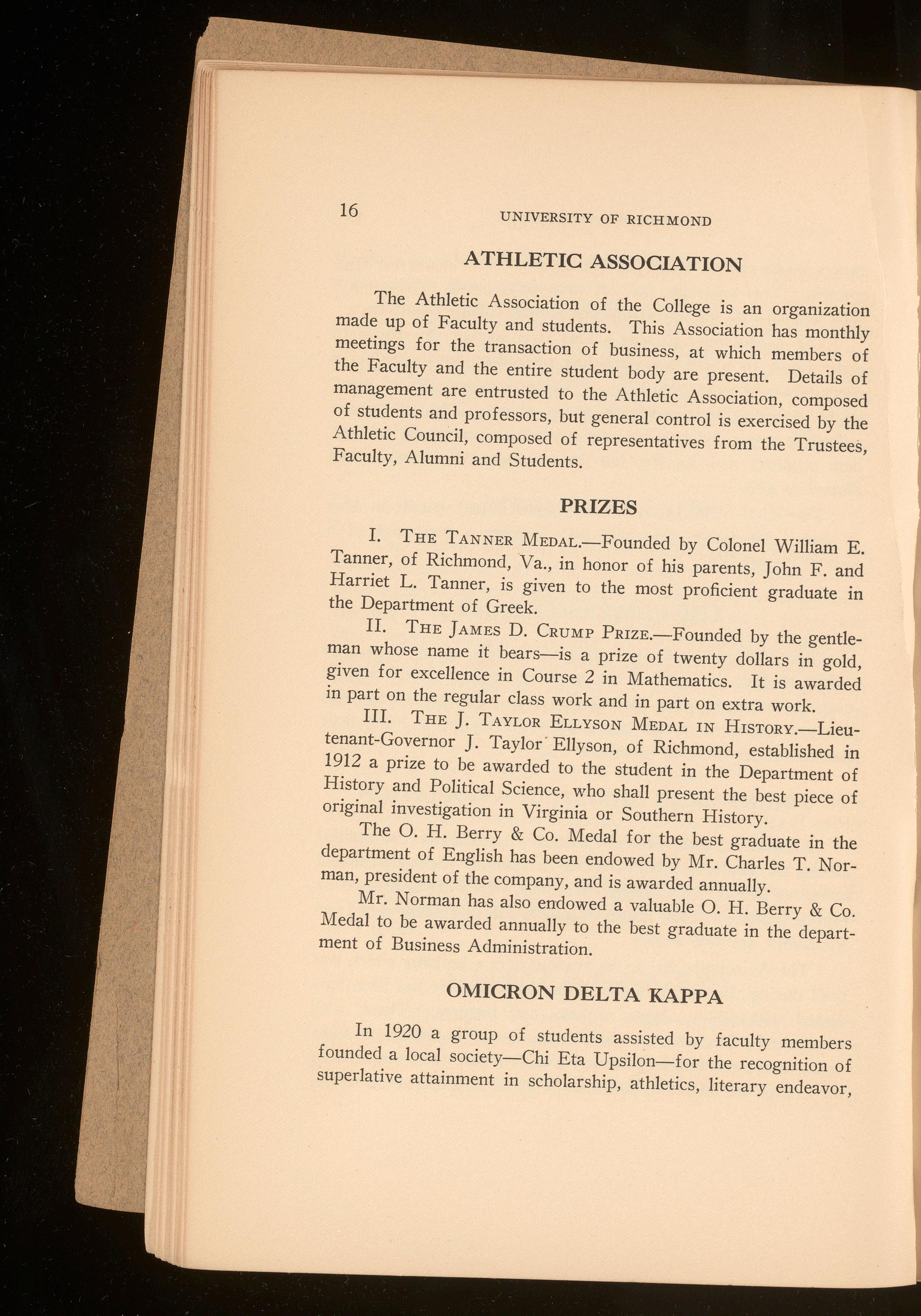
The Athletic Association of the College is an organization made up of Faculty and students. This Association has monthly meetings for the transaction of business, at which members of the Faculty and the entire student body are present. Details of management are entrusted to the Athletic Association, composed of students and professors, but general control is exercised by the Athletic Council, composed of representatives from the Trustees, Faculty, Alumni and Students.
I. THE TANNER MEDAL.-Founded by Colonel William E. Tanner, of Richmond, Va., in honor of his parents, John F. and Harriet L. Tanner, is given to the most proficient graduate in the Department of Greek.
II. THE JAMES D. CRUMPPRIZE.-Founded by the gentle- man whose name it bears-is a prize of twenty dollars in gold, given for excellence in Course 2 in Mathematics. It is awarded in part on the regular class work and in part on extra work.
III. THE J. TAYLORELLYSONMEDALIN HISTORY.-Lieu- tenant-Governor J. Taylor · Ellyson, of Richmond, established in 1912 a prize to be awarded to the student in the Department of History and Political Science, who shall present the best piece of original investigation in Virginia or Southern History.
The 0. H. Berry & Co. Medal for the best graduate in the department of English has been endowed by Mr. Charles T. Nor- man, president of the company, and is awarded annually.
Mr. Norman has also endowed a valuable 0. H. Berry & Co. Medal to be awarded annually to the best graduate in the depart- ment of Business Administration.
In 1920 a group of students assisted by faculty members founded a local society-Chi Eta Upsilon-for the recognition of superlative attainment in scholarship, athletics, literary endeavor,
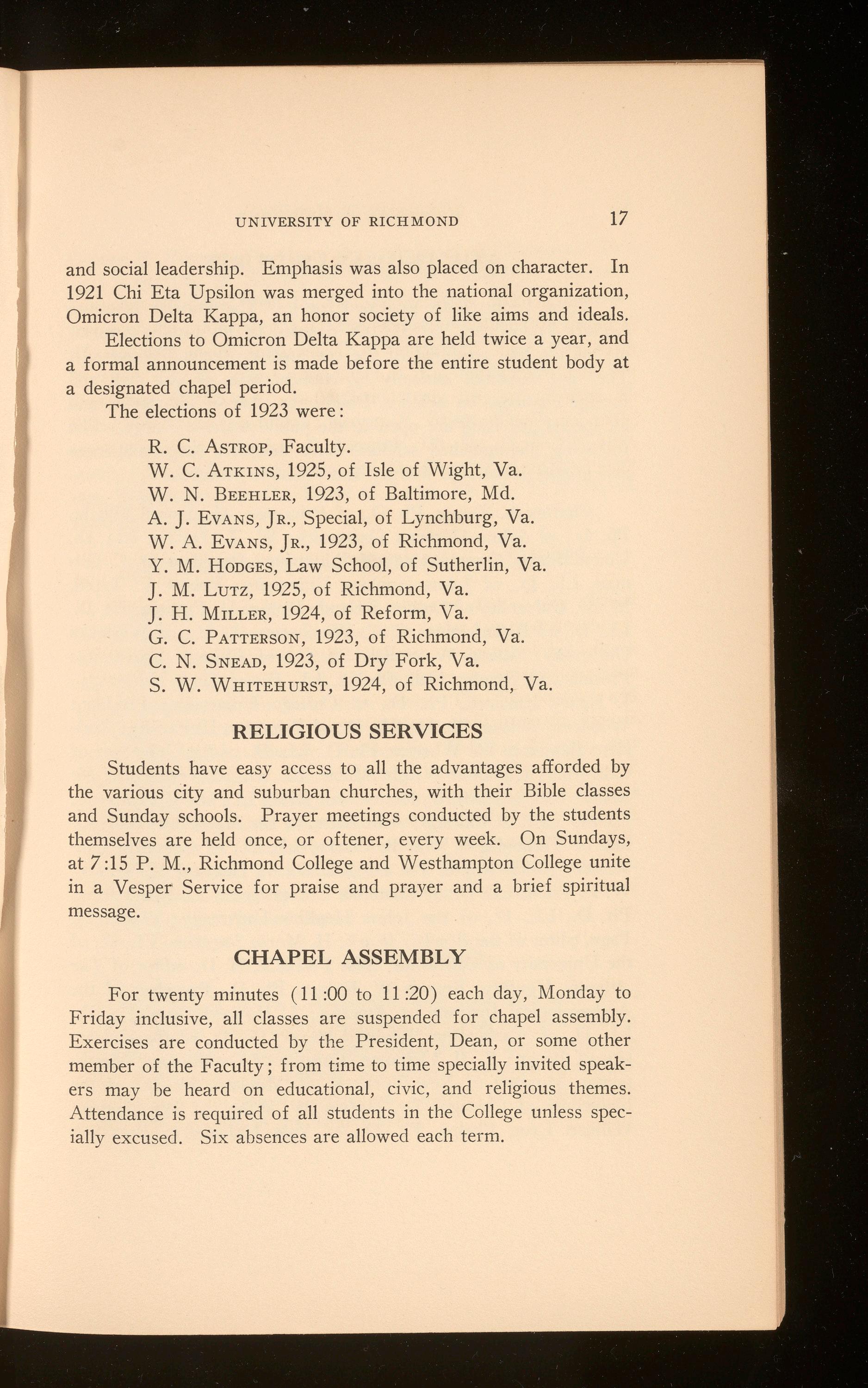
and social leadership. Emphasis was also placed on character. In 1921 Chi Eta Upsilon was merged into the national organization, Omicron Delta Kappa, an honor society of like aims and ideals. Elections to Omicron Delta Kappa are held twice a year, and a formal announcement is made before the entire student body at a designated chapel period. The elections of 1923 were:
R. C. AsTROP, Faculty.
W. C. ATKINS, 1925, of Isle of Wight, Va.
W. N. BEEHLER, 1923, of Baltimore, Md.
A. J. EVANS,JR., Special, of Lynchburg, Va.
W. A. EvANS, JR., 1923, of Richmond, Va.
Y. M. HODGES,Law School, of Sutherlin, Va.
J. M. LuTZ, 1925, of Richmond, Va.
J. H. MILLER, 1924, of Reform, Va.
G. C. PATTERSON,1923, of Richmond, Va.
C. N. SNEAD, 1923, of Dry Fork, Va.
S. W. WHITEHURST, 1924, of Richmond, Va.
Students have easy access to all the advantages afforded by the various city and suburban churches, with their Bible classes and Sunday schools. Prayer meetings conducted by the students themselves are held once, or oftener, every week. On Sundays, at 7 :15 P. M., Richmond College and Westhampton College unite in a Vesper Service for praise and prayer and a brief spiritual message.
For twenty minutes (11 :00 to 11 :20) each day, Monday to Friday inclusive, all classes are suspended for chapel assembly. Exercises are conducted by the President, Dean, or some other member of the Faculty; from time to time specially invited speakers may be heard on educational, civic, and religious themes. Attendance is required of all students in the College unless specially excused. Six absences are allowed each term.
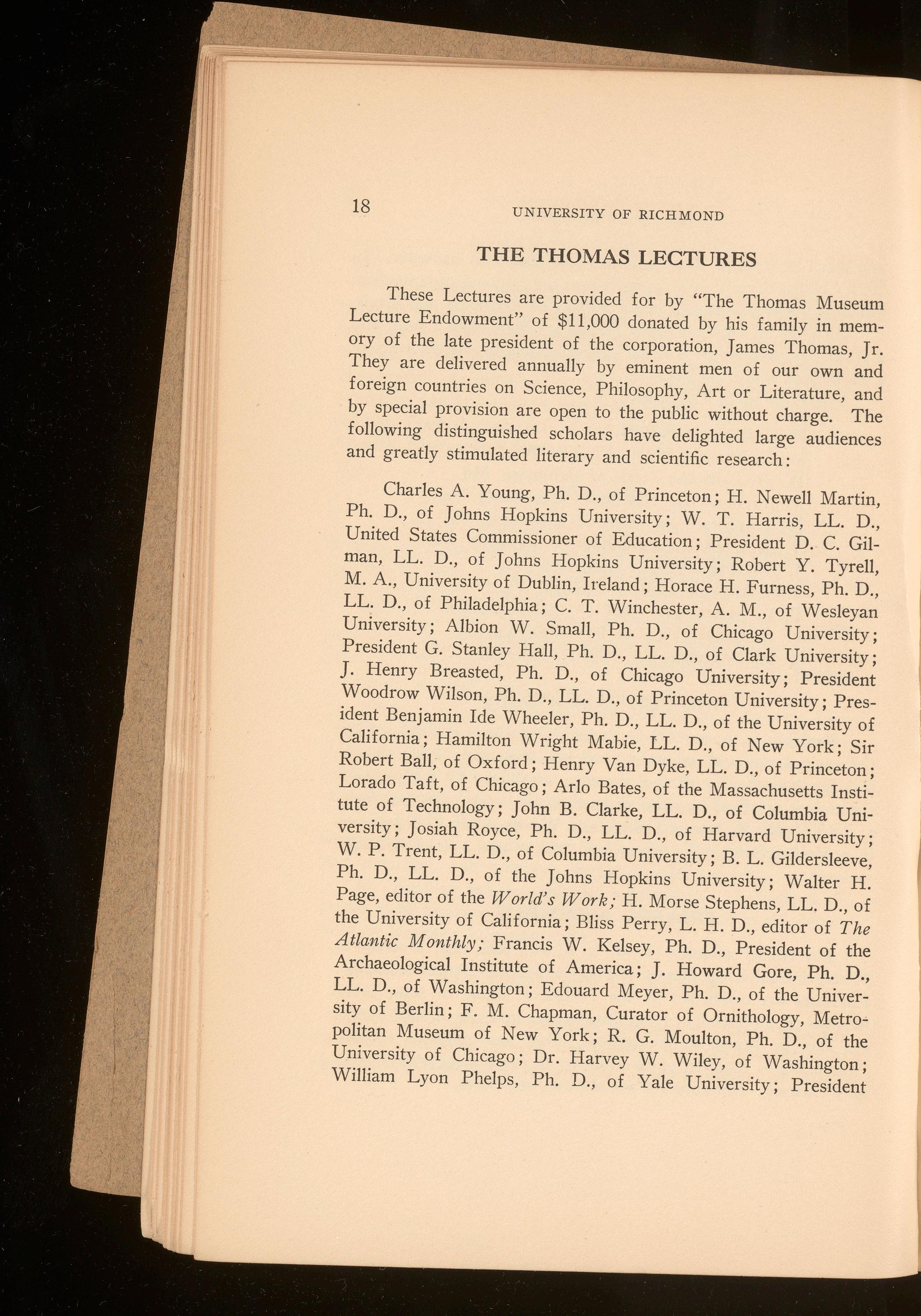
These Lectures are provided for by "The Thomas Museum Lecture Endowment" of $11,000 donated by his family in mem- ory of the late president of the corporation, James Thomas, Jr. They are delivered annually by eminent men of our own and foreign countries on Science, Philosophy, Art or Literature, and by special provision are open to the public without charge. The following distinguished scholars have delighted large audiences and greatly stimulated literary and scientific research:
Charles A. Young, Ph.D., of Princeton; H. Newell Martin, Ph. D., of Johns Hopkins University; W. T. Harris, LL. D., United States Commissioner of Education; President D. C. Gil- man, LL. D., of Johns Hopkins University; Robert Y. Tyrell, M. A., University of Dublin, Ireland; Horace H. Furness, Ph. D., LL. D., of Philadelphia; C. T. Winchester, A. M., of Wesleyan University; Albion W. Small, Ph. D., of Chicago University; President G. Stanley Hall, Ph. D., LL. D., of Clark University; J. Henry Breasted, Ph. D., of Chicago University; President Woodrow Wilson, Ph. D., LL. D., of Princeton University; Pres- ident Benjamin Ide Wheeler, Ph. D., LL. D., of the University of California; Hamilton Wright Mabie, LL. D., of New York; Sir Robert Ball, of Oxford; Henry Van Dyke, LL. D., of Princeton; Lorado Taft, of Chicago; Arlo Bates, of the Massachusetts Insti- tute of Technology; John B. Clarke, LL. D., of Columbia Uni- versity; Josiah Royce, Ph. D., LL. D., of Harvard University; W. P. Trent, LL. D., of Columbia University; B. L. Gildersleeve, Ph. D., LL. D., of the Johns Hopkins University; Walter H. Page, editor of the World's Work; H. Morse Stephens, LL. D., of the University of California; Bliss Perry, L. H. D., editor of The Atlantic Monthly; Francis W. Kelsey, Ph. D., President of the Archaeological Institute of America; J. Howard Gore, Ph. D., LL. D., of Washington; Edouard Meyer, Ph. D., of the Univer- sity of Berlin; F. M. Chapman, Curator of Ornithology, Metro- politan Museum of New York; R. G. Moulton, Ph. D., of the University of Chicago; Dr. Harvey W. Wiley, of Washington; William Lyon Phelps, Ph. D., of Yale University; President
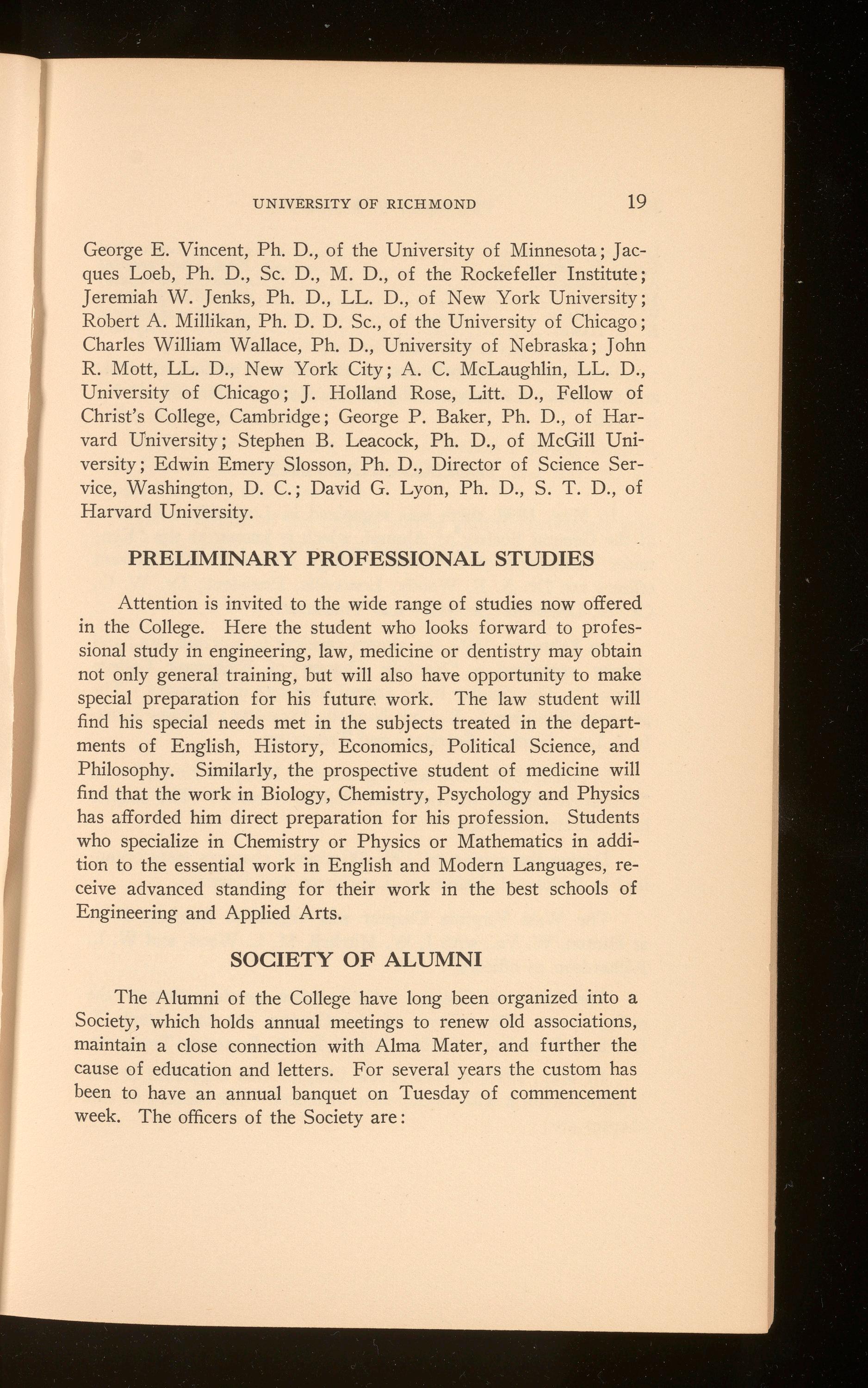
George E. Vincent, Ph.D., of the University of Minnesota; Jacques Loeb, Ph. D., Sc. D., M. D., of the Rockefeller Institute; Jeremiah W. Jenks, Ph. D., LL. D., of New York University; Robert A. Millikan, Ph. D. D. Sc., of the University of Chicago; Charles William Wallace, Ph. D ., University of Nebraska; John R. Mott, LL. D., New York City; A. C. McLaughlin, LL. D., University of Chicago; J. Holland Rose, Litt. D., Fellow of Christ's College, Cambridge; George P. Baker, Ph. D., of Harvard University; Stephen B. Leacock, Ph. D., of McGill University; Edwin Emery Slosson, Ph. D., Director of Science Service, Washington, D . C.; David G. Lyon, Ph. D., S. T. D., of Harvard University.
Attention is invited to the wide range of studies now offered in the College. Here the student who looks forward to professional study in engineering, law, medicine or dentistry may obtain not only general training, but will also have opportunity to make special preparation for his future work. The law student will find his special needs met in the subjects treated in the departments of English, History, Economics, Political Science, and Philosophy. Similarly, the prospective student of medicine will find that the work in Biology, Chemistry, Psychology and Physics has afforded him direct preparation for his profession. Students who specialize in Chemistry or Physics or Mathematics in addition to the essential work in English and Modern Languages, receive advanced standing for their work in the best schools of Engineering and Applied Arts.
The Alumni of the College have long been organized into a Society, which holds annual meetings to renew old associations, maintain a close connection with Alma Mater, and further the cause of education and letters. For several years the custom has been to have an annual banquet on Tuesday of commencement week. The officers of the Society are :
DouGLAS S. FREEMAN
SMITH,
H. CAMDEN

Degree men are members of the Society without election, and all former students are eligible for election. The annual fee is $1.00.
In May, 1898, there was organized in Louisville a Chapter of the General Society of Alumni, which is known as the "Ken- tucky Association of Richmond College Alumni." The present officers are Dr. S. E. Woody, Louisville, President; Dr. W. 0. Carver, Louisville, Secretary and Treasurer.
On February, 1899, the alumni resident in Norfolk, Va., and vicinity organized a "N orfol¼ Chapter of Richmond College Alumni." The chapter holds annual meetings in February. The present officers are L. B. Cox, Norfolk, President; Burnley Lank- ford, Esq., Norfolk, Secretary and Treasurer.
In April, 1903, there was organized in Newport News, Va., a "Peninsula Chapter of Richmond College Alumni." The chapter holds annual meetings.
During the session of 1905-'06 alumni chapters were organ- ized in Richmond, Baltimore, Lynchburg and Roanoke.
The West Virginia Chapter was organized October, 1910, at Hinton, W. Va., with J. W. Mitchell, M. L. Wood, and W. L. Richardson as officers.
The Richmond Chapter holds frequent meetings through the college year. The officers of the Chapter are Mr. Frank T. Louthan, President, and Mr. Robert Brock, Secretary-Treasurer.
In May, 1916, a New York Chapter was organized at the Waldorf-Astoria with twenty-nine members. The officers of this chapter are :
JESSE READ TAYLOR •••••••••••••••••••••••••••••••••••••••.•• • President
CHARLES MARSHALL GRAVES ••••••••• _ ••••••••••••••••••••• Vice-President
HENRY K. ELLYSON, JR • ••
CuRTIS LEE LA ws ..... ............................
J. LAURENS ELMORE •••••••••••
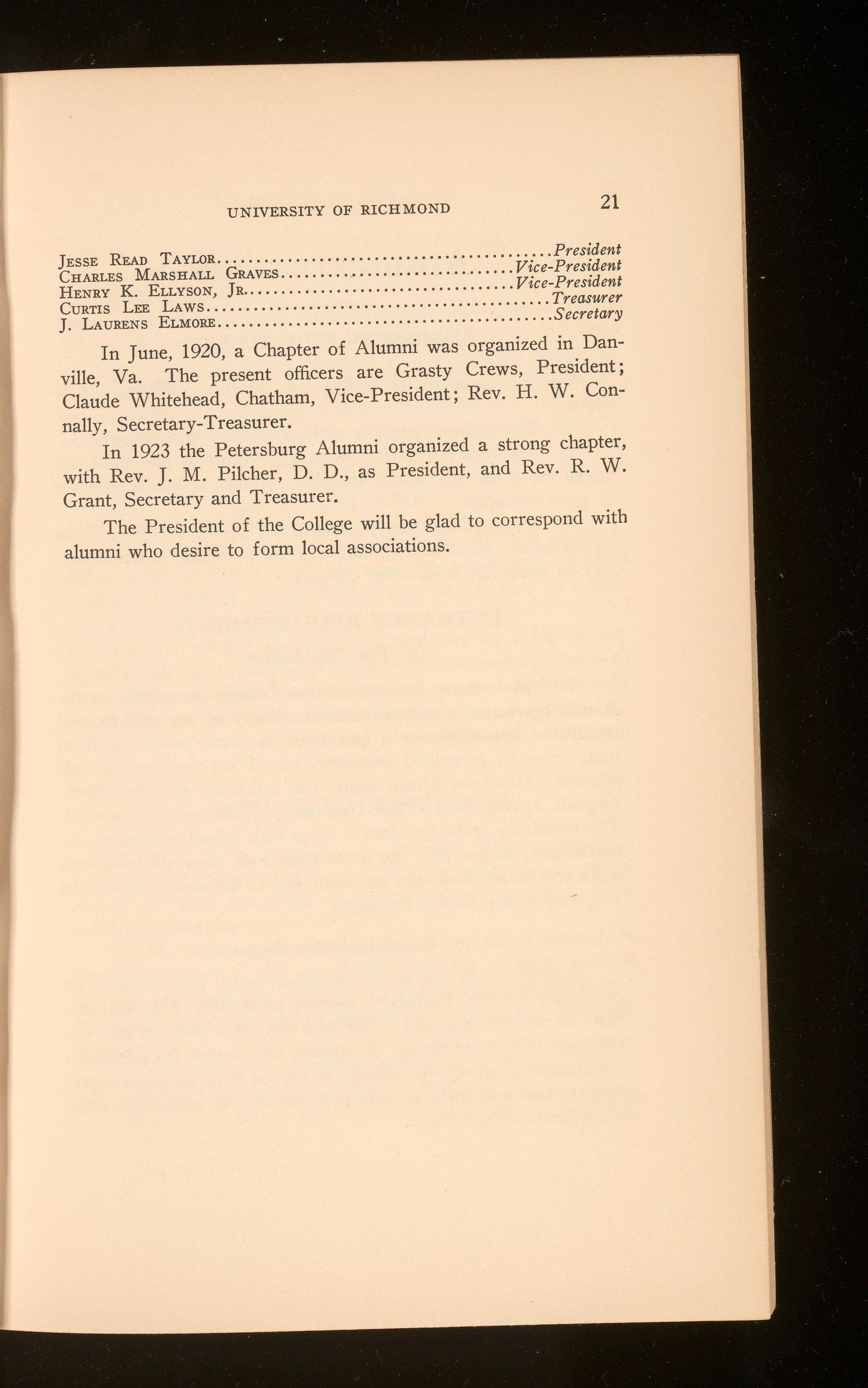
Treasurer
In June, 1920, a Chapter of Alumni was organized in Danville, Va. The present officers are Grasty Crews, President; Claude Whitehead, Chatham, Vice-President; Rev. H. W. Connally, Secretary-Treasurer.
In 1923 the Petersburg Alumni organized a strong chapter, with Rev. J. M. Pilcher, D. D., as President, and Rev. R. W. Grant, Secretary and Treasurer.
The President of the College will be glad to correspond with alumni who desire to form local associations.

For admission to the College the general conditions are as follows:
1. The applicant must be at least sixteen years of age.
2. The applicant must present a certificate of honorable dis- missal from the last school attended or other sufficient evidence of good character.
3. The applicant may be admitted ( 1) on a certificate from an accredited secondary school; (2) on a written examination; ( 3) on transcript from other colleges.
The requirements for admission to College are stated in units. A unit represents a standard session's study in any subject, and constitutes approximately a quarter of a year's work. Fifteen units from an accredited secondary school are required for ad- m1ss10n. Of these fifteen units, the following are prescribed: English, 3; Algebra, 1; Plane Geometry, 1; History, 1; Science, 1. The remaining units are elective from high school graduation re- quirements, except that not more than four units of vocational work will be accepted, and no credit will be allowed for less than two units in any foreign language.
In addition to the above prescribed units for entrance, all candidates for the Bachelor's degrees must offer four entrance units in foreign language. Not less than two units in any one language will be accepted. A student who meets the admission requirements, but who is deficient in one or more of these degree requirements may make up such deficiencies after entering college, but without college credit.
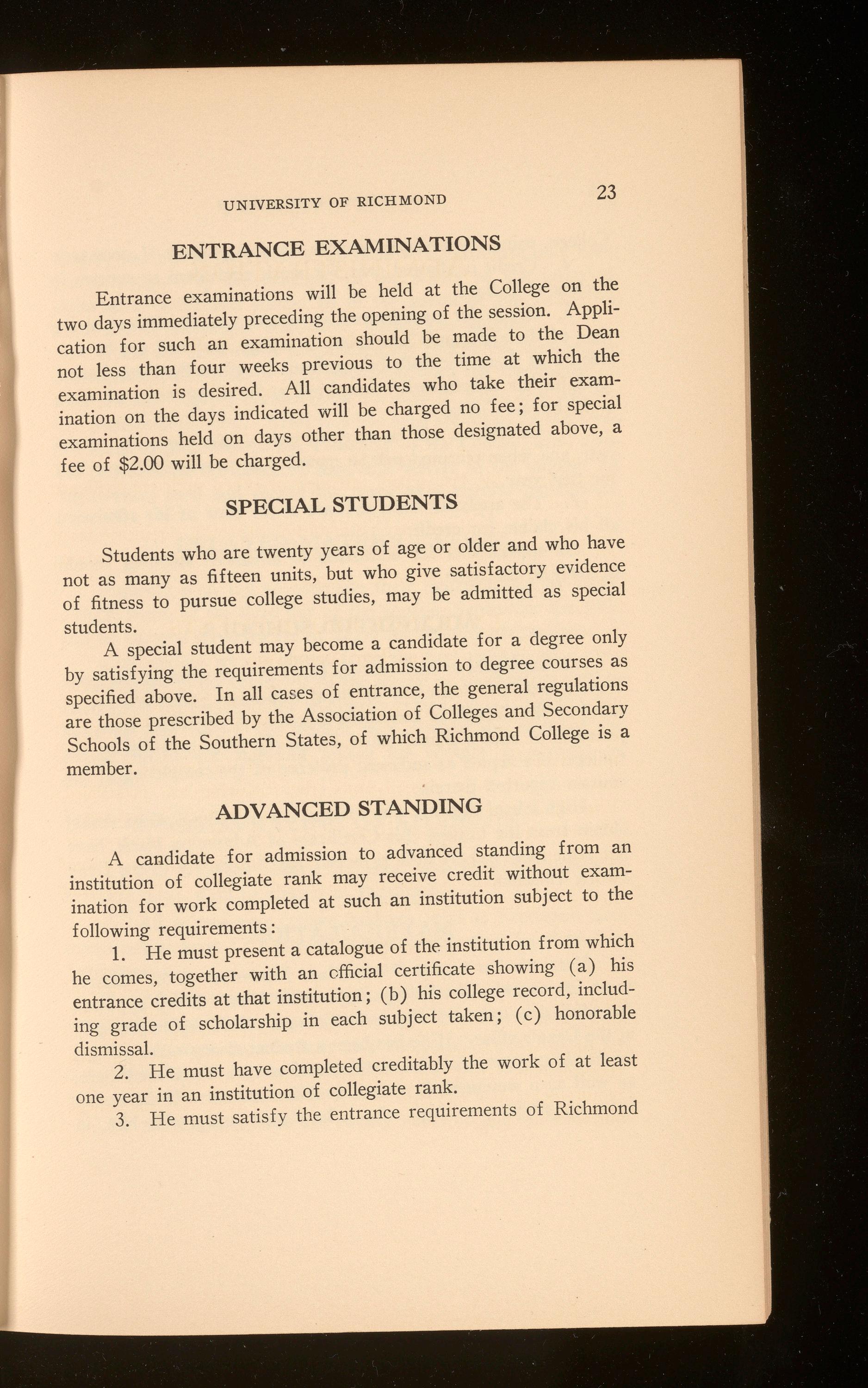
Entrance examinations will be held at the College on the two days immediately preceding the opening of the session. Application for such an examination should be made to the Dean not less than four weeks previous to the time at which the examination is desired. All candidates who take their examination on the days indicated will be charged no fee; for special examinations held on days other than those designated above, a fee of $2.00 will be charged.
Students who are twenty years of age or older and who have not as many as fifteen units, but who give satisfactory evidence of fitness to pursue college studies, may be admitted as special students.
A special student may become a candidate for a degree only by satisfying the requirements for admission to degree courses as specified above. In all cases of entrance, the general regulations are those prescribed by the Association of Colleges and Secondary Schools of the Southern States, of which Richmond College is a member.
A candidate for admission to advanced standing from an institution of collegiate rank may receive credit without examination for work completed at such an institution subject to the following requirements :
1. He must present a catalogue of the institution from which he comes, together with an cfficial certificate showing (a) his entrance credits at that institution; (b) his college record, including grade of scholarship in each subject taken; ( c) honorable dismissal.
2. He must have completed creditably the work of at least one year in an institution of collegiate rank.
3. He must satisfy the entrance requirements of Richmond
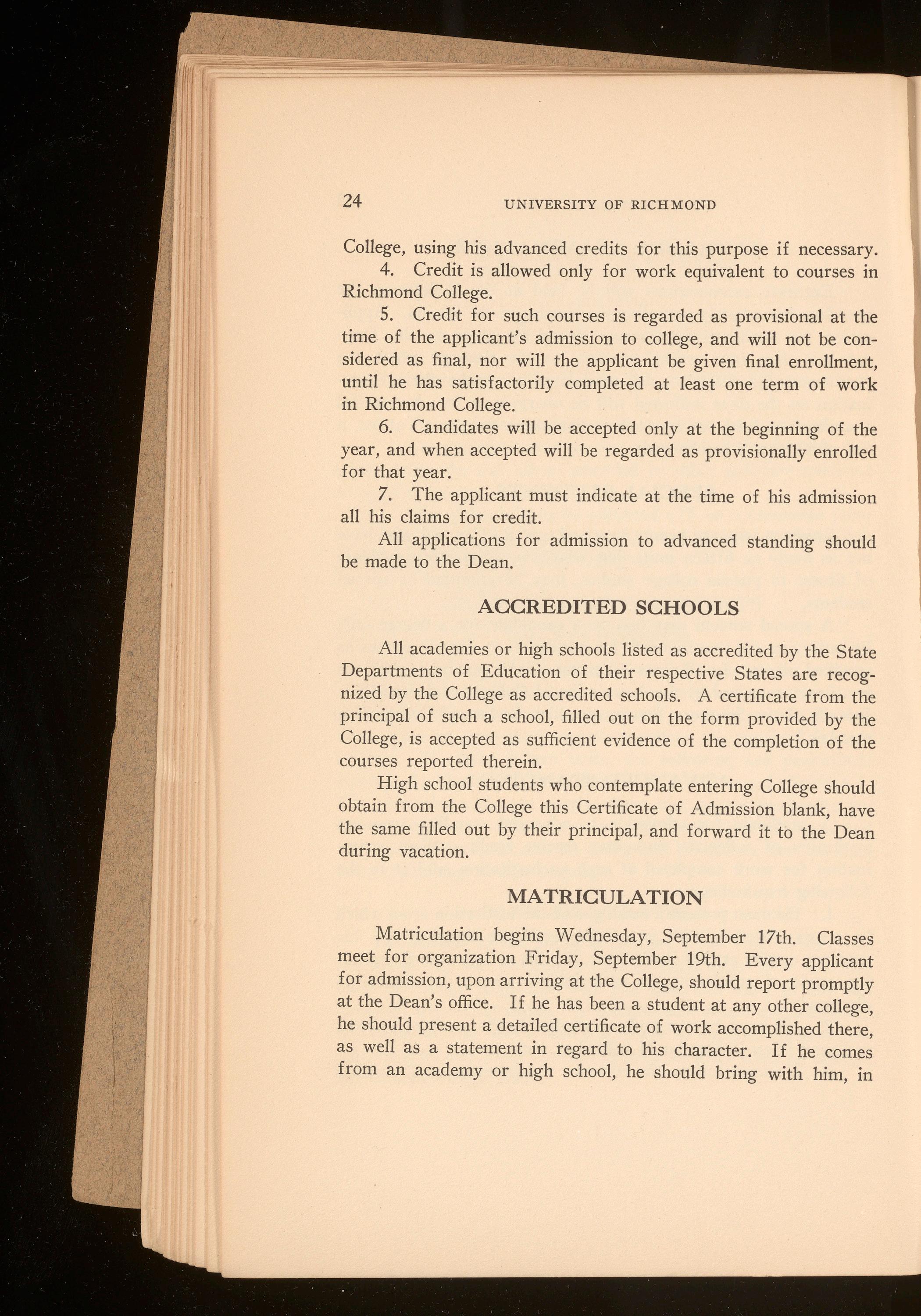
College, using his advanced credits for this purpose if necessary.
4. Credit is allowed only for work equivalent to courses in Richmond College.
5. Credit for such courses is regarded as provisional at the time of the applicant's admission to college, and will not be considered as final, nor will the applicant be given final enrollment, until he has satisfactorily completed at least one term of work in Richmond College.
6. Candidates will be accepted only at the beginning of the year, and when accepted will be regarded as provisionally enrolled for that year.
7. The applicant must indicate at the time of his admission all his claims for credit.
All applications for admission to advanced standing should be made to the Dean.
All academies or high schools listed as accredited by the State Departments of Education of their respective States are recognized by the College as accredited schools. A certificate from the principal of such a school, filled out on the form provided by the College, is accepted as sufficient evidence of the completion of the courses reported therein.
High school students who contemplate entering College should obtain from the College this Certificate of Admission blank, have the same filled out by their principal, and forward it to the Dean during vacation.
Matriculation begins Wednesday, September 17th. Classes meet for organization Friday, September 19th. Every applicant for admission, upon arriving at the College, should report promptly at the Dean's office. If he has been a student at any other college, he should present a detailed certificate of work accomplished there, as well as a statement in regard to his character. If he comes from an academy or high school, he should bring with him, in
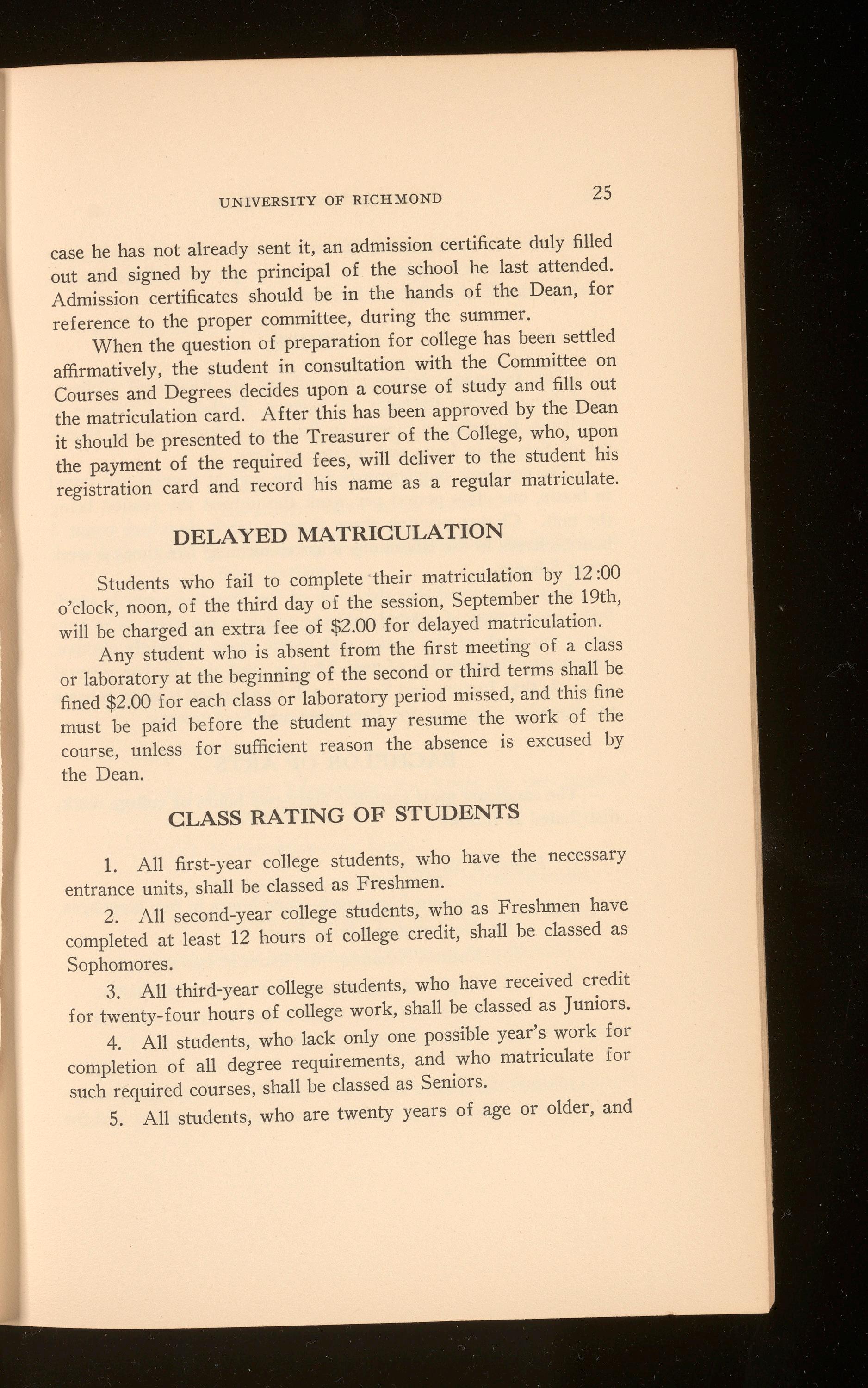
case he has not already sent it, an admission certificate duly filled out and signed by the principal of the school he last attended. Admission certificates should be in the hands of the Dean, for reference to the proper committee, during the summer. When the question of preparation for college has been settled affirmatively, the student in consultation with the Committee on Courses and Degrees decides upon a course of study and fills out the matriculation card. After this has been approved by the Dean it should be presented to the Treasurer of the College, who, upon the payment of the required fees, will deliver to the student his registration card and record his name as a regular matriculate.
Students who fail to complete their matriculation by 12 :00 o'clock, noon, of the third day of the session, September the 19th, will be charged an extra fee of $2.00 for delayed matriculation. Any student who is absent from the first meeting of a class or laboratory at the beginning of the second or third terms shall be fined $2.00 for each class or laboratory period missed, and this fine must be paid before the student may resume the work of the course , unless for sufficient reason the absence is excused by the Dean.
1. All first-year college students, who have the necessary entrance units, shall be classed as Freshmen.
2. All second-year college students, who as Freshmen have completed at least 12 hours of college credit, shall be classed as Sophomores.
3. All third-year college students, who have received credit for twenty-four hours of college work, shall be classed as Juniors.
4. All students, who lack only one possible year's work for completion of all degree requirements, and who matriculate for such required courses, shall be classed as Seniors.
5. All students, who are twenty years of age or older, and
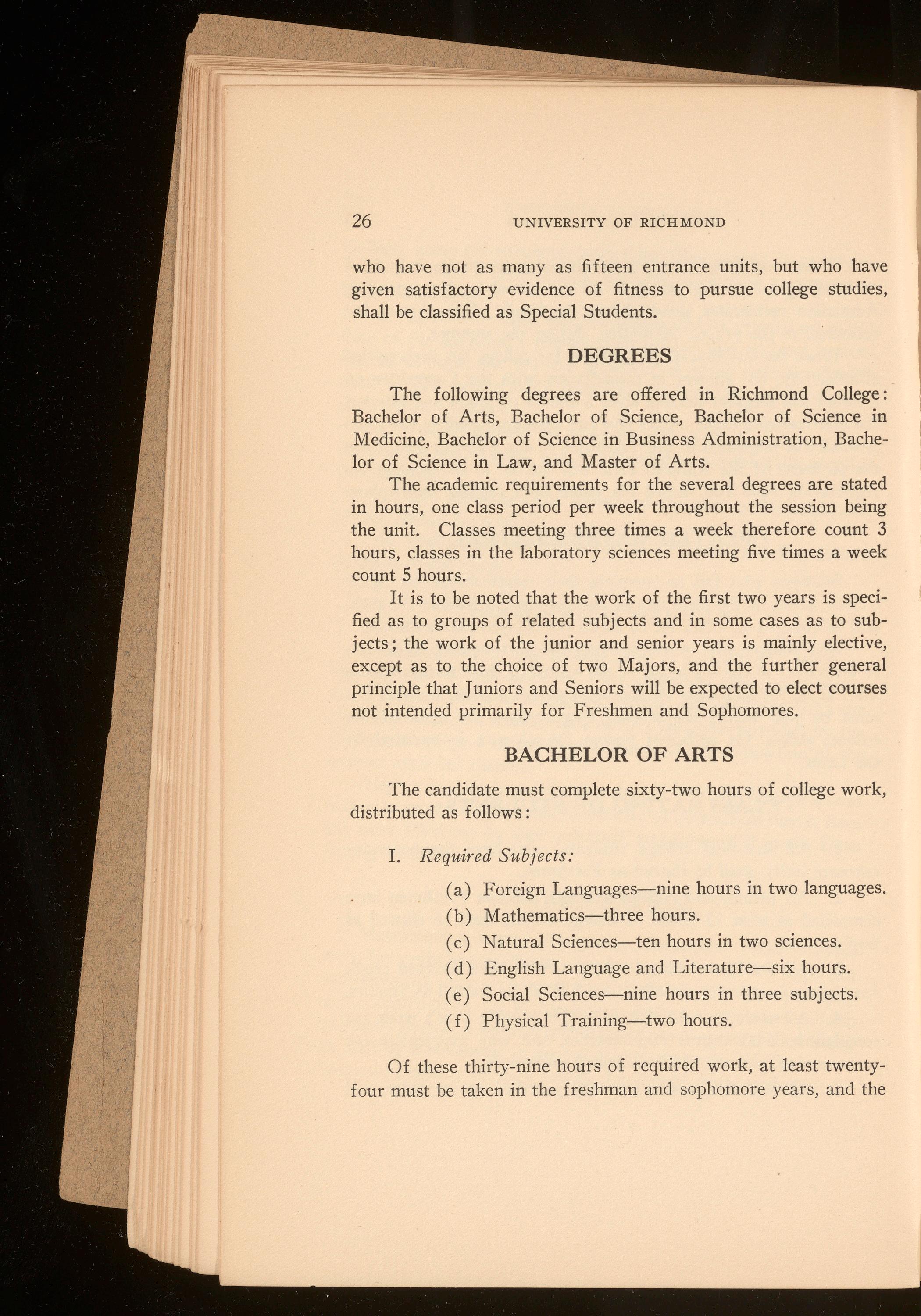
who have not as many as fifteen entrance units, but who have given satisfactory evidence of fitness to pursue college studies, shall be classified as Special Students.
The following degrees are offered in Richmond College : Bachelor of Arts, Bachelor of Science, Bachelor of Science in Medicine, Bachelor of Science in Business Administration, Bachelor of Science in Law, and Master of Arts.
The academic requirements for the several degrees are stated in hours, one class period per week throughout the session being the unit. Classes meeting three times a week therefore count 3 hours, classes in the laboratory sciences meeting five times a week count 5 hours.
It is to be noted that the work of the first two years is specified as to groups of related subjects and in some cases as to subjects; the work of the junior and senior years is mainly elective, except as to the choice of two Majors, and the further general principle that Juniors and Seniors will be expected to elect courses not intended primarily for Freshmen and Sophomores.
The candidate must complete sixty-two hours of college work, distributed as follows:
I. Required Subjects:
(a) Foreign Languages-nine hours in two languages.
(b) Mathematics-three hours.
(
c) Natural Sciences-ten hours in two sciences.
( d) English Language and Literature-six hours.
( e) Social Sciences-nine hours in three subjects.
( f) Physical Training-two hours.
Of these thirty-nine hours of required work, at least twentyfour must be taken in the freshman and sophomore years, and the
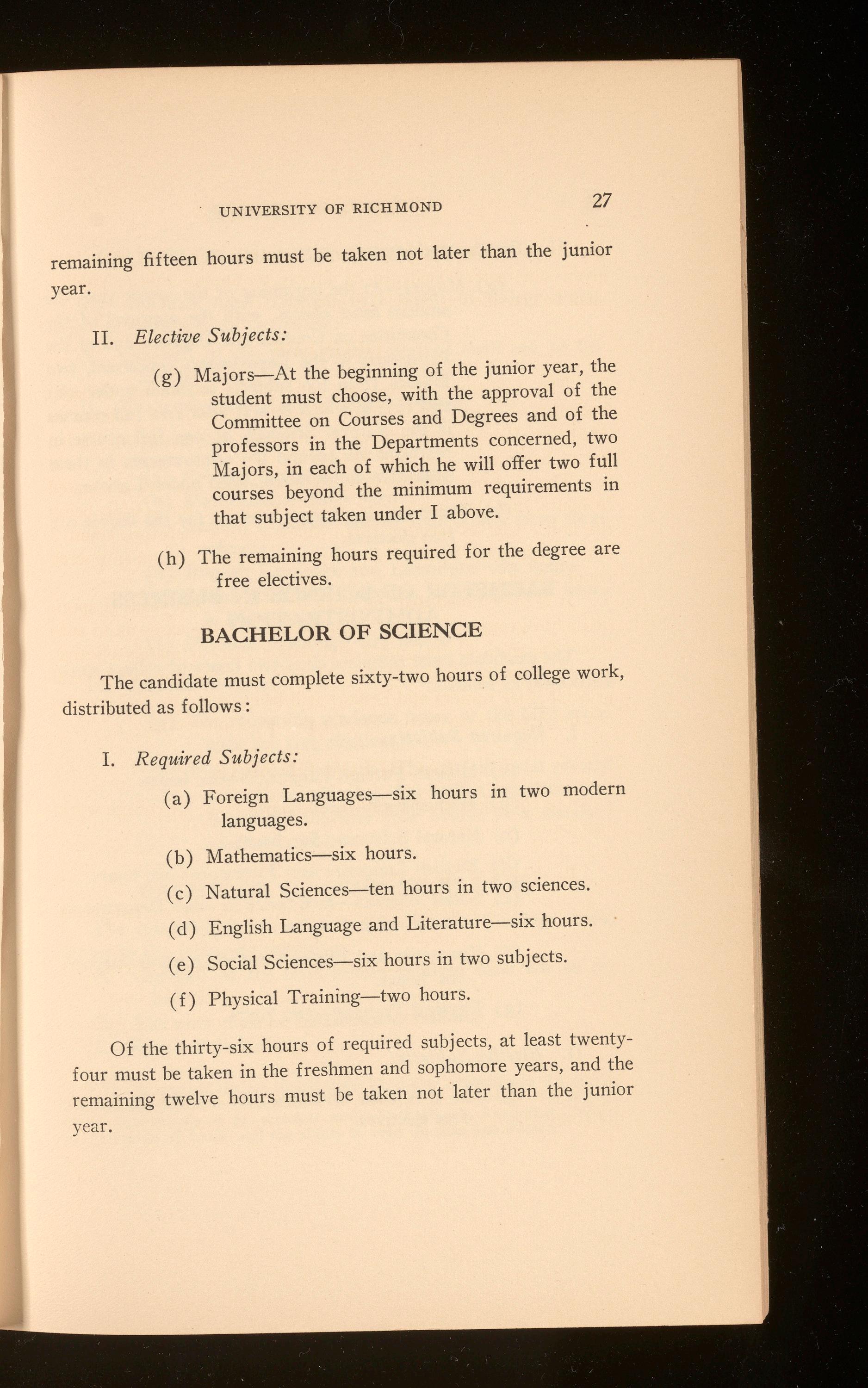
remaining fifteen hours must be taken not later than the junior year.
II. Elective Subjects:
(g) Majors-At the beginning of the junior year, the student must choose, with the approval of the Committee on Courses and Degrees and of the professors in the Departments concerned, two Majors, in each of which he will offer two full courses beyond the minimum requirements m that subject taken under I above.
(h) The remaining hours required for the degree are free electives.
The candidate must complete sixty-two hours of college work, distributed as follows:
I. Required Subjects:
(a) Foreign Languages-six hours m two modern languages.
(b) Mathematics-six hours.
(
c) Natural Sciences-ten hours in two sciences.
( d) English Language and Literature-six hours.
( e) Social Sciences-six hours in two subjects.
(f) Physical Training-two hours .
Of the thirty-six hours of required subjects, at least twentyfour must be taken in the freshmen and sophomore years, and the r emaining twelve hours must be taken not later than the junior year.
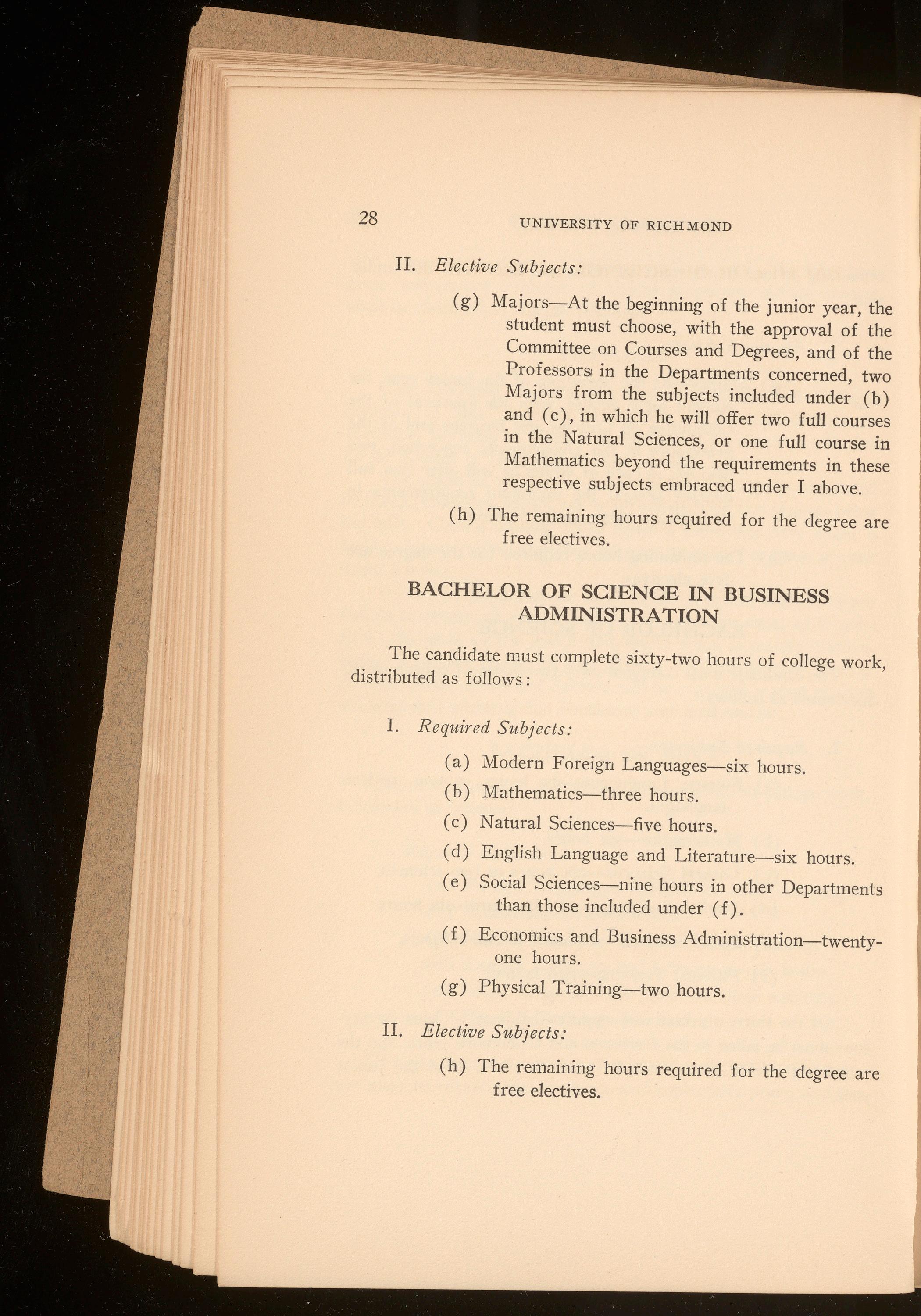
II. Elective Subjects:
(g) Majors-At the beginning of the junior year, the student must choose, with the approval of the Committee on Courses and Degrees, and of the Professors, in the Departments concerned, two Majors from the subjects included under (b) and ( c), in which he will offer two full courses in the Natural Sciences, or one full course in Mathematics beyond the requirements in these respective subjects embraced under I above.
(h) The remaining hours required for the degree are free electives.
The candidate must complete sixty-two hours of college work, distributed as follows :
I. Required Subjects:
(a) Modern Foreign Languages-six hours.
(b) Mathematics-three hours.
(c) Natural Sciences-five hours.
( d) English Language and Literature-six hours.
( e) Social Sciences-nine hours in other Departments than those included under ( f).
( f) Economics and Business Administration-twenty- one hours.
(g) Physical Training-two hours.
II. Elective Subjects:
(h) The remaining hours required for the degree are free electives.
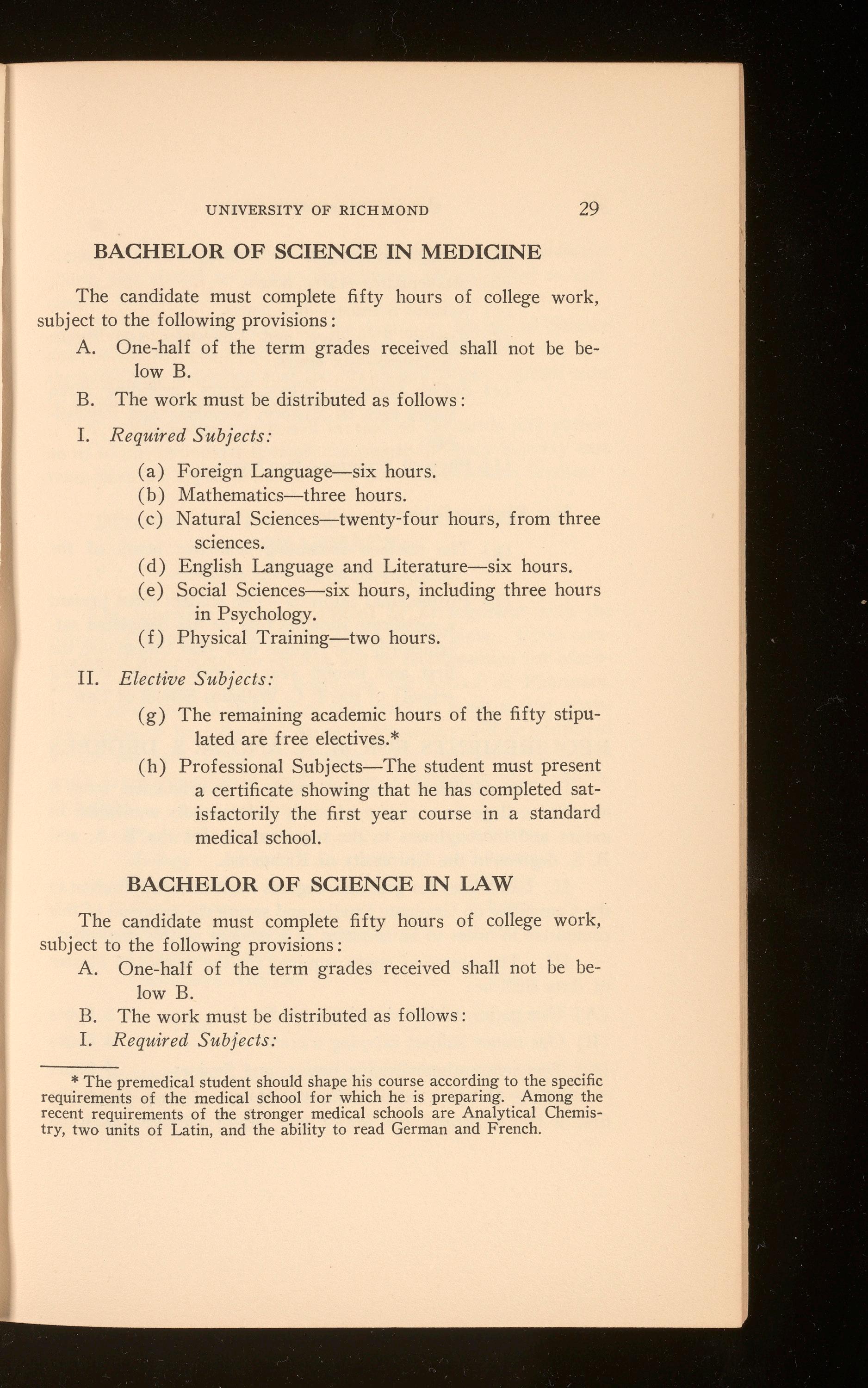
The candidate must complete fifty hours of college work, subject to the following provisions:
A. One-half of the term grades received shall not be below B.
B. The work must be distributed as follows :
I. Required Subjects:
(a) Foreign Language-six hours.
(b) Mathematics-three hours.
( c) Natural Sciences-twenty-four hours, from three sciences.
( d) English Language and Literature-six hours.
( e) Social Sciences-six hours, including three hours in Psychology.
( f) Physical Training-two hours.
II. Elective Subjects:
(g) The remaining academic hours of the fifty stipulated are free electives.*
(h) Professional Subjects-The student must present a certificate showing that he has completed satisfactorily the first year course in a standard medical school.
The candidate must complete fifty hours of college work, subject to the following provisions:
A. One-half of the term grades received shall not be below B.
B. The work must be distributed as follows :
I. Required Subjects:
* The premedical student should shape his course according to the specific requirements of the medical school for which he is preparing. Among the recent requirements of the stronger medical schools are Analytical Chemistry, two units of Latin, and the ability to read German and French.
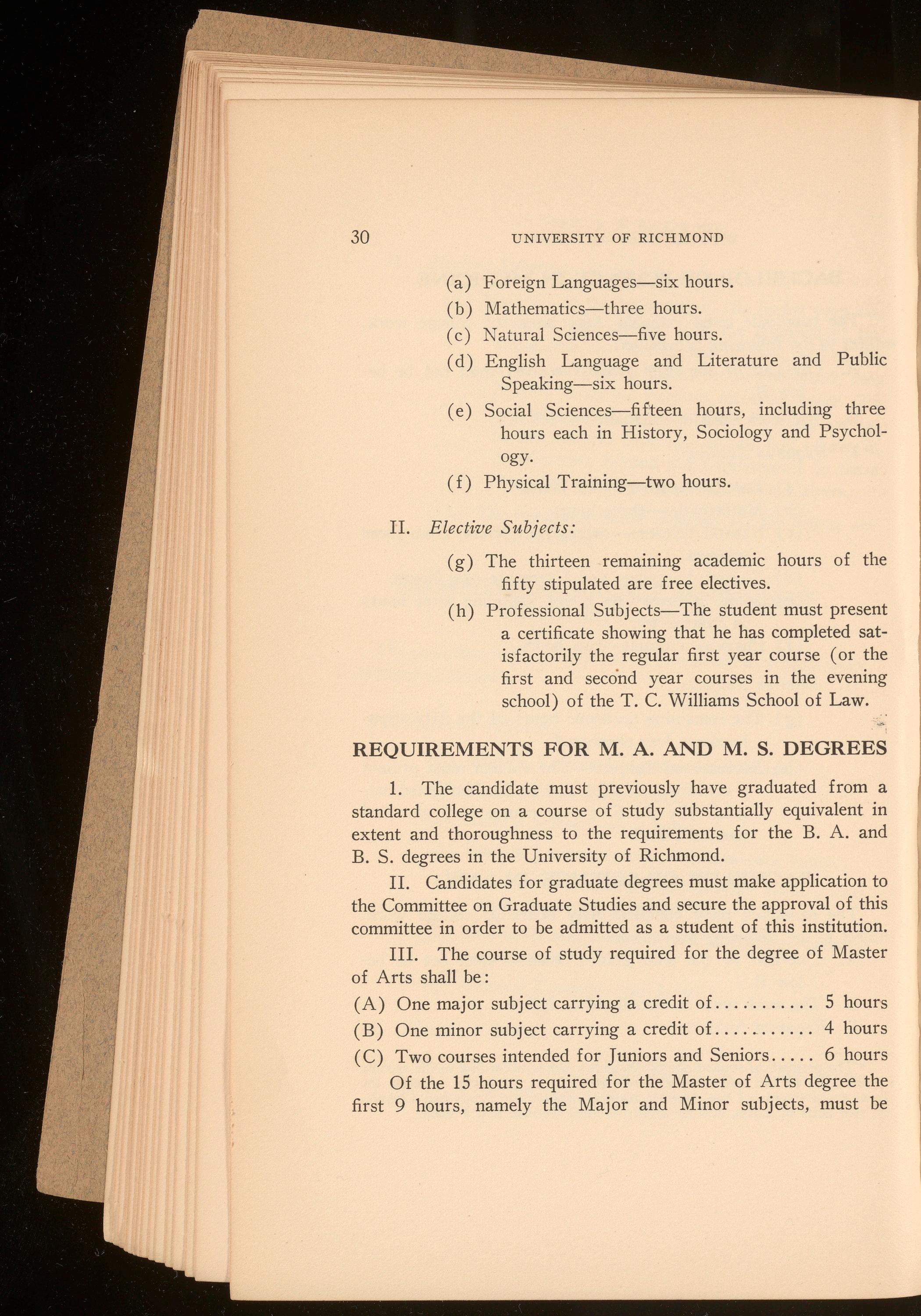
(a) Foreign Languages-six hours.
(b) Mathematics-three hours.
( c) Natural Sciences-five hours.
( d) English Language and Literature and Public Speaking-six hours.
( e) Social Sciences-fifteen hours, including three hours each in History, Sociology and Psychology.
(f) Physical Training-two hours.
(g) The thirteen remammg academic hours of the fifty stipulated are free electives.
(h) Professional Subjects-The student must present a certificate showing that he has completed satisfactorily the regular first year course ( or the first and seco·nd year courses in the evening school) of the T. C. Williams School of Law.
1. The candidate must previously have graduated from a standard college on a course of study substantially equivalent in extent and thoroughness to the requirements for the B. A. and B. S. degrees in the University of Richmond.
II. Candidates for graduate degrees must make application to the Committee on Graduate Studies and secure the approval of this committee in order to be admitted as a student of this institution.
III. The course of study required for the degree of Master of Arts shall be :
(A) One major subject carrying a credit of. .......... 5 hours
(B) One minor subject carrying a credit of. ... _ ...... 4 hours
(C) Two courses intended for Juniors and Seniors ..... 6 hours
Of the 15 hours required for the Master of Arts degree the first 9 hours, namely the Major and Minor subjects, must be
chosen from the graduate courses in the departments mentioned above, and should be in two departments closely allied to each other.
IV. The requirements for the degree of Master of Science shall be the same as those for the degree of Master of Arts, with the additional restriction that the Major and Minor courses must be taken in Science and Mathematics.
V. While due regard will be paid to the needs and preferences of the individual student, the course of study in every case must have the approval of the Committee on Graduate Studies.
(Medical College of Virginia)
The following course is offered by arrangement with the School of Pharmacy, Medical College of Virginia. Upon completion of this course, the student will be recommended for admission to candidacy for the degree at the School of Pharmacy. Upon satisfactory completion of two years of work at that school the degree of Bachelor of Science in Pharmacy will be conferred by the Medical College of Virginia. The two years of college work at this institution shall include a minimum of 35 hours, including:
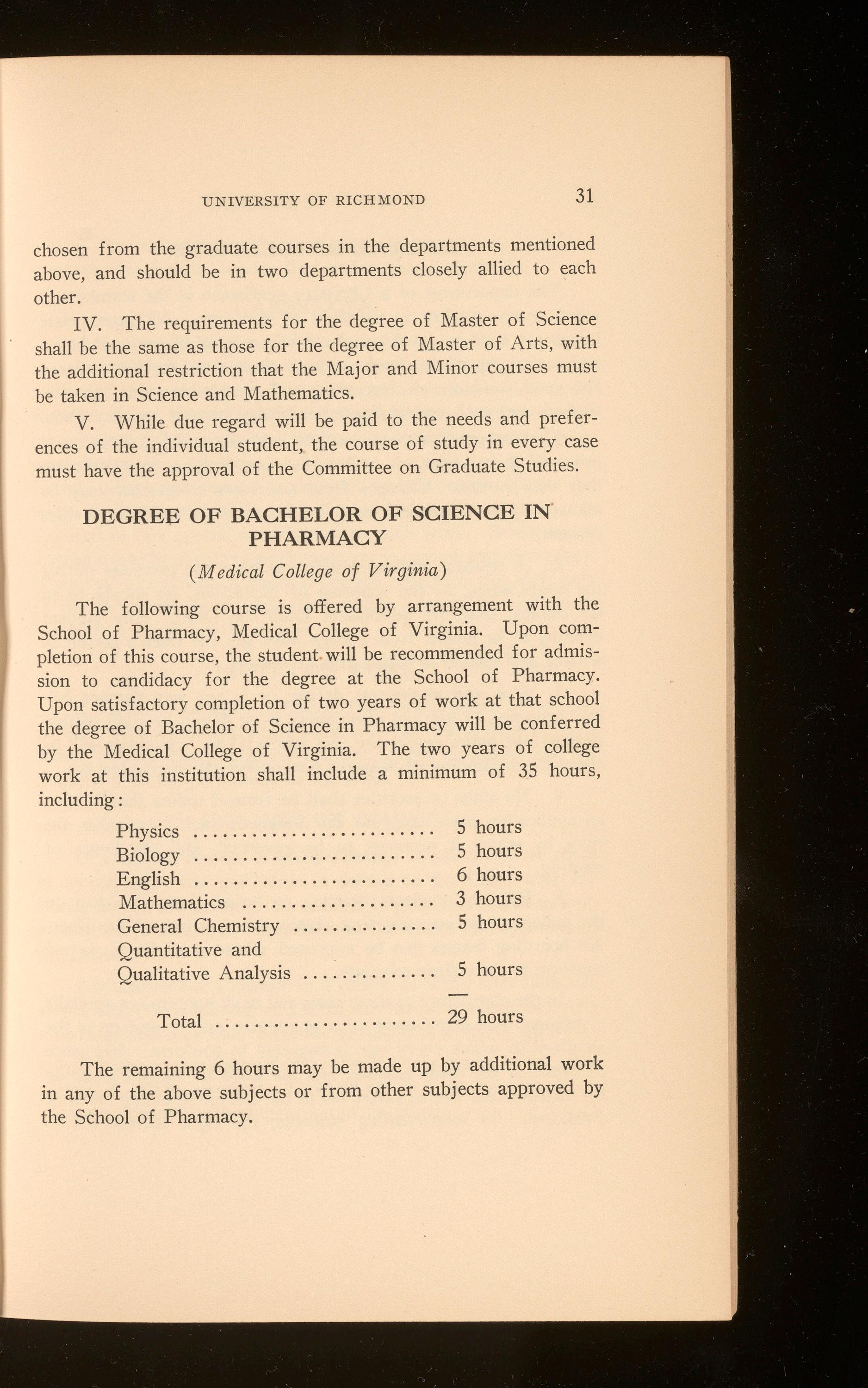
The remaining 6 hours may be made up by additional work in any of the above subjects or from other subjects approved by the School of Pharmacy.
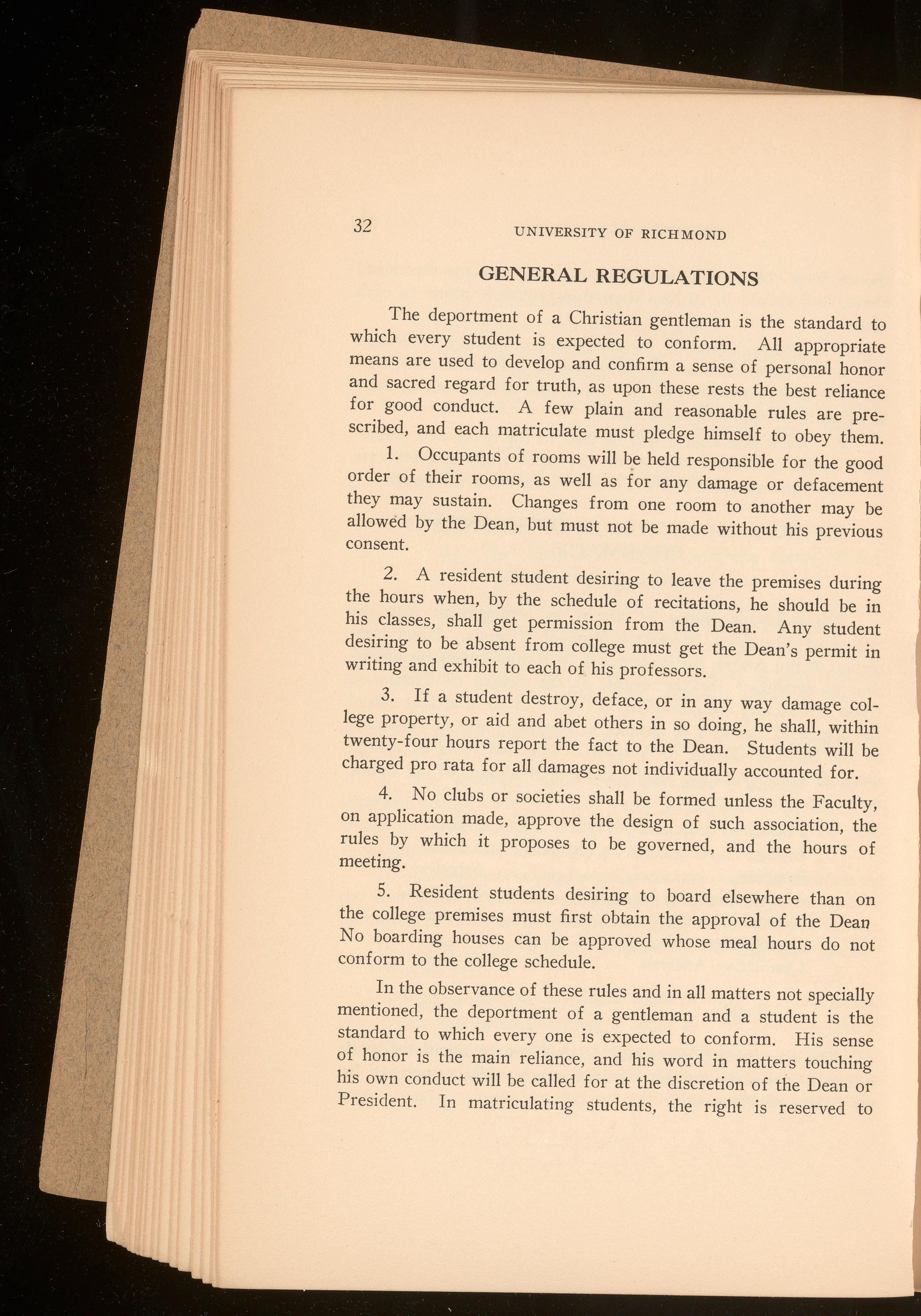
The deportment of a Christian gentleman is the standard to which every student is expected to conform. All appropriate means are used to develop and confirm a sense of personal honor and sacred regard for truth, as upon these rests the best reliance for good conduct. A few plain and reasonable rules are pre- scribed, and each matriculate must pledge himself to obey them.
1. Occupants of rooms will be held responsible for the good order of their rooms, as well as for any damage or defacement they may sustain. Changes from one room to another may be allowed by the Dean, but must not be made without his previous consent.
2. A resident student desiring to leave the premises during the hours when, by the schedule of recitations, he should be in his classes, shall get permission from the Dean. Any student desiring to be absent from college must get the Dean's permit in writing and exhibit to each of his professors.
3. If a student destroy, deface, or in any way damage col- lege property, or aid and abet others in so doing, he shall, within twenty-four hours report the fact to the Dean. Students will be charged pro rata for all damages not individually accounted for.
4. No clubs or societies shall be formed unless the Faculty, on application made, approve the design of such association, the rules by which it proposes to be governed, and the hours of meeting.
5. Resident students desiring to board elsewhere than on the college premises must first obtain the approval of the Dean No boarding houses can be approved whose meal hours do not conform to the college schedule.
In the observance of these rules and in all matters not specially mentioned, the deportment of a gentleman and a student is the standard to which every one is expected to conform. His sense of honor is the main reliance , and his word in matters touching his own conduct will be called for at the discretion of the Dean or President. In matriculating students, the right is reserved to
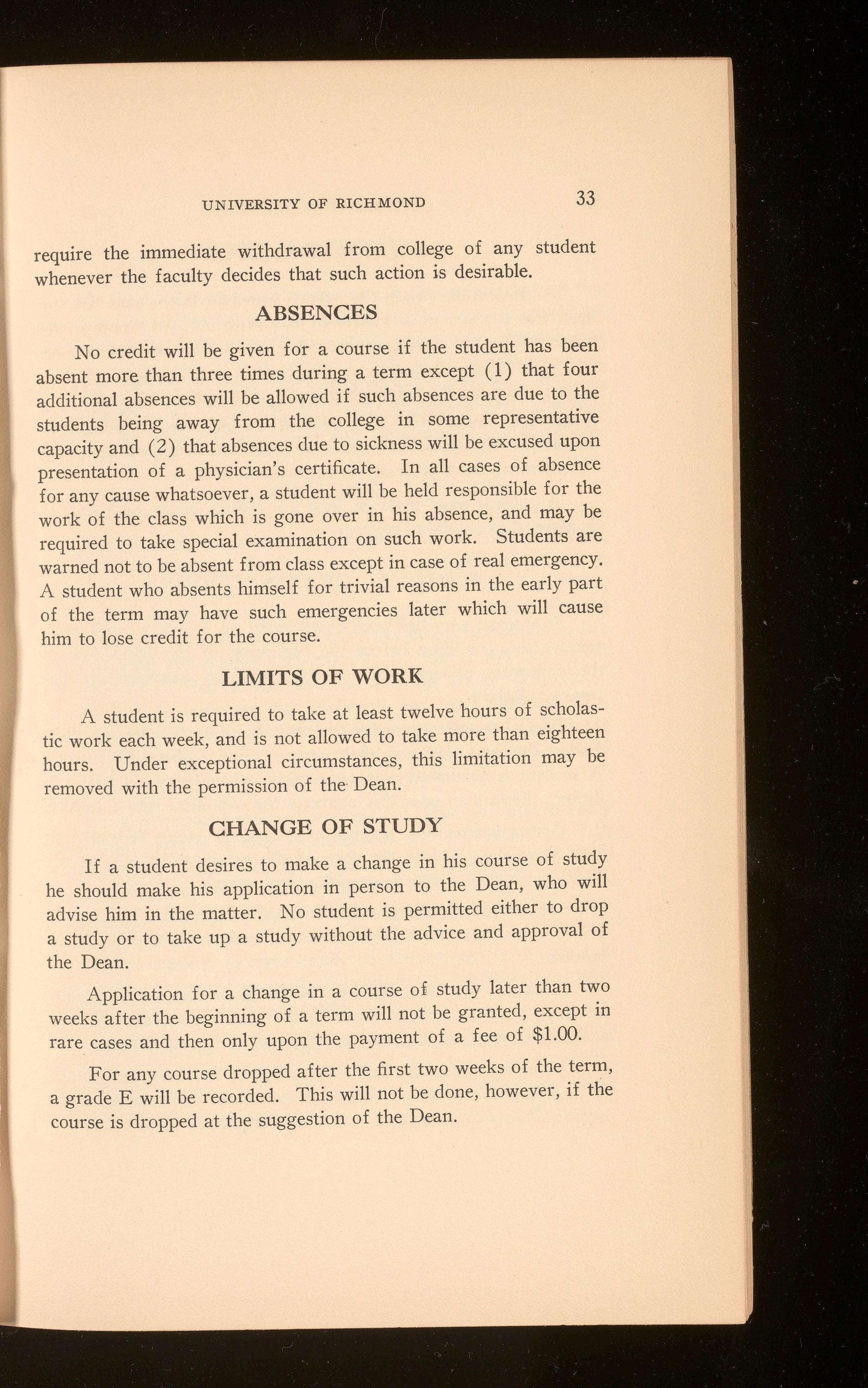
require the immediate withdrawal from college of any student whenever the faculty decides that such action is desirable.
No credit will be given for a course if the student has been absent more than three times during a term except ( 1) that four additional absences will be allowed if such absences are due to the students being away from the college in some representative capacity and (2) that absences due to sickness will be excused upon presentation of a physician's certificate. In all cases of absence for any cause whatsoever, a student will be held responsible for the work of the class which is gone over in his absence, and may be required to take special examination on such work. Students are warned not to be absent from class except in case of real emergency. A student who absents himself for trivial reasons in the early part of the term may have such emergencies later which will cause him to lose credit for the course.
A student is required to take at least twelve hours of scholastic work each week, and is not allowed to take more than eighteen hours. Under exceptional circumstances , this limitation may be removed with the permission of the Dean.
If a student desires to make a change in his course of study he should make his application in person to the Dean, who will advise him in the matter. No student is permitted either to drop a study or to take up a study without the advice and approval of the Dean.
Application for a change in a course of study later than two weeks after the beginning of a term will not be granted, except in rare cases and then only upon the payment of a fee of $1.00.
For any course dropped after the first two weeks of the term, a grade E will be recorded. This will not be done, however, if the course is dropped at the suggestion of the Dean.
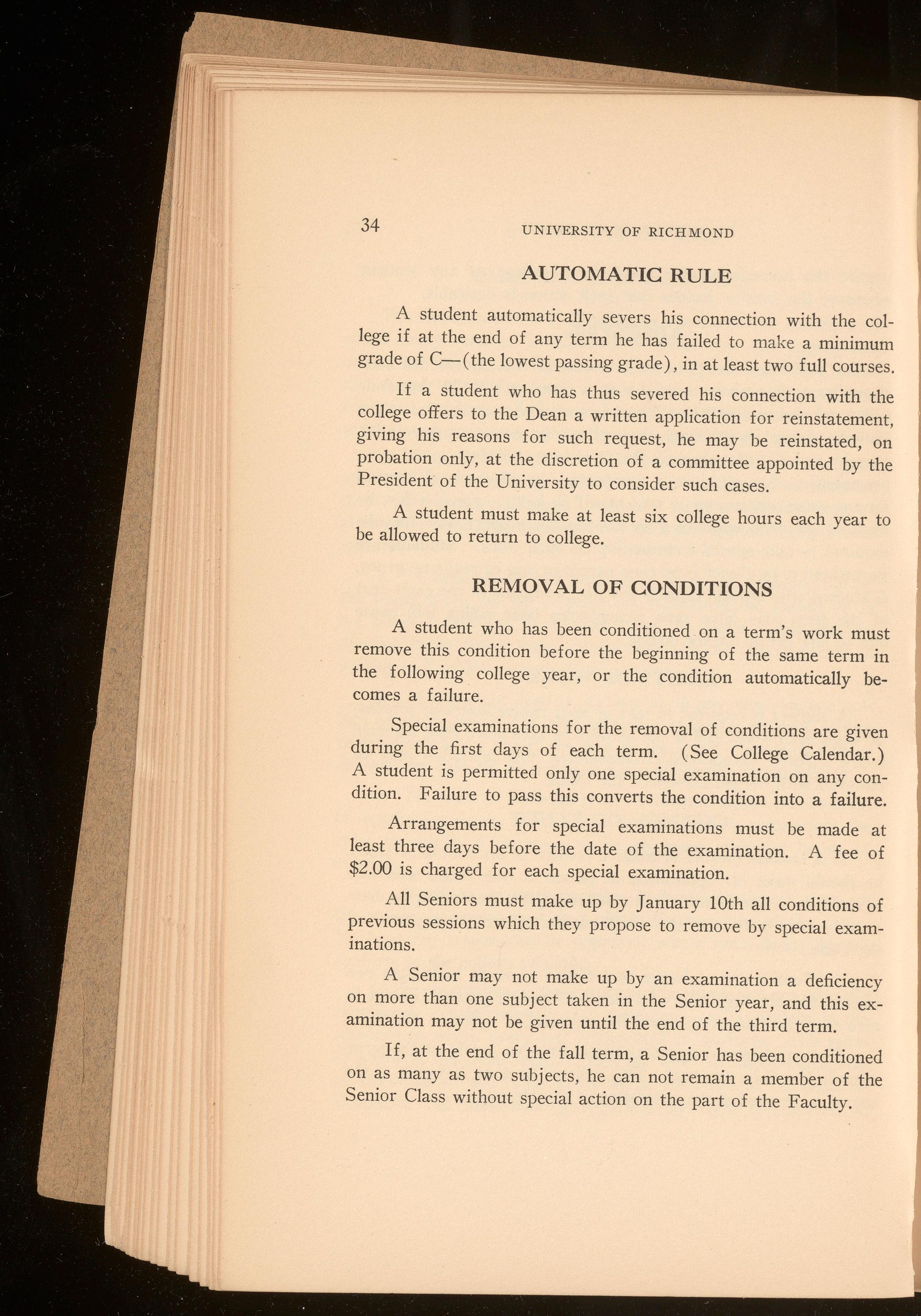
A student aut omatically severs his connection with the col- lege if at the end of any term he has failed t o mak e a minimum grade of C-( the lowest passing grade), in at least two full courses .
If a student who has thus severed his connection with the college offers to the Dean a written application for reinstatement , giving his reasons for such request, he may be reinstated, on probation only, at the discretion of a committee appointed by the President of the University to consider such case s
A student must make at least six college hours each year to be allowed to return to college.
A student who has been conditioned on a term ' s work must remove this condition before the beginning of the same term in the following college year, or the condition automatically be- comes a failure.
Special examinations for the removal of conditions are given during the first days of each term. ( See College Calendar.) A student is permitted only one special examination on any con- dition. Failure to pass this converts the condition into a failure.
Arrangements for special examinations must be made at least three days before the date of the examination. A fee of $2 .00 is charged for each special examination.
All Seniors must make up by January 10th all conditions of previous sessions which they propose to remove by special exam- inations.
A Senior may not make up by an examination a deficiency on more than one subject taken in the Senior year, and this ex- amination may not be given until the end of the third term.
If, at the end of the fall term, a Senior has been conditioned on as many as two subjects, he can not remain a member of the Senior Class without special action on the part of the Faculty.
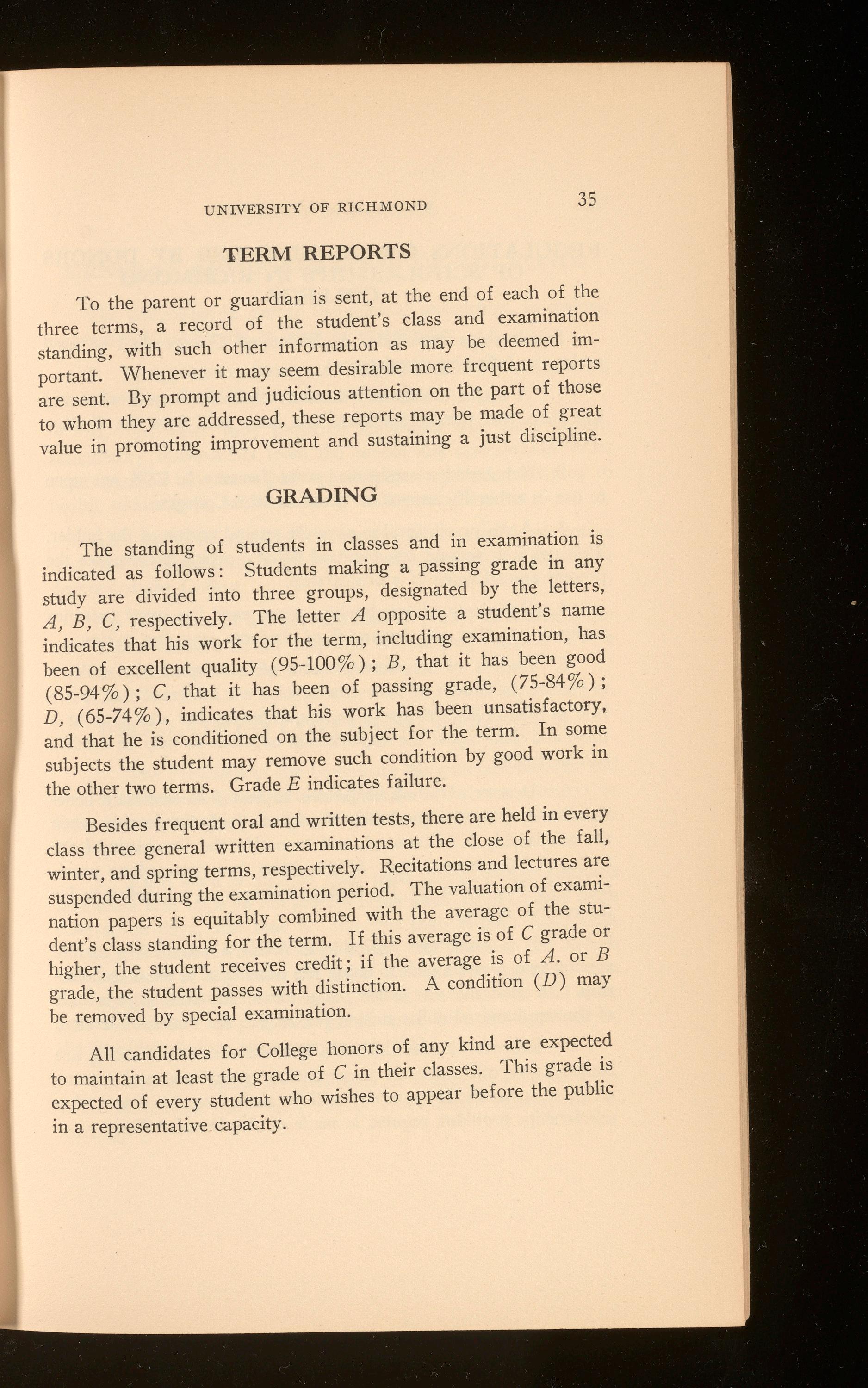
To the parent or guardian is sent, at the end of each of the three terms, a record of the student's class and examination standing, with such other information as may be deemed important. Whenever it may seem desirable more frequent reports are sent. By prompt and judicious attention on the part of those to whom they are addressed, these reports may be made of great value in promoting improvement and sustaining a just discipline.
The standing of students in classes and in examination is indicated as follows: Students making a passing grade in any study are divided into three groups, designated by the letters , A , B , C, respectively. The letter A opposite a student's name indicates that his work for the term, including examination, has been of excellent quality (95-100 % ) ; B, that it has been good (85-94 % ) ; C, that it has been of passing grade, (75-84 % ) ; D , (65-74 % ), indicates that his work has been unsatisfactory, and that he is conditioned on the subject for the term. In some subjects the student may remove such condition by good work in the other two terms. Grade E indicates failure.
Besides frequent oral and written tests, there are held in every class three general written examinations at the close of the fall, winter, and spring terms, respectively. Recitations and lectures are suspended during the examination period. The valuation of examination papers is equitably combined with the average of the student's class standing for the term. If this average is of C grade or higher, the student receives credit; if the average is of A. or B grade, the student passes with distinction. A condition ( D) may be removed by special examination.
All candidates for College honors of any kind are expected to maintain at least the grade of C in their classes. This grade is expected of every student who wishes to appear before the public in a representative capacity.
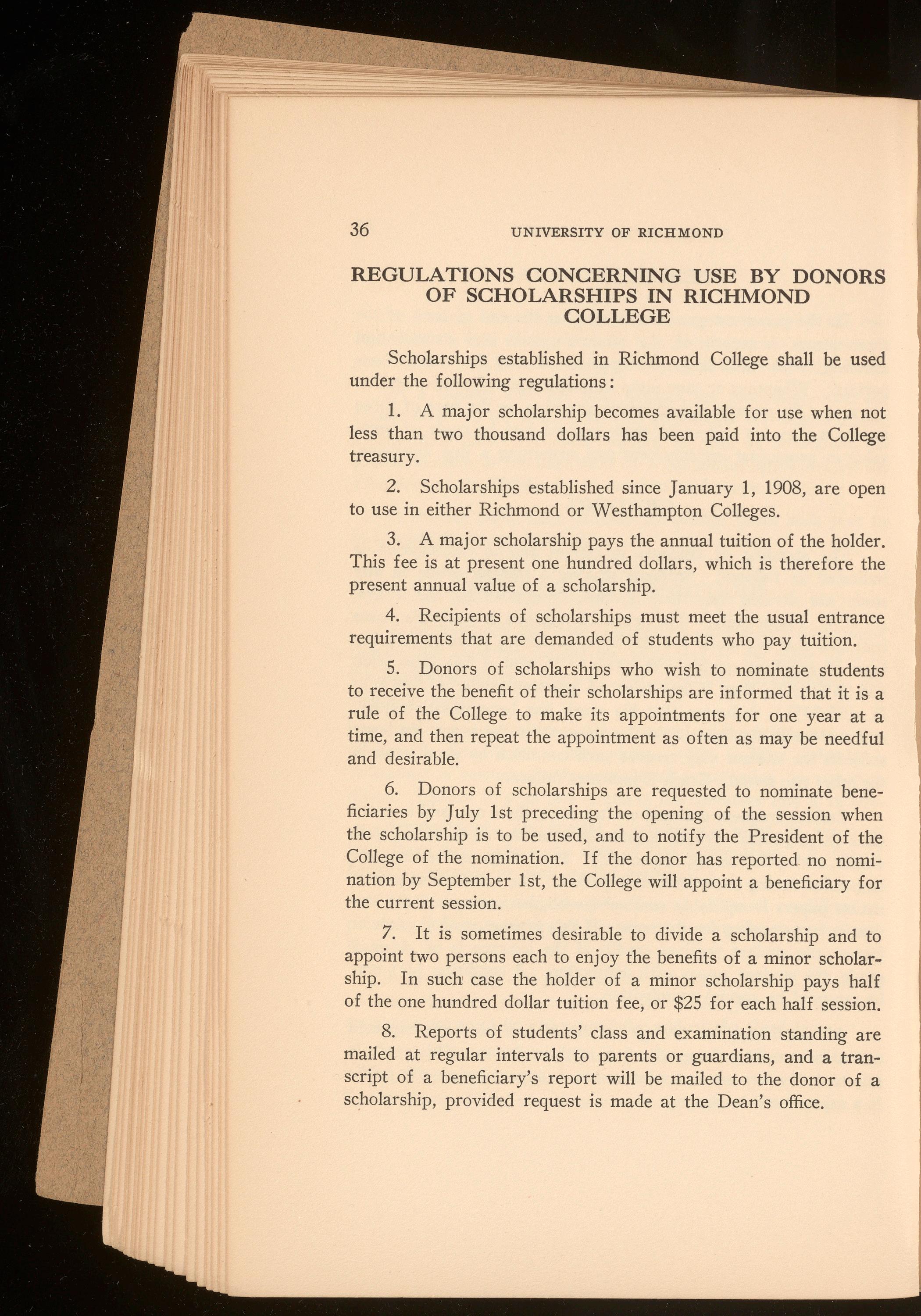
Scholarships established in Richmond College shall be used under the following regulations :
1. A major scholarship becomes available for use when not less than two thousand dollars has been paid into the College treasury.
2. Scholarships established since January 1, 1908, are open to use in either Richmond or Westhampton Colleges.
3. A major scholarship pays the annual tuition of the holder. This fee is at present one hundred dollars, which is therefore the present annual value of a scholarship.
4. Recipients of scholarships must meet the usual entrance requirements that are demanded of students who pay tuition.
5. Donors of scholarships who wish to nominate students to receive the benefit of their scholarships are informed that it is a rule of the College to make its appointments for one year at a time, and then repeat the appointment as often as may be needful and desirable.
6. Donors of scholarships are requested to nominate beneficiaries by July 1st preceding the opening of the session when the scholarship is to be used, and to notify the President of the College of the nomination. If the donor has reported no nomination by September 1st, the College will appoint a beneficiary for the current session.
7. It is sometimes desirable to divide a scholarship and to appoint two persons each to enjoy the benefits of a minor scholarship. In such case the holder of a minor scholarship pays half of the one hundred dollar tuition fee, or $25 for each half session.
8 Reports of students' class and examination standing are mailed at regular intervals to parents or guardians, and a transcript of a beneficiary's report will be mailed to the donor of a scholarship, provided request is made at the Dean's office.
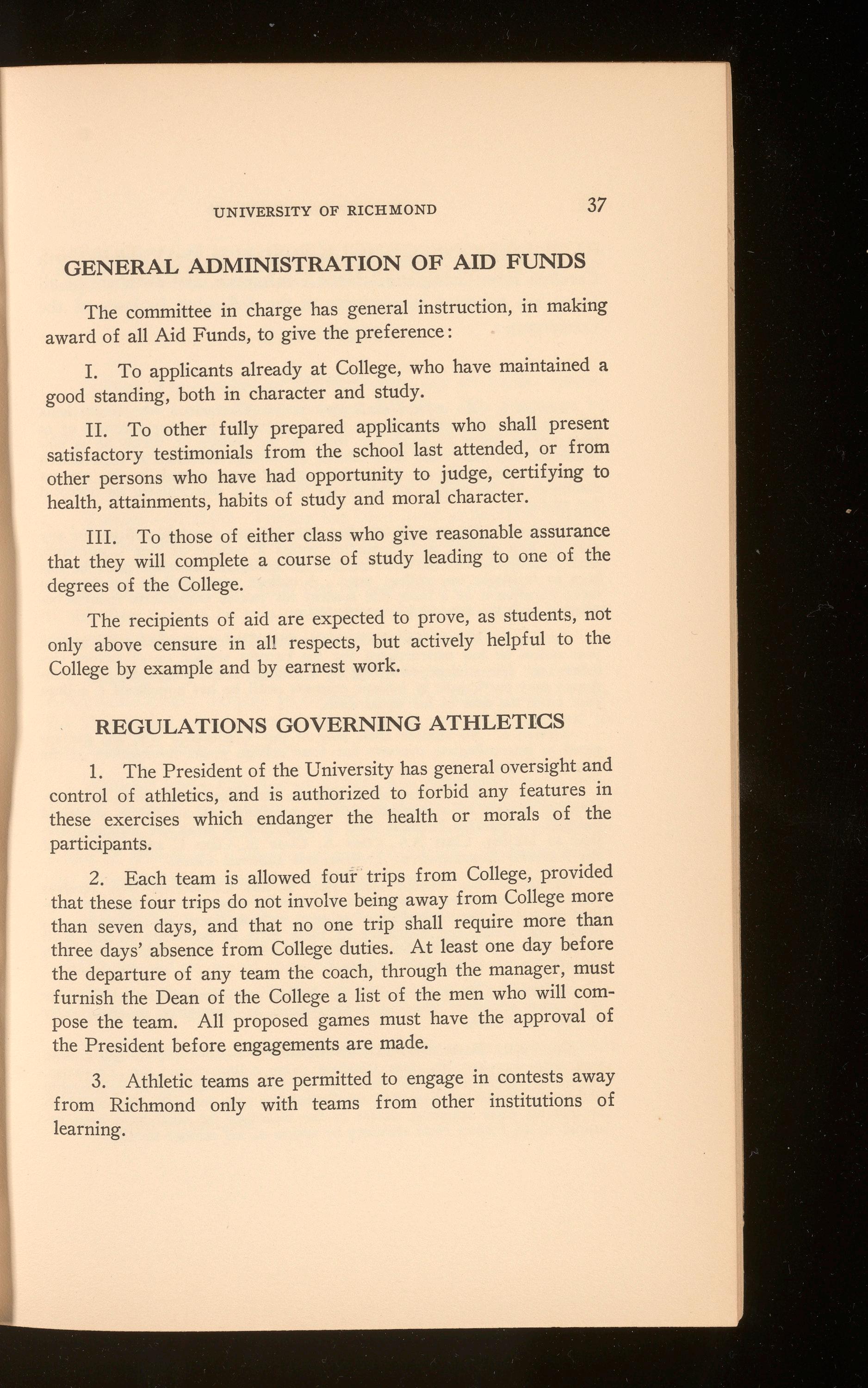
The committee in charge has general instruction, in making award of all Aid Funds, to give the preference:
I. To applicants already at College, who have maintained a good standing, both in character and study.
II. To other fully prepared applicants who shall present satisfactory testimonials from the school last attended, or from other persons who have had opportunity to judge, certifying to health, attainments, habits of study and moral character.
III. To those of either class who give reasonable assurance that they will complete a course of study leading to one of the degrees of the College.
The recipients of aid are expected to prove, as students, not only above censure in all respects, but actively helpful to the College by example and by earnest work.
1. The President of the University has general oversight and control of athletics, and is authorized to forbid any features in these exercises which endanger the health or morals of the participants.
2. Each team is allowed four trips from College, provided that these four trips do not involve being away from College more than seven days, and that no one trip shall require more than three days' absence from College duties. At least one day before the departure of any team the coach, through the manager, must furnish the Dean of the College a list of the men who will compose the team. All proposed games must have the approval of the President before engagements are made.
3. Athletic teams are permitted to engage in contests away from Richmond only with teams from other institutions of learning.
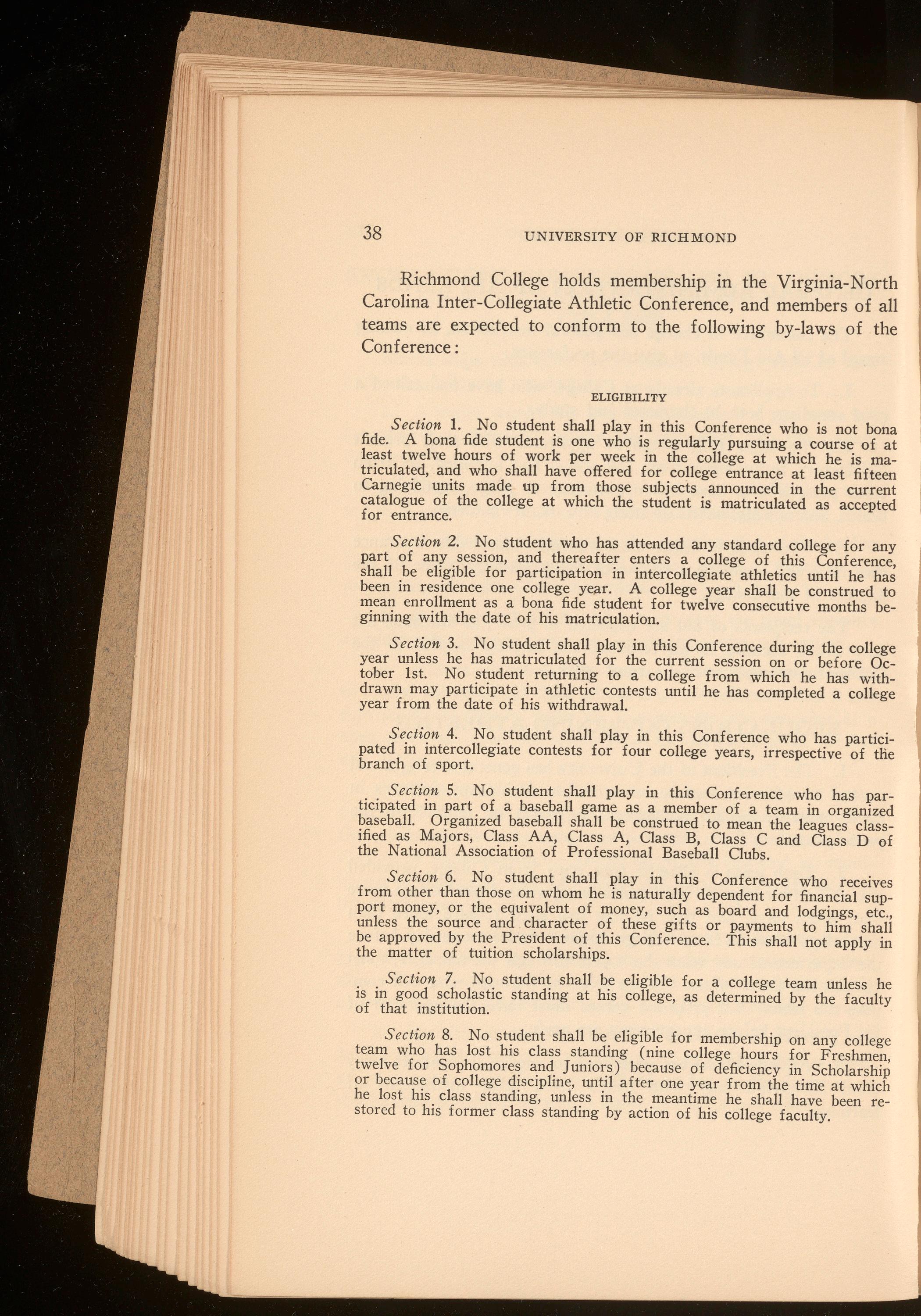
Richmond College holds membership in the Virginia-North Carolina Inter-Collegiate Athletic Conference, and members of all teams are expected to conform to the following by-laws of the Conference:
Section 1. No student shall play in this Conference who is not bona fide. A bona fide student is one who is regularly pursuing a course of at least twelve hours of work per week in the college at which he is ma- triculated, and who shall have offered for college entrance at least fifteen Carnegie units made up from those subjects announced in the current catalogue of the college at which the student is matriculated as accepted for entrance.
Section 2. No student who has attended any standard college for any part of any session, and thereafter enters a college of this Conference, shall be eligible for participation in intercollegiate athletics until he has been in residence one college year. A college year shall be construed to mean enrollment as a bona fide student for twelve consecutive months be- ginning with the date of his matriculation.
Section 3. No student shall play in this Conference during the college year unless he has matriculated for the current session on or before Oc- tober 1st. No student returning to a college from which he has with- drawn may participate in athletic contests until he has completed a college year from the date of his withdrawal.
Section 4 No student shall play in this Conference who has partici- pated in intercollegiate contests for four college years, irrespective of die branch of sport.
Section 5. No student shall play in this Conference who has par- ticipated in part of a baseball game as a member of a team in organized baseball. Organized baseball shall be construed to mean the leagues class- ified as Majors, Class AA, Class A, Class B, Class C and Class D of the National Association of Professional Baseball Oubs.
Section 6. No student shall play in this Conference who receives from other than those on whom he is naturally dependent for financial sup- port money, or the equivalent of money, such as board and lodgings, etc., unless the source and character of these gifts or payments to him shall be approved by the President of this Conference. This shall not apply in the matter of tuition scholarships.
Section 7. No student shall be eligible for a college team unless he is in good scholastic standing at his college, as determined by the faculty of that institution.
Section 8. No student shall be eligible for membership on any college team who has lost his class standing (nine college hours for Freshmen, twelve for Sophomores and Juniors) because of deficiency in Scholarship or because of college discipline, until after one year from the time at which he lost his class standing, unless in the meantime he shall have been re- stored to his former class standing by action of his college faculty.
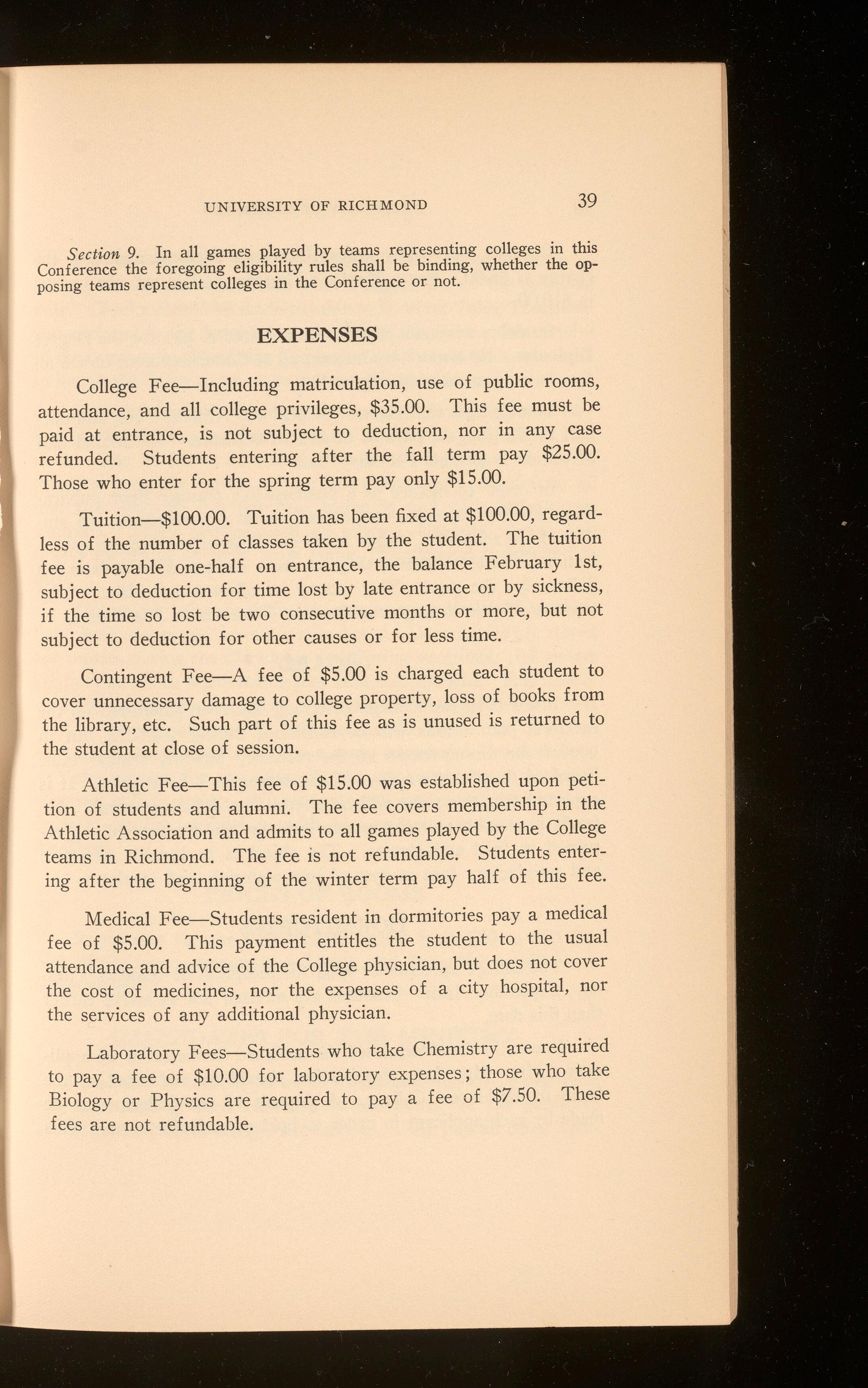
Section 9. In all games played by teams representing colleges in this Conference the foregoing eligibility rules shall be binding, whether the opposing teams represent colleges in the Conference or not.
College Fee-Including matriculation, use of public rooms, attendance, and all college privileges, $35.00. This fee must be paid at entrance, is not subject to deduction, nor in any case refunded. Students entering after the fall term pay $25.00. Those who enter for the spring term pay only $15.00.
Tuition-$100.00. Tuition has been fixed at $100.00, regardless of the number of classes taken by the student. The tuition fee is payable one-half on entrance, the balance February 1st, subject to deduction for time lost by late entrance or by sickness, if the time so lost be two consecutive months or more, but not subject to deduction for other causes or for less time.
Contingent Fee-A fee of $5.00 is charged each student to cover unnecessary damage to college property, loss of books from the library, etc. Such part of this fee as is unused is returned to the student at close of session.
Athletic Fee-This fee of $15.00 was established upon petition of students and alumni. The fee covers membership in the Athletic Association and admits to all games played by the College teams in Richmond. The fee is not refundable. Students entering after the beginning of the winter term pay half of this fee.
Medical Fee-Students resident in dormitories pay a medical fee of $5.00. This payment entitles the student to the usual attendance and advice of the College physician, but does not cover the cost of medicines, nor the expenses of a city hospital, nor the services of any additional physician.
Laboratory Fees-Students who take Chemistry are required to pay a fee of $10.00 for laboratory expenses; those who take Biology or Physics are required to pay a fee of $7.50. These fees are not refundable.
Diploma Fees-For every Bachelor's Diploma awarded, the charge is $5.00. For a Master's Diploma and Hood, the charge is $10.00.
Students who take degrees are required to pay for the Degree Diplomas. No honors are announced at Commencement unless all fees have been satisfactorily settled.
The College, Contingent, Medical and Athletic Fees, and one- half of Tuition, are payable at date of entrance. The second half of tuition is payable February 1st.
In order to finance in a business-like manner their publica- tions, literary societies, and other general organizations, the stu- dents have adopted a budget to cover all expenses of these organ- izations, and to this fund they ask each student to contribute ten dollars for the year. This money is collected and disbursed by student officials through the Student Government Association.
Since 1919 the College refectory has been conducted on the cafeteria plan. This will be continued during 1924-'25, but in one of the dining-rooms of the refectory building regular table board of three meals a day will be served at a fixed price. It is expected that this price will be twenty-five dollars a month. No profit is sought, and the money paid by the student will be re- turned in food and service. The object is to furnish attractive and satisfactory fare at cost of raw materials and service.
The college dormitories open for reception of students Tues- day, September 16th. Students are advised not to arrive earlier than this date.
Rooms in dormitories will be assigned in the order of appli- cation after May 1st. Application should be addressed to the Dean of Richmond College. A deposit of ten dollars must be made by each applicant in order to hold a particular room. This
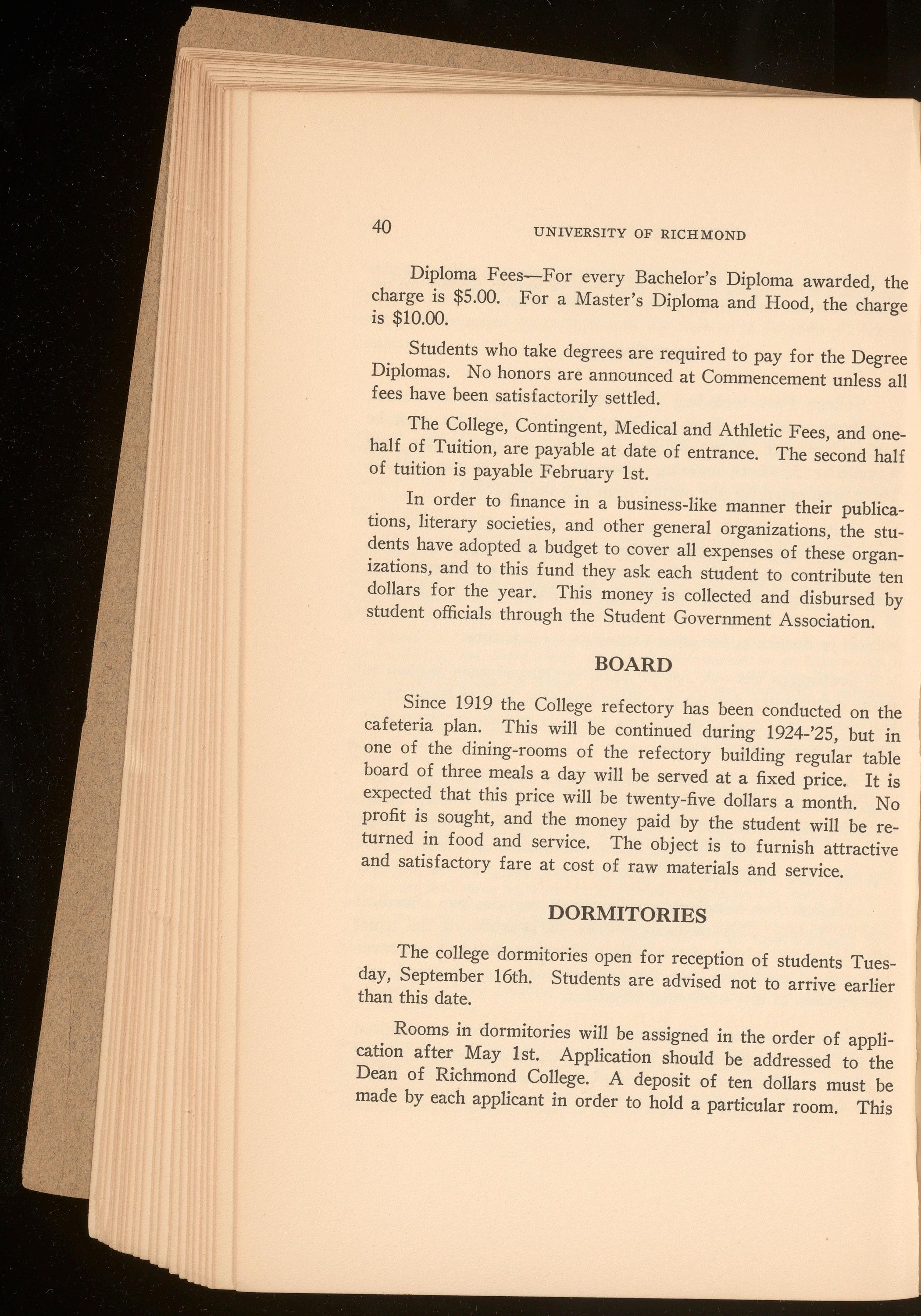
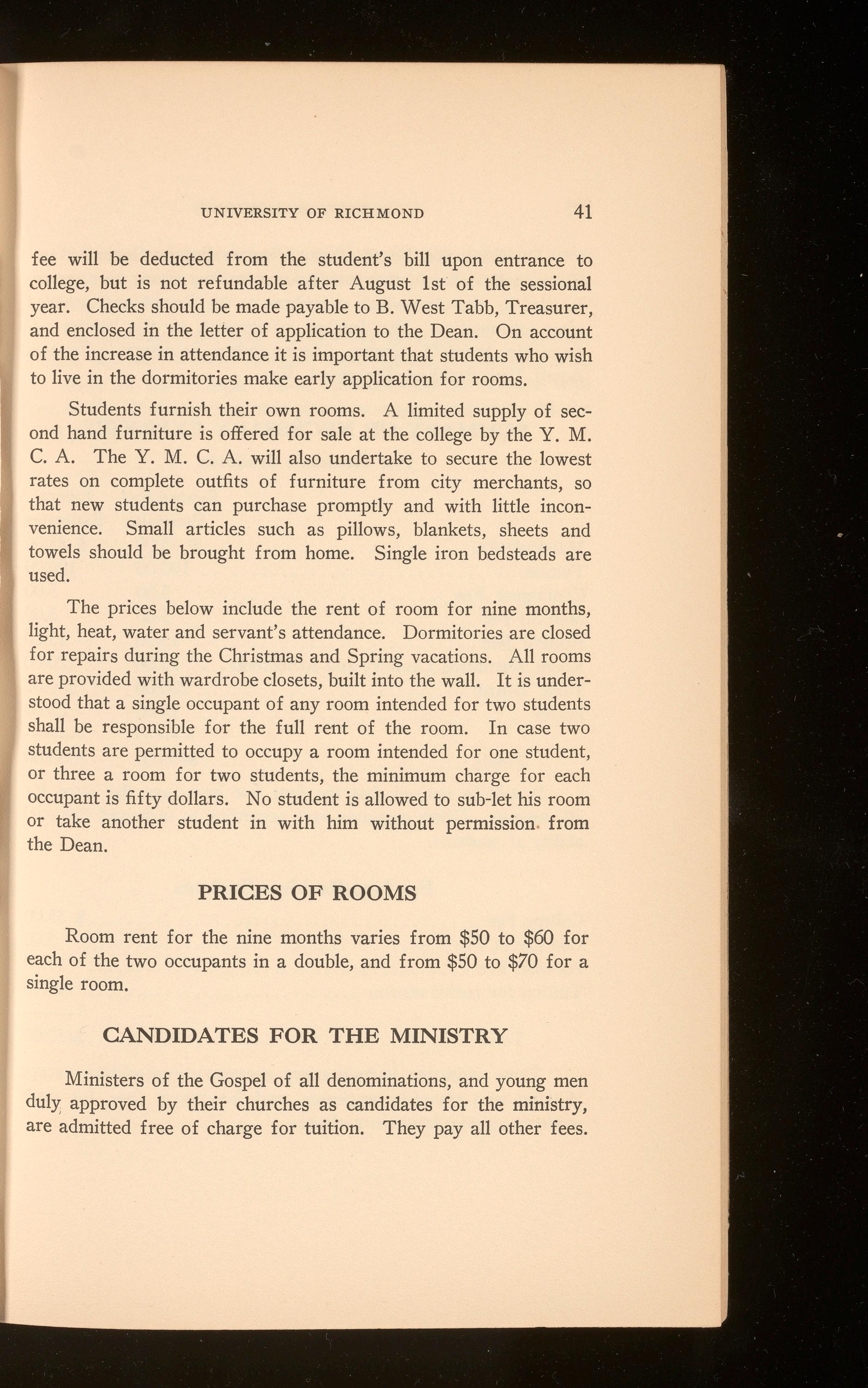
fee will be deducted from the student's bill upon entrance to college, but is not refundable after August 1st of the sessional year. Checks should be made payable to B. West Tabb, Treasurer, and enclosed in the letter of application to the Dean. On account of the increase in attendance it is important that students who wish to live in the dormitories make early application for rooms.
Students furnish their own rooms. A limited supply of second hand furniture is offered for sale at the college by the Y. M. C. A. The Y. M. C. A. will also undertake to secure the lowest rates on complete outfits of furniture from city merchants, so that new students can purchase promptly and with little inconvenience. Small articles such as pillows, blankets, sheets and towels should be brought from home. Single iron bedsteads are used.
The prices below include the rent of room for nine months, light, heat, water and servant's attendance. Dormitories are closed for repairs during the Christmas and Spring vacations. All rooms are provided with wardrobe closets, built into the wall. It is understood that a single occupant of any room intended for two students shall be responsible for the full rent of the room. In case two students are permitted to occupy a room intended for one student, or three a room for two students, the minimum charge for each occupant is fifty dollars. No student is allowed to sub-let his room or take another student in with him without permission from the Dean.
Room rent for the nine months varies from $50 to $60 for each of the two occupants in a double, and from $50 to $70 for a single room.
Ministers of the Gospel of all denominations, and young men dulY,approved by their churches as candidates for the ministry, are admitted free of charge for tuition. They pay all other fees.
The Education Board of the Virginia Baptist General Association will render further assistance to worthy young men recommended by churches which contribute to the Board, and accepted after examination. For further information on this matter address Mr. Frank T. Crump, Corresponding Secretary, Education Board, Law Building, Richmond, Va.

It will be noticed that the first five items are the same for all students. Other expenses vary according to taste and financial ability of students.
These estimates include every necessary expenditure except clothing and traveling expenses, and laboratory fees for such students as take laboratory classes.
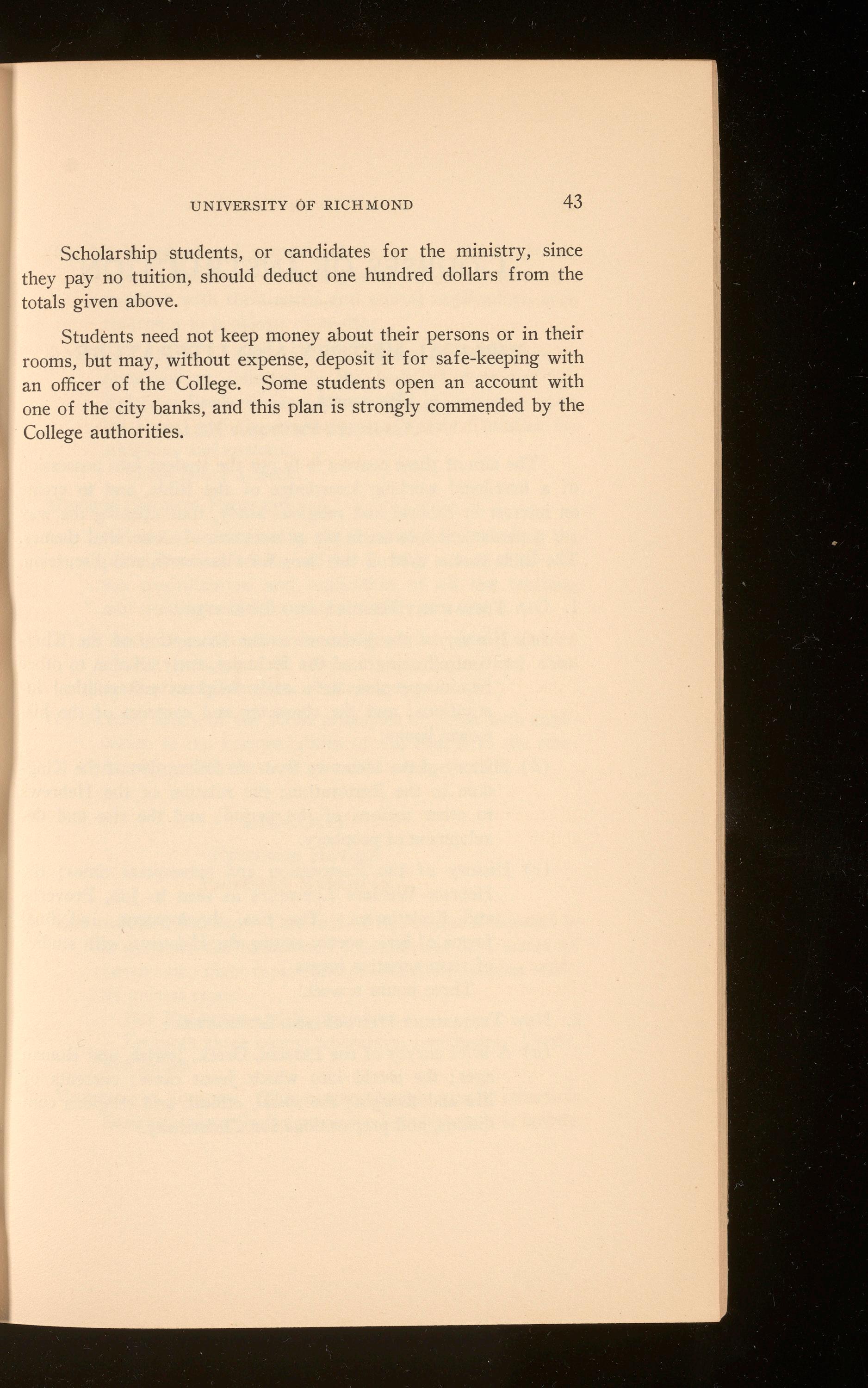
Scholarship students, or candidates for the mm1stry, since they pay no tuition, should deduct one hundred dollars from the totals given above.
Students need not keep money about their persons or in their rooms, but may, without expense, deposit it for safe-keeping with an officer of the College. Some students open an account with one of the city banks, and this plan is strongly commep.ded by the College authorities.
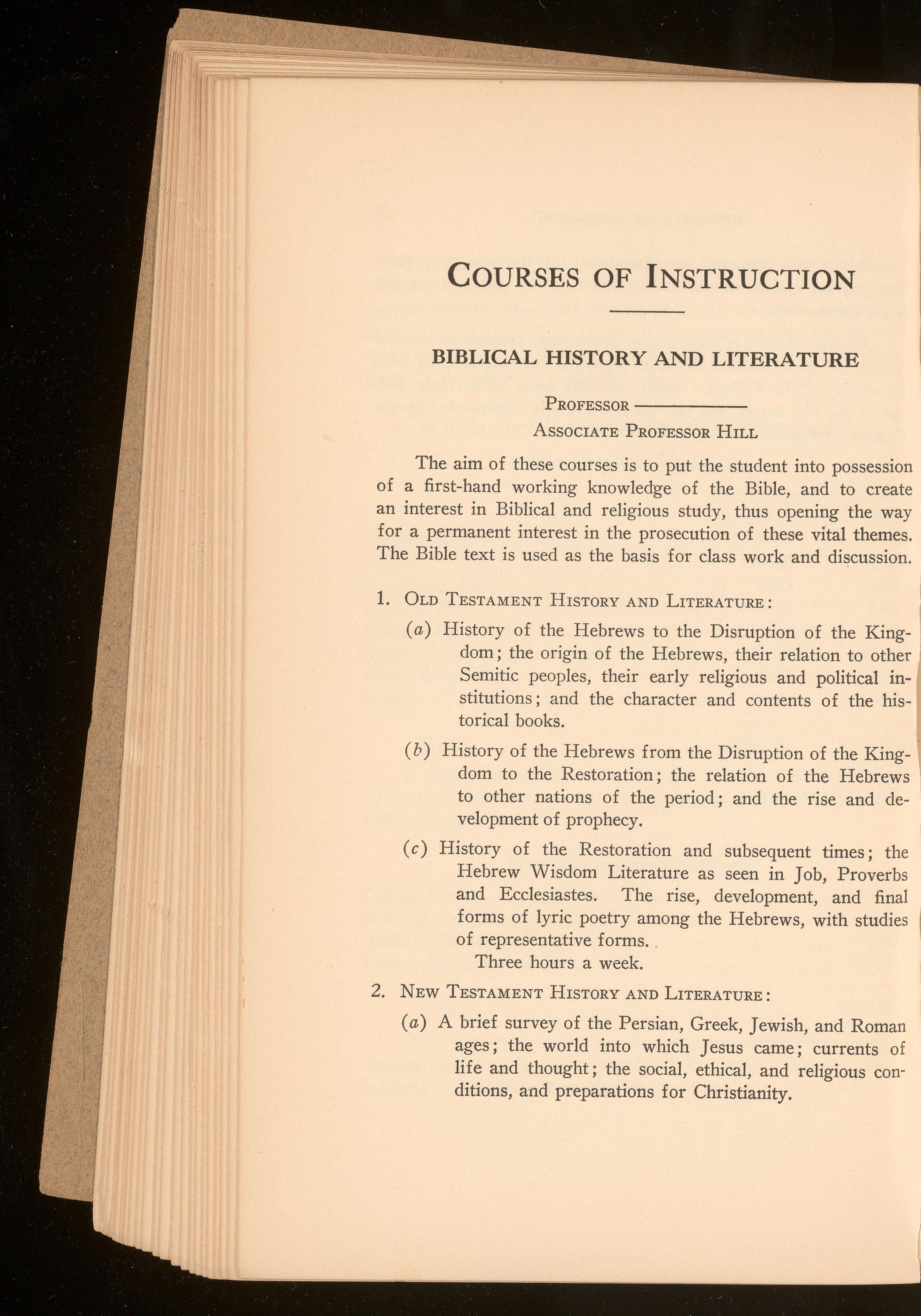
BIBLICAL HISTORY AND LITERATURE
PROFESSOR-----
ASSOCIATE PROFESSOR HILL
The aim of these courses is to put the student into possession of a first-hand working knowledge of the Bible, and to create an interest in Biblical and religious study, thus opening the way for a permanent interest in the prosecution of these vital themes. The Bible text is used as the basis for class work and discussion.
1. OLD TESTAMENT HISTORY AND LITERATURE:
(a) History of the Hebrews to the Disruption of the Kingdom; the origin of the Hebrews, their relation to other Semitic peoples, their early religious and political institutions; and the character and contents of the historical books.
(
b) History of the Hebrews from the Disruption of the Kingdom to the Restoration; the relation of the Hebrews to other nations of the period; and the rise and development of prophecy.
(
c) History of the Restoration and subsequent times; the Hebrew Wisdom Literature as seen in Job, Proverbs and Ecclesiastes. The rise, development, and final forms of lyric poetry among the Hebrews, with studies of representative forms.
Three hours a week.
2. NEW TESTAMENT HISTORY AND LITERATURE:
(a) A brief survey of the Persian, Greek, Jewish, and Roman ages; the world into which Jesus came; currents of life and thought; the social, ethical, and religious conditions, and preparations for Christianity.
(
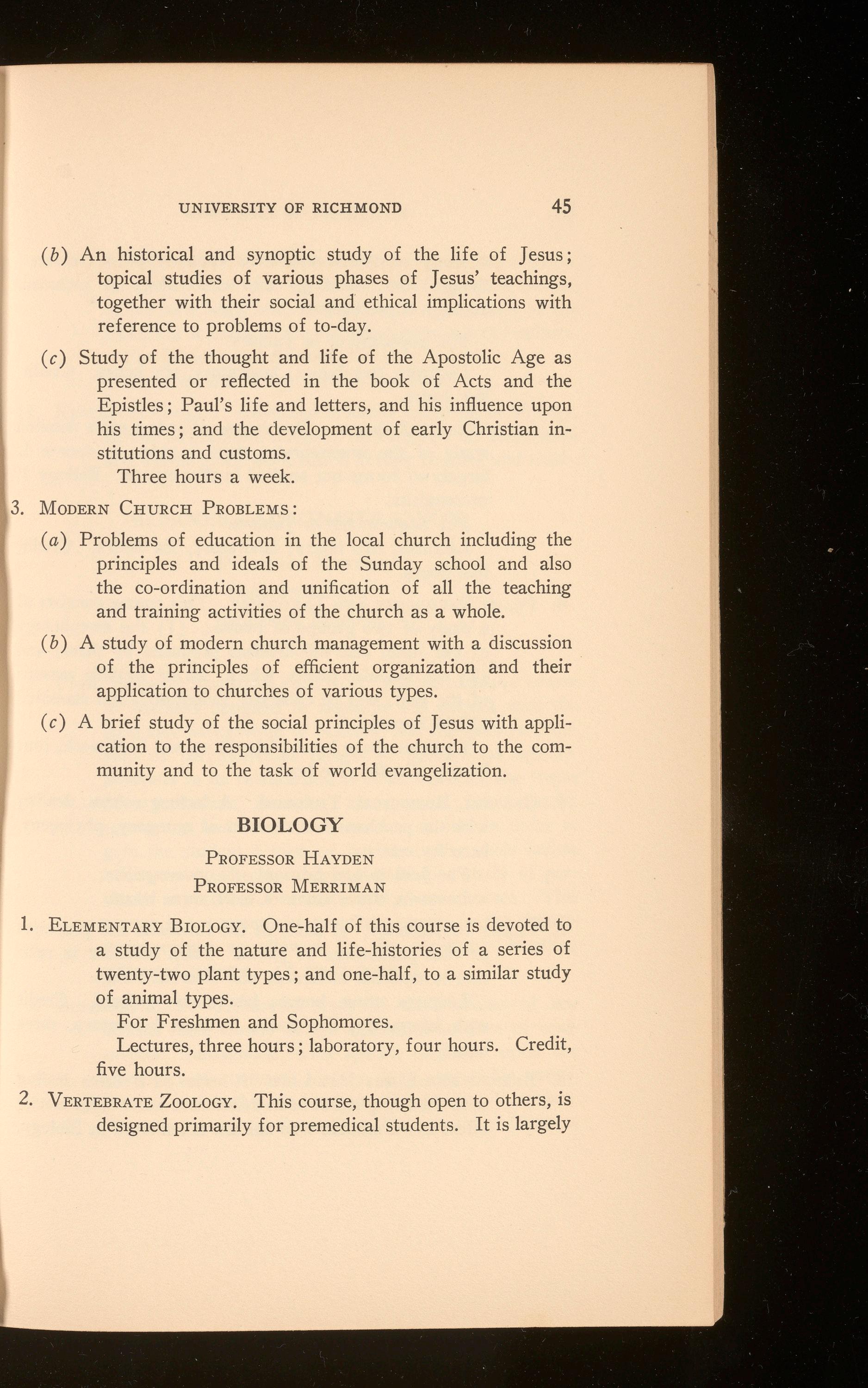
b) An historical and synoptic study of the life of Jesus; topical studies of various phases of Jesus' teachings, together with their social and ethical implications with reference to problems of to-day.
( c) Study of the thought and life of the Apostolic Age as presented or reflected in the book of Acts and the Epistles; Paul's life and letters, and his influence upon his times; and the development of early Christian institutions and customs.
Three hours a week.
(a) Problems of education in the local church including the principles and ideals of the Sunday school and also the co-ordination and unification of all the teaching and training activities of the church as a whole.
( b) A study of modern church management with a discussion of the principles of efficient organization and their application to churches of various types.
( c) A brief study of the social principles of Jesus with application to the responsibilities of the church to the community and to the task of world evangelization.
PROFESSORHAYDEN
PROFESSORMERRIMAN
1. ELEMENTARYBIOLOGY.One-half of this course is devoted to a study of the nature and life-histories of a series of twenty-two plant types; and one-half, to a similar study of animal types. For Freshmen and Sophomores. Lectures, three hours; laboratory, four hours. Credit, five hours.
2. VERTEBRATEZOOLOGY.This course, though open to others, is designed primarily for premedical students. It is largely
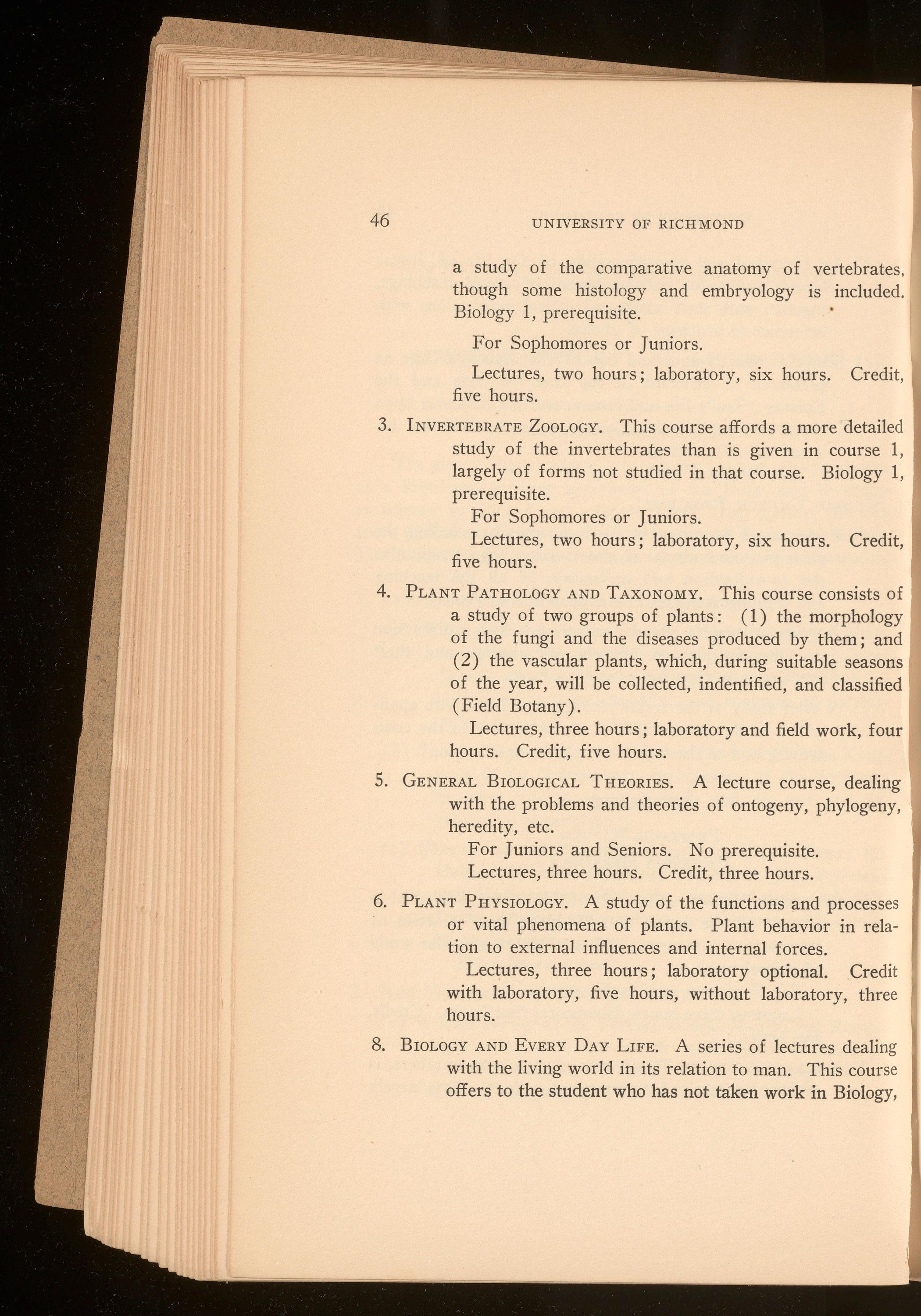
a study of the comparative anatomy of vertebrates , though some histology and embryology is included. Biol ogy 1, prerequisite.
For Sophomores or Juniors.
Lectures, two hours; laboratory, six hours. Credit , five hours.
3. INVERTEBRATEZooLOGY. This course affords a more detailed study of the invertebrates than is given in course 1, largely of forms not studied in that course. Biology 1, prerequisite.
For Sophomores or Juniors.
Lectures, two hours; laboratory, six hours. Credit, five hours.
4. PLANT PATHOLOGYANDTAXONOMY.This course consists of a study of two groups of plants : ( 1) the morphology of the fungi and the diseases produced by them; and (2) the vascular plants, which, during suitable seasons of the year, will be collected, indentified, and classified ( Field Botany) .
Lectures, three hours; laboratory and field work, four hours. Credit, five hours.
5. GENERALBIOLOGICALTHEORIES. A lecture course, dealing with the problems and theories of ontogeny, phylogeny, heredity, etc.
For Juniors and Seniors. No prerequisite.
Lectures, three hours. Credit, three hours.
6. PLANT PHYSIOLOGY.A study of the functions and processes or vital phenomena of plants. Plant behavior in relation to external influences and internal forces.
Lectures, three hours; laboratory optional. Credit with laboratory, five hours, without laboratory, three hours.
8. BIOLOGYANDEvERY DAY LIFE. A series of lectures dealing with the living world in its relation to man. This course offers to the student who has not taken work in Biology,
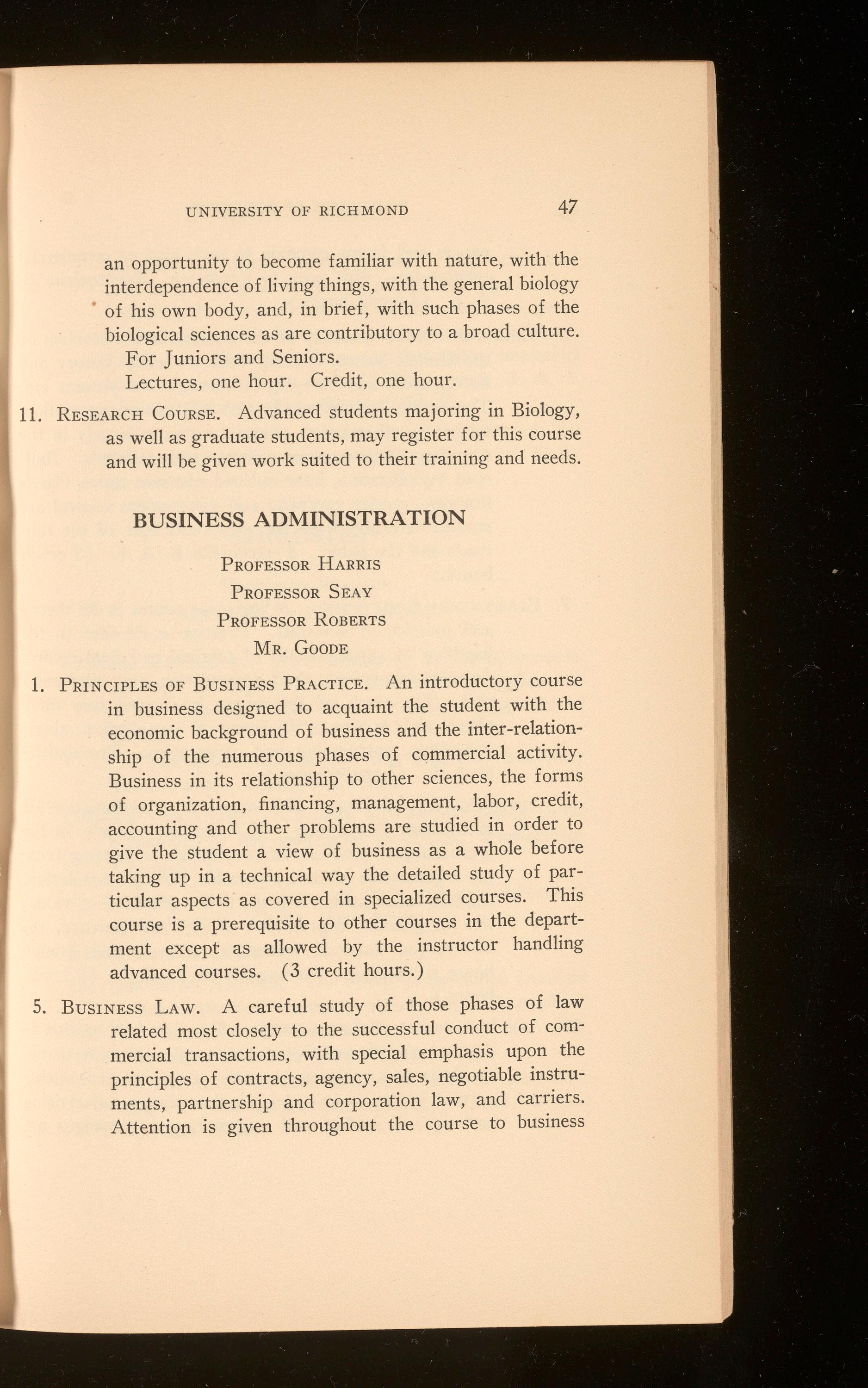
an opportunity to become familiar with nature, with the interdependence of living things, with the general biology of his own body, and, in brief, with such phases of the biological sciences as are contributory to a broad culture. For Juniors and Seniors.
Lectures, one hour. Credit, one hour.
11. RESEARCHCouRSE. Advanced students majoring in Biology, as well as graduate students, may register for this course and will be given work suited to their training and needs.
PROFESSORHARRIS
PROFESSORSEAy
PROFESSORROBERTS
MR. GOODE
1. PRINCIPLESOF BusINESS PRACTICE. An introductory course in business designed to acquaint the student with the economic background of business and the inter-relationship of the numerous phases of commercial activity. Business in its relationship to other sciences, the forms of organization, financing, management, labor, credit, accounting and other problems are studied in order to give the student a view of business as a whole before taking up in a technical way the detailed study of particular aspects ·as covered in specialized courses. This course is a prerequisite to other courses in the department except as allowed by the instructor handling advanced courses. ( 3 credit hours.)
5. BUSINESS LAw. A careful study of those phases of law related most closely to the successful conduct of commercial transactions, with special emphasis upon the principles of contracts, agency, sales, negotiable instruments, partnership and corporation law, and carriers. Attention is given throughout the course to business

papers and forms common to each kind of commercial relationship. Not open to Freshmen. Prerequisite B. A. 1. ( 3 credit hours.)
6. TRANSPORTATION.A study of the transportation problem of the United States, starting with the early history and development and carrying it through the present era. The course deals primarily with railroad transportation, taking' up other forms of transportation largely in the way they supplement or compete with railroads. Railroad capitalization, inter-railroad relations, rates, classifications, carrier contracts and government control are studied carefully from the viewpoints both of the railroads and the public. Prerequisite B. A. 1. ( 3 credit hours.)
7. ELEMENTARYAccouNTING. A beginning course in the theory and practice of accounts. Practice is devoted to the handling of various books of original and final record, financial statements, their construction and interpretation. The work of the course is divided into three phases as it applies to the forms of organization: single ownership, partnership and corporation. Prerequisite B. A. 1. ( 3 credit hours.)
8. ADVANCEDAccouNTING. This course is a continuation of Elementary Accounting. It is confined largely to the more complex problems of corporation accounting from the organization of the corporation through dissolution. Careful consideration is given to the questions of valuation in general, depreciation theory and practice, receiverships, financial statement, analysis and branch house accounting. Prerequisits B. A. 1, 7. ( 3 credit hours.)
10. ADVERTISINGAND SALESMANSHIP. The first half session is devoted to the study of the principles of advertising. Analysis and criticism is made of the advertisements carried in the more widely used mediums ; advertising technique is studied and analyzed, and campaigns are
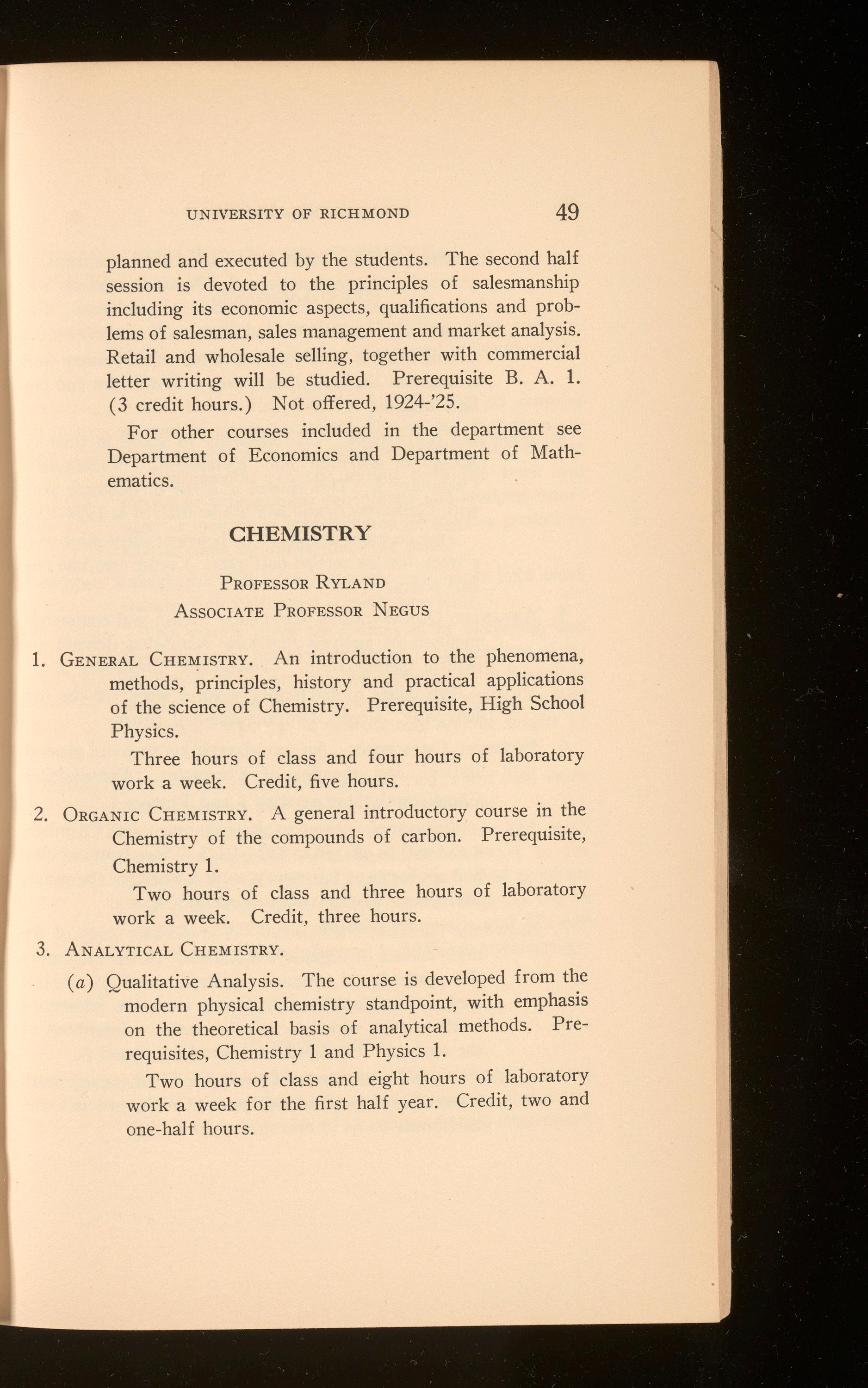
planned and executed by the students. The second half session is devoted to the principles of salesmanship including its economic aspects, qualifications and problems of salesman, sales management and market analysis. Retail and wholesale selling, together with commercial letter writing will be studied. Prerequisite B. A. 1.
(3 credit hours.) Not offered, 1924-'25.
For other courses included in the department see Department of Economics and Department of Mathematics.
1. GENERALCHEMISTRY. An introduction to the phenomena, methods, principles, history and practical applications of the science of Chemistry. Prerequisite, High School Physics.
Three hours of class and four hours of laboratory work a week. Credit, five hours.
2. ORGANICCHEMISTRY. A general introductory course in the Chemistry of the compounds of carbon. Prerequisite, Chemistry 1.
Two hours of class and three hours of laboratory work a week. Credit, three hours.
3. ANALYTICALCHEMISTRY.
(a) Qualitative Analysis. The course is developed from the modern physical chemistry standpoint, with emphasis on the theoretical basis of analytical methods. Prerequisites, Chemistry 1 and Physics 1.
Two hours of class and eight hours of laboratory work a week for the first half year. Credit, two and one-half hours.

( b) Elementary Quantitative Analysis. The fundament al principles of gravimetric and volumetric analysis wit h extended practice in the solution of problems. Pr erequisites, Chemistry 1 and Physics 1.
One hour of class and ten hours of laboratory work a week for the second half year. Credit two and onehalf hours.
4. FooD AND NUTRITION. The chemistry of foods in their relation to nutrition and metabolism. Prerequisite, Chemistry 2. This course is given in alternate year with Chemistry 6, and will not be offered in 1924-1925
Two hours of class and six hours of laboratory wor a week for the second half year. Credit, two and onehalf hours.
5. ADVANCEDQUANTITATIVEANALYSIS. Select and commercial methods of analysis involving somewhat difficult and skillful manipulation. Prerequisite, Chemistry 3.
Ten hours of laboratory work a week for the first half year. Credit, two and one-half hours.
6. PHYSICALCHEMISTRY. An introduction to the main generalizations and theories of Chemistry. · Prerequisites, Chemistry 1, Mathematics 1 and Physics 1.
This course is given in alternate years with Chemistry 4 and will be offered in 1924-1925. Three hours of class and six hours of laboratory work a week for the second half year. Credit, two and one-half hours.
7. ADVANCEDORGANICCHEMISTRY. A systematic study of the main classes of organic compounds. In the laborator y the methods of organic synthesis and of organi c analysis are studied. In special cases the laborator y work may be varied to suit the needs or intentions of the student. Prerequisites, Chemistry 2 and 3.
One hour of class and ten hours of laboratory work a week for the second half year. Credit, two and onehalf hours.

ENGINEERINGDRAWING. Four hours drafting room weekly. Credit, two hours. Text: "Engineering Drawing", by French.
This course includes the fundamentals of drawing as applied to Engineering. During the first term especial emphasis will be given to lettering and the use of instruments. In the second term the work will consist of orthographic projections and working drawings. Problems in isometric and perspective projection will be taken up during the third term.
GENERALSURVEYING. One hour lecture, two hours field work weekly, first half year. Credit, one hour.
This course gives the principles of surveying and the solution of practical problems. Applications of intersection, resection and the methods of computation will be taken up in the class room and applied in tteld problems. The use of instruments will be taught by field problems.
HIGHWAYSURVEYING.One hour lecture, two hours field work weekly second half year. Credit, one hour.
This course will consist of topographic and earth work computations with particular attention to the problems met in highway engineering. Field problems in profiles, cross-sections, and contour mapping will be studied. Earthwork problems on grades and fills will be considered with reference to highway engineering.
EcoNoM1cs I. Principles of Economics. This is the basic course in the theory and teachings of Economics and is required as prerequisite to all courses in this department,

and for the degree of B. S. in Business Administration. The underlying theories of Economics are developed by reference to specific conditions. (Not open to first year students except upon permission from the head of this department.
EcoNOMICS II. Money and Banking. During the first term a study is made of the history and problems of money and banking. The second term is devoted to bank accountancy. Regular banking sets are used in order to familiarize the student with the functions of each department. Attention is also given to the analysis of business financial statements as a basis for granting credit. The third term consists in main of a thorough study of the Federal Reserve System. In addition the main features of the Canadian banking system and the banks of England, France and Germany are considered.
ECONOMICSIII. Public Finance and Foreign Trade. During the first half session a comprehensive study is made of public finance, including Expenditures, Revenues and Budgets. Special attention is given to the Federal Income Tax and to State Taxation. The second half session is spent in developing the economic principles applying to foreign trade. A study is made of foreign exchange, tariff policies and financing of export shipments. Special attention is given to trade between the United States and South America.
1. (a) EnucATIONALPSYCHOLOGY.A brief course in psychology as it relates to teaching and class room procedure.
(b) PRINCIPLESOF TEACHINGIN HIGH SCHOOLS. A treatment of teaching method with emphasis placed on secondary school problems.
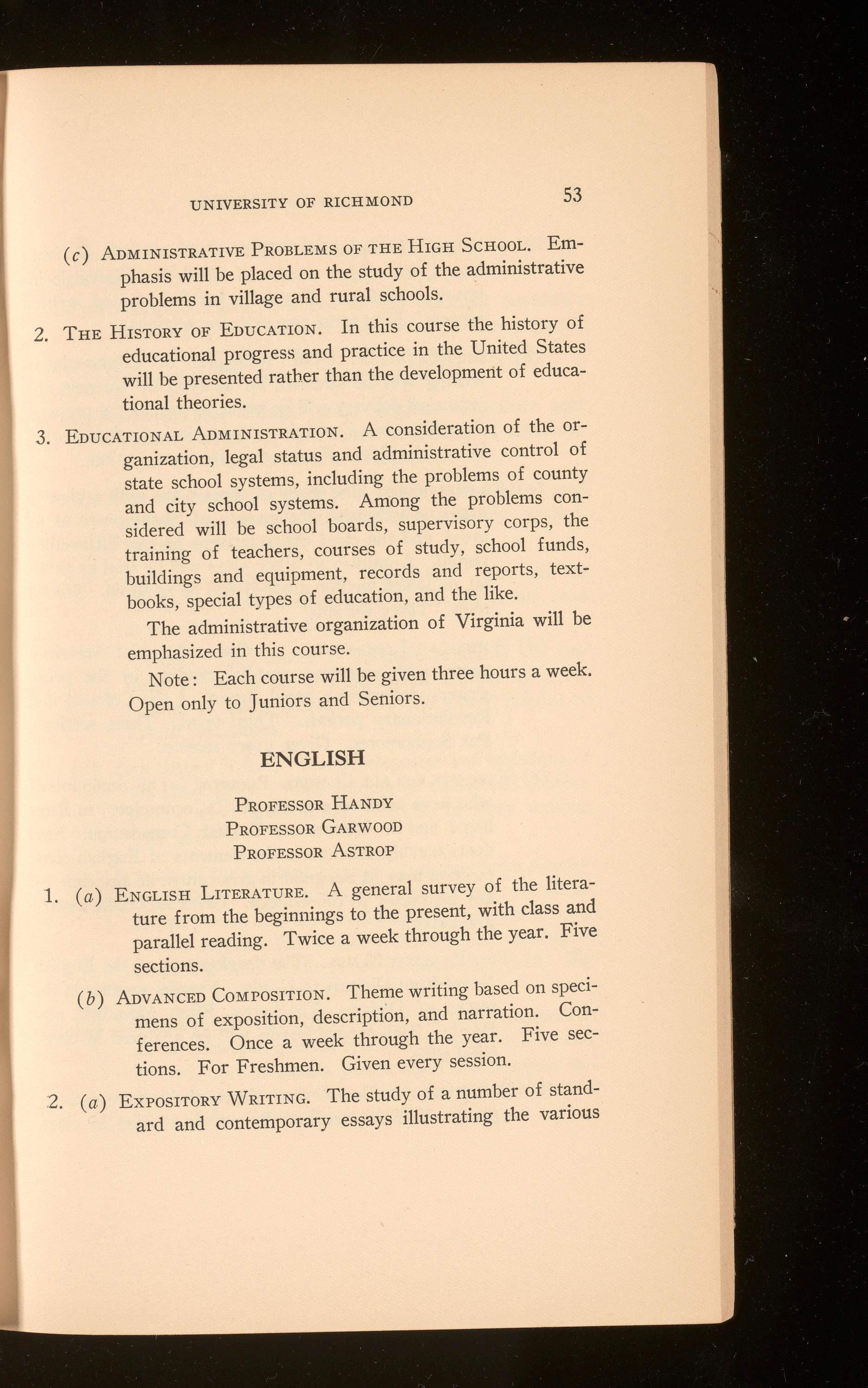
(c) ADMINISTRATIVEPROBLEMSOFTHE HIGH SCHOOL. Emphasis will be placed on the study of the administrative problems in village and rural schools.
2. THE HISTORYOF EDUCATION. In this course the history of educational progress and practice in the United States will be presented rather than the development of educational theories.
3. EDUCATIONALADMINISTRATION. A consideration of the organization, legal status and administrative control of state school systems, including the problems of county and city school systems. Among the problems considered will be school boards, supervisory corps, the training of teachers, courses of study, school funds, buildings and equipment, records and reports, textbooks, special types of education, and the like.
The administrative organization of Virginia will be emphasized in this course.
Note : Each course will be given three hours a week. Open only to Juniors and Seniors.
PROFESSORHANDY
PROFESSORGARWOOD
PROFESSORAsTROP
1. (a) ENGLISH LITERATURE. A general survey of the literature from the beginnings to the present, with class and parallel reading. Twice a week through the year. Five sections.
(b) ADVANCEDCOMPOSITION.Theme writing based on specimens of exposition, description, and narration. Conferences. Once a week through the year. Five sections. For Freshmen. Given every session.
2 . (a) ExrosITORY WRITING. The study of a number of standard and contemporary essays illustrating the various
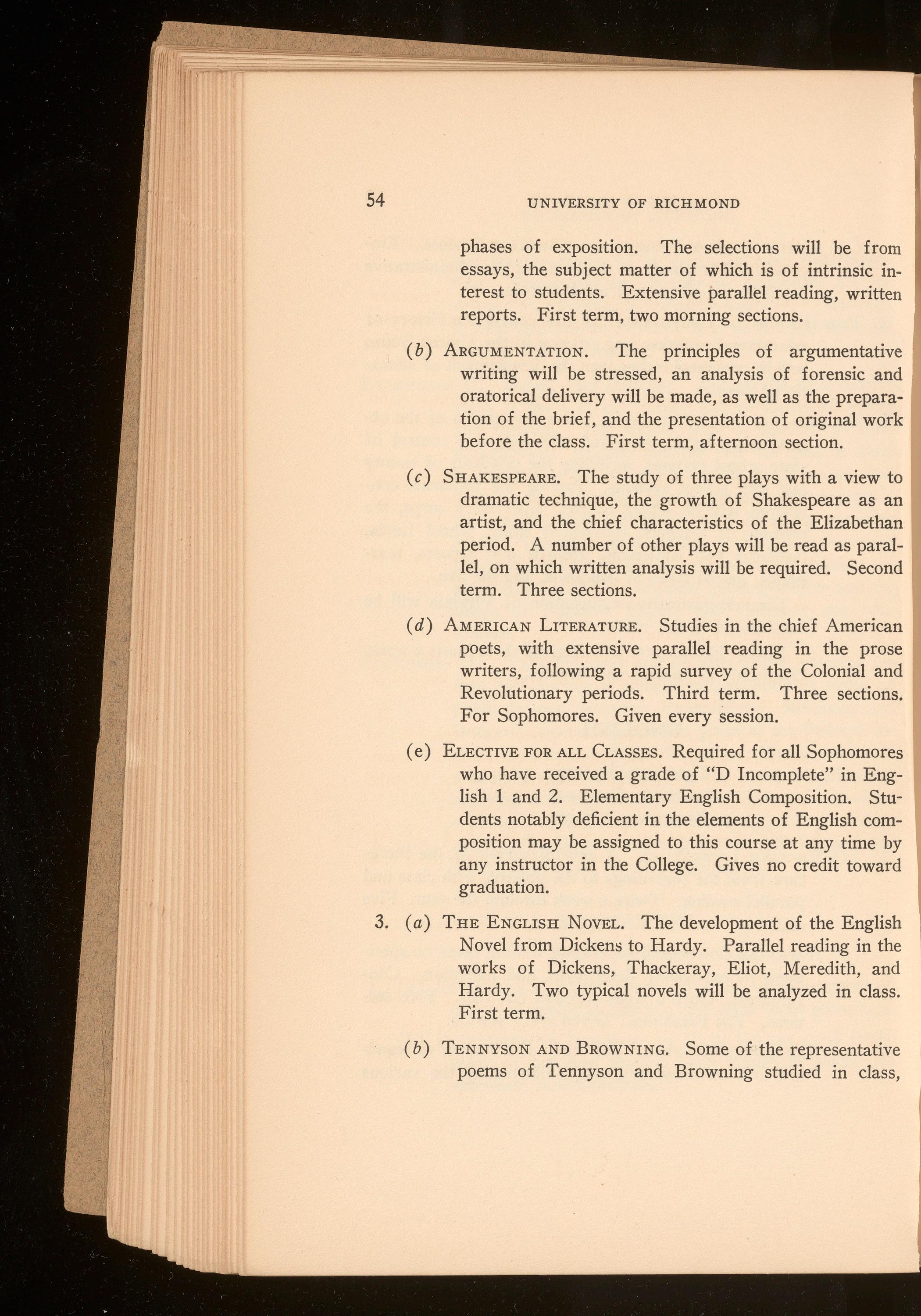
phases of exposition. The selections will be from essays, the subject matter of which is of intrinsic interest to students. Extensive parallel reading, written reports. First term, two morning sections.
(b) ARGUMENTATION. The principles of argumentative writing will be stressed, an analysis of forensic and oratorical delivery will be made, as well as the preparation of the brief, and the presentation of original work before the class. First term, afternoon section.
(c) SHAKESPEARE.The study of three plays with a view to dramatic technique, the growth of Shakespeare as an artist, and the chief characteristics of the Elizabethan period. A number of other plays will be read as parallel, on which written analysis will be required. Second term. Three sections.
(d) AMERICANLITERATURE.Studies in the chief American poets, with extensive parallel reading in the prose writers, following a rapid survey of the Colonial and Revolutionary periods. Third term. Three sections. For Sophomores. Given every session.
(
e) ELECTIVEFORALLCLASSES.Required for all Sophomores who have received a grade of "D Incomplete" in English 1 and 2. Elementary English Composition. Students notably deficient in the elements of English composition may be assigned to this course at any time by any instructor in the College. Gives no credit toward graduation.
3. (a) THE ENGLISH NOVEL. The development of the English Novel from Dickens to Hardy. Parallel reading in the works of Dickens, Thackeray, Eliot, Meredith, and Hardy. Two typical novels will be analyzed in class. First term.
( b) TENNYSONANDBROWNING. Some of the representative poems of Tennyson and Browning studied in class,
(
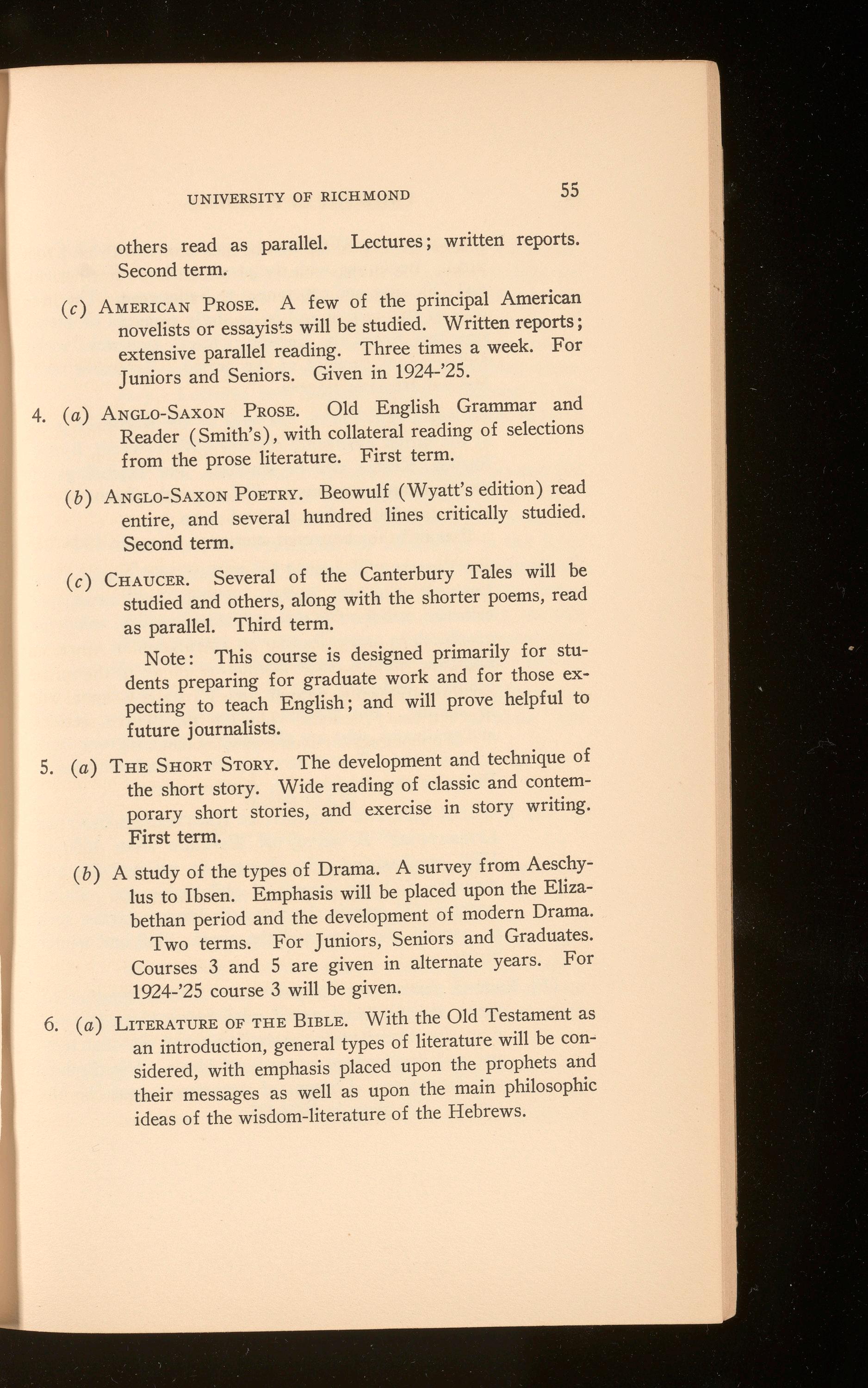
others read as parallel. Lectures ; written reports. Second term.
c) AMERICANPROSE. A few of the principal American novelists or essayists will be studied. Written reports; extensive parallel reading. Three times a week. For Juniors and Seniors. Given in 1924-'25.
4. (a) ANGLO-SAXONPROSE. Old English Grammar and Reader (Smith's), with collateral reading of selections from the prose literature. First term.
(b) ANGLO-SAXONPOETRY. Beowulf (Wyatt's edition) read entire, and several hundred lines critically studied. Second term.
(c) CHAUCER. Several of the Canterbury Tales will be studied and others, along with the shorter poems, read as parallel. Third term.
Note : This course is designed primarily for students preparing for graduate work and for those expecting to teach English; and will prove helpful to future journalists.
5. (a) THE SHORTSTORY. The development and technique of the short story. Wide reading of classic and contemporary short stories, and exercise in story writing. First term.
( b) A study of the types of Drama. A survey from Aeschylus to Ibsen. Emphasis will be placed upon the Elizabethan period and the development of modern Drama. Two terms. For Juniors, Seniors and Graduates. Courses 3 and 5 are given in alternate years. For 1924-'25 course 3 will be given.
6. (a) LITERATUREOF THE BIBLE. With the Old Testament as an introduction, general types of literature will be considered, with emphasis placed upon the prophets and their messages as well as upon the main philosophic ideas of the wisdom-literature of the Hebrews.
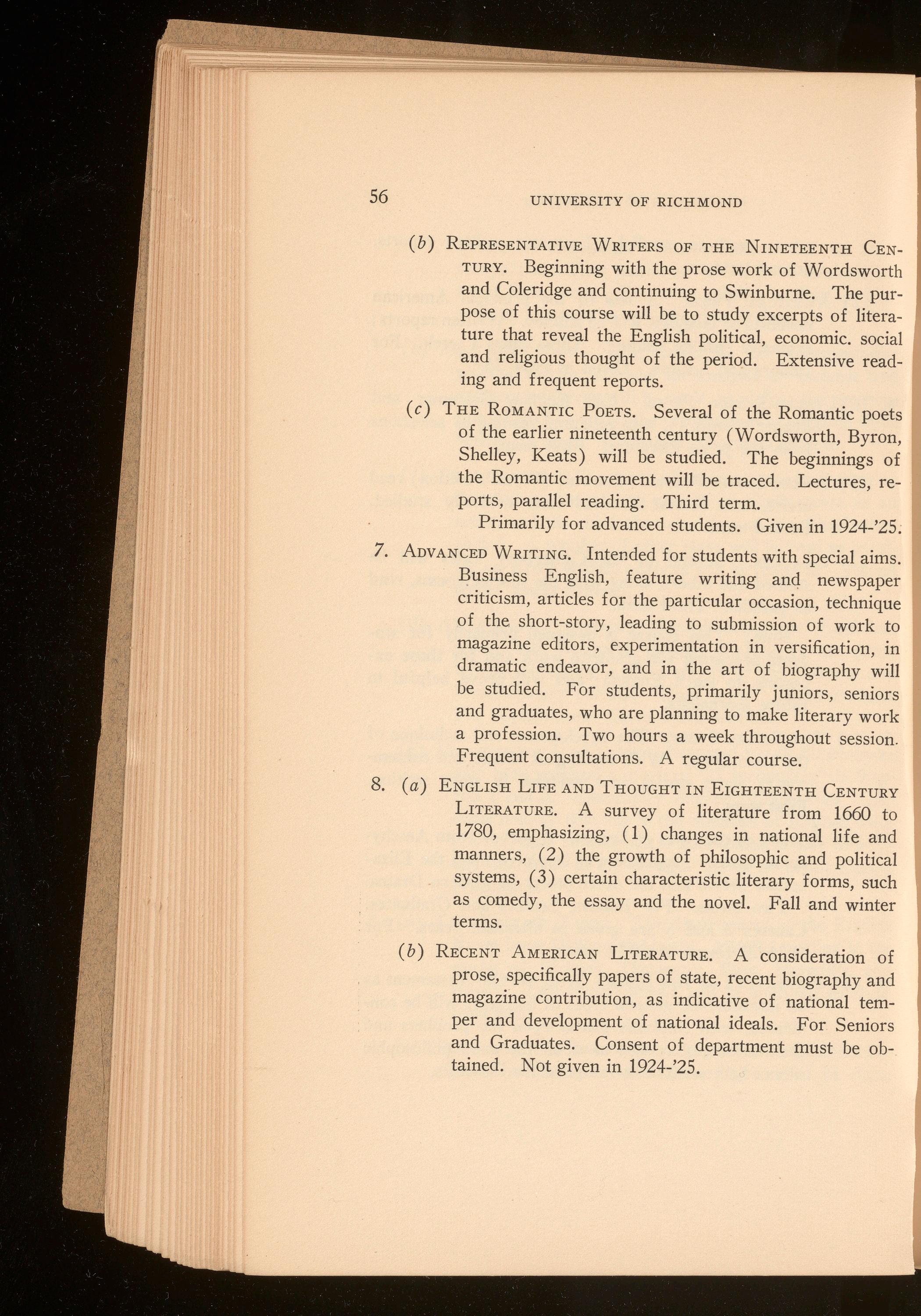
(b) REPRESENTATIVEWRITERS OF THE NINETEENTH CENTURY. Beginning with the prose work of Wordsworth and Coleridge and continuing to Swinburne. The purpose of this course will be to study excerpts of literature that reveal the English political, economic. social and religious thought of the period. Extensive reading and frequent reports.
( c) THE ROMANTICPoETs. Several of the Romantic poets of the earlier nineteenth century (Wordsworth, Byron, Shelley, Keats) will be studied. The beginnings of the Romantic movement will be traced. Lectures, reports, parallel reading. Third term.
Primarily for advanced students. Given in 1924-'25.
7. ADVANCEDWRITING. Intended for students with special aims. Business English, feature writing and newspaper criticism, articles for the particular occasion, technique of the short-story, leading to submission of work to magazine editors, experimentation in versification, in dramatic endeavor, and in the art of biography will be studied. For students, primarily juniors, seniors and graduates, who are planning to make literary work a profession. Two hours a week throughout session. Frequent consultations. A regular course.
8. (a) ENGLISHLIFE ANDTHOUGHTIN EIGHTEENTHCENTURY LITERATURE. A survey of liter ,ature from 1660 to 1780, emphasizing, ( 1) changes in national life and manners, (2) the growth of philosophic and political systems, ( 3) certain characteristic literary forms, such as comedy, the essay and the novel. Fall and winter terms.
( b) RECENT AMERICAN LITERATURE. A consideration of prose, specifically papers of state, recent biography and magazine contribution, as indicative of national temper and development of national ideals. For Seniors and Graduates. Consent of department must be obtained. Not given in 1924-'25.

THE ROMANTICMOVEMENTIN THE NINETEENTHCENTURY. A comparative literature course designed especially for graduates and for students doing work leading to the Master of Arts' degree. A reading knowledge of French and German will be found helpful in the investigations assigned and in the parallel reading necessary. Lectures and frequent reports. Consent of the department must be obtained. Three hours a week every sess10n.
10. A SURVEYFORADVANCEDSTUDENTS. Grouped around the general subject "Types and Masterpieces of all Literature", a survey study will be attempted for the student who wishes to synthesize his knowledge in the fields of comparative literature. The course is designed for the exceptional student who is willing to read extensively throughout the three terms. Lectures, parallel and frequent reports. Consent of the department must be obtained. Three hours a week. Given in 1924-'25.
Note: Every student in the department will possess a modern reputable dictionary ; and will purchase "The Facts and Backgrounds of Literature."
GERMAN
PROFESSORMEREDITH
1. ELEMENTARYGERMAN. A beginning course for those students who have never studied German or whose preparation is inadequate for more advanced work. It includes Elementary Grammar and Composition; special training in pronounciation and simple conversation German; the reading of simple texts in class and assigned parallel. Three hours a week. College credit only when followed by German 2.
2. INTRODUCTIONTO GERMANLITERATURE. Open to students who have taken Course 1 or its equivalent. It includes a review of German forms, a more careful study of
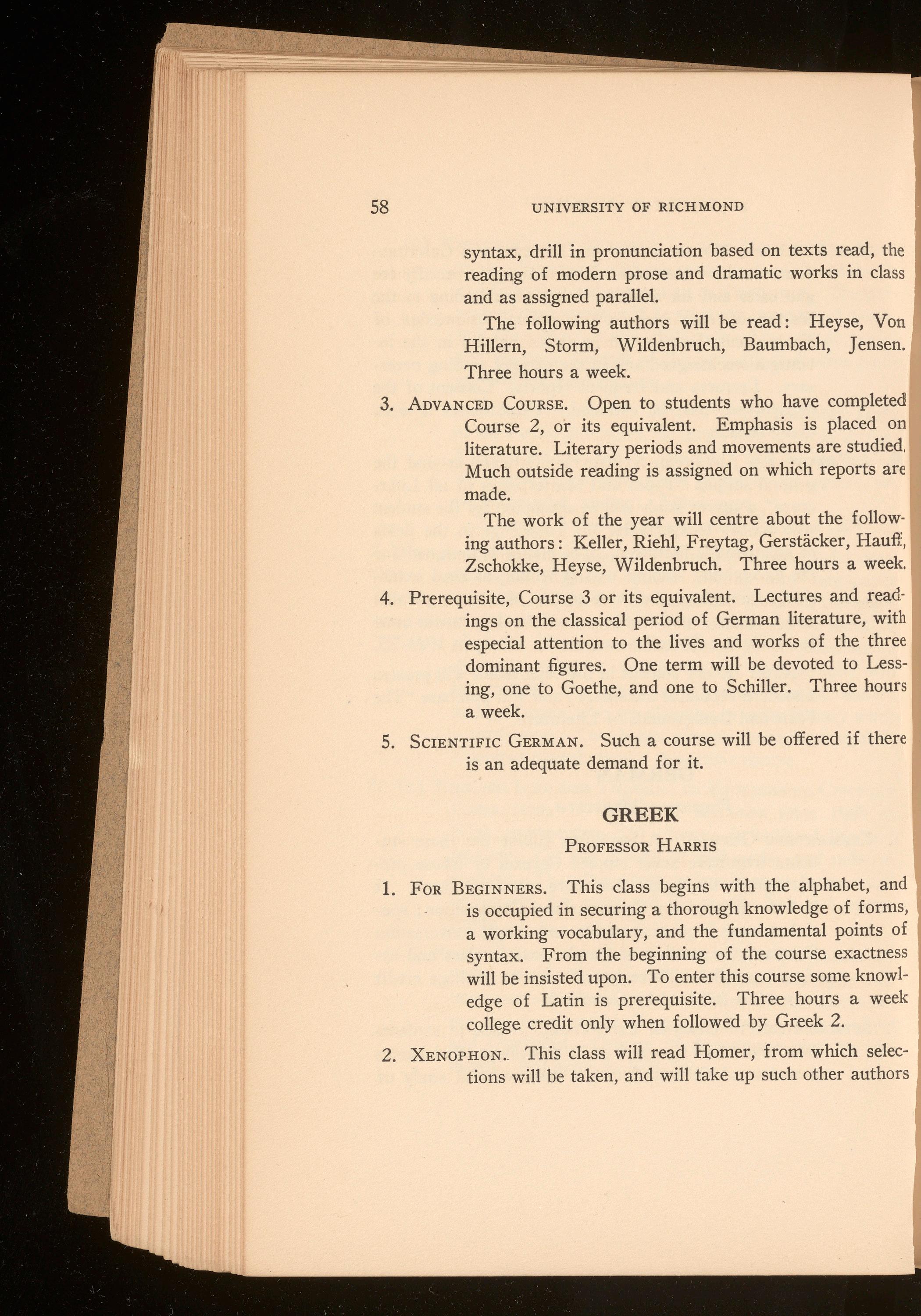
syntax, drill in pronunciation based on texts read, the reading of modern prose and dramatic works in class and as assigned parallel.
The following authors will be read : Heyse, Von Hillern, Storm, Wildenbruch, Baumbach, Jensen. Three hours a week.
3. ADVANCEDCouRSE. Open to students who have completed Course 2, or its equivalent. Emphasis is placed on literature Literary periods and movements are studied . Much outside reading is assigned on which reports ar e made.
The work of the year will centre about the following authors: Keller, Riehl, Freytag, Gerstiicker, Hauff , Zschokke, Heyse, Wildenbruch. Three hours a week.
4. Prerequisite, Course 3 or its equivalent. Lectures and rea dings on the classical period of German literature, with especial attention to the lives and works of the thre e dominant figures. One term will be devoted to Les sing, one to Goethe, and one to Schiller. Three hour s a week.
5. SCIENTIFICGERMAN. Such a course will be offered if there is an adequate demand for it.
1. FoR BEGINNERS. This class begins with the alphabet , and is occupied in securing a thorough knowledge of form s, a working vocabulary, and the fundamental points of syntax From the beginning of the course exactne ss will be insisted upon. To enter this course some know ledge of Latin is prerequisite. Three hours a week college credit only when followed by Greek 2.
2. XENOPHON. This class will read Homer, from which selections will be taken, and will take up such other author s
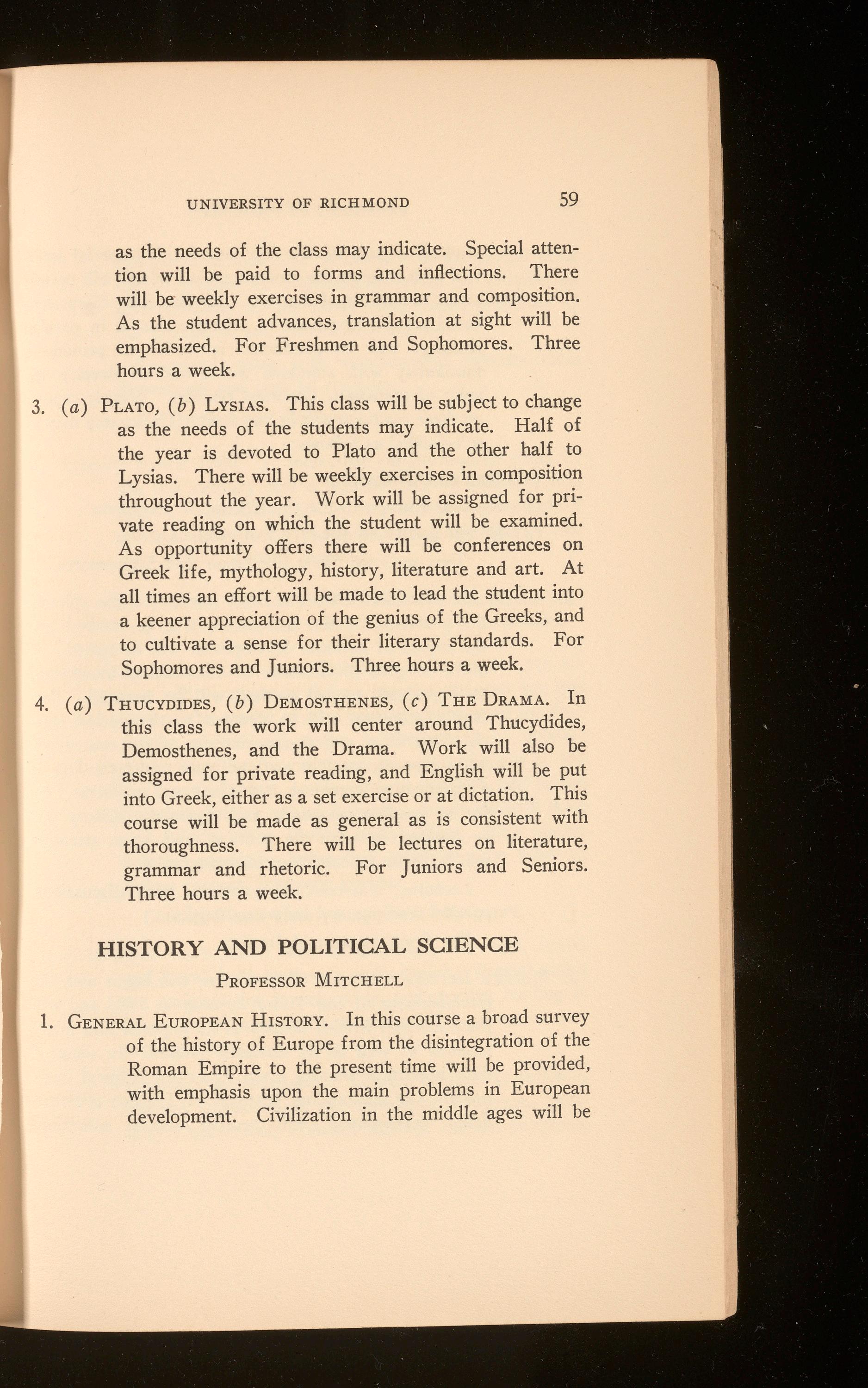
as the needs of the class may indicate. Special attention will be paid to forms and inflections. There will be weekly exercises in grammar and composition. As the student advances, translation at sight will be emphasized. For Freshmen and Sophomores. Three hours a week.
3. (a) PLATO,(b) LYSIAS. This class will be subject to change as the needs of the students may indicate. Half of the year is devoted to Plato and the other half to Lysias. There will be weekly exercises in composition throughout the year. Work will be assigned for private reading on which the student will be examined. As opportunity offers there will be conferences on Greek life, mythology, history, literature and art. At all times an effort will be made to lead the student into a keener appreciation of the genius of the Greeks, and to cultivate a sense for their literary standards. For Sophomores and Juniors. Three hours a week.
4. (a) THUCYDIDES,(b) DEMOSTHENES,(c) THE DRAMA. In this class the work will center around Thucydides, Demosthenes, and the Drama. Work will also be assigned for private reading, and English will be put into Greek, either as a set exercise or at dictation. This course will be made as general as is consistent with thoroughness. There will be lectures on literature, grammar and rhetoric. For Juniors and Seniors. Three hours a week.
HISTORY AND POLITICAL SCIENCE
PROFESSORMITCHELL
1. GENERALEUROPEANHISTORY. In this course a broad survey of the history of Europe from the disintegration of the Roman Empire to the present time will be provided, with emphasis upon the main problems in European development. Civilization in the middle ages will be
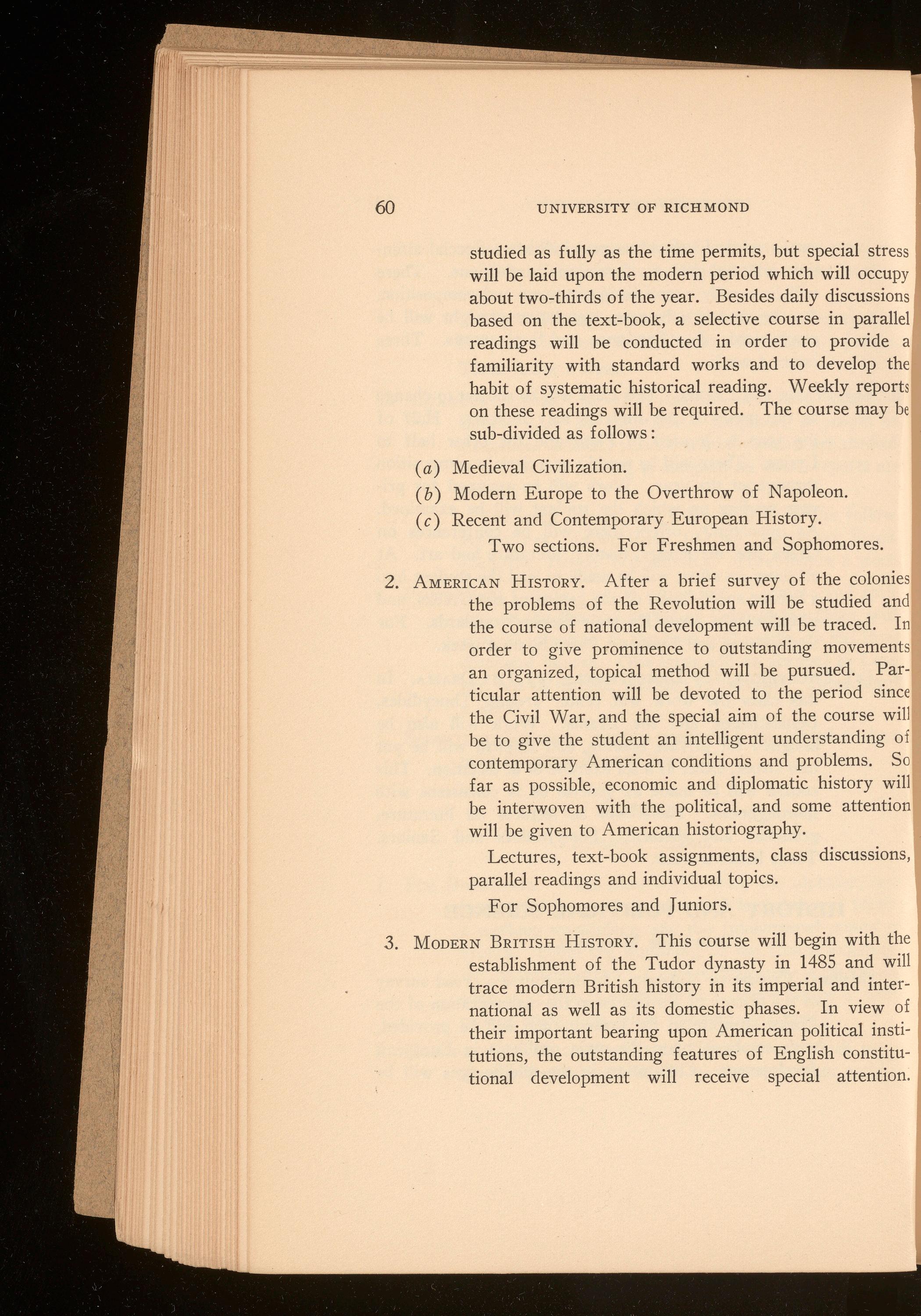
studied as fully as the time permits, but special stre ss will be laid upon the modern period which will occupy about two-thirds of the year. Besides daily discussions based on the text-book, a selective course in parallel readings will be conducted in order to provide a familiarity with standard works and to develop th e habit of systematic historical reading. Weekly report s on these readings will be required. The course may be sub-divided as follows :
(a) Medieval Civilization.
( b) Modern Europe to the Overthrow of Napoleon.
( c) Recent and Contemporary European History.
Two sections. For Freshmen and Sophomores.
2. AMERICANHISTORY. After a brief survey of the colonies the problems of the Revolution will be studied an d the course of national development will be traced. In order to give prominence to outstanding movement s an organized, topical method will be pursued. Particular attention will be devoted to the period since the Civil War, and the special aim of the course will be to give the student an intelligent understanding of contemporary American conditions and problems. S o far as possible, economic and diplomatic history will be interwoven with the political , and some attention will be given to American historiography.
Lectures, text-book assignments , class discussions , parallel readings and individual topics.
For Sophomores and Juniors.
3. MODERNBRITISH HISTORY. This course will begin with th e establishment of the Tudor dynasty in 1485 and wiII trace modern British history in its imperial and international as well as its domestic phases. In view of their important bearing upon American political institutions, the outstanding features of English constitutional development will receive special attention .
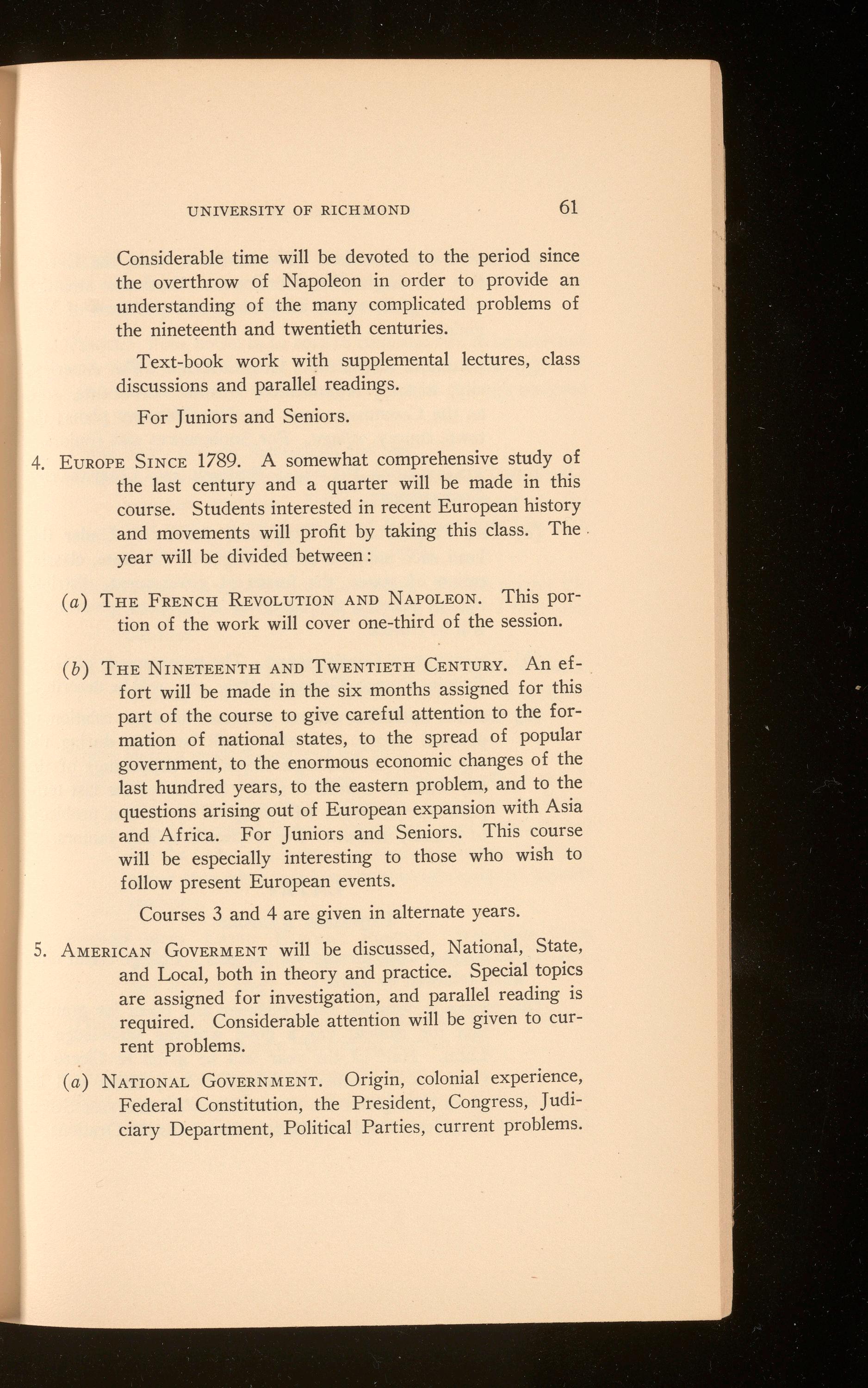
Considerable time will be devoted to the period since the overthrow of Napoleon in order to provide an understanding of the many complicated problems of the nineteenth and twentieth centuries.
Text-book work with supplemental lectures, class discussions and parallel readings.
For Juniors and Seniors.
4. EuROPE SINCE 1789. A somewhat comprehensive study of the last century and a quarter will be made in this course. Students interested in recent European history and movements will profit by taking this class. The . year will be divided between:
(a) THE FRENCH REVOLUTIONAND NAPOLEON. This portion of the work will cover one-third of the session.
(b) THE NINETEENTHANDTWENTIETHCENTURY. An effort will be made in the six months assigned for this part of the course to give careful attention to the formation of national states, to the spread of popular government, to the enormous economic changes of the last hundred years, to the eastern problem, and to the questions arising out of European expansion with Asia and Africa. For Juniors and Seniors. This course will be especially interesting to those who wish to follow present European events.
Courses 3 and 4 are given in alternate years.
5. AMERICANGovERMENTwill be discussed, National, State, and Local, both in theory and practice. Special topics are assigned for investigation, and parallel reading is required. Considerable attention will be given to current problems.
(a) NATIONALGovERNMENT. Origin, colonial experience, Federal Constitution, the President, Congress, Judiciary Department, Political Parties, current problems.
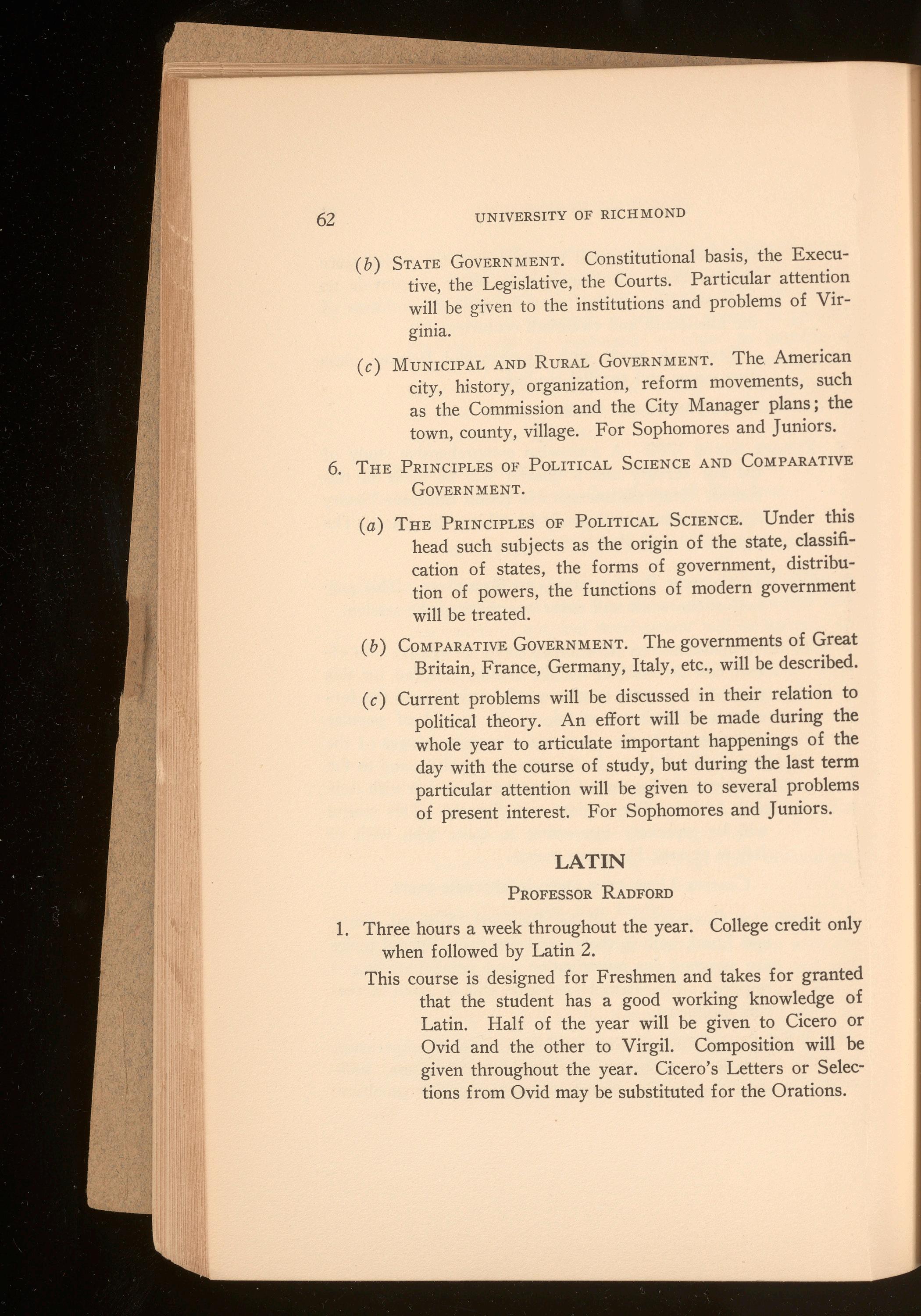
(b) STATE GOVERNMENT.Constitutional basis, the Executive, the Legislative, the Courts. Particular attention will be given to the institutions and problems of Virginia.
(c) MUNICIPALAND RURAL GovERNMENT. The American city, history, organization, reform movements, such as the Commission and the City Manager plans; the town, county, village. For Sophomores and Juniors.
6. THE PRINCIPLESOF POLITICALSCIENCEAND COMPARATIVE GOVERNMENT.
(a) THE PRINCIPLESOF POLITICALSCIENCE. Under this head such subjects as the origin of the state, classification of states, the forms of government, distribution of powers, the functions of modern government will be treated.
(b) COMPARATIVEGOVERNMENT.The governments of Great Britain, France, Germany, Italy, etc., will be described.
( c) Current problems will be discussed in their relation to political theory. An effort will be made during the whole year to articulate important happenings of the day with the course of study, but during the last term particular attention will be given to several problems of present interest. For Sophomores and Juniors.
1. Three hours a week throughout the year. College credit only when followed by Latin 2. This course is designed for Freshmen and takes for granted that the student has a good working knowledge of Latin. Half of the year will be given to Cicero or Ovid and the other to Virgil. Composition will be given throughout the year. Cicero's Letters or Selections from Ovid may be substituted for the Orations.
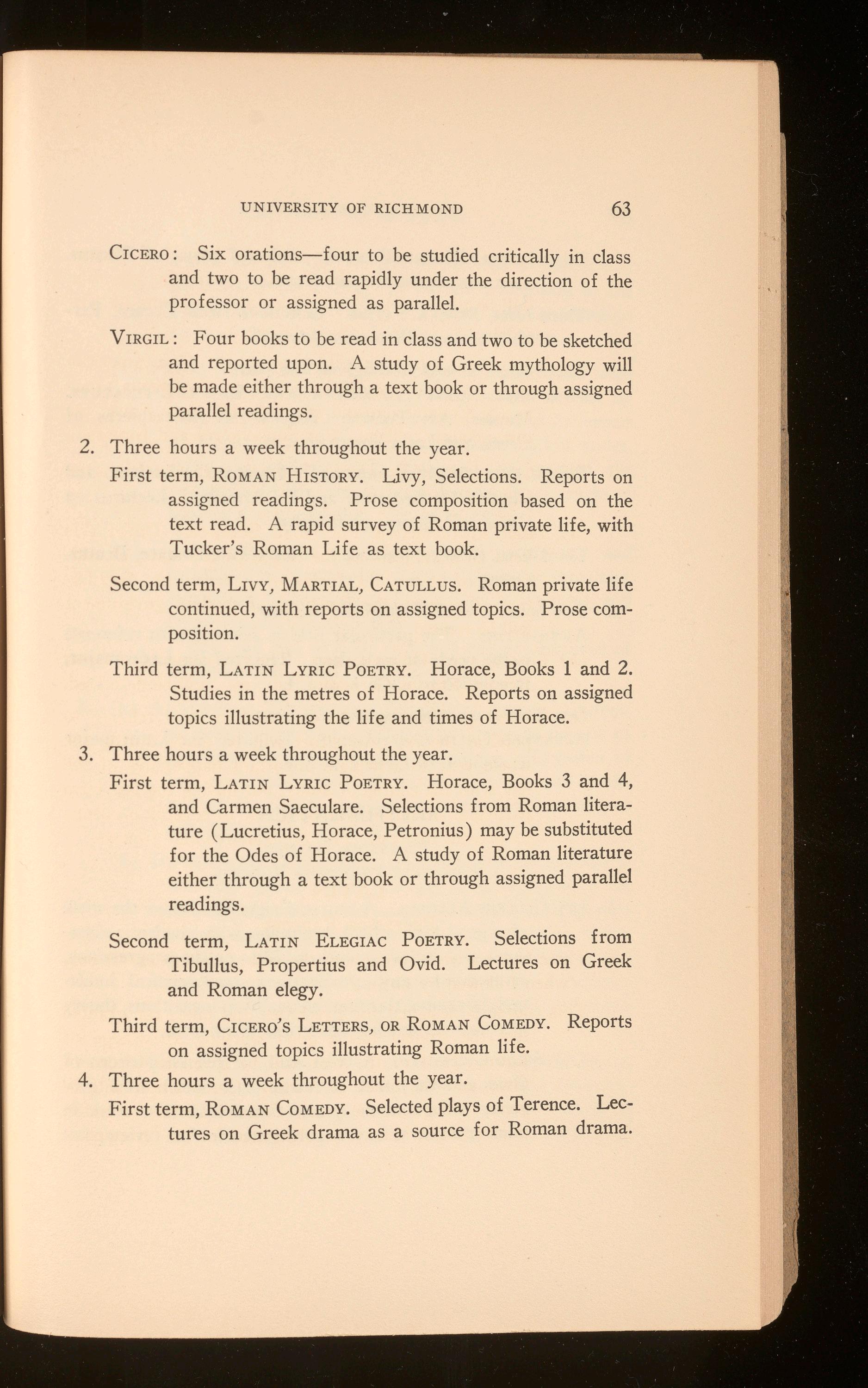
CICERO : Six orations-four to be studied critically in class and two to be read rapidly under the direction of the professor or assigned as parallel.
VIRGIL: Four books to be read in class and two to be sketched and reported upon. A study of Greek mythology will be made either through a text book or through assigned parallel readings.
2. Three hours a week throughout the year.
First term, RoMAN HISTORY. Livy, Selections. Reports on assigned readings. Prose composition based on the text read. A rapid survey of Roman private life, with Tucker's Roman Life as text book.
Second term, LIVY, MARTIAL,CATULLUS. Roman private life continued, with reports on assigned topics. Prose composition.
Third term, LATIN LYRIC POETRY. Horace, Books 1 and 2. Studies in the metres of Horace. Reports on assigned topics illustrating the life and times of Horace.
3. Three hours a week throughout the year.
First term, LATIN LYRIC POETRY. Horace, Books 3 and 4, and Carmen Saeculare. Selections from Roman literature ( Lucretius, Horace, Petronius) may be substituted for the Odes of Horace. A study of Roman literature either through a text book or through assigned parallel readings.
Second term, LATIN ELEGIAC POETRY. Selections from Tibullus, Propertius and Ovid. Lectures on Greek and Roman elegy.
Third term, CICERO'SLETTERS,ORROMANCoMEDY. Reports on assigned topics illustrating Roman life.
4. Three hours a week throughout the year.
First term, ROMANCOMEDY.Selected plays of Terence. Lectures on Greek drama as a source for Roman drama.
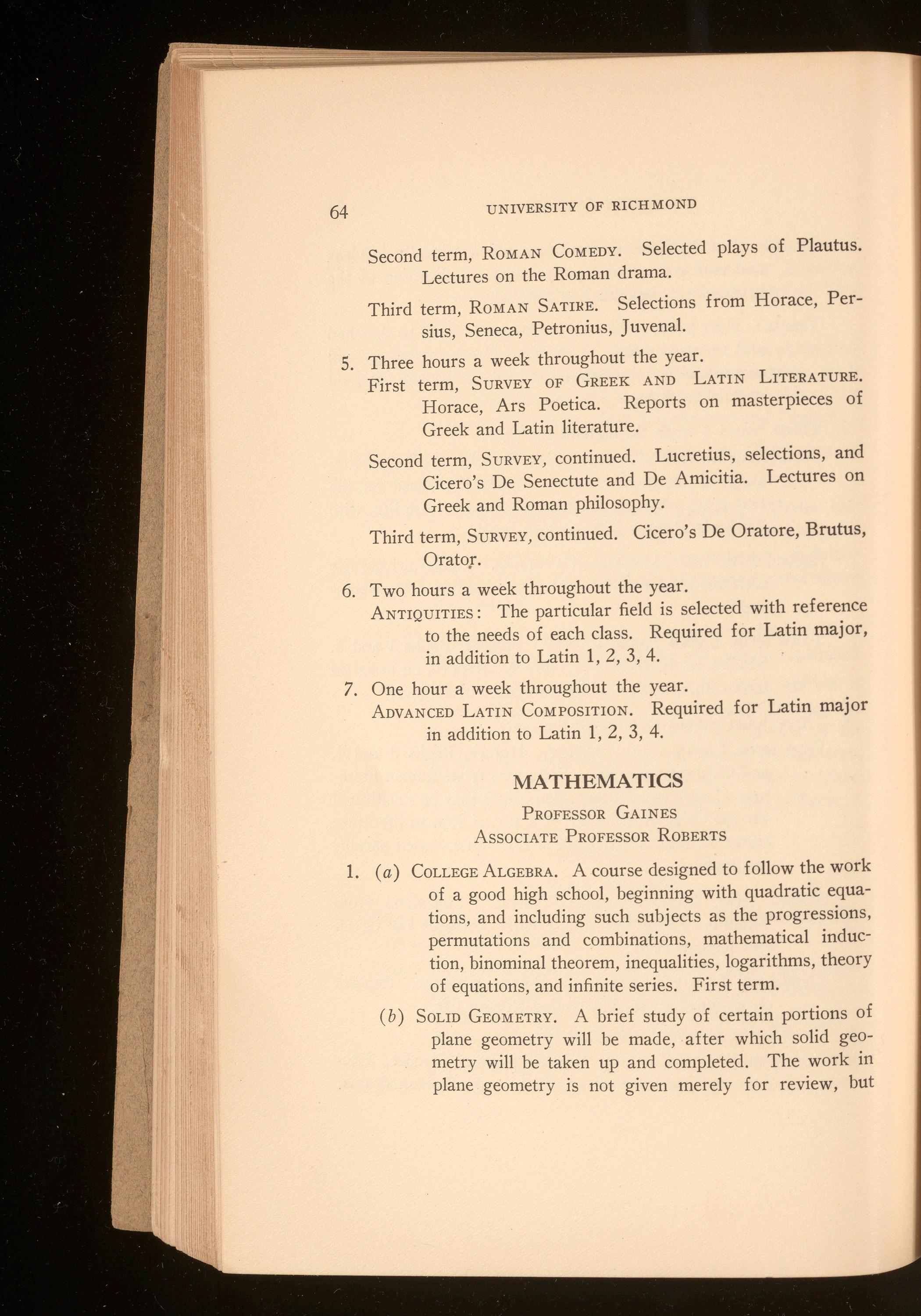
Second term, RoMAN COMEDY. Selected plays of Plautus. Lectures on the Roman drama.
Third term, ROMAN SATIRE. Selections from Horace, Persius, Seneca, Petronius, Juvenal.
5. Three hours a week throughout the year.
First term, SURVEY OF GREEK AND LATIN LITERATURE. Horace, Ars Poetica. Reports on masterpieces of Greek and Latin literature.
Second term, SURVEY,continued. Lucretius, selections, and Cicero's De Senectute and De Amicitia. Lectures on Greek and Roman philosophy.
Third term, SURVEY,continued. Cicero's De Oratore, Brutus, Orator.
6. Two hours a week throughout the year. ANTIQUITIES: The particular field is selected with reference to the needs of each class. Required for Latin major, in addition to Latin 1, 2, 3, 4.
7. One hour a week throughout the year. ADVANCEDLATIN COMPOSITION. Required for Latin major in addition to Latin 1, 2, 3, 4.
PROFESSORGAINES
ASSOCIATEPROFESSORROBERTS
1. (a) COLLEGEALGEBRA.A course designed to follow the work of a good high school, beginning with quadratic equations, and including such subjects as the progressions, permutations and combinations, mathematical induction, binominal theorem, inequalities, logarithms, theory of equations, and infinite series. First term.
( b) Soun GEOMETRY. A brief study of certain portions of plane geometry will be made, after which solid geometry will be taken up and completed. The work in plane geometry is not given merely for review, but
(

rather for the sake of certain methods of proof, and particularly for calling the student's attention to the interrelation of groups of theorems, and the develop- ment of the subject as a whole. Second term.
c) PLANE TRIGONOMETRY.The subject is approached from the practical side, problems being solved at first by graphic methods, and afterwards computed by means of trigonometrical formulas and mathematical tables. After the interest of the student is thus secured, the remainder of the time is devoted to the development of analytical trigonometry. Third term.
(d) COLLEGEALGEBRA. A course which follows (a), and includes a more extended study of theory of equations, logarithms, indeterminate forms, partial fractions, and determinants. Second term.
(a), and two of (b), (c), and (d) are required of all Freshmen. Three hours a week.
2. (a) ANALYTICALGEOMETRY. Elementary course. Systems of co-ordinates with various illustrations of the use of graphical methods, the construction and discussion of loci, a detailed study of the straight line and circle, and of the simpler properties of the parabola, ellipse, and hyperbola. First term.
( b) DIFFERENTIALCALCULUS. In this course the student is not only given much practice in differentiating the ordinary functions, but emphasis is laid upon getting a clear conception of the meaning and purpose of the calculus. The method is then applied to questions of maxima and minima, tangents and normals, inflexions, asymptotes, curve tracings, and the expansion of functions in series. Second term.
(c) INTEGRALCALCULUS. An elementary course, but one in which care is taken to lay the foundations securely, and prepare the way for the more advanced work of the following year. During the course the method of
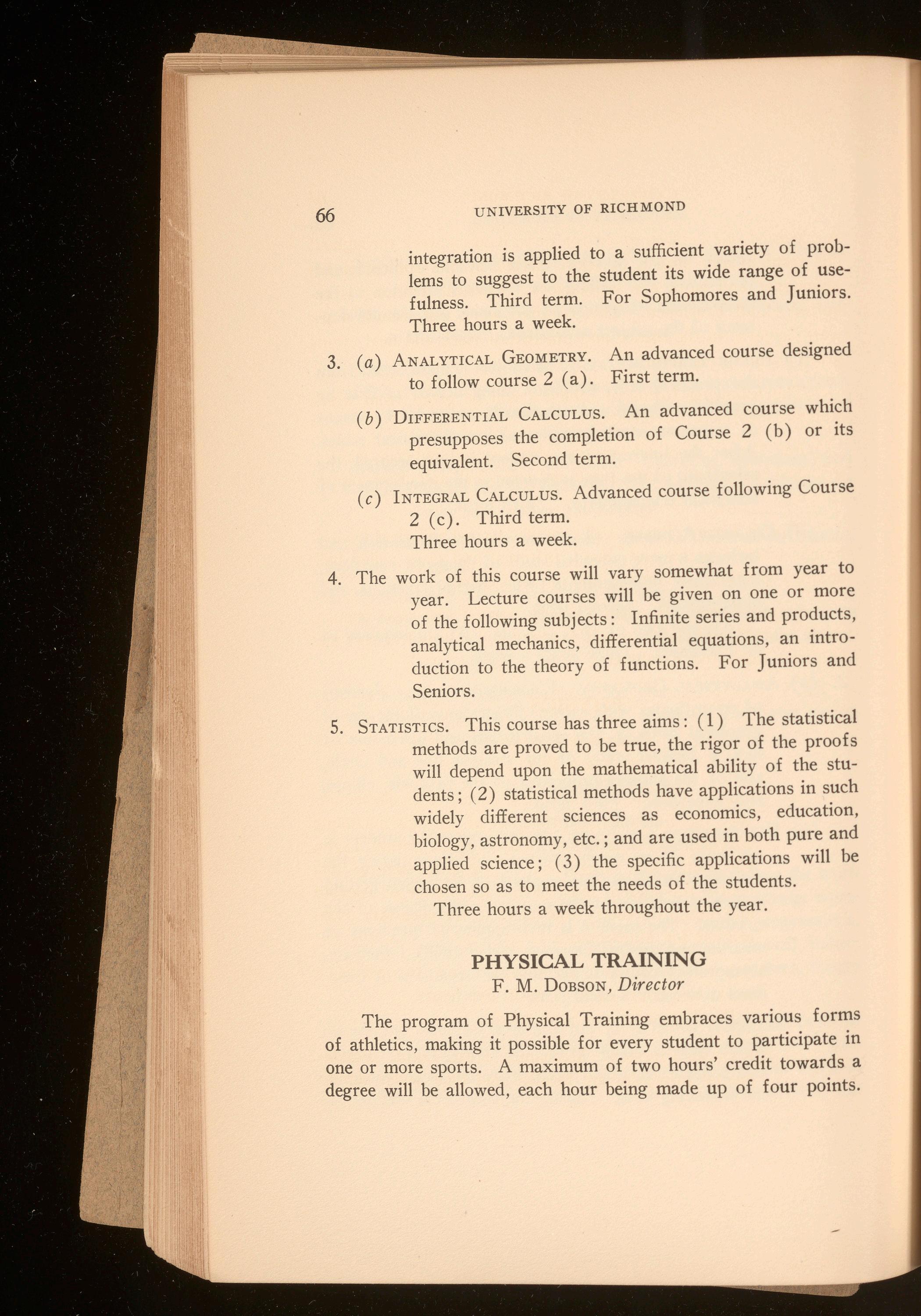
integration is applied to a sufficient variety of problems to suggest to the student its wide range of usefulness. Third term. For Sophomores and Juniors. Three hours a week.
3. (a) ANALYTICALGEOMETRY.An advanced course designed to follow course 2 (a) . First term.
( b) DIFFERENTIALCALCULUS. An advanced course which presupposes the completion of Course 2 (b) or its equivalent. Second term.
( c) INTEGRALCALCULUS.Advanced course following Course 2 ( c). Third term.
Three hours a week.
4. The work of this course will vary somewhat from year to year. Lecture courses will be given on one or more of the following subjects: Infinite series and products, analytical mechanics, differential equations, an introduction to the theory of functions. For Juniors and Seniors.
5. STATISTICS.This course has three aims: ( 1) The statistical methods are proved to be true, the rigor of the proofs will depend upon the mathematical ability of the students; ( 2) statistical methods have applications in such widely different sciences as economics, education, biology, astronomy, etc.; and are used in both pure and applied science ; ( 3) the specific applications will be chosen so as to meet the needs of the students.
Three hours a week throughout the year.
F. M. DoBSON , Director
The program of Physical Training embraces various forms of athletics, making it possible for every student to participate in one or more sports. A maximum of two hours' credit towards a degree will be allowed, each hour being made up of four points.
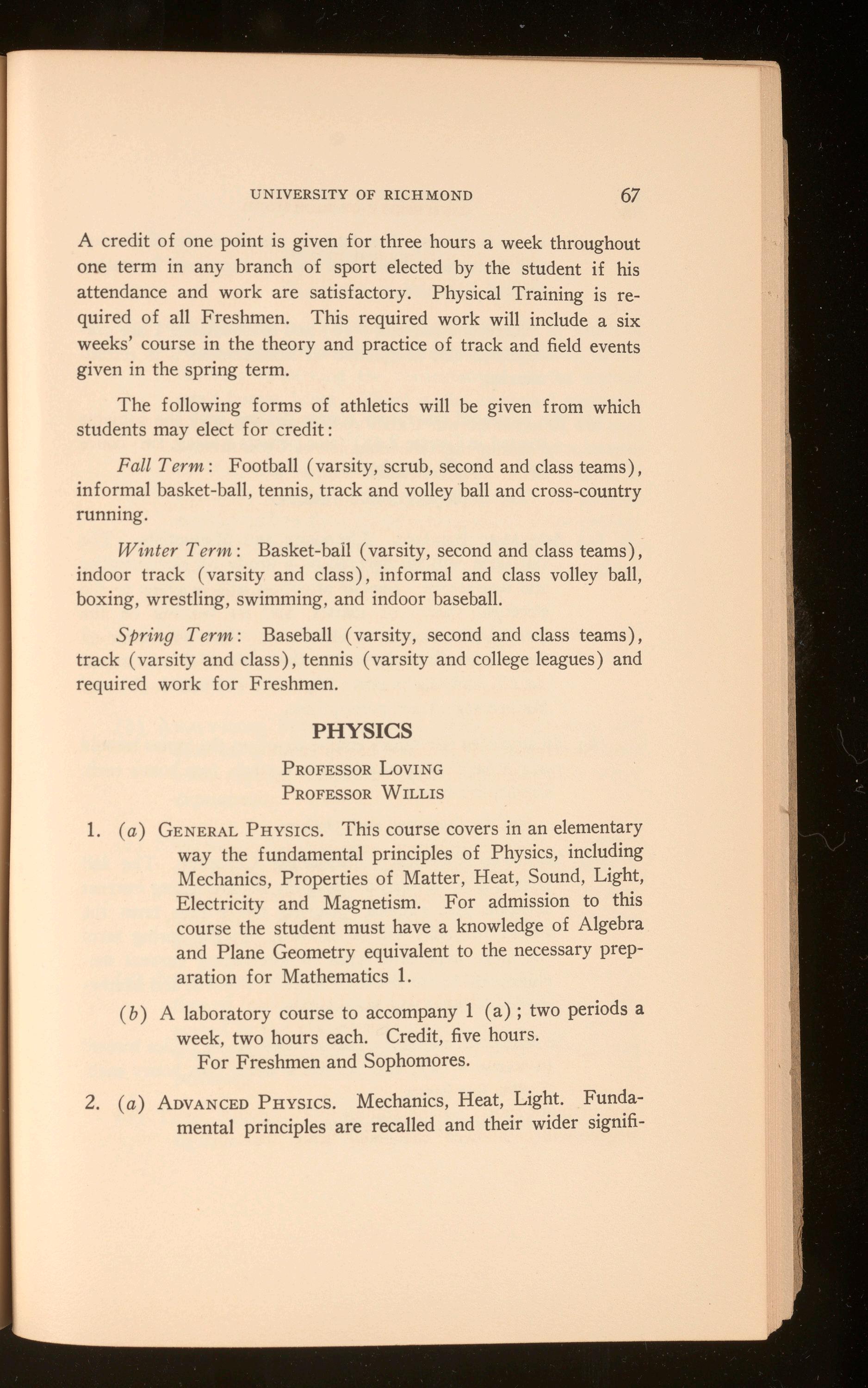
A credit of one point is given for three hours a week throughout one term in any branch of sport elected by the student if his attendance and work are satisfactory. Physical Training is required of all Freshmen. This required work will include a six weeks' course in the theory and practice of track and field events given in the spring term.
The following forms of athletics will be given from which students may elect for credit:
Fall Term: Football ( varsity, scrub, second and class teams), informal basket-ball, tennis, track and volley ball and cross-country running.
Wint er T erm: Basket-ball (varsity, second and class teams), indoor track ( varsity and class), informal and class volley ball, boxing, wrestling, swimming , and indoor baseball.
Spring T erni : Baseball (varsity, second and class teams), track ( varsity and class), tennis ( varsity and college leagues) and required work for Freshmen.
PROFESSORLOVING
PROFESSORWILLIS
1. ( a) GENERALPHYSICS. This course covers in an elementary way the fundamental principles of Physics, including Mechanics, Properties of Matter, Heat, Sound, Light, Electricity and Magnetism. For admission to this course the student must have a knowledge of Algebra and Plane Geometry equivalent to the necessary preparation for Mathematics 1.
( b) A laboratory course to accompany 1 (a) ; two periods a week, two hours each. Credit, five hours. For Freshmen and Sophomores.
2. (a) ADVANCEDPHYSICS. Mechanics, Heat, Light. Fundamental principles are recalled and their wider signifi-
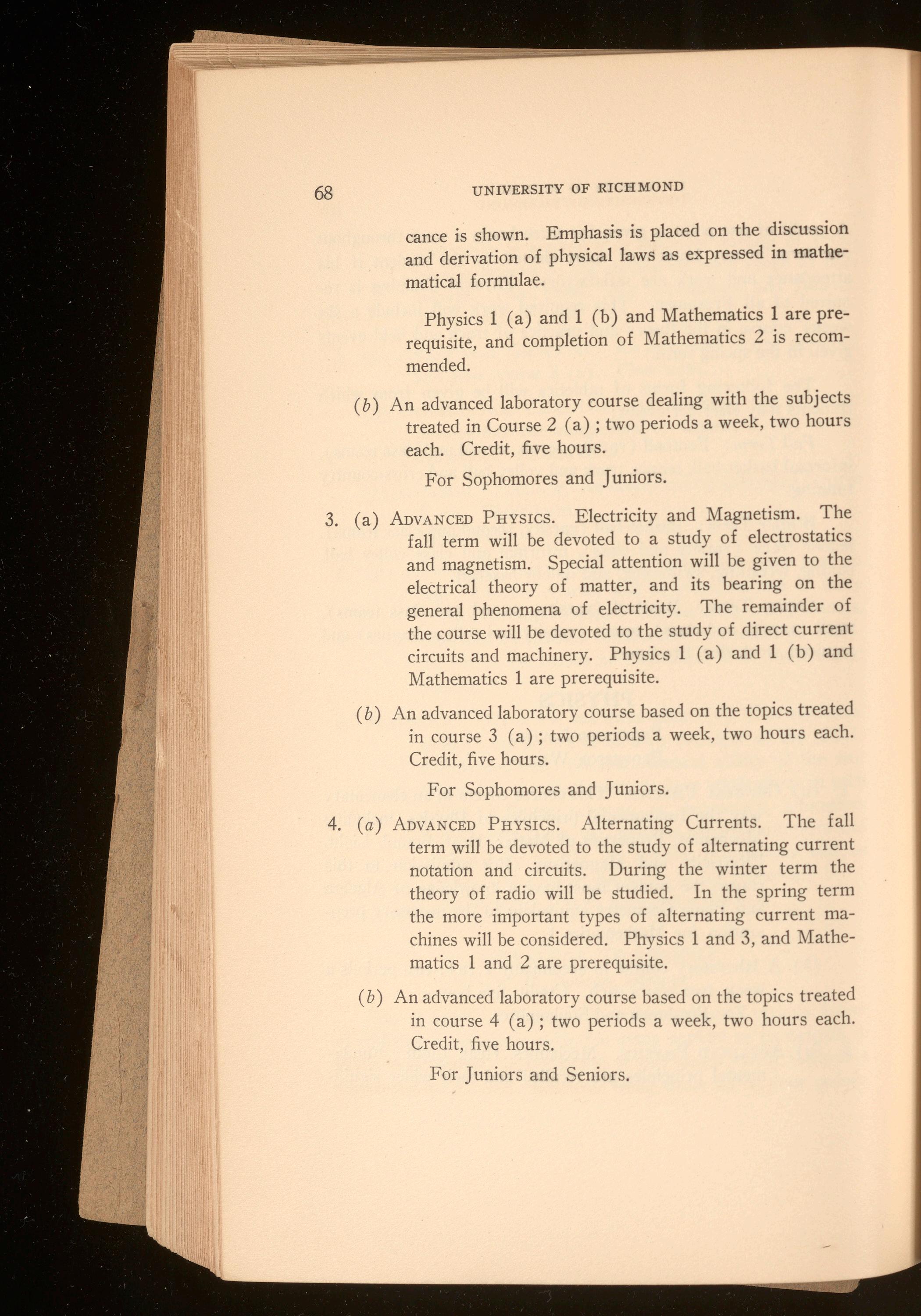
cance is shown. Emphasis is placed on the discussion and derivation of physical laws as expressed in mathematical formulae.
Physics 1 (a) and 1 (b) and Mathematics 1 are prerequisite, and completion of Mathematics 2 is recommended.
( b) An advanced laboratory course dealing with the subjects treated in Course 2 (a) ; two periods a week, two hours each. Credit, five hours.
For Sophomores and Juniors.
3. (a) ADVANCEDPHYSICS. Electricity and Magnetism. The fall term will be devoted to a study of electrostatics and magnetism. Special attention will be given to the electrical theory of matter, and its bearing on the general phenomena of electricity The remainder of the course will be devoted to the study of direct current circuits and machinery Physics 1 (a) and 1 (b) and Mathematics 1 are prerequisite.
( b) An advanced laboratory course based on the topics treated in course 3 (a) ; two periods a week, two hours each. Credit, five hours.
For Sophomores and Juniors.
4. (a) ADVANCEDPHYSICS. Alternating Currents The fall term will be devoted to the study of alternating current notation and circuits. During the winter term the theory of radio will be studied. In the spring term the more important types of alternating current machines will be considered. Physics 1 and 3, and Mathematics 1 and 2 are prerequisite.
( b) An advanced laboratory course based on the topics treated in course 4 (a); two periods a week, two hours each.
Credit, five hours.
For Juniors and Seniors.
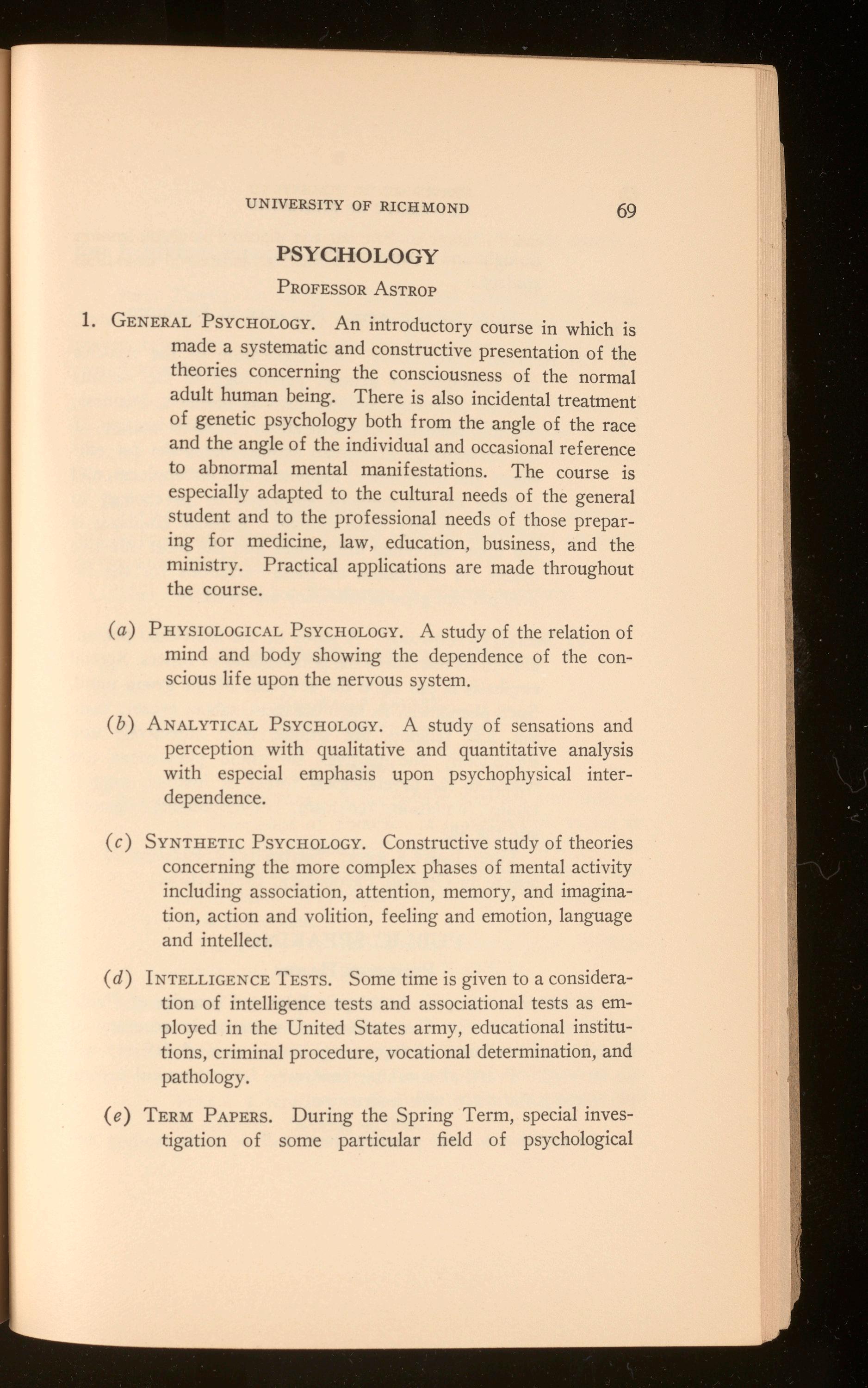
PSYCHOLOGY
PROFESSORAsTROP
1. GENERAL PSYCHOLOGY . An introductory cou rse in which is made a systematic and constructive presentation of t he theories concerning the consciousness of the normal adult h u man being. There is also incidenta l treatment of genetic psychology both from the angle of the r ace and the angle of the individual and occasiona l referenc e to abnormal mental manifestations. The cou rse is especially adapted to the cultural needs of the genera l student and to the professional needs of those preparing for medicine, law, education, business, and the ministry. Practical applications are made througho u t the course.
(a) PHYSIOLOGICALPSYCHOLOGY.A study of the relation of mind and body showing the dependence of the conscious life upon the nervous system.
(b) ANALYTICALPSYCHOLOGY.A study of sensations and perception with qualitative and quantitative analysis with especial emphasis upon psychophysical interdependence.
( c) SYNTHETICPSYCHOLOGY.Constructive study of theories concerning the more complex phases of mental activity including association, attention, memory, and imagination, action and volition, feeling and emotion , language and intellect.
(d) INTELLIGENCETESTS. Some time is given to a consideration of intelligence tests and associational tests as employed in the United States army, educational institutions, criminal procedure , vocational determination, and pathology.
(e) TERM PAPERS. During the Spring Term, special investigation of some particular field of psycho logica l
thought and a paper on that subject is required of each student.
Three hours a week. Not open to Freshmen.
application of the theories and principles of general psychology to the various spheres of human activity such as industry, business, the law, medicine, and education. A consideration of the mainsprings of human action, that make for efficiency and inefficiency; happiness and unhappiness, and a study of the methods employed by psychology to foster or modify these motives. Especial emphasis is put upon individual differences and the most effective means for utilization of these variations for the individual and general efficiency and welfare.
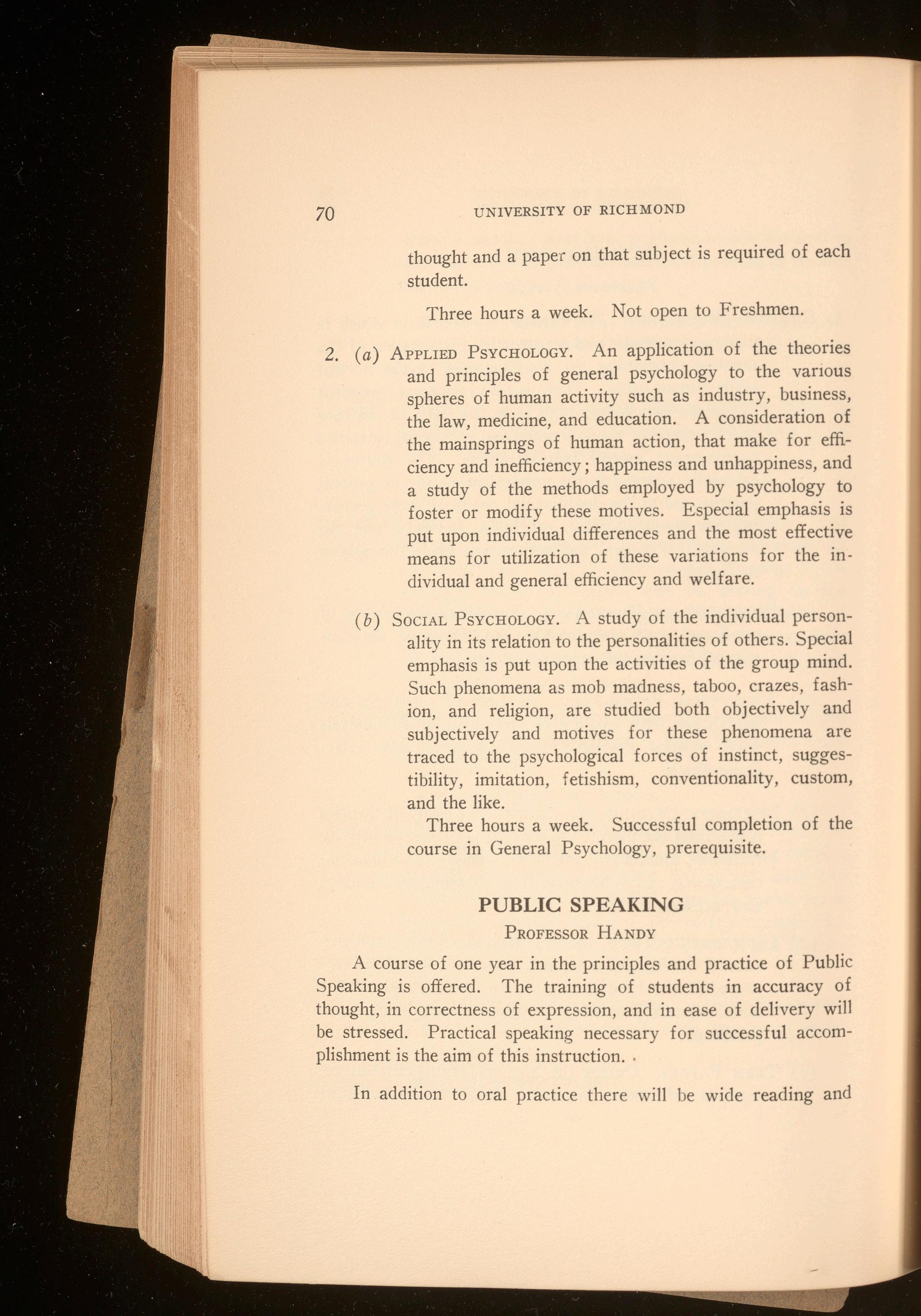
( b)
study of the individual personality in its relation to the personalities of others. Special emphasis is put upon the activities of the group mind. Such phenomena as mob madness, taboo, crazes, fashion, and religion, are studied both objectively and subjectively and motives for these phenomena are traced to the psychological forces of instinct, suggestibility, imitation, fetishism, conventionality, custom, and the like.
Three hours a week. Successful completion of the course in General Psychology, prerequisite.
A course of one year in the principles and practice of Public Speaking is offered. The training of students in accuracy of thought, in correctness of expression, and in ease of delivery will be stressed. Practical speaking necessary for successful accomplishment is the aim of this instruction .
In addition to oral practice there will be wide reading and
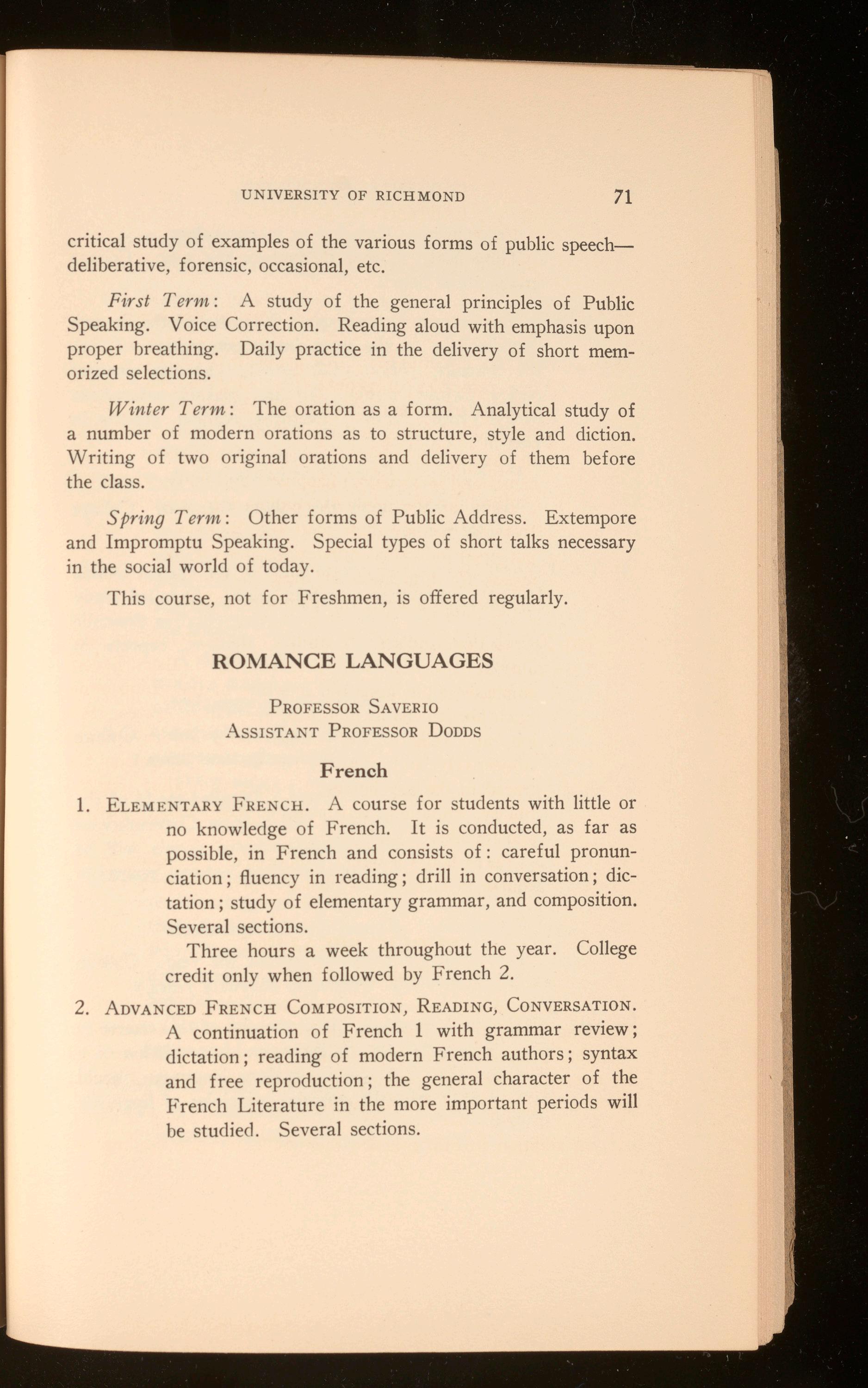
critical study of examples of the various forms of public speechdeliberative, forensic, occasional, etc.
First Term: A study of the general principles of Public Speaking. Voice Correction. Reading aloud with emphasis upon proper breathing. Daily practice in the delivery of short memorized selections.
Winter Tenn: The oration as a form. Analytical study of a number of modern orations as to structure, style and diction. Writing of two original orations and delivery of them before the class.
Spring Term: Other forms of Public Address. Extempore and Impromptu Speaking. Special types of short talks necessary in the social world of today.
This course, not for Freshmen, is offered regularly.
PROFESSORSAVERIO
AssrsTA 'T PROFESSORDoDDS
French
1. ELEMENTARYFRENCH. A course for students with little or no knowledge of French. It is conducted, as far as possible, in French and consists of : careful pronunciation; fluency in reading; drill in conversation; dictation; study of elementary grammar, and composition. Several sections.
Three hours a week throughout the year. College credit only when followed by French 2.
2. ADVANCEDFRE CH COMPOSITION,READING,CONVERSATION. A continuation of French 1 with grammar review; dictation ; reading of modern French authors; syntax and free reproduction ; the general character of the French Literature in the more important periods will be studied. Several sections.
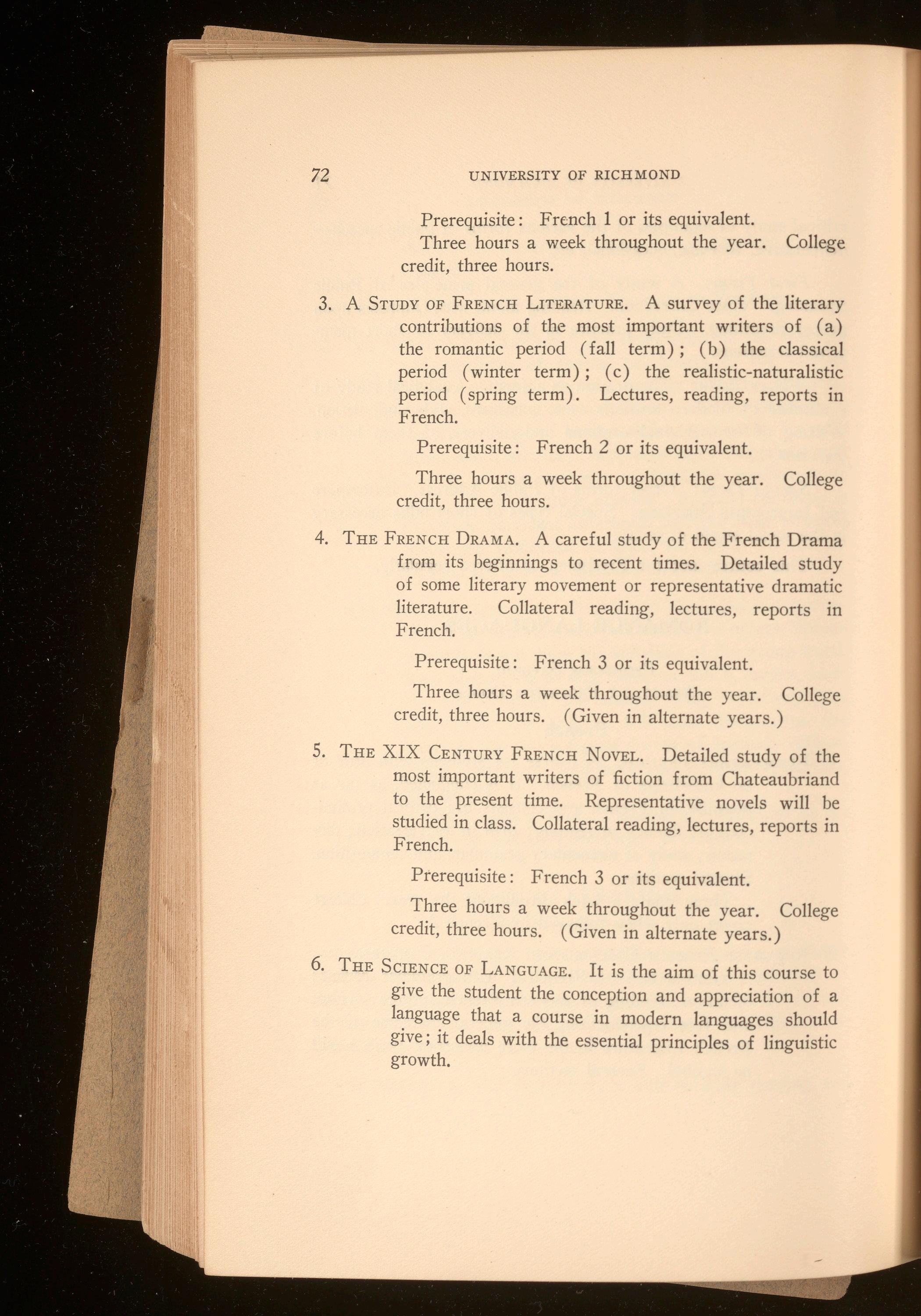
Prerequisite: French 1 or its equivalent.
Three hours a week throughout the year. College credit, three hours.
3. A STUDYOF FRENCHLITERATURE.A survey of the literary contributions of the most important writers of (a) the romantic period ( fall term) ; ( b) the classical period ( winter term) ; ( c) the realistic-naturalistic period ( spring term). Lectures, reading, reports m French.
Prerequisite : French 2 or its equivalent.
Three hours a week throughout the year. College credit, three hours.
4. THE FRENCHDRAMA. A careful study of the French Drama from its beginnings to recent times. Detailed study of some literary movement or representative dramatic literature. Collateral reading, lectures, reports m French.
Prerequisite : French 3 or its equivalent.
Three hours a week throughout the year. College credit, three hours. ( Given in alternate years.)
5. THE XIX CENTURYFRENCH OVEL. Detailed study of the most important writers of fiction from Chateaubriand to the present time. Representative novels will be studied in class. Collateral reading, lectures, reports in French.
Prerequisite: French 3 or its equivalent.
Three hours a week throughout the year. College credit, three hours. ( Given in alternate years.)
6. THE SCIENCEOF LANGUAGE.It is the aim of this course to give the student the conception and appreciation of a language that a course in modern languages should give; it deals with the essential principles of linguistic growth.
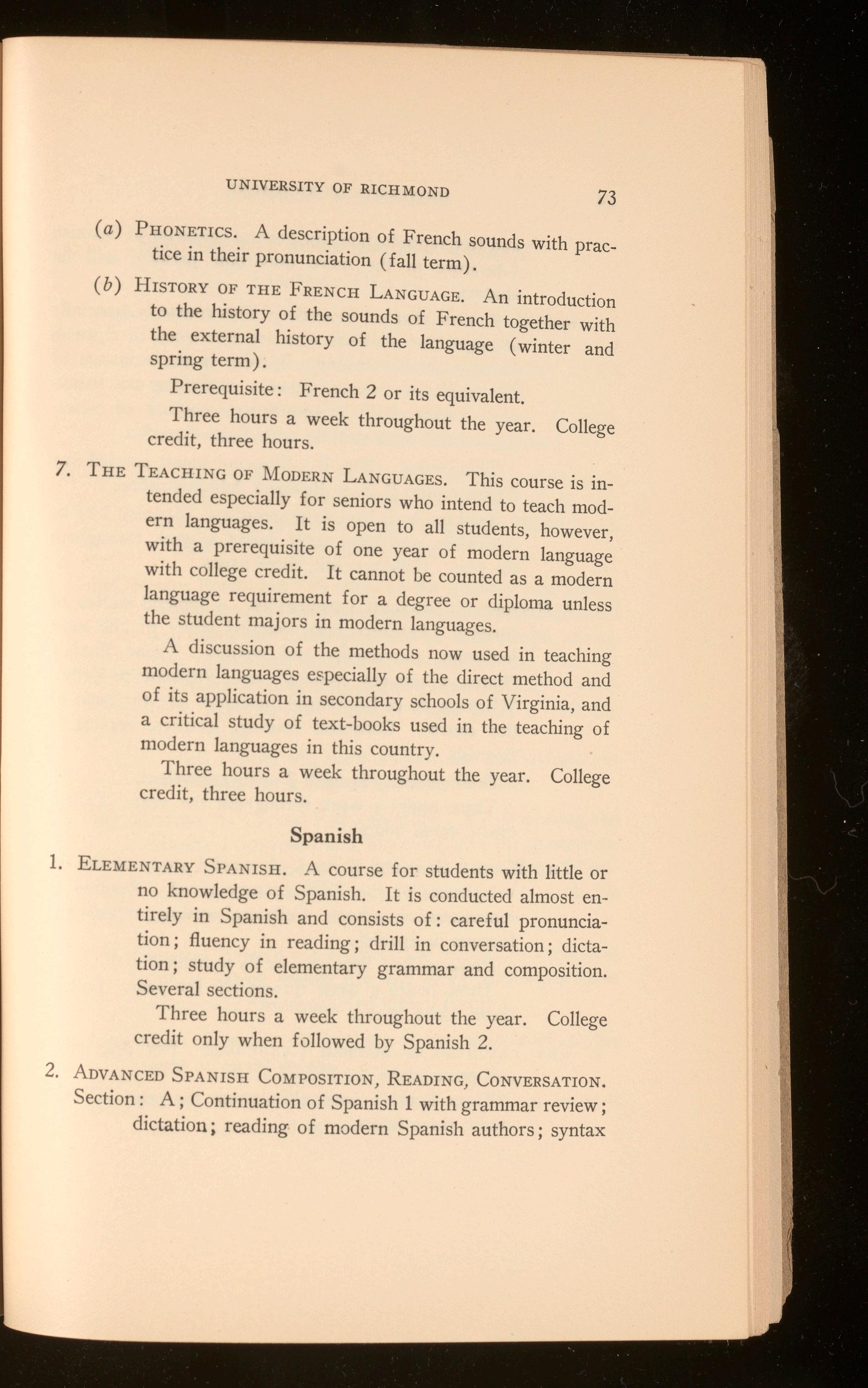
(a) PHONETICS. A description of French sounds with prac- tice in their pronunciation ( fall term).
(
b) HISTORYOF THE FRENCH LANGUAGE. An introduction to the history of the sounds of French together with the external history of the language ( winter and spring term) .
Prerequisite: French 2 or its equivalent.
Three hours a week throughout the year. College credit, three hours.
7. THE TEACIIING OF MODERNLANGUAGES.This course is intended especially for seniors who intend to teach mod- ern languages. It is open to all students, however, with a prerequisite of one year of modern language with college credit. It cannot be counted as a modern language requirement for a degree or diploma unless the student majors in modern languages.
A di scussion of the methods now used in teaching modern languages especially of the direct method and of its application in secondary schools of Virginia, and a critical study of text-books used in the teaching of modern languages in this country.
Three hours a week throughout the year. College credit, three hours.
1. ELEMENTARYSPA ISH. A course for students with little or no knowledge of Spanish. It is conducted almost en- tirely in Spanish and consists of : careful pronuncia- tion; fluency in reading; drill in conversation; dicta- tion; study of elementary grammar and composition. Several sections.
Three hours a week throughout the year. College credit only when followed by Spanish 2.
2. A DVANCEDSPANISII COMPOSITION , READING , CONVERSATION. Section : A; Continuation of Spanish 1 with grammar review; dictation; reading of modern Spanish authors; syntax
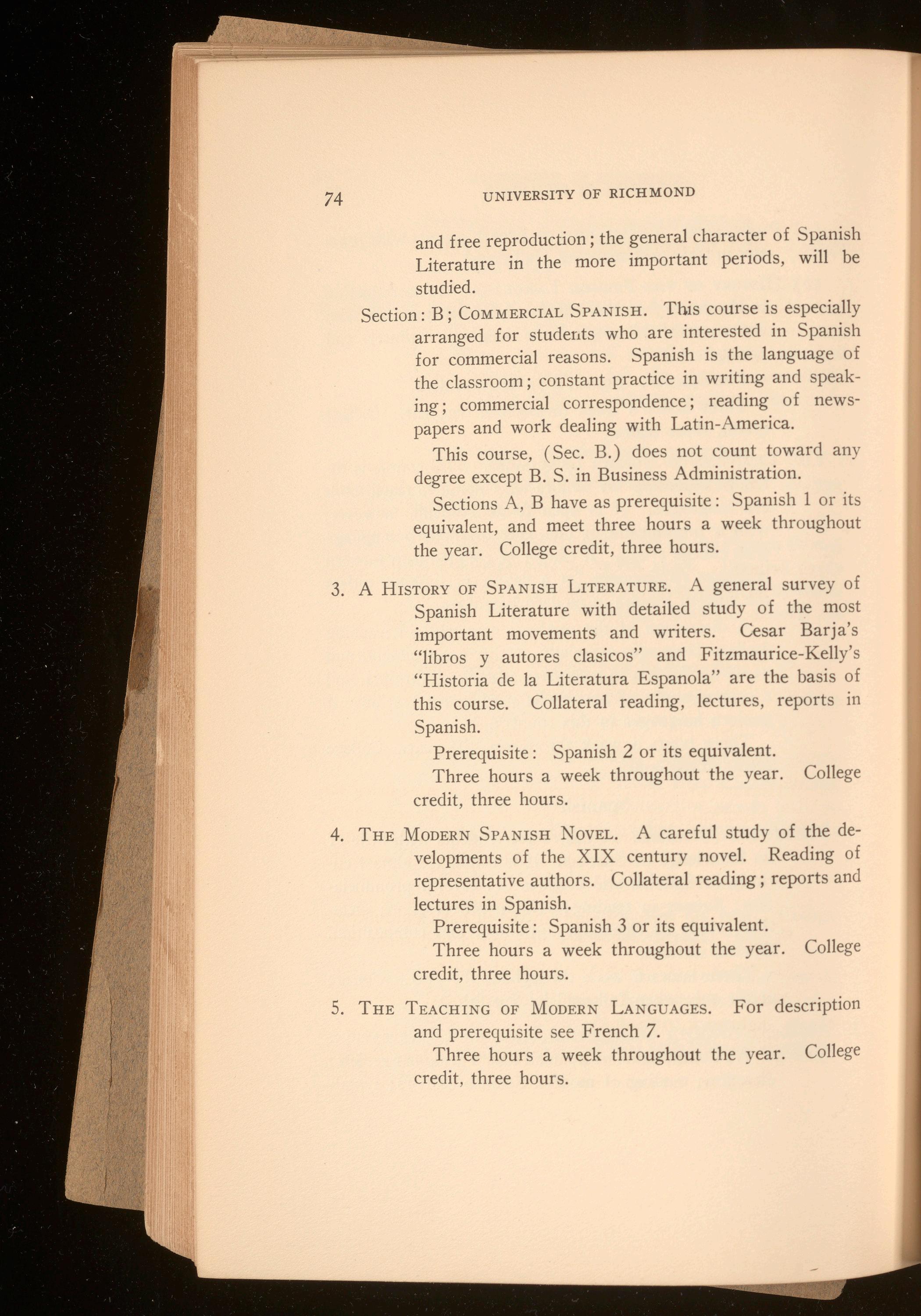
and free reproduction; the general character of Spanish Literature in the more important periods, will be studied.
Section: B; COMMERCIALSPANISH. This course is especially arranged for students who are interested in Spanish for commercial reasons. Spanish is the language of the classroom; constant practice in writing and speaking; commercial correspondence; reading of newspapers and work dealing with Latin-America.
This course, ( Sec. B.) does not count toward any degree except B. S. in Business Administration.
Sections A, B have as prerequisite: Spanish 1 or its equivalent, and meet three hours a week throughout the year. College credit, three hours.
3. A HISTORYOF SPANISH LITERATURE. A general survey of Spanish Literature with detailed study of the most important movements and writers. Cesar Barja's "libros y autores clasicos" and Fitzmaurice-Kelly's "Historia de la Literatura Espanola" are the basis of this course. Collateral reading, lectures, reports in Spanish.
Prerequisite : Spanish 2 or its equivalent.
Three hours a week throughout the year. College credit, three hours.
4. THE MODERNSPANISH NovEL. A careful study of the developments of the XIX century novel. Reading of representative authors. Collateral reading ; reports and lectures in Spanish.
Prerequisite: Spanish 3 or its equivalent.
Three hours a week throughout the year. College credit, three hours.
5. THE TEACHING OF MODERNLANGUAGES. For description and prerequisite see French 7.
Three hours a week throughout the year. College credit, three hours.
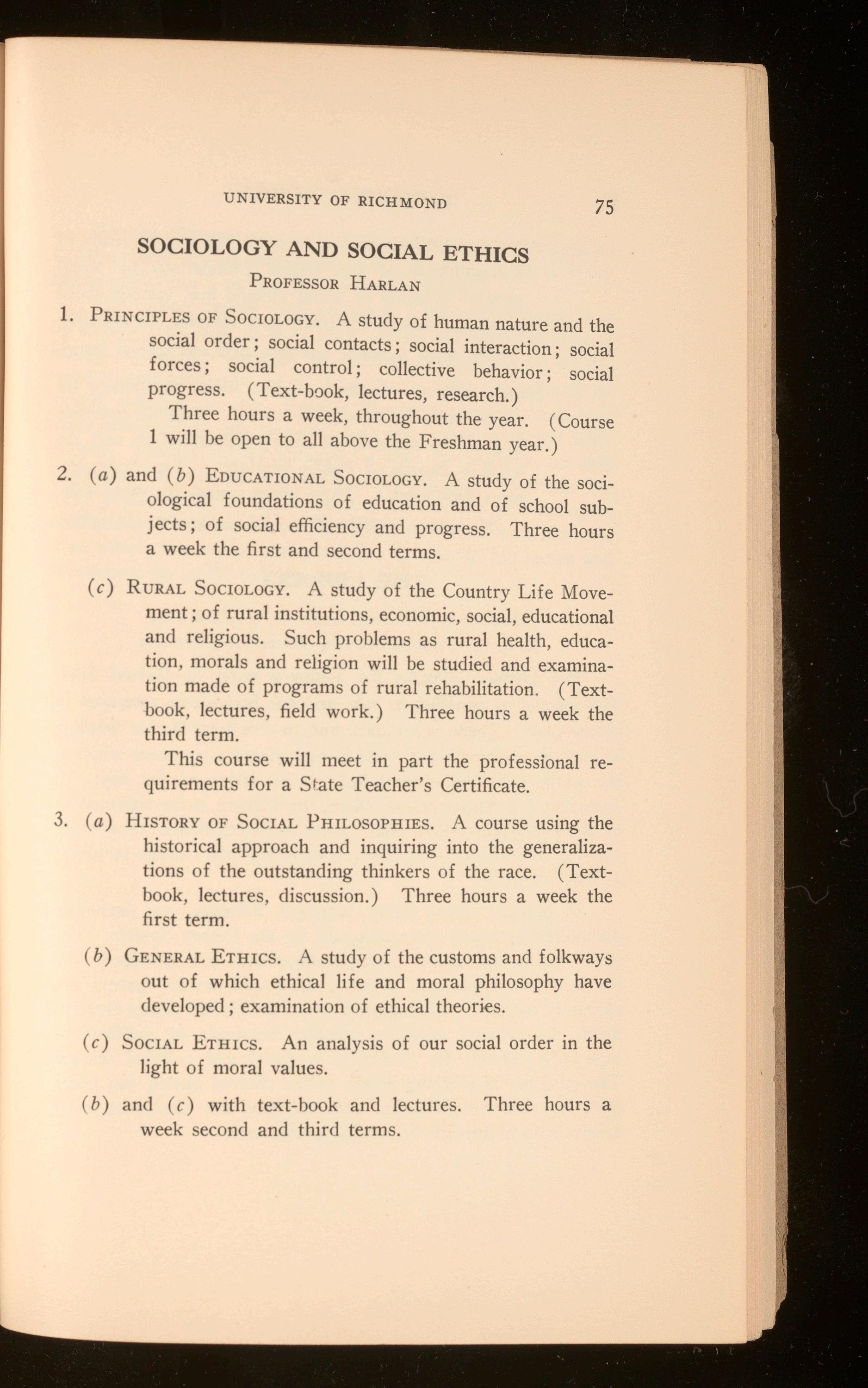
SOCIOLOGY AND SOCIAL ETHICS
PROFESSORHARLAN
1. PRINCIPLES OF SocIOLOGY. A study of human nature and the social order; social contacts; social interaction; social forces; social control; collective behavior; social progress. (Text-b0ok, lectures, research.)
Three hours a week, throughout the year. ( Course 1 will be open to all above the Freshman year.)
2. (a) and (b) EDUCATIONALSOCIOLOGY.A study of the sociological foundations of education and of school subjects; of social efficiency and progress. Three hours a week the first and second terms.
( c) RURAL SOCIOLOGY.A study of the Country Life Movement; of rural institutions, economic, social, educational and religious. Such problems as rural health, education , morals and religion will be studied and examination made of programs of rural rehabilitation . (Textbook, lectures, field work.) Three hours a week the third term.
This course will meet in part the professional requirements for a SI-ate Teacher's Certificate.
3. ( a) HISTORYOF SocIAL PHILOSOPHIES. A course using the historical approach and inquiring into the generalizations of the outstanding thinkers of the race. (Textbook lectures discussion.) Three hours a week the ' ' first term.
( b) GENERALETHICS. A study of the customs and folkways out of which ethical life and moral philosophy have developed ; examination of ethical theories.
( c) SOCIAL ETHICS. An analysis of our social order in the light of moral values.
( b) and ( c) with text-book and lectures. Three hours a week second and third terms.
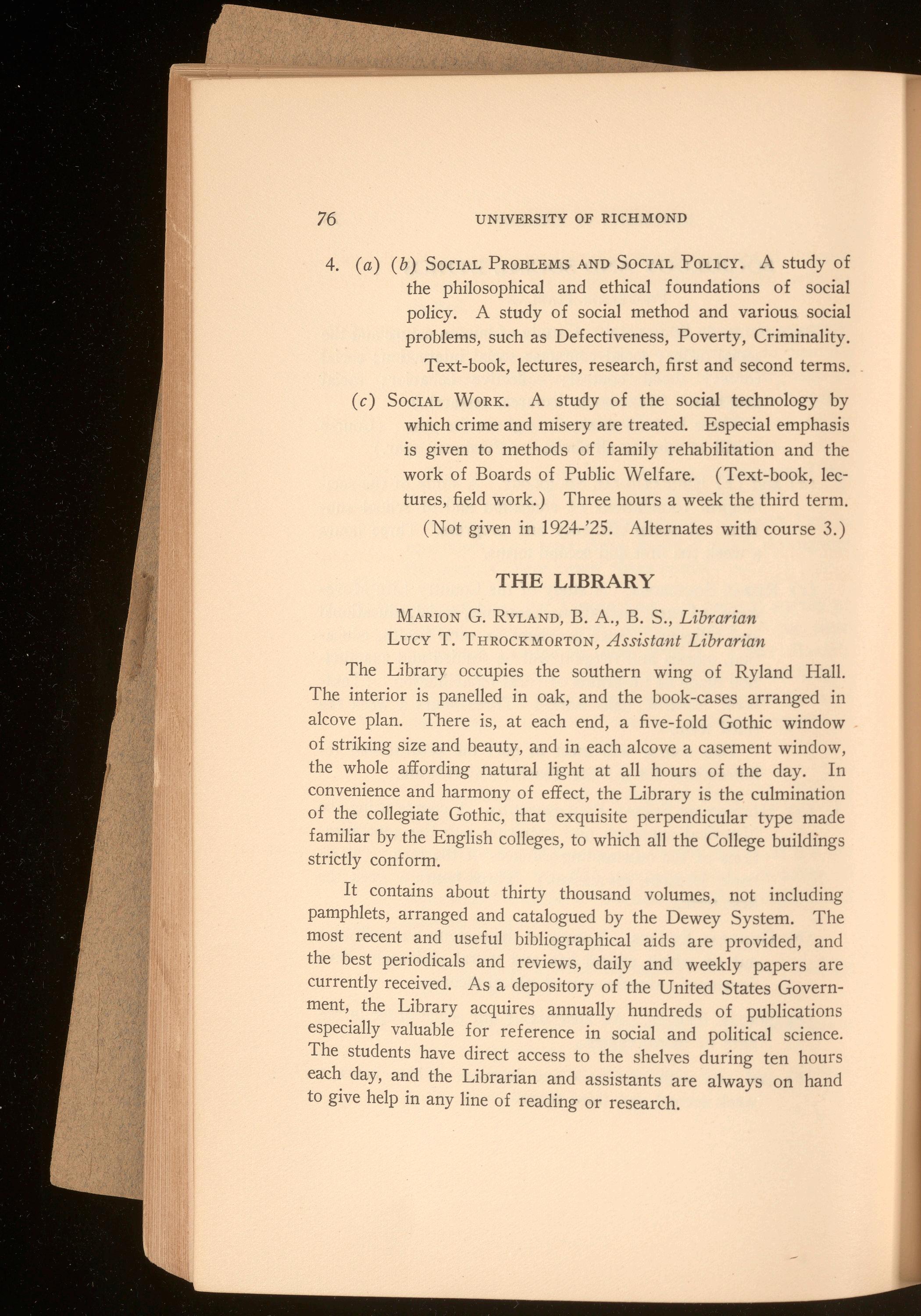
4. (a) (b) SOCIALPROBLEMSANDSocrAL POLICY. A study of the philosophical and ethical foundations of social policy. A study of social method and various. social problems, such as Defectiveness, Poverty, Criminality. Text-book, lectures, research, first and second terms.
( c) SocIAL WORK. A study of the social technology by which crime and misery are treated. Especial emphasis is given to methods of family rehabilitation and the work of Boards of Public Welfare. (Text-book, lectures, field work.) Three hours a week the third term.
(Not given in 1924-'25. Alternates with course 3.)
MARIONG. RYLAND,B. A., B. S.,
Librarian
Lucy T. THROCKMORTON,Assistant Librarian
The Library occupies the southern wing of Ryland Hall. The interior is panelled in oak, and the book-cases arranged in alcove plan. There is, at each end, a five-fold Gothic window of striking size and beauty, and in each alcove a casement window, the whole affording natural light at all hours of the day. In convenience and harmony of effect, the Library is the culmination of the collegiate Gothic, that exquisite perpendicular type made familiar by the English colleges, to which all the College buildings strictly conform.
It contains about thirty thousand volumes, not including pamphlets, arranged and catalogued by the Dewey System. The most recent and useful bibliographical aids are provided, and the best periodicals and reviews, daily and weekly papers are currently received. As a depository of the United States Government, the Library acquires annually hundreds of publications especially valuable for reference in social and political science. The students have direct access to the shelves during ten hours each day, and the Librarian and assistants are always on hand to give help in any line of reading or research.
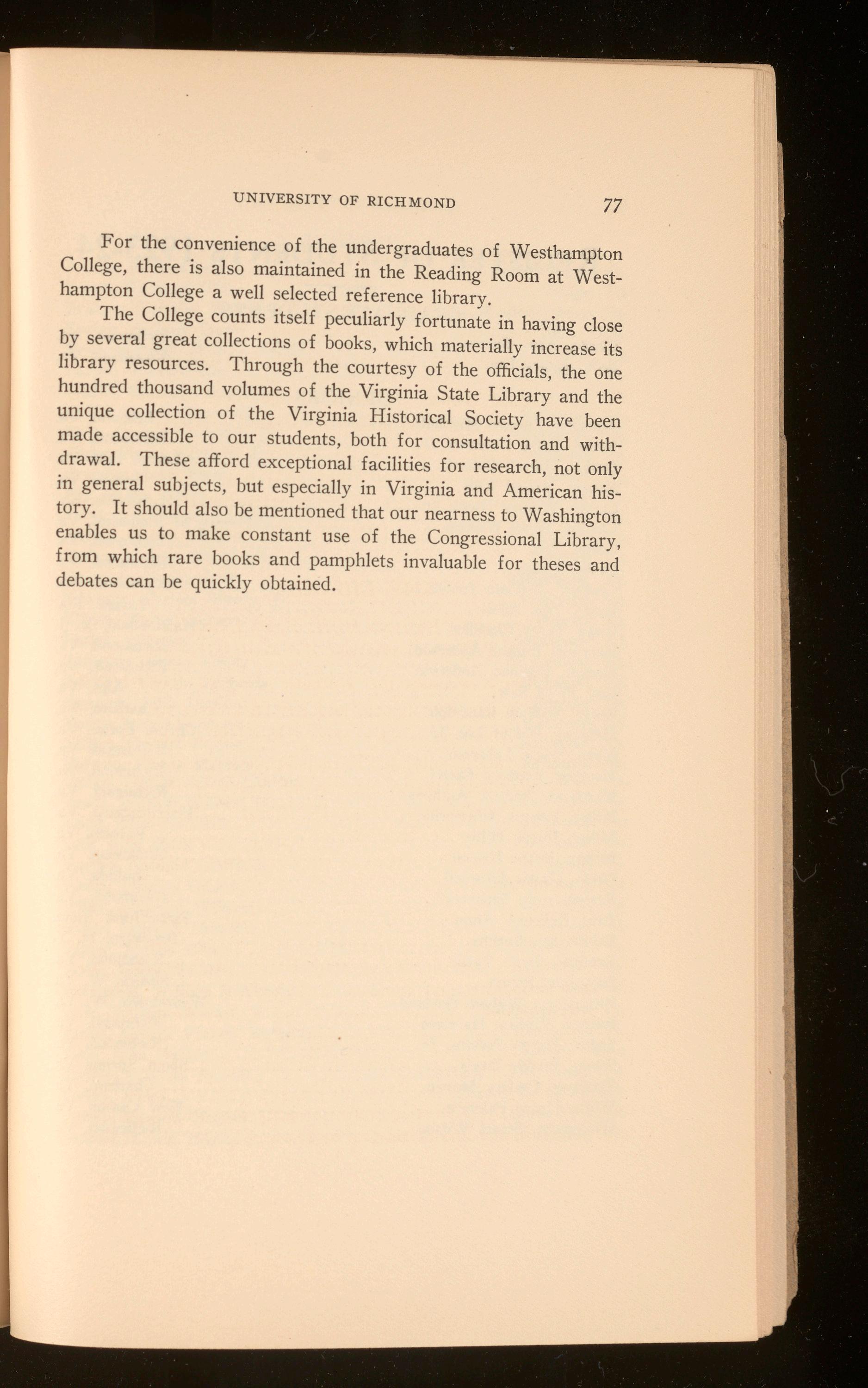
For the convenience of the undergraduates of Westhampton College, there is also maintained in the Reading Room at West- hampton College a well selected reference library.
The College counts itself peculiarly fortunate in having close by several great collections of books, which materially increase its library resources. Through the courtesy of the officials, the one hundred thousand volumes of the Virginia State Library and the unique collection of the Virginia Historical Society have been made accessible to our students, both for consultation and with- drawal. These afford exceptional facilities for research, not only in general subjects, but especially in Virginia and American his- tory. It should also be mentioned that our nearness to Washington enables us to make constant use of the Congressional Library, from which rare books and pamphlets invaluable for theses and debates can be quickly obtained.
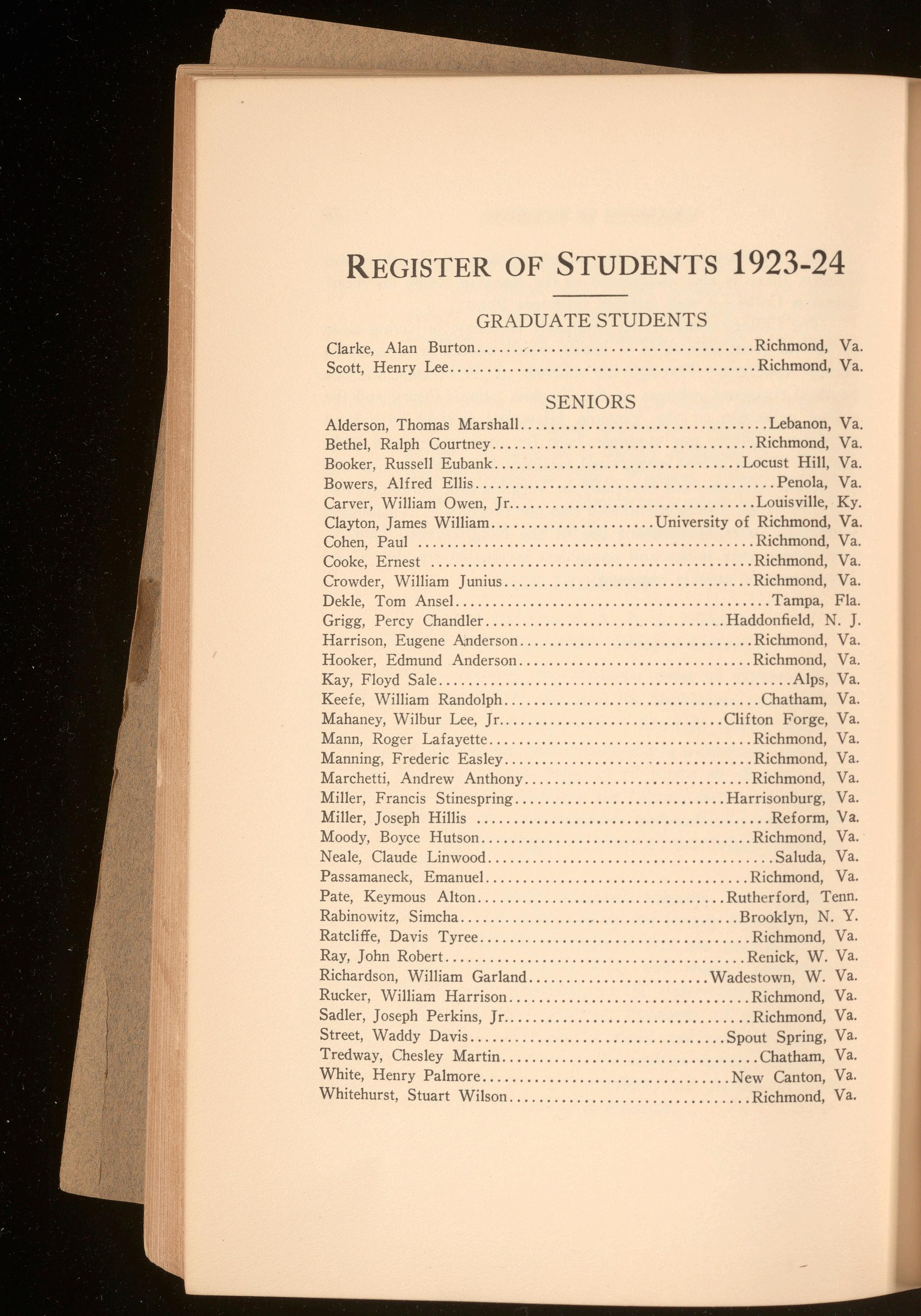
Clarke, Alan Burton ..................................... Richmond, Va.
Scott, Henry Lee ......................................... Richmond, Va.
Alderson, Thomas Marshall. ................................ Lebanon, Va.
Bethel, Ralph Courtney ................................... Richmond, Va.
Booker, Russell Eubank ................................. Locust Hill, Va.
Bowers, Alf red Ellis ................................... .... Peno la, Va.
Carver, William Owen, Jr Louisville, Ky.
Clayton, James William ...................... University of Richmond, Va.
Cohen, Paul ............................................. Richmond, Va.
Cooke, Ernest ........................................... Richmond, Va.
Crowder, William Junius Richmond, Va.
Dekle, Tom Ansel. ......................................... Tampa, Fla.
Grigg, Percy Chandler. ............................... Haddonfield, N. J.
Harrison, Eugene Anderson Richmond, Va.
Hooker, Edmund Anderson Richmond, Va. Kay, Floyd Sale Alps, Va.
Keefe, William Randolph .................................. Chatham, Va. Mahaney, Wilbur Lee, Jr Oifton Forge, Va. Mann, Roger Lafayette Richmond, Va.
Manning, Frederic Easley ................................. Richmond, Va.
Marchetti, Andrew Anthony .............................. Richmond, Va. Miller, Francis Stinespring Harrisonburg, Va. Miller, Joseph Hillis ....................................... Reform, Va. Moody, Boyce Hutson .................................... Richmond, Va.
Neale, Claude Linwood Saluda, Va. Passamaneck, Emanuel Richmond, Va. Pate, Keymous Alton ................................. Rutherford, Tenn. Rabinowitz, Simcha Brooklyn, N. Y. Ratcliffe, Davis Tyree Richmond, Va. Ray, John Robert ........................................ Renick, W. Va. Richardson, William Garland ........................ Wadestown, W. Va.
Rucker, William Harrison ................................ Richmond, Va.
Sadler, Joseph Perkins, Jr Richmond, Va. Street, Waddy Davis Spout Spring, Va. Tredway, Chesley Martin .................................. Chatham, Va.
White, Henry Palmore New Canton, Va. Whitehurst, Stuart Wilson ................................ Richmond, Va.
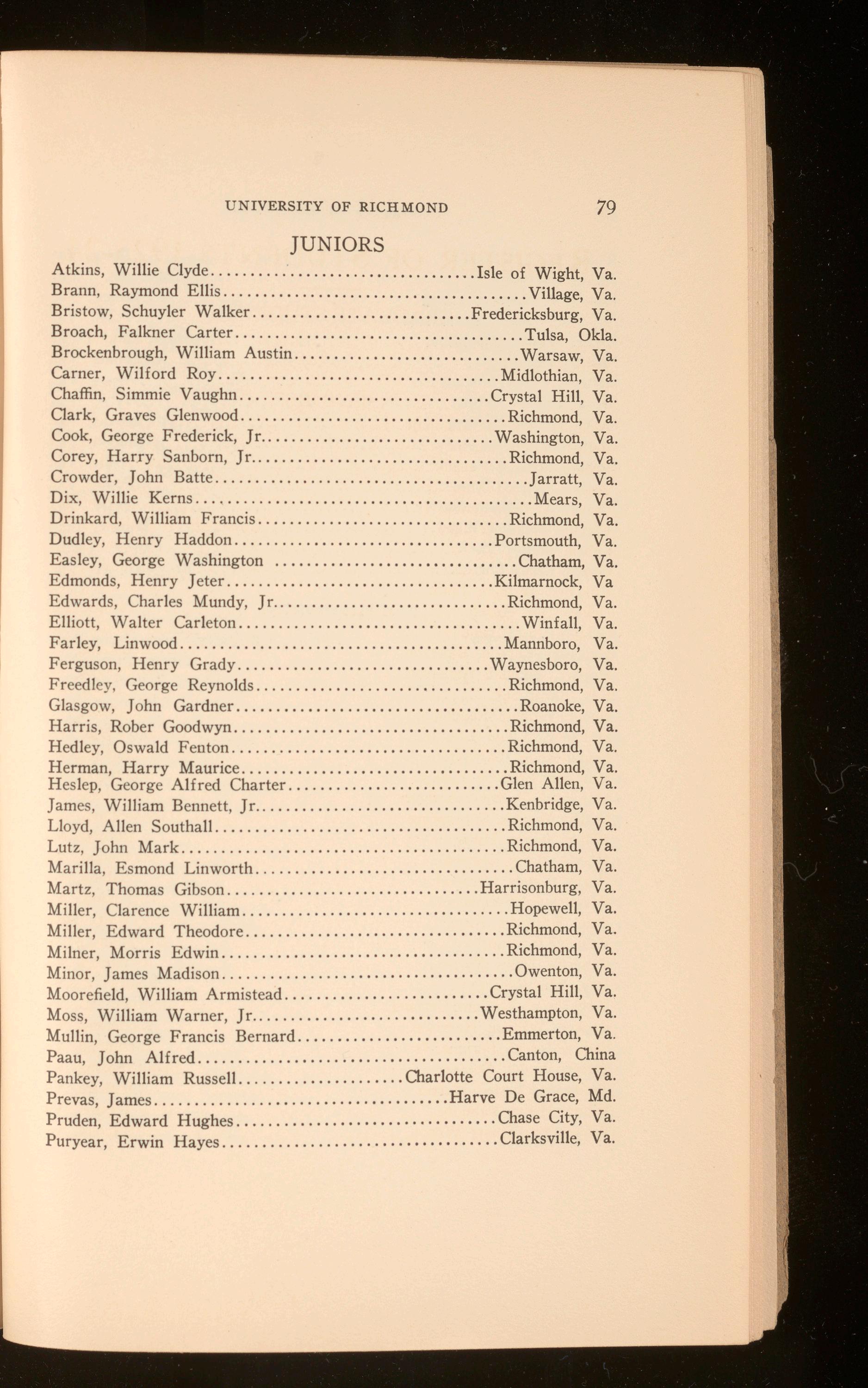
Atkins, Willie Clyde Isle of Wight, Va. Brann, Raymond Ellis ....................................... Village, Va. Bristow, Schuyler Walker ............................ Fredericksburg, Va. Broach, Falkner Carter ..................................... Tulsa, Okla. Brockenbrough, William Austin ............................. Warsaw, Va. Carner, Wilford Roy Midlothian, Va.
Chaffin, Simmie Vaughn Crystal Hill, Va. Oark, Graves Glenwood Richmond, Va. Cook, George Frederick, Jr .............................. Washington, Va. Corey, Harry Sanborn, Jr. ................................ Richmond, Va. Crowder, John Batte ........................................ Jarratt, Va.
Dix, Willie Kerns ........................................... Mears, Va. Drinkard, William Francis ................................ Richmond, Va. Dudley, Henry Haddon ................................. Portsmouth, Va.
Easley, George Washington ............................... Chatham, Va. Edmonds, Henry Jeter Kilmarnock, Va
Edwards, Charles Mundy, Jr. Richmond, Va. Elliott, Walter Carleton Winfall, Va. Farley, Linwood Mannboro, Va. Ferguson, Henry Grady Waynesboro, Va. Freedley, George Reynolds Richmond, Va. Glasgow, John Gardner .................................... Roanoke, Va. Harris, Rober Goodwyn Richmond, Va. Hedley, Oswald Fenton ................................... Richmond, Va.
Herman, Harry Maurice .................................. Richmond, Va. Heslep, George Alfred Charter ........................... Glen Allen, Va. James, William Bennett, Jr. ............................... Kenbridge, Va. Lloyd, Allen Southall. .................................... Richmond, Va. Lutz, John Mark ......................................... Richmond, Va.
Marilla, Esmond Linworth ................................. Chatham, Va. Martz, Thomas Gibson ................................ Harrisonburg, Va. Miller, Clarence William .................................. Hopewell, Va. Miller, Edward Theodore ................................. Richmond, Va. Milner, Morris Edwin Richmond, Va. Minor, James Madison Owenton, Va. Moorefield, William Armistead Crystal Hill, Va. Moss, William Warner, Jr. ............................ Westhampton, Va. Mullin, George Francis Bernard .......................... Emmerton, Va. Paau, John Alfred ....................................... Canton, China Pankey, William Russell ..................... Charlotte Court House, Va.
Prevas, James Harve De Grace, Md. Pruden, Edward Hughes ................................. Chase City, Va. Puryear, Erwin Hayes Clarksville, Va.
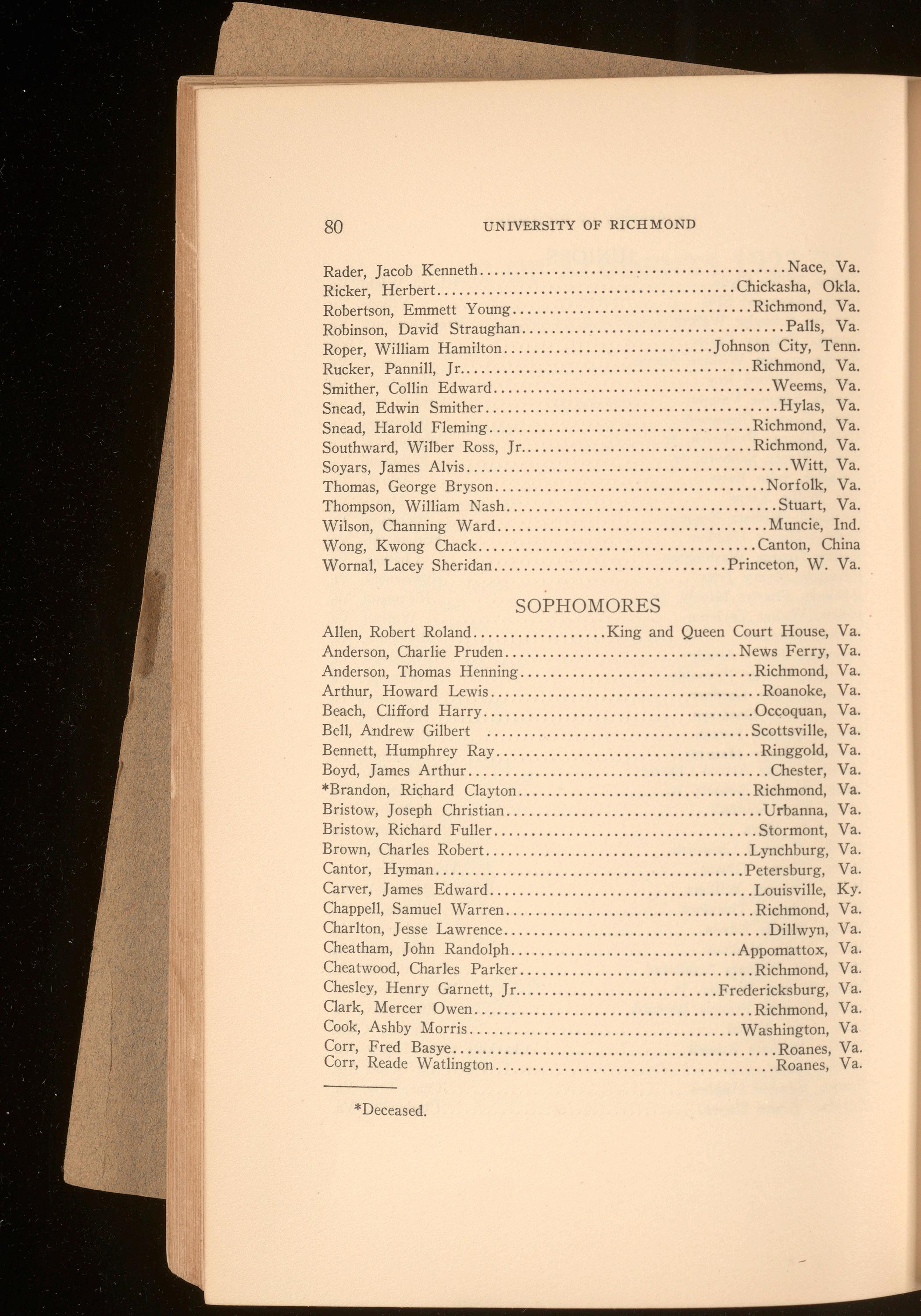
Rader, Jacob Kenneth ......................................... Nace, Va.
Ricker, Herbert ........................................ Chickasha, Okla. Robertson, Emmett Young ................................ Richmond, Va. Robinson, David Straughan ................................... Palls, Va. Roper, William Hamilton Johnson City, Tenn. Rucker, Pannill, Jr. ...................................... Richmond, Va.
Smither, Collin Edward ..................................... Weems, Va.
Snead, Edwin Smither ....................................... Hy las, Va. Snead, Harold Fleming ................................... Richmond, Va. Southward, Wilber Ross, Jr ............................... Richmond, Va.
Soyars, James Alvis ........................................... Witt, Va. Thomas, George Bryson .................................... Norfolk, Va. Thompson, William Nash .................................... Stuart, Va. Wilson, Channing Ward .................................... Muncie, Ind. Wong, Kwong Chack ..................................... Canton, China
Wornal, Lacey Sheridan ............................... Princeton, W. Va.
Allen, Robert Roland .................. King and Queen Court House, Va. Anderson, Charlie Pruden ............................... News Ferry, Va. Anderson, Thomas Henning ............................... Richmond, Va. Arthur, Howard Lewis .................................... Roanoke, Va. Beach, Clifford Harry .................................... Occoquan, Va. Bell, Andrew Gilbert ................................... Scottsville, Va. Bennett, Humphrey Ray ................................... Ringgold, Va. Boyd, James Arthur ... Chester, Va. *Brandon, Richard Clayton ............................... Richmond, Va. Bristow, Joseph Christian .................................. Urbanna, Va. Bristow, Richard Fuller ................................... Stormont, Va. Brown, Charles Robert. Lynchburg, Va. Cantor, Hyman ....... . ..... . ........................... Petersburg, Va. Carver, James Edward ................................... Louisville, Ky. Chappell, Samuel Warren ................................. Richmond, Va. Charlton, Jesse Lawrence ................................... Dillwyn, Va. Cheatham, John Randolph .............................. Appomattox, Va. Cheatwood, Charles Parker ............................... Richmond, Va. Chesley, Henry Garnett, Jr Fredericksburg, Va. Clark, Mercer Owen ..................................... Richmond, Va. Cook, Ashby Morris .. .................................. Washington, Va Corr, Fred Basye ........................................... Roanes, Va. Corr, Reade Watlington .. .. ................................. Roanes, Va.
*Deceased.
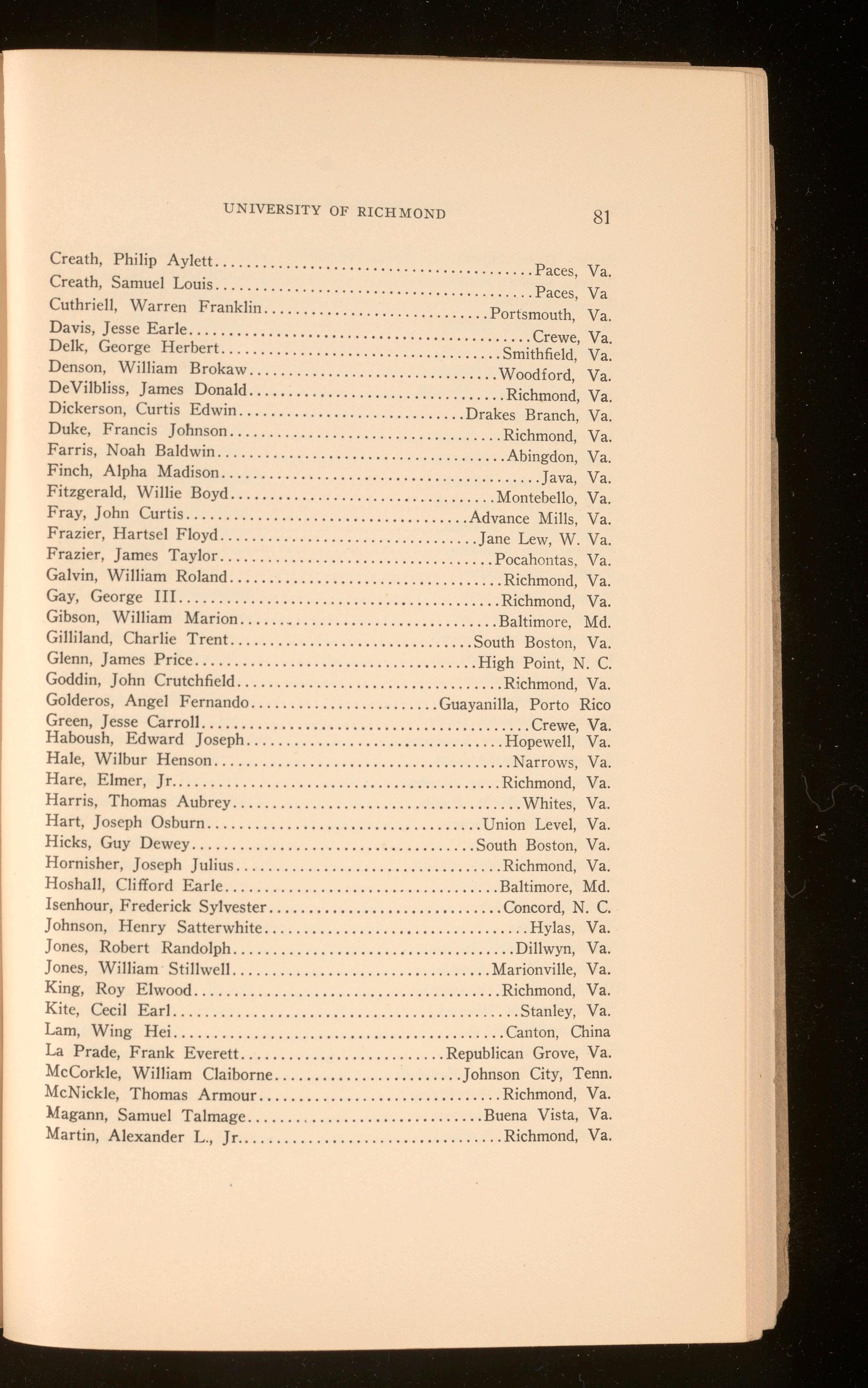
Creath, Philip Aylett ......................................... Paces, Va. Creath, Samuel Louis ......................................... Paces, Va
Cuthriell, Warren Franklin ............................. Portsmouth, Va. Davis, Jesse Earle ............................................ Crewe, Va. Delk, George Herbert .................................... Smithfield, Va.
Denson, William Brokaw ................................ Woodford, Va. DeVilbliss, James Donald ................................. Richmond, Va. Dickerson, Curtis Edwin .............................
Drakes Branch, Va. Duke, Francis Johnson ................................... Richmond, Va. Farris, Noah Baldwin ..................................... Abingdon, Va. Finch, Alpha Madison ......................................... Java, Va. Fitzgerald, Willie Boyd .................................. Montebello, Va. Fray, John Curtis ....................................
Advance Mills, Va. Frazier, Hartse! Floyd ................................. Jane Lew, W. Va. Frazier, James Taylor ................................... Pocahontas, Va. Galvin, William Roland ................................... Richmond, Va. Gay, George III. ...................... ................. Richmond, Va. Gibson, William Marion ......•.......................... Baltimore, Md. Gilliland, Charlie Trent ............................... South Boston, Va. Glenn, James Price .................................... High Point, N. C. Goddin, John Crutchfield .................................. Richmond, Va.
Golderos, Angel Fernando ........................
Guayanilla, Porto Rico Green, Jesse Carroll .......................................... Crewe, Va. Haboush, Edward Joseph ................................. Hopewell, Va. Hale, Wilbur Henson ...................................... Narrows, Va. Hare, Elmer, Jr .......................................... Richmond, Va. Harris, Thomas Aubrey ..................................... Whites, Va. Hart, Joseph Osburn ................................... Union Level, Va. Hicks, Guy Dewey ................................ South Boston, Va. Hornisher, Joseph Julius .................................. Richmond, Va. Hoshall, Clifford Earle ................................... Baltimore, Md. Isenhour, Frederick Sylvester .............................. Concord, N. C. Johnson, Henry Satterwhite .................................. Hylas, Va. Jones, Robert Randolph .................................... Dillwyn, Va. Jones, William Stillwell ................................. Marionville, Va. King, Roy Elwood ....................................... Richmond, Va. Kite, Cecil Earl. ........................................... Stanley, Va. Lam, Wing Rei .......................................... Canton, China La Prade, Frank Everett. ......................... Republican Grove, Va. McCorkle, William Claiborne ........................ Johnson City, Tenn. McNickle, Thomas Armour ............................... Richmond, Va. Magann, Samuel Talmage ....... ...................... Buena Vista, Va. Martin, Alexander L., Jr .................................. Richmond, Va.
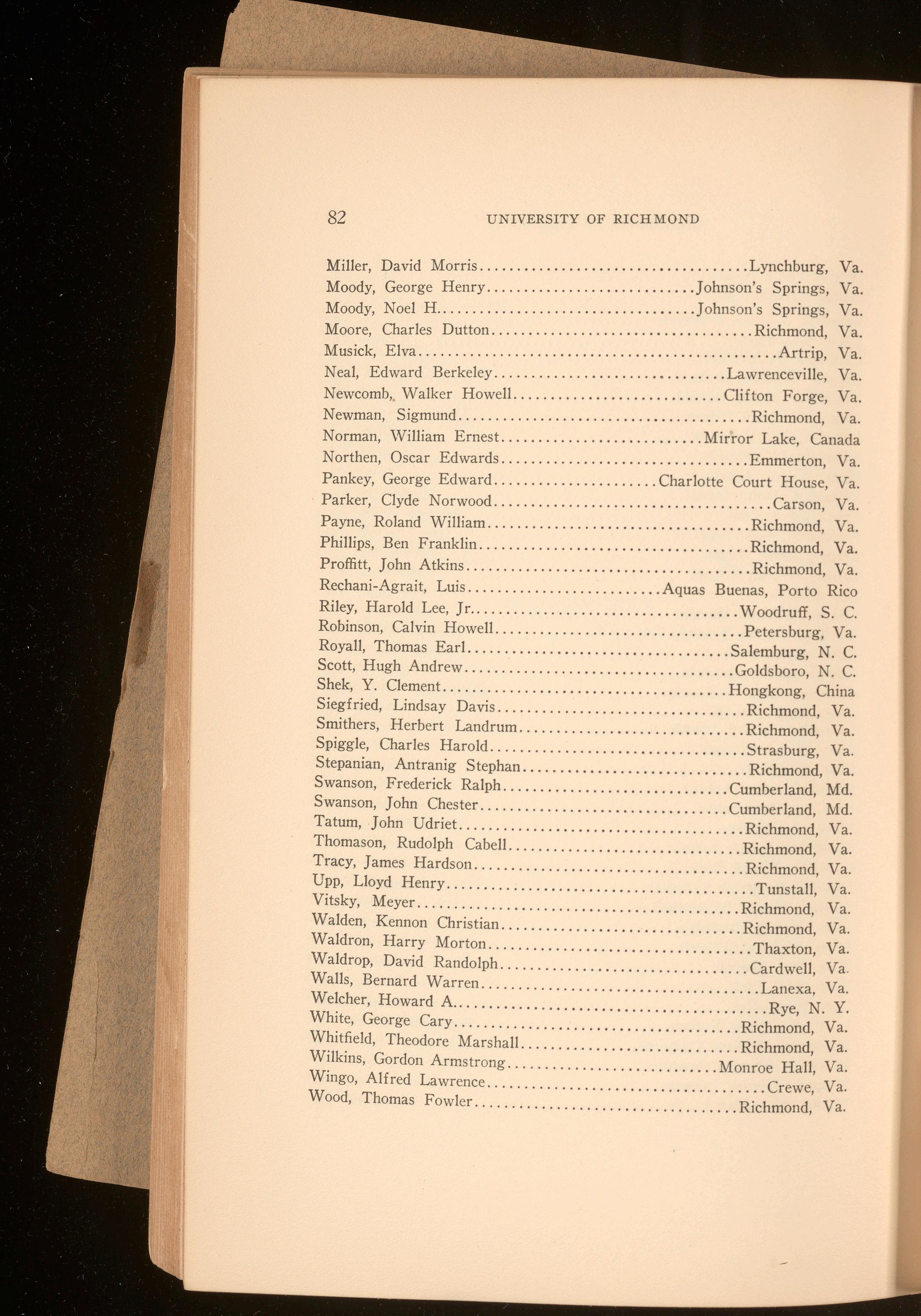
Miller, David Morris .................................... Lynchburg, Va.
Moody, George Henry ............................ Johnson's Springs, Va. Moody, Noel H ................................... Johnson's Springs, Va.
Moore, Charles Dutton ................................... Richmond, Va. Musick, Elva ................................................ Artrip, Va.
Neal, Edward Berkeley ............................... Lawrenceville, Va.
Newcomb, Walker Howell ............................ Clifton Forge, Va.
Newman, Sigmund ....................................... Richmond, Va.
Norman, \Villiam Ernest ........................... Mirror Lake, Canada N orthen, Oscar Edwards ................................. Emmerton, Va.
Pankey, George Edward ...................... Charlotte Court House, Va. Parker, Clyde Norwood ..................................... Carson, Va. Payne, Roland William ................................... Richmond, Va. Phillips, Ben Franklin ..................................•. Richmond, Va.
Proffitt, John Atkins ...................................... Richmond, Va.
Rechani-Agrait, Luis .......................... Aquas Buenas, Porto Rico Riley, Harold Lee, Jr .................................... Woodruff, S. C. Robinson, Calvin Howell ................................. Petersburg, Va. Royall, Thomas Earl. .................................. Salemburg, N. C.
Scott, Hugh Andrew .................................... Goldsboro, N. C. Shek, Y. Clement ...................................... Hongkong, China
Siegfried, Lindsay Davis ................................. Richmond, Va.
Smithers, Herbert Landrum .............................. Richmond, Va.
Spiggle, Charles Harold .................................. Strasburg, Va. Stepanian, Antranig Stephan .............................. Richmond, Va. Swanson, Frederick Ralph .............................. Cumberland, Md. Swanson, John Chester ................................. Cumberland, Md. Tatum, John Udriet. ..................................... Richmond, Va.
Thomason, Rudolph Cabell ............................... Richmond, Va. Tracy, James Hards on .................................... Richmond, Va. Upp, Lloyd Henry ......................................... Tunstall, Va. Vitsky, Meyer ........................................... Richmond, Va.
Walden, Kennon Christian ................................ Richmond, Va. Waldron, Harry Morton ................................... Thaxton, Va. Waldrop, David Randolph ................................. Cardwell, Va. Walls, Bernard Warren ..................................... Lanexa, Va. Welcher, Howard A. ......................................... Rye, N. Y. White, George Cary ...................................... Richmond, Va.
Whitfield, Theodore Marshall ............................. Richmond, Va.
Wilkins, Gordon Armstrong ............................ Monroe Hall, Va. Wingo, Alfred Lawrence ..................................... Crewe, Va. Wood, Thomas Fowler ................................... Richmond, Va.
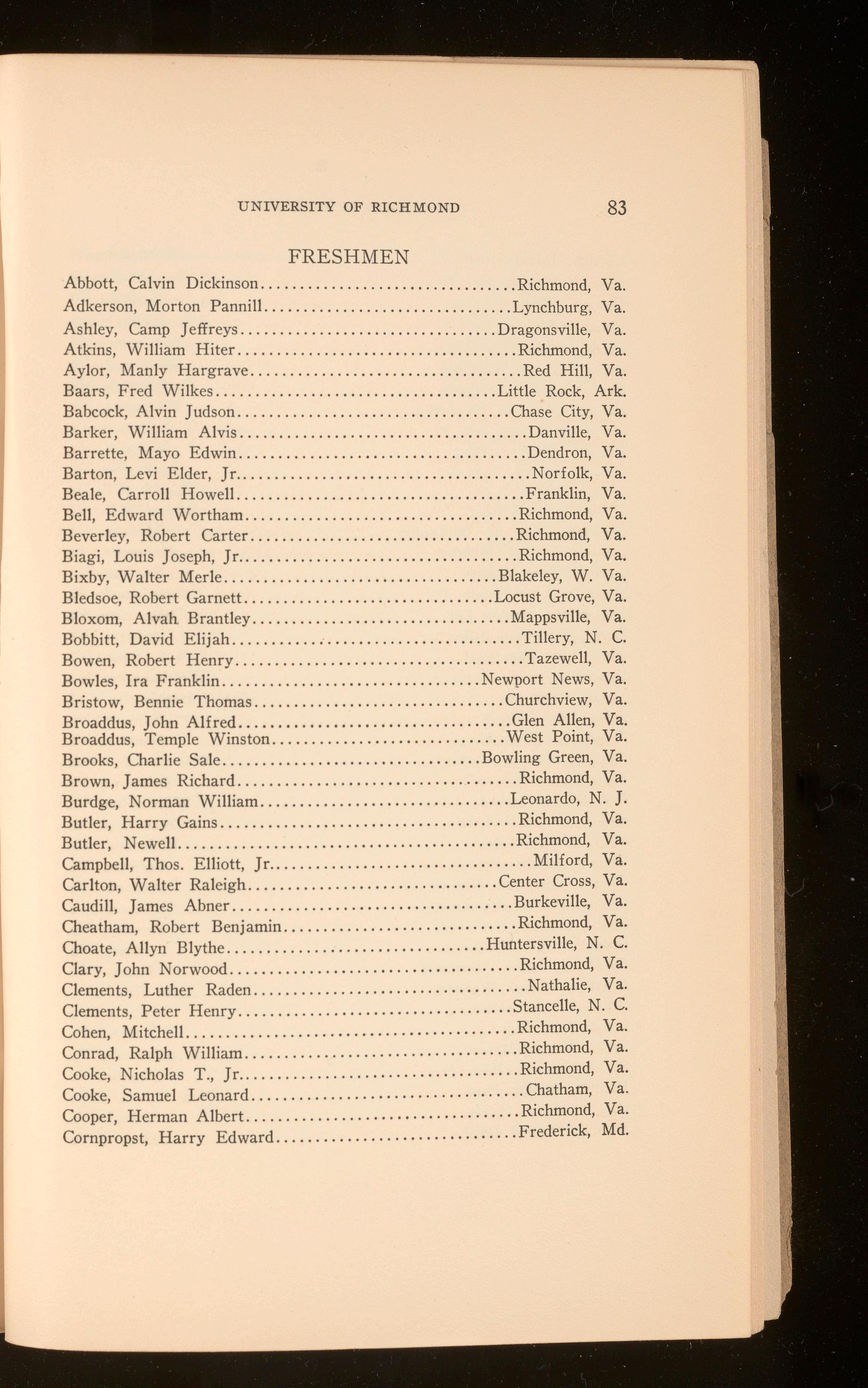
Abbott, Calvin Dickinson ................................. Richmond, Va.
Adkerson, Morton Pannill. ............................... Lynchburg, Va.
Ashley, Camp Jeffreys ................................. Dragons ville, Va.
Atkins, William Hiter .................................... Richmond, Va.
Aylor, Manly Hargrave ................................... Red Hill, Va.
Baars, Fred Wilkes .................................... Little Rock, Ark.
Babcock, Alvin Judson ................................... Chase City, Va.
Barker, William Alvis ..................................... Danville, Va.
Barrette, Mayo Edwin ..................................... Dendron, Va.
Barton, Levi Elder, Jr. ..................................... Norfolk, Va.
Beale, Carroll Howell. .................................... Franklin, Va.
Bell, Edward Wortham ................................... Richmond, Va.
Beverley, Robert Carter .................................. Richmond, Va.
Biagi, Louis Joseph, Jr .................................... Richmond, Va.
Bixby, Walter Merle ................................... Blakeley, W. Va.
Bledsoe, Robert Garnett. ............................... Locust Grove, Va.
Bloxom, Alvah Brantley ................................. Mappsville, Va.
Bobbitt, David Elijah ..................................... Tillery, N. C.
Bowen, Robert Henry ..................................... Tazewell, Va.
Bowles, Ira Franklin ................................. Newport News, Va.
Bristow, Bennie Thomas ................................ Churchview, Va.
Broaddus, John Alfred ................................... Glen Allen, Va. Broaddus, Temple Winston .............................. West Point, Va.
Brooks, Charlie Sale ................................. Bowling Green, Va. Brown, James Richard .................................... Richmond, Va.
Burdge, Norman William Leonardo, N. J. Butler, Harry Gains ...................................... Richmond, Va. Butler, Newell. .......................................... Richmond, Va. Campbell, Thos. Elliott, Jr Milford, Va.
Carlton, Walter Raleigh ................................ Center Cross, Va.
Caudill, James Abner .................................... Burkeville, Va.
Cheatham, Robert Benjamin Richmond, Va. Choate, Allyn Blythe ................................. Huntersville, N. C.
Clary, John Norwood ..................................... Richmond, Va.
Clements, Luther Raden ................................... Nathalie, Va.
Clements, Peter Henry ................................... Stancelle, N. C. Cohen, Mitchell Richmond, Va.
Conrad, Ralph William ................................... Richmond, Va.
Cooke, Nicholas T., Jr .................................... Richmond, Va.
Cooke, Samuel Leonard Chatham, Va. Cooper, Herman Albert Richmond, Va.
Cornpropst, Harry Edward ............................... Frederick, Md.
84
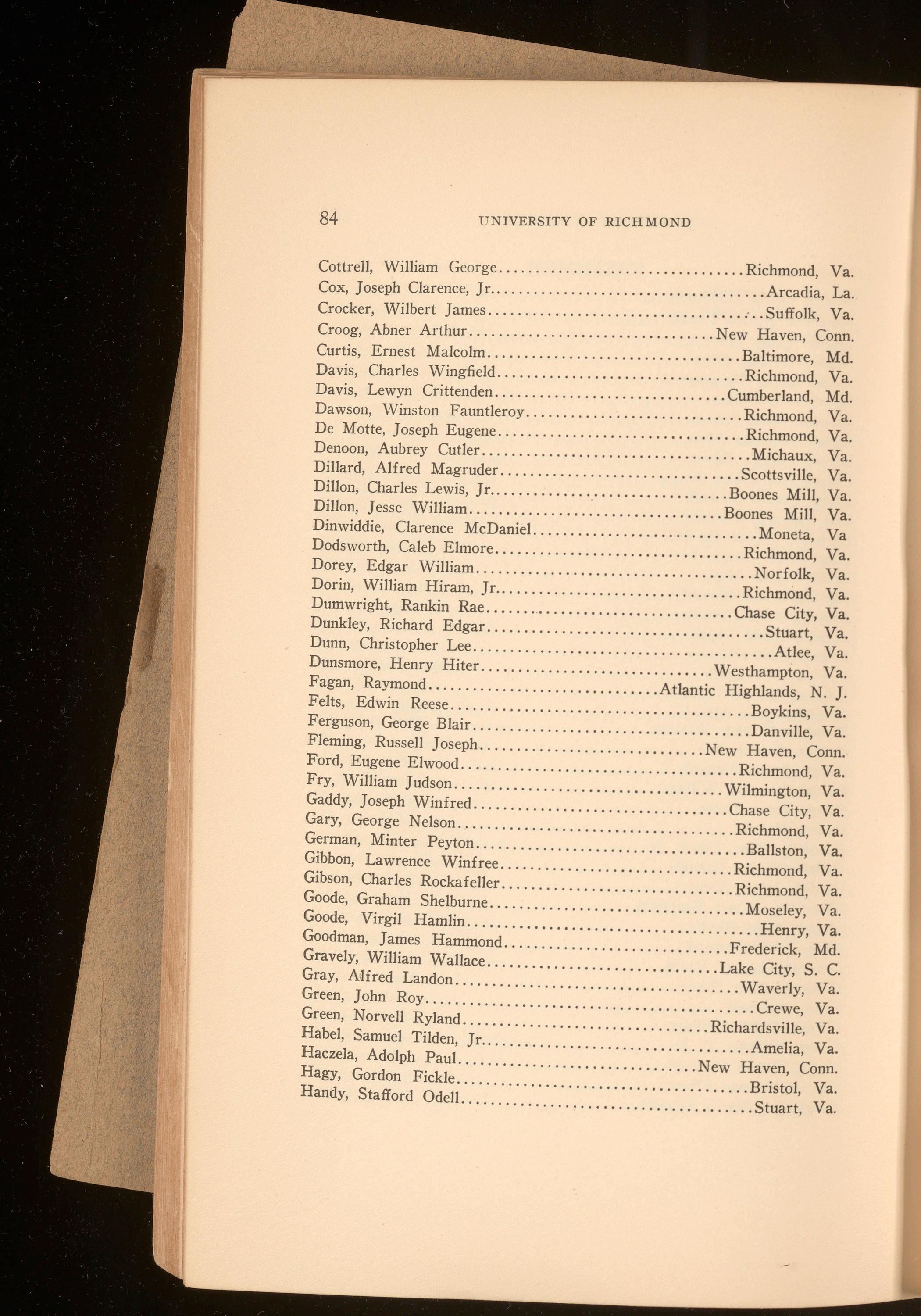
Cottrell, William George ................................. Richmond, Va.
Cox, Joseph Clarence, Jr ..................................... Arcadia, La. Crocker, Wilbert James ..................................... Suffolk, Va. Croog, Abner Arthur ................................. New Haven, Conn. Curtis, Ernest Malcolm .................................. Baltimore, Md. Davis, Charles Wingfield ................................. Richmond, Va. Davis, Lewyn Crittenden ............................... Cumberland, Md. Dawson, Winston Fauntleroy ............................. Richmond, Va. De Motte, Joseph Eugene ................................. Richmond, Va. Denoon, Aubrey Cutler. ................................... Michaux, Va.
Dillard, Alfred Magruder. ............................... Scottsville, Va.
Dillon, Charles Lewis, Jr ................................ Boones Mill, Va. Dillon, Jesse William .................................. Boones Mill, Va. Dinwiddie, Clarence McDaniel .............................. Moneta, Va
Dodsworth, Caleb Elmore ................................. Richmond, Va.
Dorey, Edgar William ..................................... Norfolk, Va.
Dorin, William Hiram, Jr ................................. Richmond, Va. Dumwright, Rankin Rae ................................. Chase City, Va. Dunkley, Richard Edgar ..................................... Stuart, Va. Dunn, Christopher Lee ........................................ Atlee, Va.
Dunsmore, Henry Hiter ............................... Westhampton, Va.
Fagan, Raymond ............................... Atlantic Highlands, N. J. Felts, Edwin Reese ........................................ Boykins, Va.
Ferguson, George Blair ..................................... Danville, Va.
Fleming, Russell Joseph .............................. New Haven, Conn.
Ford, Eugene Elwood ..................................... Richmond, Va. Fry, William Judson .................................... Wilmington, Va. Gaddy, Joseph Winfred .................................. Chase City, Va. Gary, George Nelson ..................................... Richmond, Va. German, Minter Peyton .................................... Ballston, Va. Gibbon, Lawrence Winfree ............................... Richmond, Va. Gibson, Charles Rockafeller. .............................. Richmond, Va. Goode, Graham Shelburne .................................. Moseley, Va. Goode, Virgil Hamlin ....................................... Henry, Va. Goodman, James Hammond .............................. Frederick, Md. Gravely, William Wallace ............................... Lake City, S. C. Gray, A<lfred Landon ...................................... Waverly, Va. Green, John Roy ............................................ Crewe, Va. Green, Norvell Ryland ................................. Richardsville, Va.
Habel, Samuel Tilden, Jr .................................... Amelia, Va.
Haczela, Adolph Paul. ............................... New Haven, Conn. Hagy, Gordon Fickle ....................................... Bristol, Va. Handy, Stafford Odell ....................................... Stuart, Va.
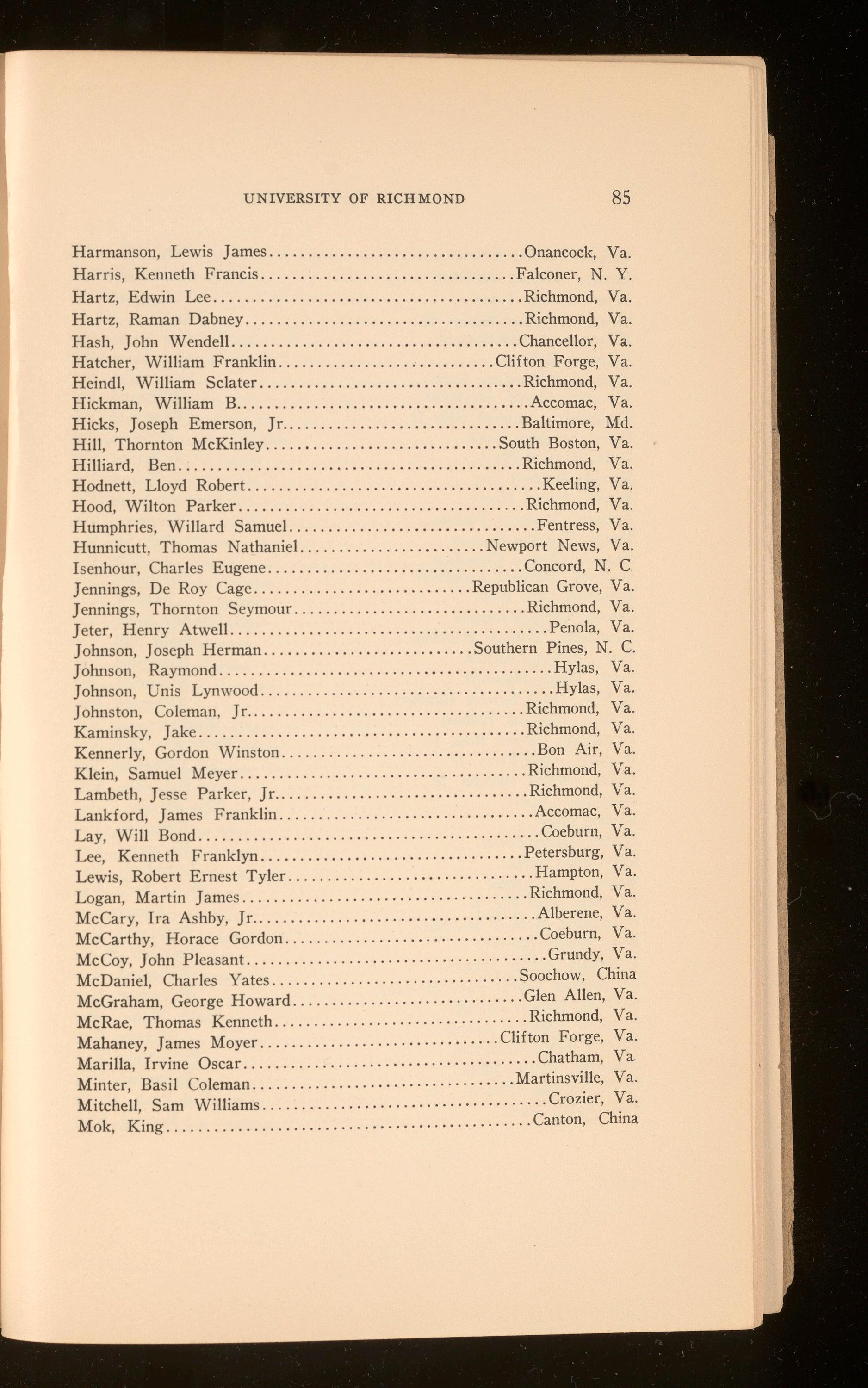
UNIVERSITY OF RICHMOND 85
Harmanson, Lewis James ...... . ................ Onancock, Va.
Harris, Kenneth Francis . .. . . . ......... . Falconer, N. Y.
Hartz, Edwin Lee .. . . .. ....... . Richmond, Va.
Hartz, Raman Dabney .. . ... Richmond, Va
Hash, John Wendell ..... .
.. . . . . . . .... ....... Chancellor, Va.
Hatcher, William Franklin ........... ........ Clifton Forge, Va
Heindl , William Sclater . .......... Richmond, Va
Hickman, William B .... .. .... .. .... .... Accomac, Va.
Hicks, Joseph Emerson, Jr ....... . ....... .. Baltimore, Md.
Hill , Thornton McKinley ...... South Boston, Va.
Hilliard , Ben . .. ..... . ...... Richmond, Va.
Hodnett , Lloyd Robert . .. . .. .. Keeling, Va
Hood, Wilton Parker ..
. . ....... .. . Richmond, Va.
Humphrie s, Willard Samuel. ... . .. .. .. ....... Fentress, Va. Hunnicutt , Th oma s Nathaniel. . .... N ewport News, Va.
I senh our, Charl es Eugene ...... Concord, N. C. Jennings, De Roy Cag e .....
.. . .. . ... Republican Grove, Va
J enning s, Th o rnt on Se ymour .. ... .......... .. Richmond, Va.
J eter , H enry Atwell. .... . .. . ......... Penola, Va. Johnson, Jos eph Herman ... Southern Pines , N. C. Johns on, Raym ond ....
. .. ... ... .. . Hy las, Va .
Johnson , U nis Lynwo od .....
... Hylas, Va
Johnston, Coleman , Jr .. .. . . . Richmond, Va Kaminsky, Jak e ..
Kennerly, Go rd on Win ston
Klein, Samu el M eyer .
Lambeth , J esse Park er , Jr ........ .
... .. . . . .. ........ Richmond, Va
.. Bon Air, Va
.. . ... .. Richmond, Va
... Richmond, Va . Lankford , Jame s Franklin .....
. .... ... Accomac, Va.
Lay, Will Bond . . . .. . ..... . .. . . Coeburn, Va
Lee, K enn eth Franklyn ....... . ..... Petersburg, Va Lewis, Rob ert Ern est Tyl er
... Hampton , Va Logan, Martin Jam es ............
... Richmond, Va. McCary , Ira A shby, Jr .....
. Alberene, Va. McCarthy , Horace Gordon
.. Coeburn, Va. McCoy, John Pleasant . .....
Grundy, Va . McDani el, Charle s Yat es ....... Soochow, China McGraham , Geo rge Howard
. Glen Allen, Va McRae, Thoma s Kenneth ... ... .... . Richmond. Va. Mahaney, James Moyer
Marilla , Irvine Oscar ..
Mint e r, Ba s il Coleman
Mitchell , Sam Williams ..
... Clifton Forge , Va
... Chatham , Va
....... Martinsville, Va.
... Crozier , Va. Mok, King ..
Canton, China
Moore, Richard Arthur ................................. Churchview, Va.
Moore, William Robinson .............................. Church view, Va. Myers, Cooper Louis ...................................... Ringgold, Va.
Neathery, Robert Walter, Jr .............................. Falconer, N. Y.
Newcomb, Alfred Paxton .............................
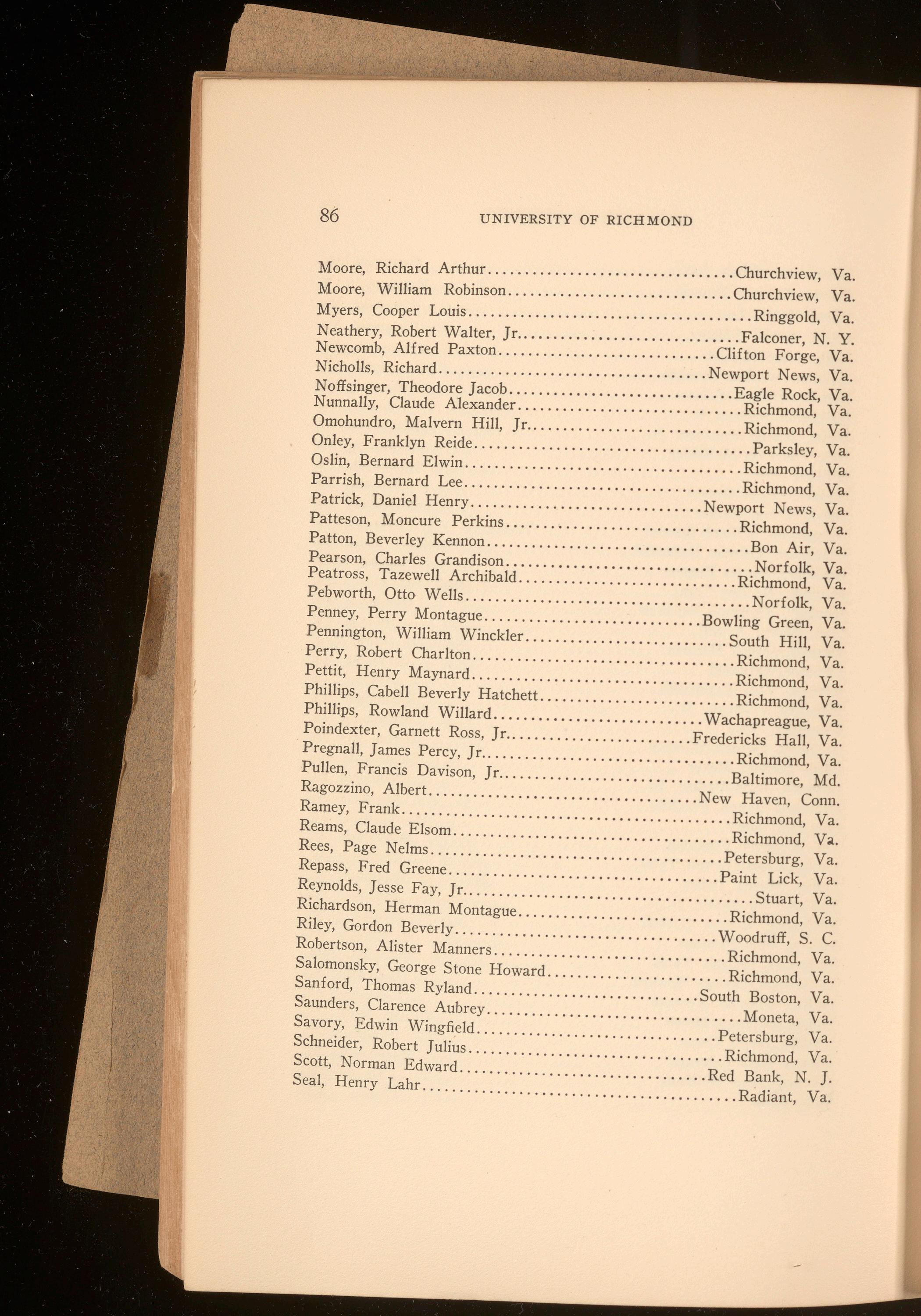
Clifton Forge, Va.
Nicholls, Richard .................................... Newport News, Va.
Noffsinger, Theodore Jacob .............................. Eagle Rock, Va.
Nunnally, Claude Alexander .............................. Richmond, Va.
Omohundro, Malvern Hill, Jr ............................. Richmond, Va.
Onley, Franklyn Reide ..................................... Parksley, Va.
Oslin, Bernard Elwin ..................................... Richmond, Va.
Parrish, Bernard Lee ..................................... Richmond, Va.
Patrick, Daniel Henry ...............................
Newport News, Va.
Patteson, Moncure Perkins ............................... Richmond, Va.
Patton, Beverley Kennon ................................... Bon Air, Va.
Pearson, Charles Grandison ................................. Norfolk, Va.
Peatross, Tazewell Archibald ............................. Richmond, Va.
Pebworth, Otto Wells ...................................... Nor folk, Va.
Penney, Perry Montague ............................. Bowling Green, Va.
Pennington, William Winckler ........................... South Hill, Va.
Perry, Robert Charlton ................................... Richmond, Va.
Pettit, Henry Maynard ................................... Richmond, Va.
Phillips, Cabell Beverly Hatchett. ......................... Richmond, Va.
Phillips, Rowland Willard ............................ Wachapreague, Va.
Poindexter, Garnett Ross, Jr ......................... Fredericks Hall, Va.
Pregnall, J arnes Percy, Jr .................................. Richmond, Va.
Pullen, Francis Davison, Jr ............................... Baltimore, Md. Ragozzino, Albert. ................................... New Haven, Conn.
Ramey, Frank ............................................ Richmond, Va.
Reams, Claude Elsom ..................................... Richmond, Va.
Rees, Page Nelms ....................................... Petersburg, Va.
Repass, Fred Greene .................................... Paint Lick, Va.
Reynolds, Jesse Fay, Jr ....................................... Stuart, Va.
Richardson, Herman Montague ............................ Richmond, Va.
Riley, Gordon Beverly ................................... Woodruff, S. C.
Robertson, Alister Manners ............................... Richmond, Va.
Salomonsky, George Stone Howard ........................ Richmond, Va.
Sanford, Thomas Ryland .............................. South Boston, Va. Saunders, Clarence Aubrey .................................. Mon eta, Va.
Savory, Edwin Wingfield ................................ Petersburg, Va.
Schneider, Robert Julius .................................. Richmond, Va.
Scott, Norman Edward ........... ..................... Red Bank, N. J. Seal, Henry Lahr .......................................... Radiant, Va.
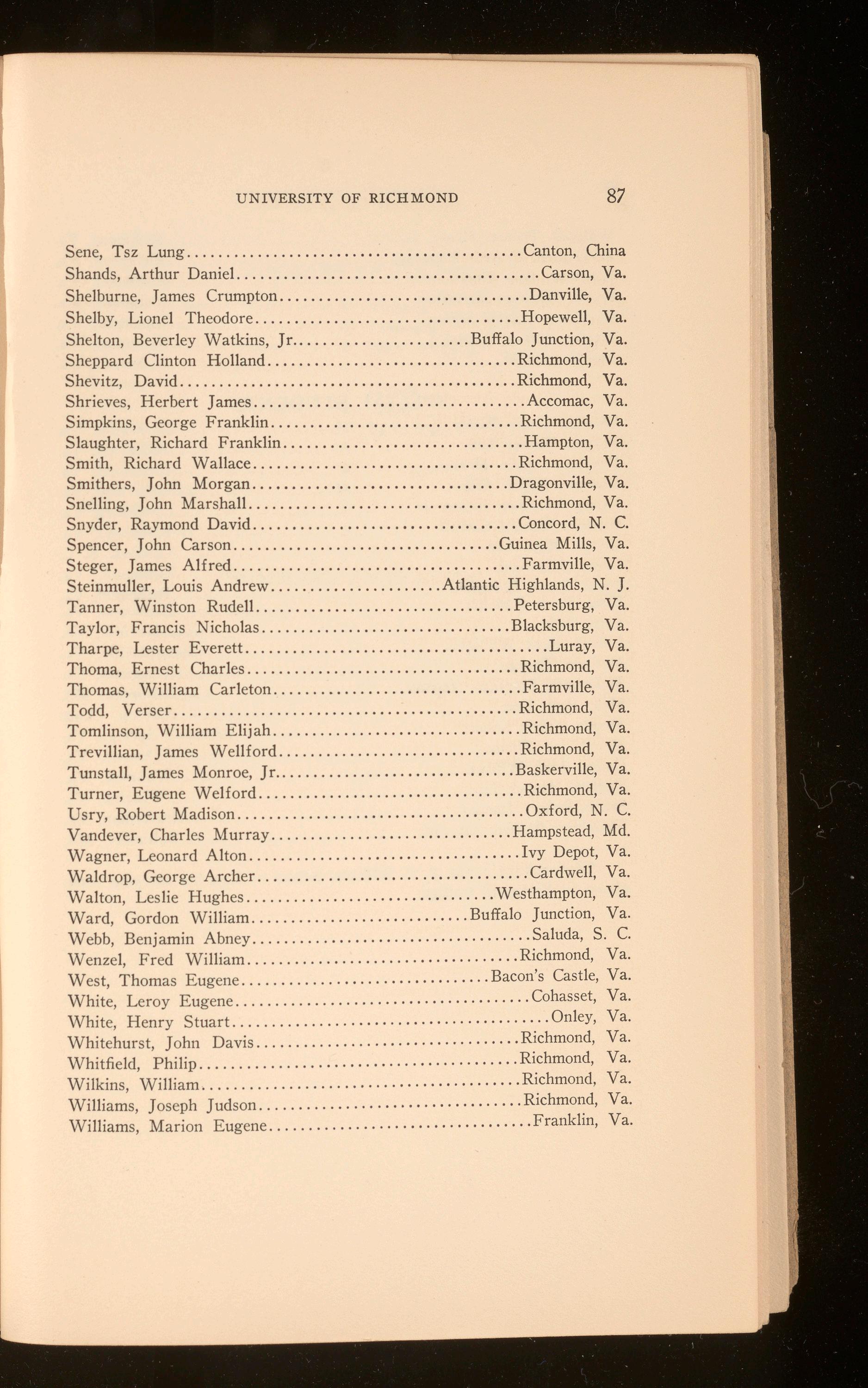
Sene, Tsz Lung ........................................... Canton, China
Shands, Arthur Daniel ....................................... Carson, Va.
Shelburne, James Crumpton ................................ Danville, Va.
Shelby, Lionel Theodore .................................. Hopewell, Va.
Shelton, Beverley Watkins, Jr ....................... Buffalo Junction, Va.
Sheppard Clinton Holland ................................ Richmond, Va. Shevitz, David ........................................... Richmond, Va.
Shrieves, Herbert James ................................... Accomac, Va. Simpkins, George Franklin ................................ Richmond, Va. Slaughter, Richard Franklin ............................... Hampton, Va.
Smith, Richard Wallace .................................. Richmond, Va.
Smithers, John Morgan ................................. Dragonville, Va.
Snelling, John Marshall. .................................. Richmond, Va.
Snyder, Raymond David .................................. Concord, N. C. Spencer, John Carson .................................. Guinea Mills, Va.
Steger, James Alfred ..................................... Farmville, Va.
Steinmuller, Louis Andrew Atlantic Highlands, N. J. Tanner, Winston Rudell Petersburg, Va. Taylor, Francis Nicholas ................................ Blacksburg, Va. Tharpe, Lester Everett. ...................................... Luray, Va.
Thoma, Ernest Charles ................................... Richmond, Va. Thomas, William Carleton ................................ Farmville, Va.
Todd, Verser. ........................................... Richmond, Va.
Tomlinson, William Elijah ................................ Richmond, Va.
Trevillian, James Wellford ............................... Richmond, Va.
Tunstall, James Monroe, Jr Baskerville, Va. Turner, Eugene Welford .................................. Richmond, Va.
Usry, Robert Madison ..................................... Oxford, N. C. Vandever, Charles Murray ............................... Hampstead, Md. Wagner, Leonard Alton ................................... Ivy Depot, Va. Waldrop, George Archer ................................... Cardwell, Va.
Walton, Leslie Hughes ................................ Westhampton, Va. Ward, Gordon William ............................ Buffalo Junction, Va. Webb, Benjamin Abney .................................... Saluda, S. C. Wenzel, Fred William ................................... Richmond, Va. West, Thomas Eugene ................................ Bacon's Castle, Va.
White, Leroy Eugene ...................................... Cohasset, Va.
White, Henry Stuart ......................................... Onley, Va.
Whitehurst, John Davis .................................. Richmond, Va. Whitfield, Philip ......................................... Richmond, Va. Wilkins, William ......................................... Richmond, Va.
Williams, Joseph Judson .................................. Richmond, Va. Williams, Marion Eugene .................................. Franklin, Va.
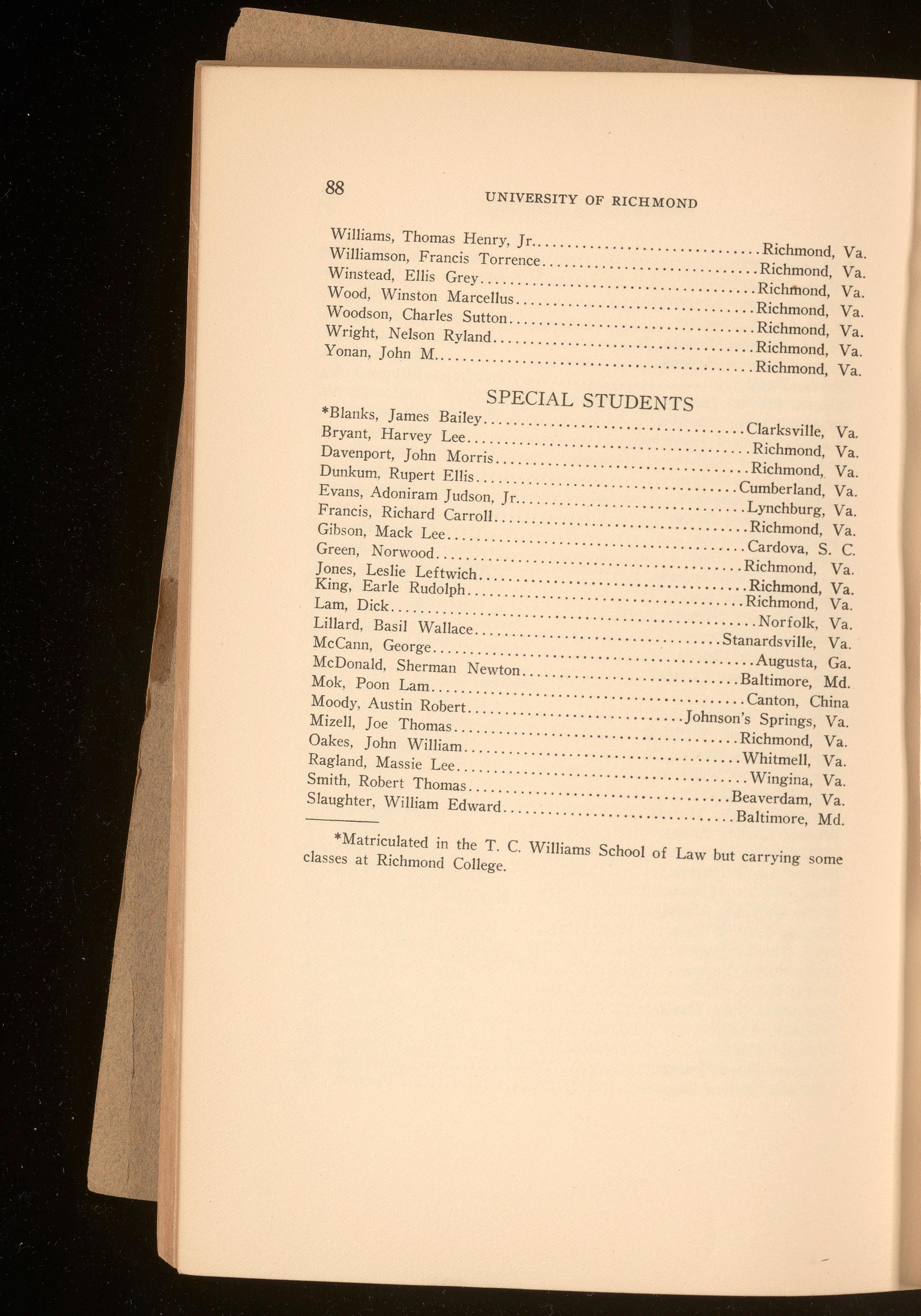
Williams, Thomas Henry, Jr ............................... Richmond, Va. Williamson, Francis Torrence ..... ... .... ........ ..... .... Richmond, Va. Winstead, Ellis Grey ..................................... Richmond, Va . Wood, Winston Marcellus ................................ Richmond, Va . Woodson, Charles Sutton .
.... . ... Richmond, Va. Wright, Nelson Ryland ................................... Richmond, Va. Yonan, John M ........................................... Richmond, Va.
*Blanks, James Bailey ................................... Clarksville, Va Bryant, Harvey Lee ...................................... Richmond, Va . Davenport, John Morris .................. ... .......... Richmond, Va . Dunkum, Rupert Ellis ................................... Cumberland , Va. Evans, Adoniram Judson, Jr ............................... Lynchburg, Va. Francis, Richard Carroll. ..........
.. ....... .... ......... Richmond , Va. Gibson, Mack Lee ........................................ Cardova, S. C. Green, Norwood ............
... Richmond , Va. Jones, Leslie Leftwich .................................... Richmond, Va. King , Earle Rudolph ..................................... Richmond, Va. Lam, Dick ................................................. Norfolk, Va . Lillard, Basil Wallace ..
..... Stanardsville, Va McCann, George ...
...... Augusta, Ga. McDonald. Sherman Newton ......... .............. Baltimore, Md. Mok, Poon Lam .......................................... Canton, China Moody, Austin Robert. ............................ Johnson's Springs, Va. Mizell, Joe Thomas .
......... Richmond, Va. Oakes, John William ......
Whitmell, Va. Ragland, Massie Lee ............
Wingina, Va Smith, Robert Thomas ................................... Beaverdam, Va Slaughter, William Edward ............................... Baltimore, Md
*Matriculated in the T. C. Williams School of Law but carrying some classes at Richmond College.
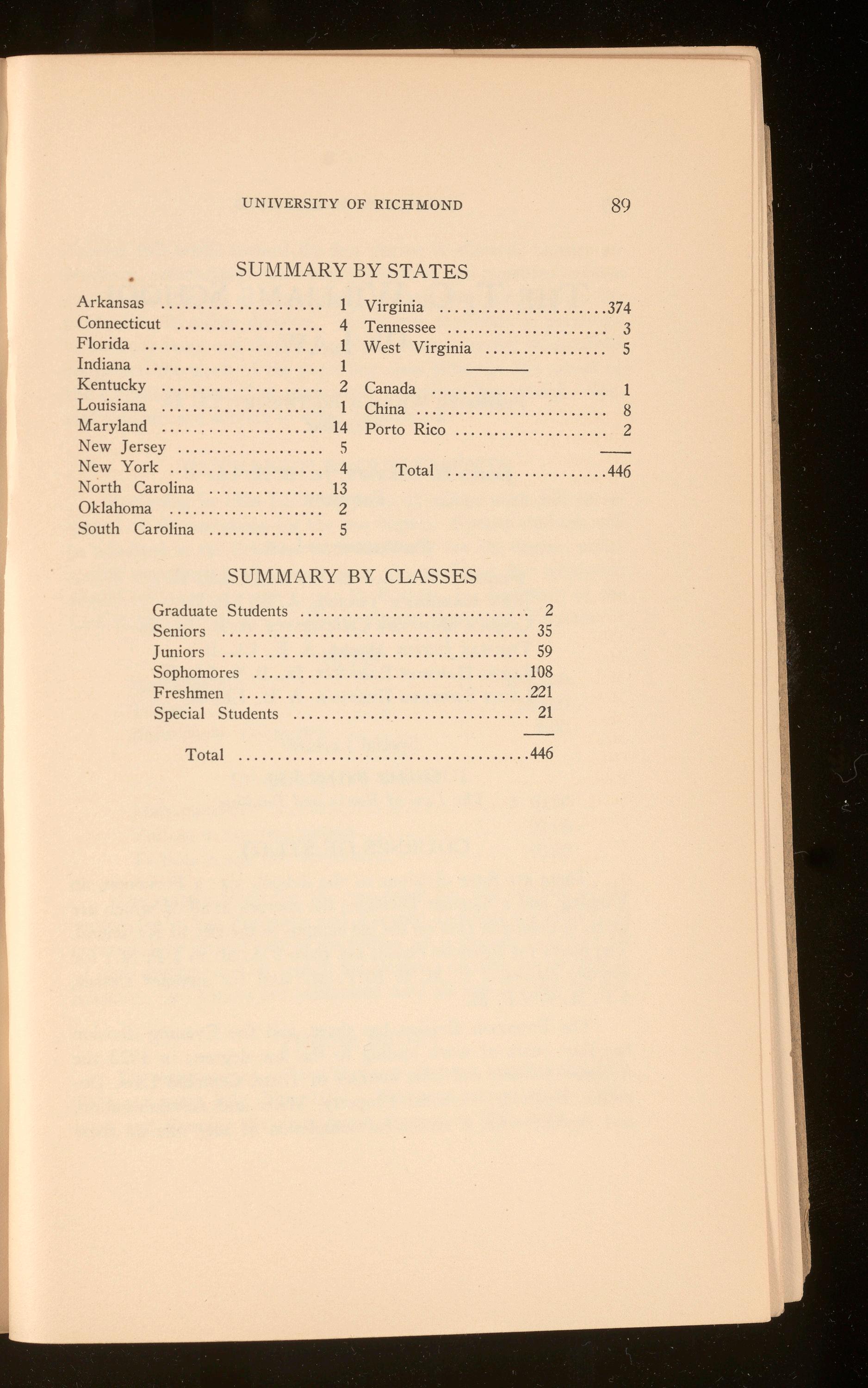

UNIVERSITY OF RICHMOND
FREDERICK \VILLIAM BOATWRIGHT, LL. D. President
JAMES H. BARNETT, JR., B. s., LL. B. Secretary
PROFESSORS OF LA w
FREDERIC WILLIAM BOATWRIGHT, LL. D.
JOHN RANDOLPH TUCKER, A. B., LL. B.
CASSIUS MONCURE CHICHESTER, A. B., LL. B.
THOMAS JUSTIN MOORE, A. B., LL. B.
JAMES HARMON BARNETT, JR., B. S., LL. B.
LOUIS SHEPARD HERRINK, A. B., LL. B.
Special Lecturer
GEORGE BRYAN, EsQ.
The Law of Banks and Banking
There are three divisions of the School, viz: a Forenoon, an Evening, and a Summer Division; the courses in all of which are given in Columbia Hall on the old campus in the city of Richmond. The hours for forenoon classes are from 9 A. M. to 1 P. M.; for evening classes, 7 P. M. to 10 P. M.; and for summer classes, 6 P. M. to 9 P. M.
The Forenoon division has three, and the Evening division has four years of work leading to the law degree; in 1923 the Summer division will offer courses in Torts , Criminal Law, Domestic Relations, Personal Property, Wills and Administration, and Agency,-for a successful completion of any one of these
courses full credit toward the law degree is allowed ; regular attendance, satisfactory class-room recitations, and approved written examinations in all of the subjects in each class are required for graduation in either division. No degree candidate is permitted to advance from one class to another, without having successfully completed the work of the preceding class either in this school or the equivalent thereof at some other accredited law school. Special students are subject to other regulations.
Beginning in 1924-1925 two years of college work will be required of all candidates for the law degree. Special students will be admitted to the School, not to candidacy for the degree, under special regulations. In every case the applicant for admission should communicate with James H. Barnett, Jr., Secretary of the Law School, 601 North Lombardy Street, Richmond, Virginia.
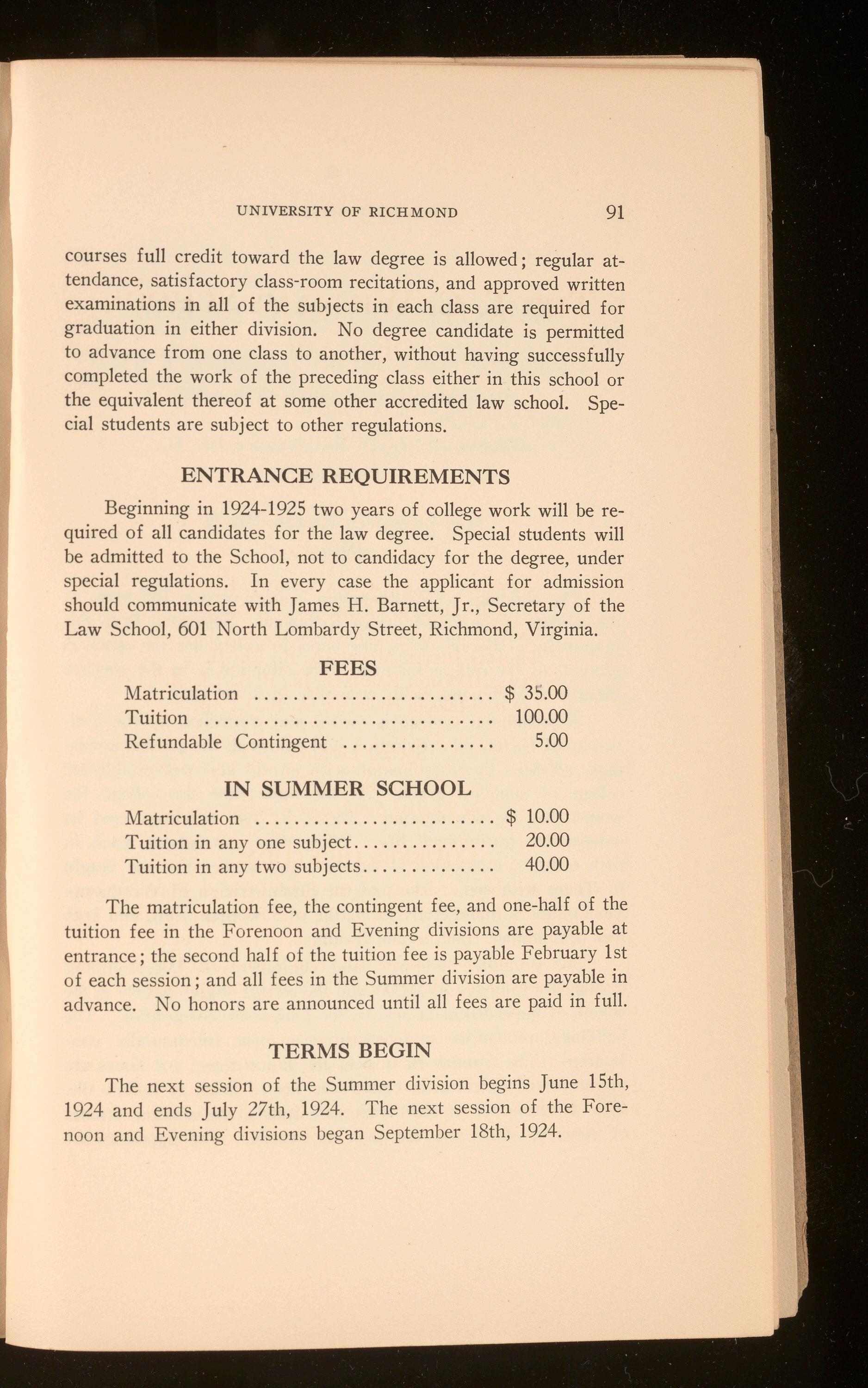
The matriculation fee, the contingent fee, and one-half of the tuition fee in the Forenoon and Evening divisions are payable at entrance; the second half of the tuition fee is payable February 1st of each session; and all fees in the Summer division are payable in advance. No honors are announced until all fees are paid in full.
The next session of the Summer division begins June 15th, 1924 and ends July 27th, 1924. The next session of the Forenoon and Evening divisions began September 18th, 1924.
UNIVERSITYOF RICHMOND
A COLLEGE FOR WOMEN CO-ORDINATE WITH RICHMOND COLLEGE FOR MEN
D. President
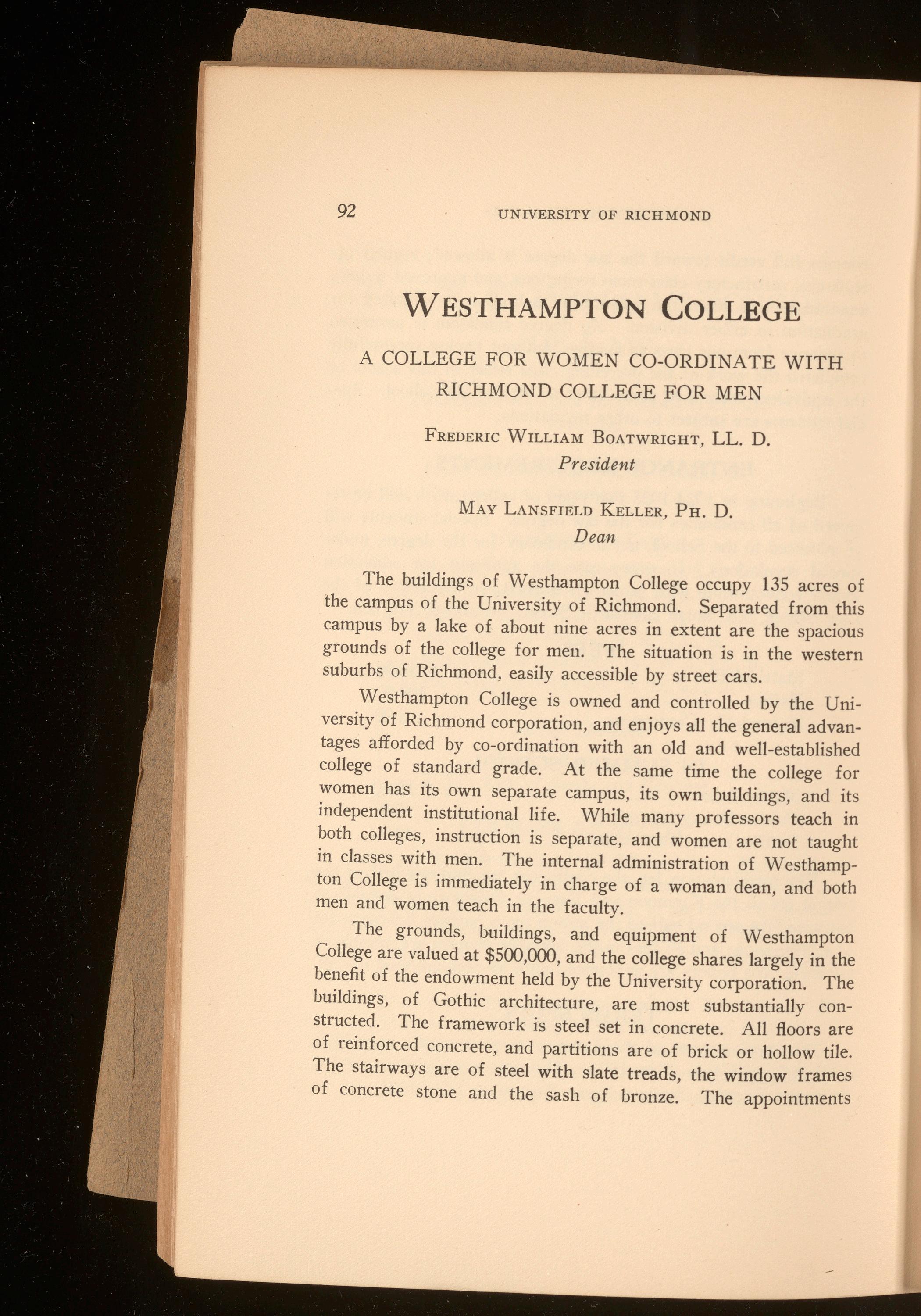
M AY
PH. D. Dean
The buildings of Westhampton College occupy 135 acres of the campus of the University of Richmond. Separated from this campus by a lake of about nine acres in extent are the spaciou s grounds of the college for men. The situation is in the western suburbs of Richmond , easily accessible by street cars.
Westhampton College is owned and controlled by the Uni- versity of Richmond corporation, and enjoys all the general advan- tages afforded by co-ordination with an old and well-established college of standard grade. At the same time the college for women has its own separate campus, its own buildings, and its independent institutional life. While many professors teach in both colleges, instruction is separate, and women are not taught in classes with men. The internal administration of W esthamp- ton College is immediately in charge of a woman dean , and both men and women teach in the faculty.
The grounds , buildings, and equipment of Westhampton College are valued at $500,000, and the college shares largely in the benefit of the endowment held by the University corporation. The buildings, of Gothic architecture , are most substantially con- structed. The framework is steel set in concrete. All floors are of reinforced concrete , and partitions are of brick or hollow tile The stairways are of steel with slate treads, the window frames of concrete stone and the sash of bronze. The appointments
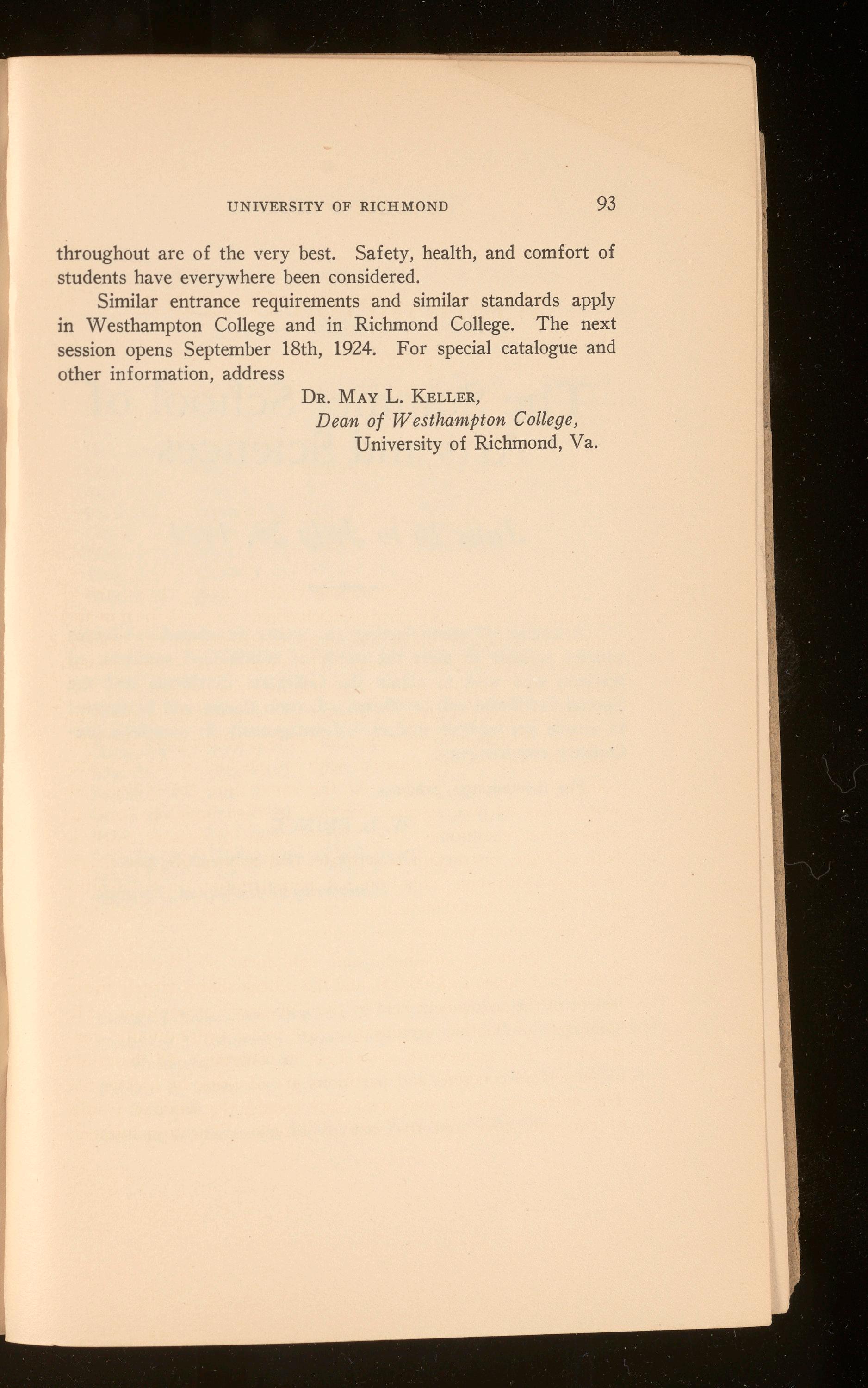
throughout are of the very best. Safety, health, and comfort of students have everywhere been considered.
Similar entrance requirements and similar standards apply in Westhampton College and in Richmond College. The next session opens September 18th, 1924. For special catalogue and other information, address
DR. MAY L. KELLER, Dean of Westhampton College, University of
Richmond, Va.
June 16 to July 26, 1924
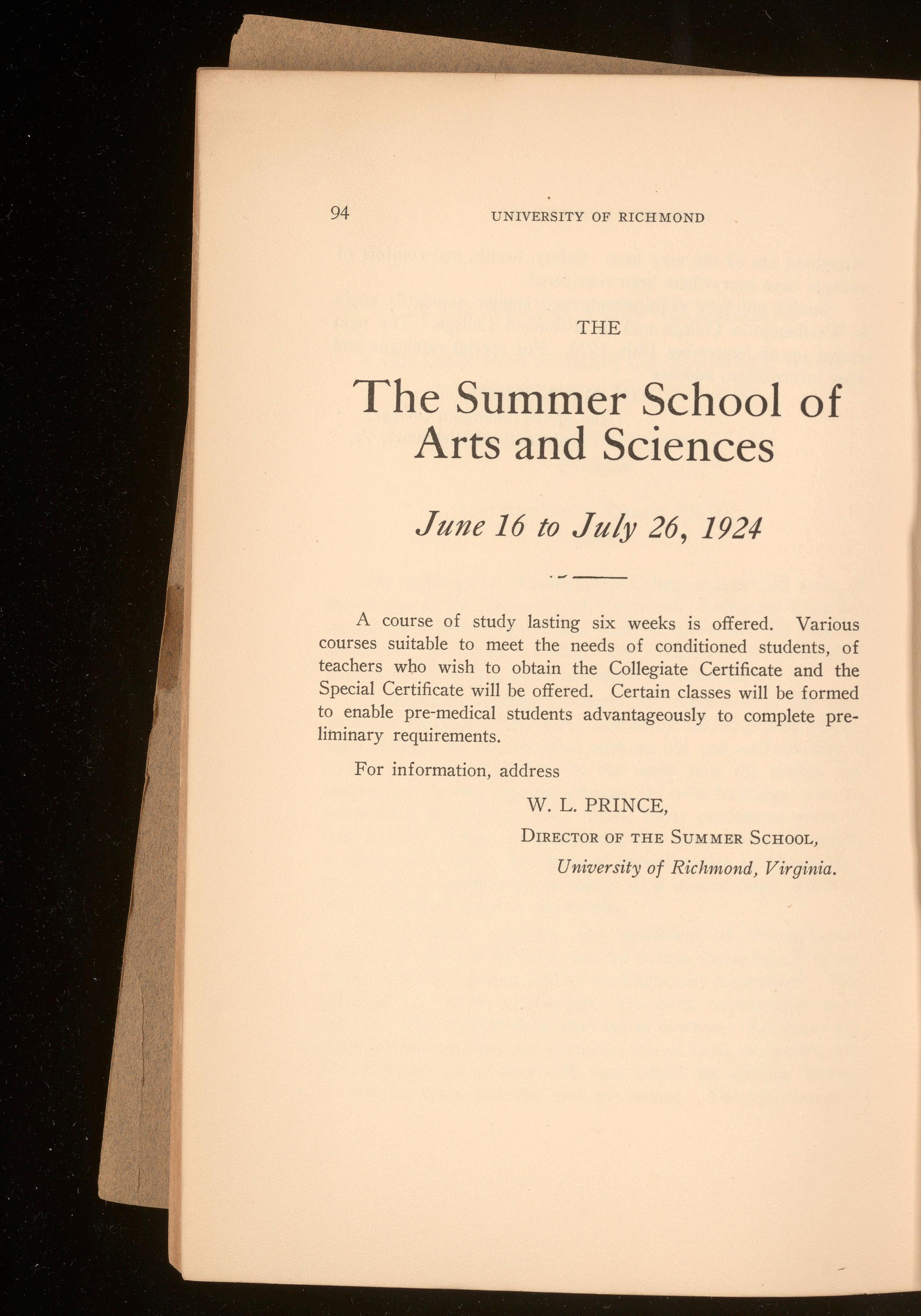
A course of study lasting six weeks is offered. Various courses suitable to meet the needs of conditioned students, of teachers who wish to obtain the Collegiate Certificate and the Special Certificate will be offered. Certain classes will be formed to enable pre-medical students advantageously to complete preliminary requirements.
For information, address
W. L. PRINCE, DIRECTOR
OF THE SUMMER SCHOOL, University of Richmond, Virginia.
SCHEDULE OF CLASSES FOR 1924-1925
MONDAY, WEDNESDAY, FRIDAY 12:20-1:10 2 :00-2 :SO 9 :00-9 :SO 10:00-10:50 11 :20-12-10 Biol. 5 Econ. 1 (a) Biol. 1 Bus. Admn.1 (a)
Bible 3 Biol. 6 Econ. 3 Eng. 1 (c) Bus. Admn. 8 Eng. 2 (b) Bus. Admn. 5 Eng. 1 (d) Eng. 4 Ed. 1 Hist. 1 (a) Chem. 2 Ger. 3 Eng. 6 Eng. 2 (a) Latin 2
Eng. 1 (a) Hist. 2 Fr. 2 (a) Math. 1 (e) Soc. 1 Fr. 2 (b) Math. 1 (b) Grk. 4 Math. 4 Grk. 3 Math. 3 Latin 1 Phys. Tr. Math. 1 (a) Phys. 1 (a) Math. 2 Span. 1 (b) Phys. 3 Psych. 1 (a) Phys. 1 (b) Sapn. 1 (a) ;•, Fr. 3 (a)
TUESDAY, THURSDAY, SATURDAY
Bible 2 Biol. 2 Bus.Adm.1 (b) Bus. Admn. 7 Bus. Admn. Biol. 4 Chem. 1 Bible 1 Chem. 3 & 4 Econ. 1 (b) Econ. 2 Fr. 1 (b) Eng. 10 Eng. 1 (b) Eng. 7 Ger. 2 French 1 (a) Eng. 3 Fr. 3 Hist. 1 (b) Ger. 1 (a) Ger. 1 (b) Fr. 5 Phys. Tr. Govt. Fr. 2 (b) Grk. 1 Pub. Spk. Grk. 2 Math. 1 (d) Math. 5 Psych. 2 Math. 1 (c) Soc. 2 Phys. 2 Soc. 4 Span. 2 (a) Span. 2 (b) Psych. 1 (b)
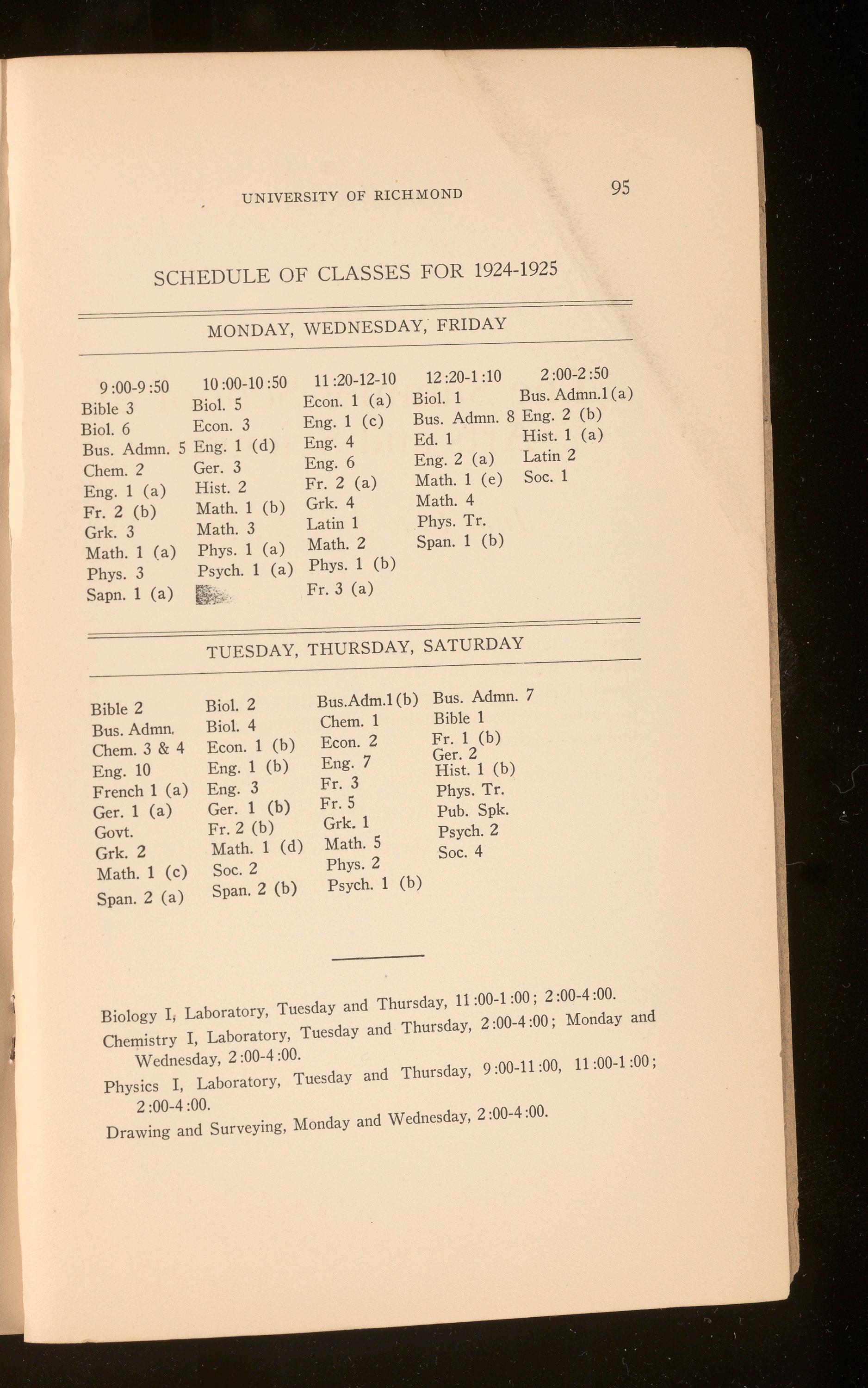
Biology I, Laboratory, Tuesday and Thursday, 11:00-1:00; 2 :00-4:00. Chemistry I, Laboratory, Tuesday and Thursday, 2 :00-4:00; Monday and Wednesday, 2 :00-4 :00. Physics I, Laboratory, Tuesday and Thursday, 9 :00-11:00, 11 :00-1:00; 2 :00-4 :00.
Drawing and Surveying, Monday and Wednesday, 2 :00-4:00.
